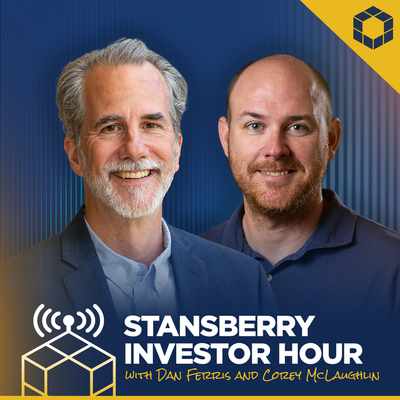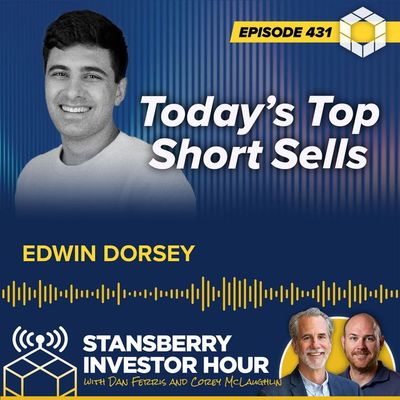
Today's Top Short Sells, From AI Victims to Chinese Scams
<p class="MsoNormal"><span style= "font-size: 10.0pt; mso-bidi-font-size: 12.0pt; font-family: 'Verdana',sans-serif;"> On this week's <em>Stansberry Investor Hour</em>, Dan and Corey welcome Edwin Dorsey back to the show. Edwin is the founder and editor of The Bear Cave newsletter, in which he conducts deep, investigative analyses of public companies for his 80,000-plus subscribers.</span></p> <p class="MsoNormal"><span style= "font-size: 10.0pt; mso-bidi-font-size: 12.0pt; font-family: 'Verdana',sans-serif;"> Edwin kicks things off by discussing The Bear Cave and his extensive work exposing corporate misconduct. He says, currently, his favorite companies to find for shorting purposes are those that are going to be hurt by technological innovations. Edwin gives education-support company Chegg as one example of a business that has already been disrupted by AI and has been employing questionable cancellation practices. And he discusses the growing market for lab-grown diamonds and how that will harm traditional retailers such as Signet Jewelers. (1:22)</span></p> <p class="MsoNormal"><span style= "font-size: 10.0pt; mso-bidi-font-size: 12.0pt; font-family: 'Verdana',sans-serif;"> Next, Edwin talks about QMMM, a U.S.-listed Chinese company whose stock is being manipulated by overseas groups. He goes in depth on the manipulation tactics these groups use on social media to pump and dump shares of unprofitable companies, why it's so difficult to pinpoint the scammers and investors running this dark network, the investigative research he's doing to stay up to date on the scams, and how crowdsourcing from the community has helped increase awareness. (18:33)</span></p> <p class="MsoNormal"><span style= "font-size: 10.0pt; mso-bidi-font-size: 12.0pt; font-family: 'Verdana',sans-serif;"> Finally, Edwin warns listeners that the overseas scammers will often engage in after-hours market manipulation, so the best time to short the companies is intraday. He further advises listeners not to take large positions because there is so much volatility in these scam companies. This leads to a conversation about why Edwin has never criticized electric-vehicle maker Tesla in his newsletter, the legendary saga of Netflix ex-CEO Reed Hastings responding publicly to short seller Whitney Tilson, and which sectors Edwin believes will be hardest hit by AI. (36:49)</span></p>
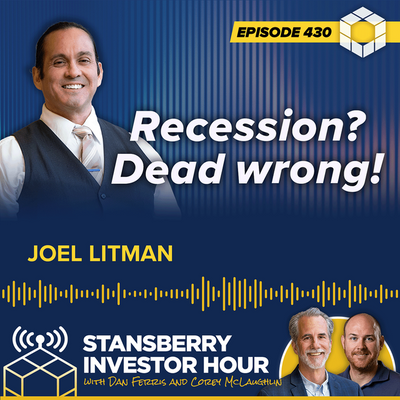
The Pros Have Misread the Market
<p class="s4"><span class="s5">On this week's</span> <span class= "s6">Stansberry Investor Hour</span><span class="s5">,</span> <span class="s5">Dan</span> <span class="s5">and Corey</span> <span class="s5">welcome</span> <span class="s5">Joel Litman back to the show. Joel is the founder and chief investment officer of our corporate affiliate Altimetry, where his team uses their Uniform Accounting</span> <span class="s5">system</span> <span class="s5">to look beyond the as-reported numbers in financial reports to see how companies are really performing.</span></p> <p class="s4"> </p> <p class="s4"><span class="s5">Joel kicks things off by discussing the resilience of the U.S. stock market</span><span class= "s5">,</span> <span class="s5">which has</span> <span class= "s5">t</span><span class="s5">aken</span><span class="s5">many professional investors by surprise. He states that historically, tariffs have not been a tax on consumers, with exporters absorbing 50% to 60%</span> <span class="s5">of costs</span> <span class= "s5">to maintain</span> <span class="s5">their</span> <span class= "s5">market share. Joel also argues that the U.S. dollar continues to be strong and that despite recession woes, corporate credit shows the economy is persistent.</span> <span class= "s5">(0:00)</span></p> <p class="s4"> </p> <p class="s4"><span class="s5">Next, Joel urges folks not to give in to the "fear of getting in" (the counterpart to the "fear of missing out"). Because investors are seeing new highs, they think they've missed out on buying in, but Joel says that's a mistake. Joel also shares his thoughts on the usage of AI and how many concerns over it</span> <span class="s5">replacing</span> <span class="s5">the entire workforce are unwarranted. Additionally, he says that</span> <span class="s5">the</span> <span class="s5">investment advice</span> <span class="s5">it provides</span> <span class="s5">is often incorrect and</span> <span class="s5">that is</span> <span class="s5">should be used</span> <span class="s5">as a</span> <span class= "s5">sup</span><span class="s5">plement</span> <span class= "s5">to</span> <span class="s5">research</span> <span class= "s5">instead</span><span class="s5">.</span> <span class= "s5">(26:36)</span></p> <p class="s4"> </p> <p class="s4"><span class="s5">Finally, Joel reflects along with Dan and Corey on Nobel Prize-winning economist Eugene Fama and the scope of</span> <span class="s5">his</span> <span class= "s5">knowledge. Joel also provides a brief explanation of what he and his team look for at Altimet</span><span class= "s5">ry</span><span class="s5">. And he</span> <span class= "s5">provides</span> <span class="s5">a glimpse of some of his latest research.</span><span class="s5">(45:41)</span></p>
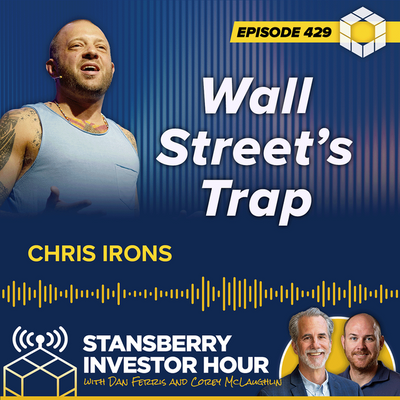
Use Common Sense and Avoid the Echo Chamber
<p class="MsoNormal"><span style= "font-size: 10.0pt; mso-bidi-font-size: 12.0pt; font-family: 'Verdana',sans-serif;"> On this week's <em>Stansberry Investor Hour</em>, Dan and Corey welcome Chris Irons to the show. Chris started writing about finance back in 2013 under the moniker Quoth the Raven and was a speaker at the 2019 Stansberry Conference.</span></p> <p class="MsoNormal"><span style= "font-size: 10.0pt; mso-bidi-font-size: 12.0pt; font-family: 'Verdana',sans-serif;"> Chris kicks things off by addressing tariffs and shares how nominal prices will continue to rise regardless of what we do. He says the cycle of crashes and money-printing has continued to accelerate and create bigger distortions and drops. And he discusses passive bids that pile into the S&P 500 Index and cause valuations to become stretched. He warns against overexposure to the fund due to potential drawdowns in any of the "Magnificent Seven" that could take the index down with them. (0:00)</span></p> <p class="MsoNormal"><span style= "font-size: 10.0pt; mso-bidi-font-size: 12.0pt; font-family: 'Verdana',sans-serif;"> Next, Chris states that the market has gone "all in" on options instead of equities, creating a state of leveraged gambling. And he predicts that things have changed so much that despite the beliefs that there will continue to be government bailouts or other solutions, this cannot continue. Something will break eventually. However, it's not all doom and gloom. Chris says you just have to find where there's good value. (24:06)</span></p> <p class="MsoNormal"><span style= "font-size: 10.0pt; mso-bidi-font-size: 12.0pt; font-family: 'Verdana',sans-serif;"> Finally, Chris shares advice on how to hedge any large market crashes based on his own strategies. He also cautions against buying into assets in blind hope of reaching a bottom. If a company is burning money without generating any cash, there won't be a bottom to bounce off of. (42:19)</span></p>
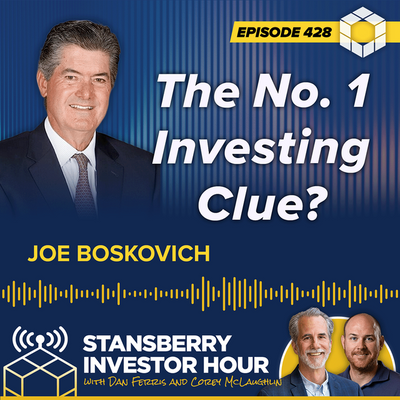
Management Might Be the Top Clue to Your Next Investment
<p class="MsoNormal"><span style= "font-size: 10.0pt; mso-bidi-font-size: 12.0pt; font-family: 'Verdana',sans-serif;"> On this week's <em>Stansberry Investor Hour</em>, Dan welcomes Joe Boskovich to the show. Joe is the founder of Old West Investment Management, an investment firm focused on finding high-quality companies with deep value.</span></p> <p class="MsoNormal"><span style= "font-size: 10.0pt; mso-bidi-font-size: 12.0pt; font-family: 'Verdana',sans-serif;"> </span></p> <p class="MsoNormal"><span style= "font-size: 10.0pt; mso-bidi-font-size: 12.0pt; font-family: 'Verdana',sans-serif;"> Joe kicks things off by sharing his background in company management. He states that he uses his past experience to evaluate how the companies he considers investing in are being run. Examining the steps management takes and how they behave will reflect their long-term goals with the company and if the correct actions are being taken to help the company succeed. And Joe says one of the easiest ways to gain insight is by seeing how they're being paid. (0:00)</span></p> <p class="MsoNormal"><span style= "font-size: 10.0pt; mso-bidi-font-size: 12.0pt; font-family: 'Verdana',sans-serif;"> </span></p> <p class="MsoNormal"><span style= "font-size: 10.0pt; mso-bidi-font-size: 12.0pt; font-family: 'Verdana',sans-serif;"> Next, John compares the differences between deep-value companies and distressed companies, showing how one that might appear to be "junk" might have potential if it's run well. And while folks love the big tech companies, most don't think about the metals that are needed in the products that they manufacture, which are where the bigger opportunities lie. (20:41)</span></p> <p class="MsoNormal"><span style= "font-size: 10.0pt; mso-bidi-font-size: 12.0pt; font-family: 'Verdana',sans-serif;"> </span></p> <p class="MsoNormal"><span style= "font-size: 10.0pt; mso-bidi-font-size: 12.0pt; font-family: 'Verdana',sans-serif;"> Finally, Joe and Dan talk about company scale and how companies should handle expanding locations. And Joe mentions how stock picking has become "a lost art" due to investors putting their money into indexes and exchange-traded funds. He shares several companies in the homebuilding sector that have caught his attention. And he warns about selling your stocks too soon. Joe views his investing as a "partnership" with the companies that he wants to own in the long run. (41:05)</span></p>
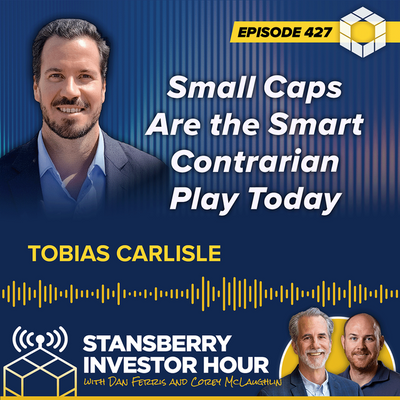
Small Caps Are the Smart Contrarian Play Today
<p class="MsoNormal"><span style= "font-size: 10.0pt; mso-bidi-font-size: 12.0pt; font-family: 'Verdana',sans-serif;"> On this week's <em>Stansberry Investor Hour</em>, Dan welcomes value investor Tobias Carlisle back to the show. Tobias is the founder and portfolio manager of Acquirers Funds, a deep-value investment firm. He's also an author and host of the</span> <span style= "font-size: 10.0pt; font-family: 'Verdana',sans-serif;">Acquirers Podcast</span><span style= "font-size: 10.0pt; mso-bidi-font-size: 12.0pt; font-family: 'Verdana',sans-serif;">.</span></p> <p class="MsoNormal"><span style= "font-size: 10.0pt; mso-bidi-font-size: 12.0pt; font-family: 'Verdana',sans-serif;"> Tobias kicks things off by discussing the "happy hunting ground" in small-cap stocks, the market narrowing in the S&P 500 Index, and the massive amounts of capital flowing into AI. He also compares the AI mania today with the dot-com boom of the late '90s, questions how AI is making money, and notes that the bottom 490 stocks in the S&P 500 have been in a "little recession" since 2022. He says this gives value investors an opportunity right now to get great names for cheap before the inevitable rebound. After that, Tobias comments on passive investing, what could be in store for the top 10 large caps, and why fears of AI destroying the jobs market are overblown. (0:00)</span></p> <p class="MsoNormal"><span style= "font-size: 10.0pt; mso-bidi-font-size: 12.0pt; font-family: 'Verdana',sans-serif;"> Next, Tobias talks about his company's two funds: the Acquirers Fund (ZIG) and Acquirers Small and Micro Deep Value Fund (DEEP). He explains what he looks for when picking stocks and how he determines valuations. He also name-drops many stocks and industries that he thinks have fantastic potential over the next decade. (21:01)</span></p> <p class="MsoNormal"><span style= "font-size: 10.0pt; mso-bidi-font-size: 12.0pt; font-family: 'Verdana',sans-serif;"> Finally, Tobias discusses the significance of hedge-fund shorts of the small-cap Russell 2000 Index peaking recently, plus the extreme concentration of the top 10 stocks. He notes that Nvidia now accounts for 8% of the S&P 500's market cap – the highest in history. Tobias says that valuations will eventually come back down to Earth and that not all of the Mag Seven will be top performers in the future. Citing Tesla as the weakest in the group, he points out that Chinese electric vehicles beat Tesla cars in terms of price, design, and charging times. Tobias then closes things out with a conversation about an "echo boom" of 2021, cryptocurrencies being back in favor, and the unprecedented outperformance of large caps. (37:31)</span></p>
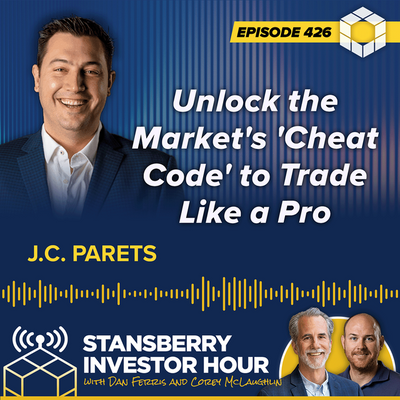
Unlock the Market's 'Cheat Code' to Trade Like a Pro
<p class="MsoNormal"><span style= "font-size: 10.0pt; mso-bidi-font-size: 12.0pt; font-family: 'Verdana',sans-serif;"> On this week's <em>Stansberry Investor Hour</em>, Dan and Corey welcome J.C. Parets to the show. J.C. is a Chartered Market Technician and editor of the <em>Everybody's Wrong</em> newsletter. He's also the founder of All Star Charts – a research platform for both professional and retail investors which tracks U.S. and international stocks, interest rates, commodities, and foreign exchange markets. </span></p> <p class="MsoNormal"><span style= "font-size: 10.0pt; font-family: 'Verdana',sans-serif;">J.C. kicks things off by discussing the difference between market technicians and "chartists," the fact that valuations and fundamentals no longer drive stock prices, and the "big bullies" that trickle down to the individual stock level and move markets. He delves into the topic of positioning and finding parts of the market where folks are too bullish or too bearish. For example, J.C. points out that small caps are currently vulnerable for a squeeze. After that, he gives listeners the "cheat code" for analyzing the market, including what to look for, how to cut through the "noise machine" of financial media, how to spot changes in trends, and how to distinguish reality from narrative. (0:35)</span></p> <p class="MsoNormal"><span style= "font-size: 10.0pt; font-family: 'Verdana',sans-serif;">Next, J.C. walks through a hypothetical trade in the small-cap Russell 2000 Index to demonstrate his thought process and how exactly he finds opportunities. He highlights relative strength, waiting for a change in trend, weighing risk versus reward, not taking profits too early, and his unique position-sizing strategy. J.C. also emphasizes the importance of continually asking yourself how you could be wrong once you've formulated a thesis. As he says, if you can't answer the question and don't know how the market could prove your thesis wrong, "It's not an investment. It's a religion [based on belief alone]." This leads J.C. to talk about overcoming human emotion, having a plan before entering a trade, and taking advantage of all the emotional investors who <em>don't</em> have a plan. (19:48)</span></p> <p class="MsoNormal"><span style= "font-size: 10.0pt; mso-bidi-font-size: 12.0pt; font-family: 'Verdana',sans-serif;"> Finally, J.C. throws out a few areas of the market he likes today and is following closely for opportunities, explains how he decides the right time to enter and add to a trade, and gives listeners solid advice for risk management. "If you're in a trade that's losing, you're going to be distracted, and you're going to miss the giant elephant that's walking right past you," J.C. quips. And he closes the show out with a conversation about investing discipline, including not entering risky trades even if you know they'll go up. (37:21)</span></p>
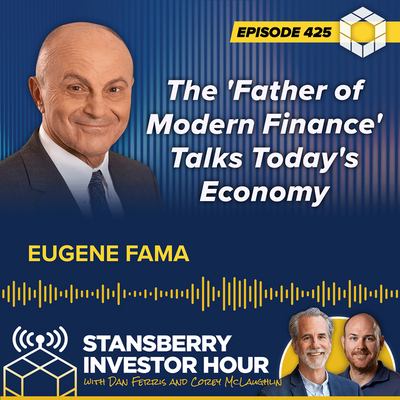
The 'Father of Modern Finance' Talks Today's Economy
<p class="MsoNormal"><span style= "font-size: 10.0pt; mso-bidi-font-size: 12.0pt; font-family: 'Verdana',sans-serif;"> On this week's <em>Stansberry Investor Hour</em>, Dan and Corey welcome Eugene Fama to the show. Eugene is a Nobel Prize-winning economist and widely recognized as the "father of modern finance."</span></p> <p class="MsoNormal"><span style= "font-size: 10.0pt; font-family: 'Verdana',sans-serif;">Eugene kicks things off by talking a bit about his efficient-market hypothesis, whether he believes it's still relevant in today's economy, and how passive investing plays a role in all this. He also discusses what it's like winning a Nobel Prize, the impact of his five-factor model on investing and the rise of factor-based funds, rationality versus irrationality, and the importance of luck in markets. (0:34)</span></p> <p class="MsoNormal"><span style= "font-size: 10.0pt; font-family: 'Verdana',sans-serif;">Next, Eugene argues against a <em>New York Times</em> article claiming that a PhD in economics won't bring affluence or prestige anymore, laments the lack of new breakthroughs in financial theory/modeling, and comments on the modern competitive environment in economics that didn't exist 60 years ago. Things then take a more personal turn, and Eugene talks about his how he discovered his love of economics and what he wanted to focus his research on. (16:28)</span></p> <p class="MsoNormal"><span style= "font-size: 10.0pt; mso-bidi-font-size: 12.0pt; font-family: 'Verdana',sans-serif;"> Finally, Eugene shares what it was like in Chicago back when the city was the epicenter of financial research, including his experience working with some other notable economists. After that, he gives his opinion on market bubbles. Speaking about the dot-com era, he says that the total value created from the industry is a big part of international wealth today, so it can't be considered a mistake. And he closes things out with a conversation about uncertainty in making predictions. (30:34)</span></p>
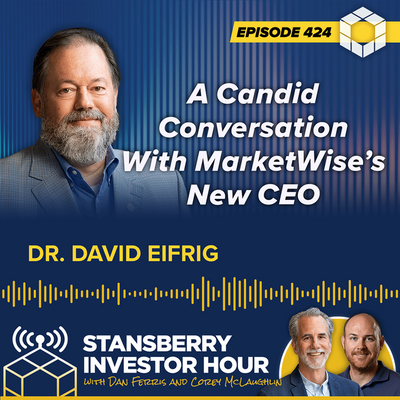
A Candid Conversation With MarketWise's New CEO
<p class="MsoNormal"><span style= "font-size: 10.0pt; mso-bidi-font-size: 12.0pt; font-family: 'Verdana',sans-serif;"> On this week's <em>Stansberry Investor Hour</em>, Dan and Corey welcome Dr. David "Doc" Eifrig back to the show. Doc is the new permanent CEO of Stansberry Research's parent company MarketWise, as well as the editor of five newsletters at Stansberry and a member of the Investment Committee for Stansberry Portfolio Solutions. </span></p> <p class="MsoNormal"><span style= "font-size: 10.0pt; font-family: 'Verdana',sans-serif;">Doc kicks off the show by asking Dan about his recent river cruise vacation on the Mississippi River and sharing stories about his own trip to Lisbon, Portugal a few weeks ago. This leads to a conversation about Doc and Dan's first meeting in 2007 and how Dan was a "diligence check" for Doc joining Stansberry in the first place. Doc also talks about his permanent appointment as MarketWise CEO after almost a year holding the interim role. (0:46)</span></p> <p class="MsoNormal"><span style= "font-size: 10.0pt; font-family: 'Verdana',sans-serif;">Next, Doc discusses the financial-newsletter industry and what sets Stansberry apart in this era where <em>anyone</em> can self-publish content – including free content and AI-generated content. "I want us to be known as a trusted source," he notes. As Doc emphasizes, Stansberry is good at finding talented analysts who work hard, know their stuff, and can meet deadlines. He also looks back on the company since its "disaster" going public, previous leadership that didn't respect the company's history, and what has mattered most to him since becoming CEO. (23:57)</span></p> <p class="MsoNormal"><span style= "font-size: 10.0pt; mso-bidi-font-size: 12.0pt; font-family: 'Verdana',sans-serif;"> Finally, Doc explains that caring about what you're doing and the experience you want to give is the most important thing in business. He gives shout-outs to several folks at MarketWise who are doing just this, from Stansberry's Executive Editor Carli Flippen overseeing everything that gets published, to the marketing team and copywriters who care about the customers more than making a sale. (45:32)</span></p>
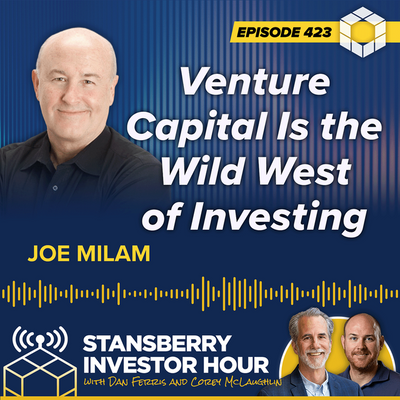
Venture Capital Is the Wild West of Investing
<p class="MsoNormal"><span style= "font-size: 10.0pt; mso-bidi-font-size: 12.0pt; font-family: 'Verdana',sans-serif;"> On this week's <em>Stansberry Investor Hour</em>, Dan and Corey welcome Joe Milam to the show. Joe is the founder and CEO of AngelSpan, which provides investor relations for early-stage startups. He's also the founder of The Legacy Funds and managing member of the Texas Legacy Fund.</span></p> <p class="MsoNormal"><span style= "font-size: 10.0pt; font-family: 'Verdana',sans-serif;">Joe kicks things off by recounting his background in finance and the "Forrest Gump-like experiences" that got him to where he is today. He critiques the venture-capital ("VC") world, as it requires no training or certification to enter. Joe explains that his mission is to bring professional standards and practices to early-stage VC. And he shares a few anecdotes of unprofessionalism in the VC world that you'll never hear reported by the media, including investing for access to a private jet. (0:47)</span></p> <p class="MsoNormal"><span style= "font-size: 10.0pt; font-family: 'Verdana',sans-serif;">Next, Joe discusses the massive opportunity in bringing professional processes to VC, especially because entrepreneurship is growing, yet the financial infrastructure has not been modernized to accommodate for this growth. He also talks about lack of diversification being a problem, the history of angel investing since the Revolutionary War, the role hype plays in VC, why he believes we're at the top of the "hype cycle" for AI, and the unintended consequences of technological innovation. (19:19)</span></p> <p class="MsoNormal"><span style= "font-size: 10.0pt; mso-bidi-font-size: 12.0pt; font-family: 'Verdana',sans-serif;"> Finally, Joe points out that an understanding of financial history is directly linked to proper risk assessment and management. He notes that many folks will ignore risk even if they're warned about it, due to a lack of discipline and their fear of missing out on the next hottest thing. As Joe explains, there's an expanding pool of innovation and places to put money, so both VC and individual investors need to manage risk. (45:48)</span></p>
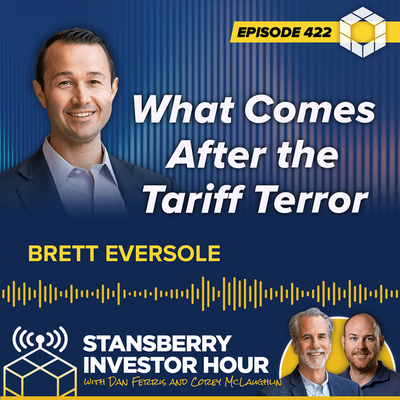
Now That the Tariff Terror Is Over, Here's What Comes Next
<p class="MsoNormal"><span style= "font-size: 10.0pt; mso-bidi-font-size: 12.0pt; font-family: 'Verdana',sans-serif;"> On this week's <em>Stansberry Investor Hour</em>, Corey welcomes his colleague Brett Eversole back to the show. Brett is the editor of the <em>True Wealth</em>, <em>True Wealth Systems</em>, and <em>DailyWealth</em> newsletters. He also serves on the Investment Committee for Stansberry Portfolio Solutions.</span></p> <p class="MsoNormal"><span style= "font-size: 10.0pt; font-family: 'Verdana',sans-serif;">Brett kicks things off by sharing what he learned from his mentor Steve Sjuggerud, including the investment philosophy of buying assets that are "cheap, hated, and in an uptrend." He examines the recent tariff drama and why he believes we're about to return to a boring market fueled by fundamentals after several months of turbulence. As Brett explains, a lot of it has to do with increased capital spending from hyperscalers. (0:46)</span></p> <p class="MsoNormal"><span style= "font-size: 10.0pt; font-family: 'Verdana',sans-serif;">Next, Brett reviews the difference between secular bull markets and cyclical bull markets. He compares today's bull market (driven by AI) with the bull market of the late '90s (driven by the Internet), noting that a massive infrastructure buildout caused both. Brett predicts a normal market for the next few years, followed by a dot-com-style AI boom and then a "lost decade." He also discusses the S&P 500 Index decoupling from the U.S. economy, tariffs hurting smaller companies, and why he's bullish on gold and silver. (14:59)</span></p> <p class="MsoNormal"><span style= "font-size: 10.0pt; mso-bidi-font-size: 12.0pt; font-family: 'Verdana',sans-serif;"> Finally, Brett talks about indicators that investors can use to gauge the market's underlying health, as well as what divergence between the indicators can mean in both the short and long term. He then dives into his work on Stansberry Portfolio Solutions, including the strategy the team uses to find the best companies and how to manage risk. And he closes things out with an in-depth analysis of today's real estate market. (33:29)</span></p>
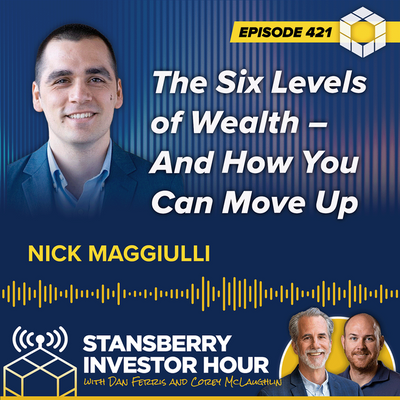
The Six Levels of Wealth – And How You Can Move Up
<p class="MsoNormal"><span style= "font-size: 10.0pt; mso-bidi-font-size: 12.0pt; font-family: 'Verdana',sans-serif;"> On this week's <em>Stansberry Investor Hour</em>, Dan and Corey are joined by Nick Maggiulli. Nick is the chief operating officer of Ritholtz Wealth Management and founder of the financial blog Of Dollars and Data. His new book, <em>The Wealth Ladder</em>, comes out next week. </span></p> <p class="MsoNormal"><span style= "font-size: 10.0pt; font-family: 'Verdana',sans-serif;">Nick kicks off the show by discussing <em>The Wealth Ladder</em>, including the six different levels of wealth and why income is a more crucial factor to building wealth than behavior. He also talks about jobs that will be a safe haven once artificial intelligence ("AI") becomes more prevalent, the mistakes people make when buying income-producing assets, the importance of diversification, and why he prefers to invest in index funds. (0:40)</span></p> <p class="MsoNormal"><span style= "font-size: 10.0pt; font-family: 'Verdana',sans-serif;">Next, Nick goes in depth on the spending mistakes people make that prevent them from moving up to a higher wealth level. He touches on diversification again, using Elon Musk versus Bill Gates as an example. Plus, he covers the different strategies for different wealth levels, why it's important to still focus on the nonfinancial things in life, statistical data for whether money can buy happiness, and the significance of money being a quantifiable thing. (17:27)</span></p> <p class="MsoNormal"><span style= "font-size: 10.0pt; mso-bidi-font-size: 12.0pt; font-family: 'Verdana',sans-serif;"> Finally, Nick discusses the things that financially successful people may be overlooking, why the strategy for success may vary on a case-by-case basis, and the different levels of spending freedom. He says that level two allows freedom in the grocery store, level three allows freedom at restaurants, and level four allows freedom for traveling. And he shares a handy formula for people to use when it comes to nonessential spending. (35:15)</span></p>
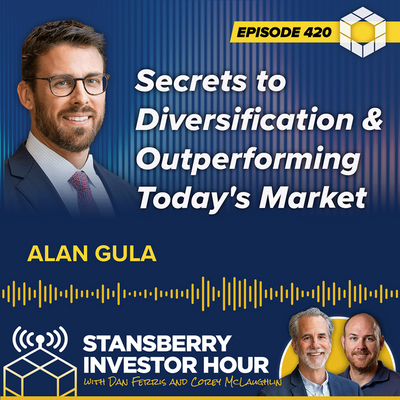
Secrets to Diversification and Outperforming Today's Market
<p class="MsoNormal"><span style= "font-size: 10.0pt; mso-bidi-font-size: 12.0pt; font-family: 'Verdana',sans-serif;"> On this week's <em>Stansberry Investor Hour</em>, Dan and Corey welcome their colleague Alan Gula back to the show. Alan is an editor and member of the Investment Committee for <em>The Total Portfolio</em> and <em>Stansberry's Forever Portfolio</em>, as well as a senior analyst for flagship newsletter <em>Stansberry's Investment Advisory</em>.</span></p> <p class="MsoNormal"><span style= "font-size: 10.0pt; font-family: 'Verdana',sans-serif;">Alan kicks off the show by analyzing a chart of the S&P 500 Index since 1957. He notes that the index is running 35% above its long-term trend, which is high but not a historic extreme. Focusing on just the past 15 years, Alan discusses the current secular bull market and whether artificial intelligence ("AI") could usher in a dot-com-style boom. He also goes in depth on <em>The Total Portfolio</em>'s investment philosophy, what kinds of assets are in the portfolio, how the portfolio has outperformed this year, and the difficulty with being truly diversified. (0:40)</span></p> <p class="MsoNormal"><span style= "font-size: 10.0pt; font-family: 'Verdana',sans-serif;">Next, Alan talks about managed futures and why their negative correlation with the S&P 500 makes them "the ultimate portfolio diversifier." As he explains, almost all investment advisers simply follow trends nowadays, so <em>The Total Portfolio</em> is one of the only places you can find truly diversified recommendations that'll protect you in any outcome. He then shares why he believes the traditional 40% allocation to bonds is dead, recommends two better ways to invest in this space, and explores where we are in the current bull market. (18:44)</span></p> <p class="MsoNormal"><span style= "font-size: 10.0pt; mso-bidi-font-size: 12.0pt; font-family: 'Verdana',sans-serif;"> Finally, Alan advises bearish listeners to keep looking for opportunities. He says you can't predict the future, but you can set up win-win scenarios. This leads to a conversation about real estate investment trusts, sector correlations, strategies for picking stocks, and both the pros and cons of AI replacing human jobs. (34:26)</span></p>
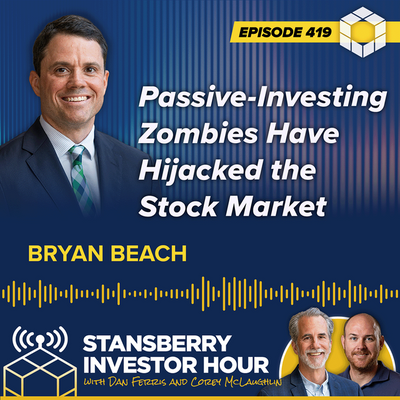
Passive-Investing Zombies Have Hijacked the Stock Market
<p class="MsoNormal"><span style= "font-size: 10.0pt; mso-bidi-font-size: 12.0pt; font-family: 'Verdana',sans-serif;"> On this week's <em>Stansberry Investor Hour</em>, Dan and Corey welcome their colleague Bryan Beach back to the show. Bryan is the editor of <em>Stansberry Venture Value</em> and a senior analyst on <em>Stansberry's Investment Advisory</em>.</span></p> <p class="MsoNormal"><span style= "font-size: 10.0pt; font-family: 'Verdana',sans-serif;">Bryan kicks things off by discussing passive investing, the stock market's "relentless bid," and what could derail passive investing in the future. He points out that the total assets invested passively surpassed those invested actively last year. Not only is this an important fundamental change, but Bryan says that this alters the dynamic between investors and Mr. Market that legendary economist Ben Graham outlined 70-plus years ago. Then, using Microsoft as an example, Bryan analyzes whether it's realistic to expect the Magnificent Seven companies to return to lower multiples. (0:47)</span></p> <p class="MsoNormal"><span style= "font-size: 10.0pt; font-family: 'Verdana',sans-serif;">Next, Bryan talks about all the headwinds Apple has faced in the past six months and why he believes the stock would be down much more than it is today if it weren't receiving so many passively invested dollars. He says the size of the relentless bid reached a critical mass during the pandemic, and now the S&P 500 Index will continue to grind higher indefinitely. The only thing that can offset this natural inertia is bad economic news (such as tariffs), and even that is temporary. As Bryan points out, many passive investors aren't aware of what they're doing, so it would take legal changes to fix the problem. (19:32)</span></p> <p class="MsoNormal"><span style= "font-size: 10.0pt; mso-bidi-font-size: 12.0pt; font-family: 'Verdana',sans-serif;"> Finally, Bryan explains that this relentless bid does not apply to every corner of the market. He says small caps and microcaps are still great places to find value. Plus, Bryan discusses the unique situation Tesla is in today, makes a bullish case for restaurant-operations company PAR Technology, and discusses what he got wrong with special purpose acquisition companies ("SPACs") back in 2022. (42:56)</span></p>
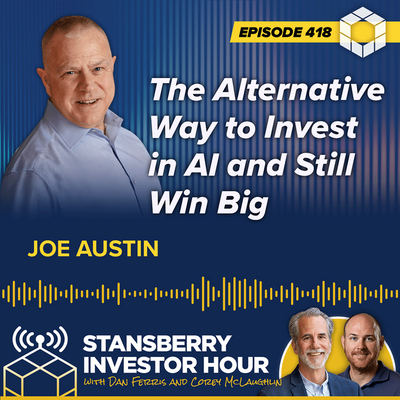
The Alternative Way to Invest in AI and Still Win Big
<p class="MsoNormal"><span style= "font-size: 10.0pt; mso-bidi-font-size: 12.0pt; font-family: 'Verdana',sans-serif;"> On this week's <em>Stansberry Investor Hour</em>, Dan and Corey are joined by Joe Austin. Joe is an editor and senior analyst at our corporate affiliate Chaikin Analytics. He spent four decades in the financial-services industry and now joins the podcast to share some of his insights and future outlooks.</span></p> <p class="MsoNormal"><span style= "font-size: 10.0pt; font-family: 'Verdana',sans-serif;">Joe kicks off the show by outlining his background in finance and how he got involved at Chaikin Analytics. He delves into the usefulness of the Power Gauge, how he combines the tool with fundamentals to make stock-picking decisions, and what specific factors he finds most important. Next, Joe talks about artificial intelligence ("AI"). He says you can invest in the technology either by buying the companies developing AI or by buying non-AI companies that are implementing the technology to improve their businesses. Joe prefers the latter. He notes that certain industry groups are integrating AI more than others, and those would give you the biggest areas of opportunity. (0:38)</span></p> <p class="MsoNormal"><span style= "font-size: 10.0pt; font-family: 'Verdana',sans-serif;">Next, Joe discusses the data sets which AI uses and why the companies with the best data will win out in the end. He gives medical-technology company Veeva Systems and tool manufacturer Snap-on as two such examples. Joe then shares how macro influences affect his investing process, what he learned about the insurance industry from working in it, and one particular company he believes will do well in the long term. (17:58)</span></p> <p class="MsoNormal"><span style= "font-size: 10.0pt; mso-bidi-font-size: 12.0pt; font-family: 'Verdana',sans-serif;"> Finally, Joe highlights specific industries he stays away from, the importance of understanding where you went wrong with an investment, and how he decides when to sell a stock. He notes that stocks that rise the most tend to fall the most... and that having fresh capital to use on new ideas is crucial. And he reminds listeners that having a defensive strategy is often more important than having an offensive strategy. (36:50)</span></p>
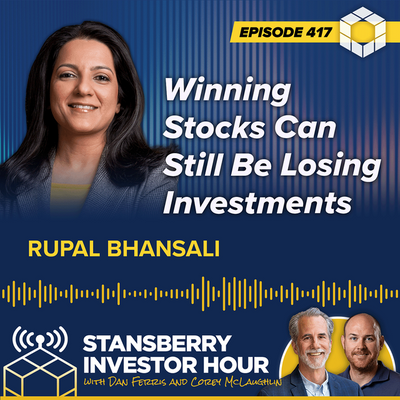
Winning Stocks Can Still Be Losing Investments
<p class="MsoNormal"><span style= "font-size: 10.0pt; mso-bidi-font-size: 12.0pt; font-family: 'Verdana',sans-serif;"> On this week's <em>Stansberry Investor Hour</em>, Dan and Corey welcome Rupal Bhansali back to the show. Rupal is the founder, CEO, chief investment officer, and portfolio manager of investment adviser Double Duty Money Management. She's also the author of the book</span> <em><span style= "font-size: 10.0pt; mso-bidi-font-size: 12.0pt; font-family: 'Verdana',sans-serif;"> Non-Consensus Investing</span></em> <span style= "font-size: 10.0pt; mso-bidi-font-size: 12.0pt; font-family: 'Verdana',sans-serif;"> and a leading figure in value investing, with more than three decades of experience.</span></p> <p class="MsoNormal"><span style= "font-size: 10.0pt; font-family: 'Verdana',sans-serif;">Rupal kicks off the show by discussing her investment philosophy, how she defines "winning" in the stock market, the main misconception about contrarian investing, and why it's more important to not lose money in the market than to earn money. She warns investors that they can still lose money when investing in a high-quality company. As she says, the key to value investing is low downside. Rupal uses the auto industry as an example of a low-quality, cyclical industry, but highlights the hidden opportunity in tires, which are a consumer staple and not cyclical. (0:38)</span></p> <p class="MsoNormal"><span style= "font-size: 10.0pt; font-family: 'Verdana',sans-serif;">Next, Rupal talks about getting the best of both worlds with growth and value investing. She notes that this is very difficult to do today with U.S. stocks but that there are many untapped opportunities abroad – especially in Latin America. Rupal then delves into the world of diversification, including why having uncorrelated investment ideas in your portfolio is so crucial. This leads to a conversation about knowing when to buy more shares when one of your stocks is down versus cutting your losses and selling completely. Rupal outlines three core reasons to sell a stock, regardless of whether a stop loss was hit or not. (16:15)</span></p> <p class="MsoNormal"><span style= "font-size: 10.0pt; mso-bidi-font-size: 12.0pt; font-family: 'Verdana',sans-serif;"> Finally, Rupal gives her opinion on buying companies like Costco Wholesale that have very high multiples but keep trading higher. She says the reward isn't worth the risk, since there are 49 non-Costcos for every Costco, and trying to find the one winner is very difficult. Rupal reiterates that it's all about cutting your losses early, accepting that you'll get things wrong, and learning from your mistakes. She also covers the wider macro environment relating to President Donald Trump's tariffs, clarifying that she's "macro aware" rather than "macro driven." (29:48)</span></p>
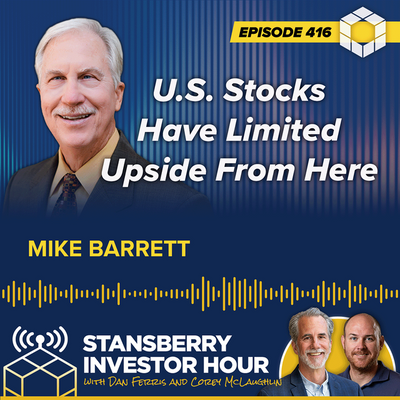
U.S. Stocks Have Limited Upside From Here
<p class="MsoNormal"><span style= "font-size: 10.0pt; mso-bidi-font-size: 12.0pt; font-family: 'Verdana',sans-serif;"> On this week's <em>Stansberry Investor Hour</em>, Dan and Corey welcome Mike Barrett back to the show. Mike is the editor of <em>Select Value Opportunities</em> and senior analyst for <em>Extreme Value</em>. He has decades of cash-flow modeling and valuation expertise that he uses to find underappreciated, high-quality growth stocks.</span></p> <p class="MsoNormal"><span style= "font-size: 10.0pt; font-family: 'Verdana',sans-serif;">Mike kicks things off by discussing President Donald Trump's tariffs, their implication in the context of broad market cycles, and a potential 2026 low. He explains that he believes stocks have limited upside from here because of extreme positive sentiment and rampant overvaluation. And because there's so much uncertainty, Mike advises investors to make sure they have high-quality businesses in their portfolios. He also points out that the most overvalued stocks today are the defensive ones, but that could change once the tariff situation eases. (1:47)</span></p> <p class="MsoNormal"><span style= "font-size: 10.0pt; font-family: 'Verdana',sans-serif;">Next, Mike breaks down his personal investing philosophy and why he uses macroeconomic factors to look ahead only a few weeks rather than longer term. He also talks about the importance of momentum, taking risks to find out what works best for you as an investor, Nvidia being undervalued today, one company he likes that offers a good way to compound your wealth, and the optionality baked into Sprouts Farmers Market thanks to the rising popularity of weight-loss drugs. (18:42)</span></p> <p class="MsoNormal"><span style= "font-size: 10.0pt; mso-bidi-font-size: 12.0pt; font-family: 'Verdana',sans-serif;"> Finally, Mike discusses Costco Wholesale's fantastic business growth, the importance of finding companies that perform consistently well, his recommendation of Constellation Brands that earned a triple-digit return for subscribers, crypto, and generative AI. (43:03)</span></p>
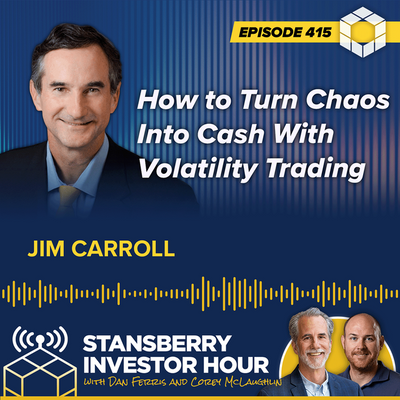
How to Turn Chaos Into Cash With Volatility Trading
<p class="MsoNormal"><span style= "font-size: 10.0pt; mso-bidi-font-size: 12.0pt; font-family: 'Verdana',sans-serif;"> On this week's <em>Stansberry Investor Hour</em>, Dan and Corey are joined by Jim Carroll. Jim runs the Vixology Substack, where he analyzes stock market volatility. He also serves as senior wealth adviser and portfolio manager for investment adviser Ballast Rock Private Wealth.</span></p> <p class="MsoNormal"><span style= "font-size: 10.0pt; font-family: 'Verdana',sans-serif;">Jim kicks off the show by describing how he got his start in finance and how he found his way to volatility trading with CBOE Volatility Index ("VIX") futures. He breaks down what caused "Volmageddon" in February 2018, what he learned from the experience, and which specific factors drive the VIX. As Jim explains, many investors don't realize that the VIX can soar higher when everyone is piling into buying call options. (0:46)</span></p> <p class="MsoNormal"><span style= "font-size: 10.0pt; font-family: 'Verdana',sans-serif;">Next, Jim talks about his "VIX Mix" composite of 17 different indicators that he uses as a warning signal for what's about to happen in the markets. This applies to both the downside and the upside, with the VIX Mix predicting crashes and rebounds alike. Though primarily for trading, Jim explains that long-term investors can use this tool to their advantage too, since they can prepare for bottoms and buy more stock when those drawdowns hit. He then warns listeners of several things they should keep in mind about volatility data, including small sample sizes, the fact that volatility clusters, and the outsized influence of institutional investors. (18:41)</span></p> <p class="MsoNormal"><span style= "font-size: 10.0pt; mso-bidi-font-size: 12.0pt; font-family: 'Verdana',sans-serif;"> Finally, Jim gives his opinions on VIX futures products, such as the popular Simplify Volatility Premium Fund (SVOL). He reminds listeners to beware of embedded leverage and to size their positions carefully – especially because the stock market has become like a giant casino. Jim also analyzes why the VIX is tilted more toward the bearish side, how "market makers" profit from investor fear, and how to more accurately gauge underlying sentiment. (40:15)</span></p>
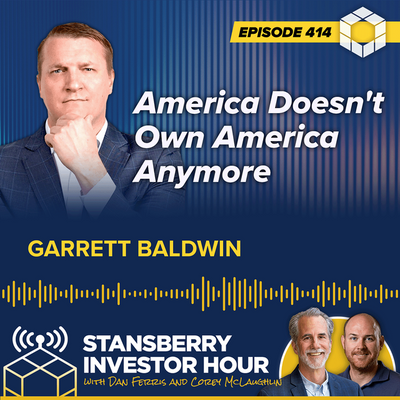
America Doesn't Own America Anymore
<p class="MsoNormal"><span style= "font-size: 10.0pt; mso-bidi-font-size: 12.0pt; font-family: 'Verdana',sans-serif;"> On this week's <em>Stansberry Investor Hour</em>, Dan and Corey welcome Garrett Baldwin to the show. Garrett is a research economist, financial analyst, and investigative journalist. He's also a contributor to our flagship newsletter, <em>Stansberry's Investment Advisory</em>, as well as author of the <em>Me and the Money Printer</em> Substack. </span></p> <p class="MsoNormal"><span style= "font-size: 10.0pt; font-family: 'Verdana',sans-serif;">Garrett kicks off the show by explaining how he got his start in finance, why leaving the gold standard was the American economy's "core breaking point," and how liquidity is driving boom and bust cycles. He says that even though Consumer Price Index inflation can come in at 3% officially, actual currency debasement is 6% to 8% per year based on real assets. This leads Garrett to break down the "Cantillon effect," how everyday folks are most disadvantaged by excessive money printing, and why the American manufacturing sector has been destroyed. He also delves into the troubling trend of Americans essentially paying rent to foreign investors, why we'll "hit a wall" in 2026 or 2027, and how you can protect yourself from the inevitable fallout. (0:59)</span></p> <p class="MsoNormal"><span style= "font-size: 10.0pt; font-family: 'Verdana',sans-serif;">Next, Garrett analyzes a pattern that warns him to flee the markets, plus the contrarian signal of insider buying that he uses to time his reentry into the markets. He notes that this trend has been playing out consistently since 2008 and allows those aware to successfully buy the dip. Garrett says that company fundamentals still matter, however, and he explains what he looks for in a company before investing. He then reviews liquidity versus momentum, the Federal Reserve's relationship to liquidity, a core problem with the traditional banking system, and why the Fed tolerates shadow banking. (21:48)</span></p> <p class="MsoNormal"><span style= "font-size: 10.0pt; mso-bidi-font-size: 12.0pt; font-family: 'Verdana',sans-serif;"> Finally, Garrett talks about the relationship between liquidity and bitcoin, why he likes silver today, and how quantitative easing paradoxically leads to a higher dollar. He explains that many paradoxes in our fiat currency system started in the 1990s, thanks to six major policy shifts and their incentives. Garrett goes in depth on how such policy has affected our financial system today and made the Fed more consequential for our wallets than the president. (41:38)</span></p>
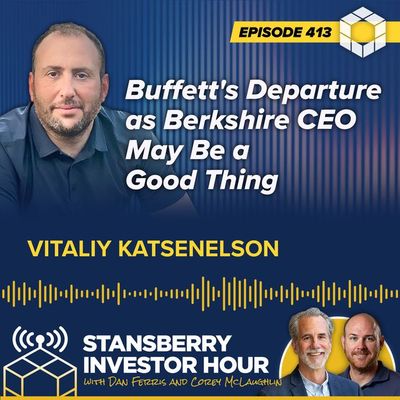
Buffett's Departure as Berkshire CEO May Be a Good Thing
<p class="MsoNormal"><span style= "font-size: 10.0pt; mso-bidi-font-size: 12.0pt; font-family: 'Verdana',sans-serif;"> On this week's <em>Stansberry Investor Hour</em>, Dan and Corey welcome Vitaliy Katsenelson back to the show. Vitaliy is the CEO and chief investment officer of Investment Management Associates. He's also an author, award-winning writer, and founder of "The Intellectual Investor</span>" <span style= "font-size: 10.0pt; mso-bidi-font-size: 12.0pt; font-family: 'Verdana',sans-serif;"> newsletter and podcast. </span></p> <p class="MsoNormal"><span style= "font-size: 10.0pt; font-family: 'Verdana',sans-serif;">Vitaliy kicks off the show by discussing the difficulty in writing books and how he has evolved as an investor over the years. He explains that through continuous trial and error, he has learned not to dumpster-dive for bad stocks just because they're cheap. He emphasizes the value of good management, knowing your own strengths, and allowing yourself to say no to investments that aren't in your circle of competence. Vitaliy also gives his thoughts on Warren Buffett's retirement and Berkshire Hathaway's stock today. (1:40)</span></p> <p class="MsoNormal"><span style= "font-size: 10.0pt; font-family: 'Verdana',sans-serif;">Next, Vitaliy shares his experience running portfolios and how his strategy differs from Buffett's. This leads to a conversation about what could happen to Berkshire after Buffett passes and what made Vitaliy decide "I don't want to be like Buffett." He gives his nuanced take on learning from legendary businessmen and other historical figures without agreeing with them on everything. Similarly, the U.S. trading with countries it disagrees with (like Russia) is important. Vitaliy discusses his own experience growing up in the Soviet Union and being "brainwashed" to hate Americans. And he talks more about finding a good work-life balance, no matter your career. (21:19)</span></p> <p class="MsoNormal"><span style= "font-size: 10.0pt; mso-bidi-font-size: 12.0pt; font-family: 'Verdana',sans-serif;"> Then, Vitaliy dives into the psychology behind decision-making and willpower. He quotes one of his favorite sayings as a reminder to investors: "Knowing and not doing is not knowing." After that, Vitaliy shares why he believes Uber Technologies still has a lot of upside today. He notes that the stock isn't cheap, but it <em>is</em> undervalued. And he breaks down his reasoning for wanting to hold the stock long term, including its potential to incorporate Waymo or other self-driving cars on its app. (39:26)</span></p>
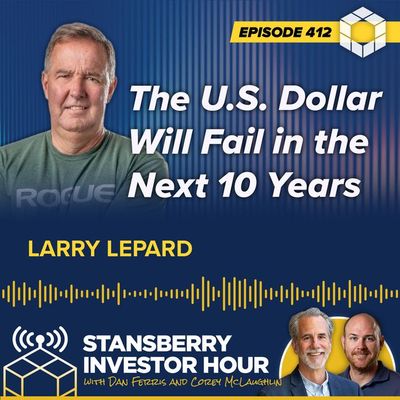
The U.S. Dollar Will Fail in the Next 10 Years
<p class="MsoNormal"><span style= "font-size: 10.0pt; mso-bidi-font-size: 12.0pt; font-family: 'Verdana',sans-serif;"> On this week's <em>Stansberry Investor Hour</em>, Dan and Corey welcome Larry Lepard to the show. Larry – who boasts more than four decades of investing experience – is the co-founder and managing partner of Equity Management Associates. He's also the author of the recently released book <em>The Big Print: What Happened to America and How Sound Money Will Fix It</em>.</span></p> <p class="MsoNormal"><span style= "font-size: 10.0pt; font-family: 'Verdana',sans-serif;">Larry kicks off the show by diving deep into gold – why its price has been soaring recently, where its price could go next, and why a return to the gold standard after "50 years of mismanagement" would be a long-term positive. This leads to a conversation about President Donald Trump's tariffs and their potential unintended consequences, Elon Musk's disappointing Department of Government Efficiency, Trump's run-in with the bond vigilantes, and what could break Federal Reserve Chair Jerome Powell's stubbornness to lower rates. (1:47)</span></p> <p class="MsoNormal"><span style= "font-size: 10.0pt; font-family: 'Verdana',sans-serif;">Next, Larry talks about the psychological difficulty of bottom-fishing in the stock market and how fixing the monetary system could solve many societal problems that disproportionately affect the poor. He explains how exactly the U.S.'s fiat currency has "torn up the social fabric" and favors those who are already wealthy. Plus, Larry gives a multistep solution for how the system can be fixed so it's more fair, and he debunks the popular myth told by certain economists that a return to the gold standard wouldn't work. (25:18)</span></p> <p class="MsoNormal"><span style= "font-size: 10.0pt; mso-bidi-font-size: 12.0pt; font-family: 'Verdana',sans-serif;"> Finally, Larry predicts currency failure within the next 10 years that will lead the U.S. to return to sound money. In the meantime, he advises investors to put their money in assets that the government can't print – gold, silver, bitcoin, and real estate. He says that bondholders are "the suckers at the table" thanks to inflation. And Larry closes things out by discussing the importance of studying history and longer-term cycles, the opportunity today in gold-mining stocks, and why he believes all investors should hold some bitcoin. (43:07)</span></p>
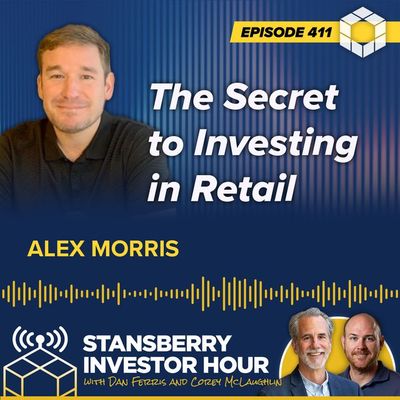
The Secret to Investing in Retail
<p class="MsoNormal"><span style= "font-size: 10.0pt; mso-bidi-font-size: 12.0pt; font-family: 'Verdana',sans-serif;"> On this week's <em>Stansberry Investor Hour</em>, Dan and Corey welcome Alex Morris to the show. Alex is the founder of TSOH (The Science of Hitting) Investment Research and an author. TSOH, which boasts more than 20,000 subscribers, aims to generate attractive long-term returns while providing complete transparency on the research process, portfolio decision-making, and returns.</span></p> <p class="MsoNormal"><span style= "font-size: 10.0pt; font-family: 'Verdana',sans-serif;">Alex kicks off the show by discussing the inspiration behind his new book, <em>Buffett and Munger Unscripted: Three Decades of Investment and Business Insights From the Berkshire Hathaway Shareholder Meetings</em>. He goes in depth on what he learned from Warren Buffett and Charlie Munger in the process of crafting his book, including understanding incentives, management turnover, and which macroeconomic factors are important. (1:46)</span></p> <p class="MsoNormal"><span style= "font-size: 10.0pt; font-family: 'Verdana',sans-serif;">Next, Alex talks about the "pointed" questions Buffett and Munger got during the dot-com era from shareholders who doubted their abilities. Then he breaks down his own investing style, how that style has evolved over the years, and how he got interested in investing in the first place. This leads to a discussion about struggling retailer Five Below (which Alex is keeping an eye on to see if it can turn its business around) and Dollar Tree (which Alex owns and still likes today). (19:53)</span></p> <p class="MsoNormal"><span style= "font-size: 10.0pt; mso-bidi-font-size: 12.0pt; font-family: 'Verdana',sans-serif;"> Finally, Alex delves further into the retail space. He discusses Costco Wholesale versus Walmart, the importance of retailers understanding their core customer base, why Dollar Tree is misunderstood, geographic retail strategies, President Donald Trump's tariffs, and a U.K.-based mixers company he finds attractive. (40:24)</span></p>
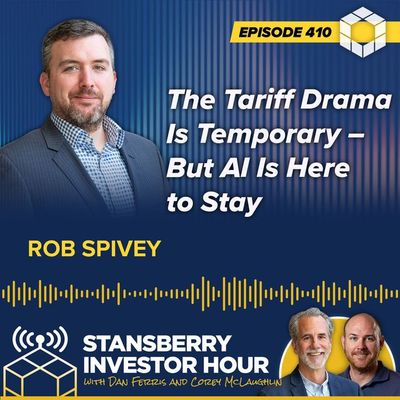
The Tariff Drama Is Temporary – But AI Is Here to Stay
<p class="MsoNormal"><span style= "font-size: 10.0pt; mso-bidi-font-size: 12.0pt; font-family: 'Verdana',sans-serif;"> On this week's <em>Stansberry Investor Hour</em>, Dan and Corey welcome Rob Spivey back to the show. Rob is the director of research at our corporate affiliate Altimetry. With both buy-side and sell-side experience, he offers his unique perspective on the markets today.</span></p> <p class="MsoNormal"><span style= "font-size: 10.0pt; font-family: 'Verdana',sans-serif;">Rob kicks off the show by describing how Altimetry uses "Uniform accounting" to get a better sense of a company's financials and the health of the U.S. market as a whole. This leads to a conversation about corporate profitability, credit risk, and the future of AI. Rob explains the role Elon Musk's Department of Government Efficiency is playing in implementing AI at the federal level, how AI could revamp Medicare and Medicaid, and what the fiscal multiplier effect means for government spending and AI. (1:47)</span></p> <p class="MsoNormal"><span style= "font-size: 10.0pt; font-family: 'Verdana',sans-serif;">Next, Rob breaks down the entire AI ecosystem and its many parts. He cites Twilio as an example of an AI company that's leveraging this technology in interesting ways today. And he goes in depth on a hidden opportunity in AI investing: companies that are warehousing and organizing data. "Nobody's paying attention to them now," he says. Rob then covers the government's profit surplus, how it differs from China's, and how a trade war could lead to a real war. (20:56)</span></p> <p class="MsoNormal"><span style= "font-size: 10.0pt; mso-bidi-font-size: 12.0pt; font-family: 'Verdana',sans-serif;"> Then, Rob divulges America's secret weapon for corporate dominance: the Bill of Rights. He notes that it protects innovation and gives the U.S. a leg up on a global scale. After that, Rob discusses large language models and how they're trained, the usefulness of Google's NotebookLM, and the "revolution" that will be happening in AI in the next three to six months. (39:17)</span></p>
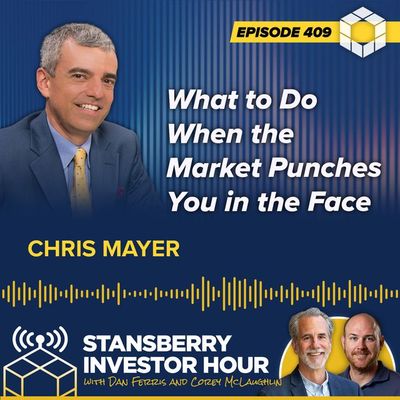
What to Do When the Market Punches You in the Face
<p class="MsoNormal"><span style= "font-size: 10.0pt; mso-bidi-font-size: 12.0pt; font-family: 'Verdana',sans-serif;"> On this week's <em>Stansberry Investor Hour</em>, Dan and Corey welcome Chris Mayer back to the show. Chris is co-founder and portfolio manager of Woodlock House Family Capital – a firm that focuses on long-term, patient investing. He has also written several books, including <em>100 Baggers: Stocks That Return 100-to-1 and How to Find Them</em>.</span></p> <p class="MsoNormal"><span style= "font-size: 10.0pt; mso-bidi-font-size: 12.0pt; font-family: 'Verdana',sans-serif;"> Chris kicks things off by breaking down his "CODE" acronym that he uses for picking stocks – cheap, owner operator, disclosures, and excellent financial condition. He lists Brown & Brown as an example of one such company that checks all four boxes. And he shares a trucking company he likes because of its lower-than-average turnover rate. This leads to a conversation about the importance of management having skin in the game and why investors should mostly leave their portfolios alone. Chris then uses Monster Beverage as a case study for identifying a good company. (1:47)</span></p> <p class="MsoNormal"><span style= "font-size: 10.0pt; mso-bidi-font-size: 12.0pt; font-family: 'Verdana',sans-serif;"> Next, Chris talks about investor psychology. He says that it's difficult to hold stocks through large drawdowns and through periods of boredom, but that's how you can make a lot of money in the long term. Doing nothing is often the best thing you can do for your portfolio. Chris also covers how philosophy has influenced his investing style, the hidden opportunity in Swedish stocks, two specific Swedish companies that he likes today, and why you should always stick to your core principles – even if it means missing some winners along the way. (20:02)</span></p> <p class="MsoNormal"><span style= "font-size: 10.0pt; mso-bidi-font-size: 12.0pt; font-family: 'Verdana',sans-serif;"> Finally, Chris explains that staying true to your investment principles is hardest (yet also most crucial) when times get tough. It all comes down to knowing yourself, your risk tolerance, and what you're most comfortable investing in. Chris shares the names of two spun-off companies he's excited about today, as he expects a big surge in free cash flow for both. He clarifies that these are for holding long term rather than trying to make a quick buck. And Chris finishes with a discussion about why the recent tariff drama doesn't really matter. (39:26)</span></p>
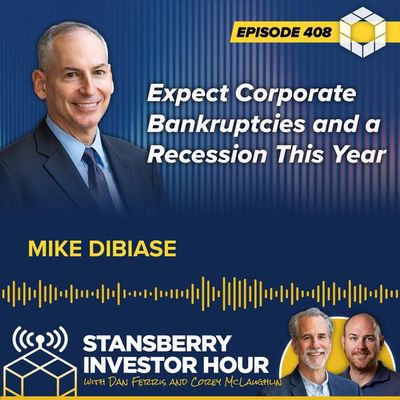
Expect Corporate Bankruptcies and a Recession This Year
<p class="MsoNormal"><span style= "font-size: 10.0pt; mso-bidi-font-size: 12.0pt; font-family: 'Verdana',sans-serif;"> On this week's <em>Stansberry Investor Hour</em>, Dan and Corey welcome their colleague Mike DiBiase back to the show. Mike is the editor of <em>Stansberry's Credit Opportunities</em> and senior analyst for <em>Stansberry's Investment Advisory</em>. </span></p> <p class="MsoNormal"><span style= "font-size: 10.0pt; mso-bidi-font-size: 12.0pt; font-family: 'Verdana',sans-serif;"> Mike kicks off the episode by discussing the rampant fear in the stock market today. He notes that this fear is not yet reflected in the credit market, which is a "mistake," as credit investors should be more concerned. Mike then talks about the lack of good high-yield bonds out there, corporate bankruptcies being on the rise, the worrying number of zombie companies, the Starbucks recession indicator, consumer confidence hitting a 12-year low, and why he believes things are "not going to end well" for the economy. (1:40)</span></p> <p class="MsoNormal"><span style= "font-size: 10.0pt; mso-bidi-font-size: 12.0pt; font-family: 'Verdana',sans-serif;"> Next, Mike examines the budget-deficit problem and the market's expectation that the government will always bail it out. He highlights the fact that the U.S. has been printing money at an above-average rate the past year and says he believes inflation will spike once more as a result. All of this is part of the "new world" that investors will need to learn to navigate, including permanently higher interest rates, bonds being a better choice than stocks, and an inevitable credit crisis similar to the one from 2008. (21:32)</span></p> <p class="MsoNormal"><span style= "font-size: 10.0pt; mso-bidi-font-size: 12.0pt; font-family: 'Verdana',sans-serif;"> Finally, Mike explains the economic difference between tariffs and inflation, how investors can "make a killing" from what's about to happen, and the many advantages corporate bonds have over stocks – such as it being easier to spot a bottom with bonds. He says he's waiting until credit spreads surpass 1,000 basis points, and then he will deploy his strategy of finding the best bonds out there with the lowest risk of defaulting. (40:22)</span></p>
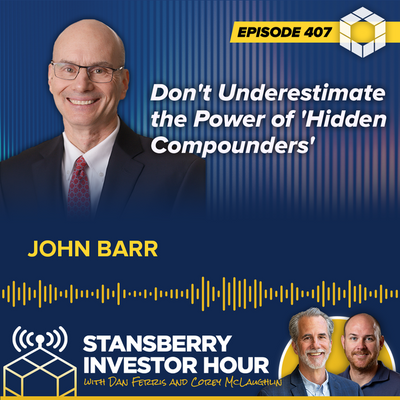
Don't Underestimate the Power of 'Hidden Compounders'
<p class="MsoNormal"><span style= "font-size: 10.0pt; mso-bidi-font-size: 12.0pt; font-family: 'Verdana',sans-serif;"> On this week's <em>Stansberry Investor Hour</em>, Dan and Corey are joined by John Barr. John is a managing director at Needham Funds, where he has served as co-portfolio manager of the Needham Growth Fund and portfolio manager of the Needham Aggressive Growth Fund for 15 years.</span></p> <p class="MsoNormal"><span style= "font-size: 10.0pt; mso-bidi-font-size: 12.0pt; font-family: 'Verdana',sans-serif;"> John kicks things off by discussing his investment philosophy, what Needham Funds does, and the power of compounding. He says he tries to find companies that are hidden compounders that will eventually turn into quality compounders. This leads John to share the four criteria he looks for when trying to find hidden compounders. He names two such companies that fit the criteria, breaking down the thought process for Needham's investing in each one. (1:39)</span></p> <p class="MsoNormal"><span style= "font-size: 10.0pt; mso-bidi-font-size: 12.0pt; font-family: 'Verdana',sans-serif;"> Next, John explains why he's such a fan of family-run businesses and names a power-conversion company he likes that's still being led by its founder. He then discusses what sets Needham apart from other funds, including its preference to hold on to quality companies for a long time – even through 50% drawdowns. And John details how he decides when to actually sell a company, although he notes that he made a mistake with Dick's Sporting Goods. (21:31)</span></p> <p class="MsoNormal"><span style= "font-size: 10.0pt; mso-bidi-font-size: 12.0pt; font-family: 'Verdana',sans-serif;"> Finally, John reminds investors to know and play to their strengths. And he urges them to ignore all the noise in the news, as being successful in the markets requires a fair amount of optimism about the future. Talking broadly, John says that Needham has been investing in infrastructure for the past decade-plus and more recently has been looking at defense companies. He names military shipbuilder Huntington Ingalls Industries as a solid pick today. Plus, he names a couple skilled-labor-school stocks he likes, as skilled labor is set to remain in high demand. (40:58)</span></p>
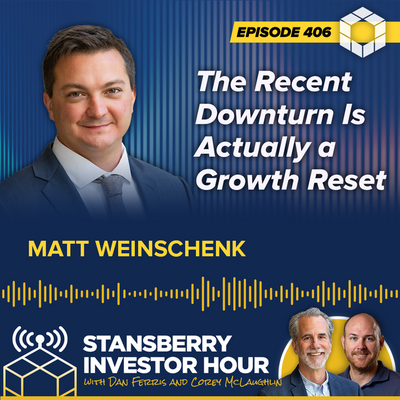
The Recent Downturn Is Actually a Growth Reset
<p class="MsoNormal"><span style= "font-size: 10.0pt; mso-bidi-font-size: 12.0pt; font-family: 'Verdana',sans-serif;"> On this week's <em>Stansberry Investor Hour</em>, Dan and Corey welcome Matt Weinschenk back to the show. Matt is the director of research at Stansberry Research. He's also the editor of the free weekly newsletter <em>This Week on Wall Street</em> and a member of the investment committee for Stansberry Portfolio Solutions.</span></p> <p class="MsoNormal"><span style= "font-size: 10.0pt; mso-bidi-font-size: 12.0pt; font-family: 'Verdana',sans-serif;"> Matt kicks things off by describing what he does at Stansberry Research and what type of investor he is. Because his career began right before the great financial crisis, he says he tends to lean more conservative. This leads to a discussion about controlling risk, preparing for market surprises, and needing to "get slapped in the face a few times" to understand the stakes. After, Matt gives his nuanced take on crypto – from its use for diversification to the "scam" meme coins. (1:39)</span></p> <p class="MsoNormal"><span style= "font-size: 10.0pt; mso-bidi-font-size: 12.0pt; font-family: 'Verdana',sans-serif;"> Next, Matt weighs in on artificial intelligence ("AI") and the huge amounts of capital flowing into the sector. He explains that there are safer ways to invest in AI than buying the headline-making names, using Nvidia versus Cisco Systems as an example. And he points out that even if AI is currently experiencing a bubble, the technology will both benefit the economy and make companies more productive in the long term. (21:40)</span></p> <p class="MsoNormal"><span style= "font-size: 10.0pt; mso-bidi-font-size: 12.0pt; font-family: 'Verdana',sans-serif;"> Finally, Matt goes in depth on the current macroeconomic environment and his outlook for the future. This includes President Donald Trump's tariffs disrupting specific industries, what the VIX and high-yield credit spread are signaling, fears of a recession, and the bond market expecting a growth slowdown. (37:46)</span></p>
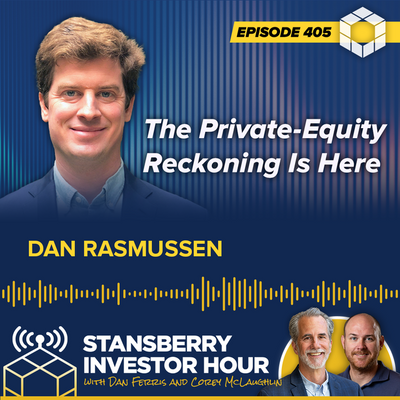
The Private-Equity Reckoning Is Here
<p class="MsoNormal"><span style= "font-size: 10.0pt; mso-bidi-font-size: 12.0pt; font-family: 'Verdana',sans-serif;"> On this week's <em>Stansberry Investor Hour</em>, Dan and Corey welcome Dan Rasmussen back to the show. Dan is the founder and portfolio manager of asset-management firm Verdad Advisers, as well as a bestselling author. His most recent book, <em>The Humble Investor</em>, came out just last month. </span></p> <p class="MsoNormal"><span style= "font-size: 10.0pt; mso-bidi-font-size: 12.0pt; font-family: 'Verdana',sans-serif;"> Dan kicks off the show by explaining what motivated him to write <em>The Humble Investor</em>. This leads to a discussion about why savvy investors should be skeptical of forecasts and why they should always consider whether other investors are looking at the same data and reaching the same conclusions as them. One area where this is a big problem is AI. It's capital intensive with very little return thus far, yet investors are blindly buying into AI stocks on lofty expectations. Dan points out that the "Magnificent Seven" are riskier than most folks realize, and this overvaluing of U.S. stocks has made foreign investors begin to look at other countries' markets for opportunities. (1:47)</span></p> <p class="MsoNormal"><span style= "font-size: 10.0pt; mso-bidi-font-size: 12.0pt; font-family: 'Verdana',sans-serif;"> Next, Dan talks about investors mistakenly being underweight gold for years, whether it's possible to predict a bubble, the pattern of credit crises, and the recent worrying signal of money drying up in private equity. He notes that this tendency for investors to take on more risk in private equity than elsewhere is a disaster waiting to happen. Dan then delves into which parts of the market he finds most and least attractive today. For example, he notes that changing corporate governance for Japanese stocks is an "obvious catalyst" for doubling your money, while short-term macroeconomic factors are keeping him away from U.S. Treasurys. (17:12)</span></p> <p class="MsoNormal"><span style= "font-size: 10.0pt; mso-bidi-font-size: 12.0pt; font-family: 'Verdana',sans-serif;"> Finally, Dan discusses diversification versus "diworsification," the often-ignored problem with passive investing, and the "valuation drop-off" between S&P 500 Index stocks and foreign stocks. With the Magnificent Seven officially in a bear market, Dan declares that "the turning point seems to be upon us" for U.S. stock valuations to come down. And he concludes with a stark reminder about earnings growth for listeners. (38:11)</span></p>
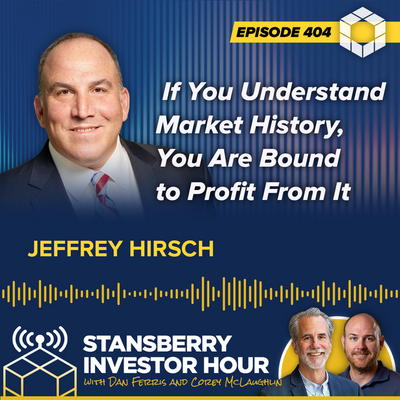
If You Understand Market History, You Are Bound to Profit From It
<p class="MsoNormal"><span style= "font-size: 10.0pt; mso-bidi-font-size: 12.0pt; font-family: 'Verdana',sans-serif;"> On this week's <em>Stansberry Investor Hour</em>, Dan and Corey welcome Jeffrey Hirsch to the show. Jeffrey is the editor-in-chief of the <em>Stock Trader's Almanac</em> – a book that has been published annually since 1967 and that analyzes stock trends, patterns, and cycles. He is also the editor of the Almanac Investor newsletter, which releases monthly and provides strategic investment advice. </span></p> <p class="MsoNormal"><span style= "font-size: 10.0pt; mso-bidi-font-size: 12.0pt; font-family: 'Verdana',sans-serif;"> Jeffrey kicks off the show by describing how he got his start interpreting data and how he eventually ended up working on the <em>Almanac</em>. That leads to a discussion about what has changed in the <em>Almanac</em> over the decades versus what has stayed the same – in terms of both human behavior and content. Jeffrey also talks about President Donald Trump shaking things up, what has happened historically in postelection years, and where he believes the market could go from here. (1:39)</span></p> <p class="MsoNormal"><span style= "font-size: 10.0pt; mso-bidi-font-size: 12.0pt; font-family: 'Verdana',sans-serif;"> Next, Jeffrey reviews the basics of risk control that all the best investors follow and which fundamentals his team looks at to evaluate stocks. He also explains what traders usually get wrong about the moving average convergence divergence ("MACD") indicator and the Santa Claus rally. Moving to the topic of seasonality, Jeffrey explores the flaws in the traditional "sell in May and go away" adage, what the "Christmas in July" phenomenon is, and how market patterns changed after 1949. (18:09)</span></p> <p class="MsoNormal"><span style= "font-size: 10.0pt; mso-bidi-font-size: 12.0pt; font-family: 'Verdana',sans-serif;"> Finally, Jeffrey discusses what led his father, Yale Hirsch, to originally publish the <em>Almanac</em> and how a background in music can help investors to recognize historical cycles and patterns. He then finishes with his opinion on 5,700 being an important level for the S&P 500 Index and gives tips on how you can fight against confirmation bias. (35:05)</span></p>
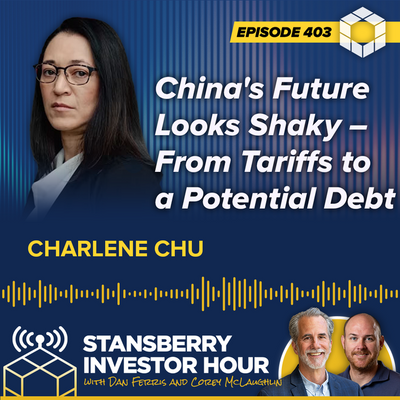
China's Future Looks Shaky – From Tariffs to a Potential Debt Crisis
<p class="MsoNormal"><span style= "font-size: 10.0pt; mso-bidi-font-size: 12.0pt; font-family: 'Verdana',sans-serif;"> On this week's <em>Stansberry Investor Hour</em>, Dan and Corey welcome Charlene Chu to the show. Charlene is the China and India macrofinancial senior analyst at the independent global research firm Autonomous Research. Dubbed the "rock star" of Chinese debt analysis, she joins the podcast to talk all about China and India's current economic happenings. </span></p> <p class="MsoNormal"><span style= "font-size: 10.0pt; mso-bidi-font-size: 12.0pt; font-family: 'Verdana',sans-serif;"> Charlene kicks off the show by explaining her macroeconomic background and experience studying China's economy. She discusses whether China is still worth investing in, which specific area of the Chinese market looks most promising, and what's going on right now in China's property sector. Charlene also goes in depth on President Donald Trump's tariffs that will impact China and what the administration is potentially hoping to gain in negotiations. (1:41)</span></p> <p class="MsoNormal"><span style= "font-size: 10.0pt; mso-bidi-font-size: 12.0pt; font-family: 'Verdana',sans-serif;"> Next, Charlene explores India's weaknesses versus China in becoming a global manufacturing hub – this includes its bureaucracy, onerous labor laws, and lack of infrastructure. She says that India is currently where China was in the 1990s, and the country will require much more development and investment to catch up. Charlene then talks about the good and bad economic effects of China's communist government, China's looming debt crisis, and how the average Chinese consumer differs from an American one. (19:57)</span></p> <p class="MsoNormal"><span style= "font-size: 10.0pt; mso-bidi-font-size: 12.0pt; font-family: 'Verdana',sans-serif;"> Finally, Charlene examines China's demographics and explains why she believes the country's population will fall 60% to 70% by the year 2100. However, despite birth rates dropping, AI and technology may be able to make up for the declining number of humans in manufacturing roles and fill those gaps for several decades. And Charlene closes the conversation by urging U.S. investors not to worry too much about the Trump tariffs just yet, as there may be a method to the madness. (41:55)</span></p>
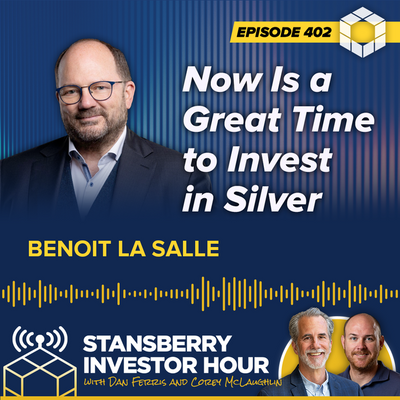
Now Is a Great Time to Invest in Silver
<p class="MsoNormal"><span style= "font-size: 10.0pt; mso-bidi-font-size: 12.0pt; font-family: 'Verdana',sans-serif;"> On this week's <em>Stansberry Investor Hour</em>, Dan and Corey welcome Benoit La Salle to the show. Benoit is the president and CEO of Aya Gold & Silver (AYA.TO). He has more than 25 years of experience developing and operating responsible mining companies in West Africa.</span></p> <p class="MsoNormal"><span style= "font-size: 10.0pt; mso-bidi-font-size: 12.0pt; font-family: 'Verdana',sans-serif;"> Benoit kicks things off by describing Aya's first-mover advantage in Morocco, why the country is destined to become a top mining jurisdiction, and how mining in Saudi Arabia differs from Morocco. He also explains why he's so excited about silver today. While the metal is in high demand as an industrial asset (such as for making solar panels and AI chips), it's not yet fully appreciated as a financial asset. But Benoit believes a shift is inevitable – and already underway – which will cause silver's price to soar. (1:47)</span></p> <p class="MsoNormal"><span style= "font-size: 10.0pt; mso-bidi-font-size: 12.0pt; font-family: 'Verdana',sans-serif;"> Next, Benoit delves into the specifics of Aya's mines in Morocco, including those that aren't yet in production. He shares that Aya is spinning off its Amizmiz Gold Project to a new gold-mining company called Mx2, of which Aya owns 42%. Mx2 is set to go public later this year. Benoit also covers all the advantages of Morocco's low cost of drilling and exploration, the other industry that's booming in Morocco, and why Morocco has such cheap energy. (16:49)</span></p> <p class="MsoNormal"><span style= "font-size: 10.0pt; mso-bidi-font-size: 12.0pt; font-family: 'Verdana',sans-serif;"> Finally, Benoit explains how he first got involved in mining after an encounter with the president of Burkina Faso, why the upside potential in Aya's stock price is still fantastic, and how momentum in silver investing has temporarily slowed since President Donald Trump took office. Further, he breaks down Aya's balance sheet and makes his macroeconomic case for precious metals. (36:10)</span></p>
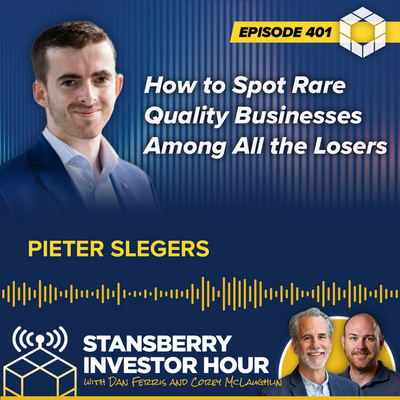
How to Spot Rare Quality Businesses Among All the Losers
<p class="MsoNormal"><span style= "font-size: 10.0pt; mso-bidi-font-size: 12.0pt; font-family: 'Verdana',sans-serif;"> On this week's <em>Stansberry Investor Hour</em>, Dan and Corey welcome Pieter Slegers to the show. Pieter is the founder of Compounding Quality, an investment newsletter that boasts more than 440,000 subscribers. </span></p> <p class="MsoNormal"><span style= "font-size: 10.0pt; mso-bidi-font-size: 12.0pt; font-family: 'Verdana',sans-serif;"> Pieter kicks things off by sharing how he got his start in asset management, why he began investing in U.S. stocks, and the difference between value investing and quality investing. This leads to a discussion about Warren Buffett's impressive track record and one particular software company that Pieter likes today. He breaks down several criteria he uses when looking for investment opportunities – including founder-led businesses, long-tenured CEOs, and wide moats – and how exactly he narrows down his list. (1:40)</span></p> <p class="MsoNormal"><span style= "font-size: 10.0pt; mso-bidi-font-size: 12.0pt; font-family: 'Verdana',sans-serif;"> Next, Pieter talks about the evolution of his successful X account that he began anonymously but eventually put his face on after it gained a lot of attention. As Pieter emphasizes, if you're taking investment advice from someone, that person should be invested alongside you and have skin in the game. For that reason, Pieter is looking to launch an investment fund later this year. Pieter then lists off a few companies he likes today and discusses the importance of investing in growing end markets. (20:30)</span></p> <p class="MsoNormal"><span style= "font-size: 10.0pt; mso-bidi-font-size: 12.0pt; font-family: 'Verdana',sans-serif;"> Finally, Pieter gives his thoughts on the balancing act between paying high valuations for good companies versus missing an opportunity to own a great business. As Pieter details, it's all about an investor's individual risk tolerance and whichever strategy works best for them. Pieter also covers the flaws in discounted cash flow ("DCF") models, two companies that are overpriced today based on reverse DCF, and the three valuation methods he personally uses. (37:47)</span></p>
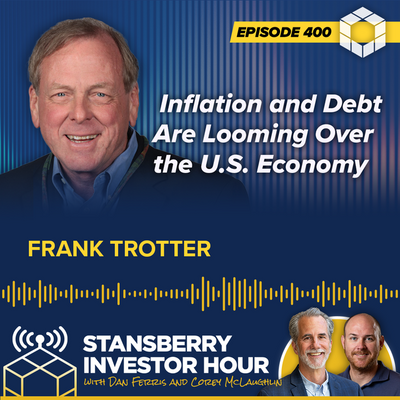
Inflation and Debt Are Looming Over the U.S. Economy
<p><span dir="ltr" role="presentation">On this week's</span> <span dir="ltr" role="presentation">Stansberry Investor Hour</span><span dir="ltr" role="presentation">, Dan and Corey welcome Frank Trotter to the show.</span><br role="presentation" /> <span dir="ltr" role="presentation">Frank is the president of Battle Bank, which is looking to revolutionize the digital-banking</span><br role="presentation" /> <span dir="ltr" role="presentation">industry.</span></p> <p><br role="presentation" /> <span dir="ltr" role="presentation">Frank kicks off the show by sharing how he got his start in banking and how interest rates</span><br role="presentation" /> <span dir="ltr" role="presentation">have changed over the decades due to various crises and bear markets. That leads to a</span><br role="presentation" /> <span dir="ltr" role="presentation">discussion about the U.S.'s 10-year Treasury yield and why it has soared since the Federal</span><br role="presentation" /> <span dir="ltr" role="presentation">Reserve cut rates. Frank also dives into EverBank, the direct-to-consumer online bank he co-</span><br role="presentation" /> <span dir="ltr" role="presentation">founded in 1998 that amassed $28 billion in total assets. (1:40)</span></p> <p><br role="presentation" /> <span dir="ltr" role="presentation">Next, Frank explains what the current regulatory environment is like and how EverBank</span><br role="presentation" /> <span dir="ltr" role="presentation">survived the dot-com bust. He then goes in depth on Battle Bank, which is focusing on the</span><br role="presentation" /> <span dir="ltr" role="presentation">national direct-to-consumer branchless market. Frank covers Battle Bank's conservative</span><br role="presentation" /> <span dir="ltr" role="presentation">strategy for lending money, whether environmentalism and politics have had any impact on</span><br role="presentation" /> <span dir="ltr" role="presentation">lending to natural resource companies, and the specific advantages Battle Bank has over</span><br role="presentation" /> <span dir="ltr" role="presentation">larger banks. (19:14)</span></p> <p><br role="presentation" /> <span dir="ltr" role="presentation">Finally, Frank talks about crypto acceptance at Battle Bank, "eCash" being ahead of its time</span><br role="presentation" /> <span dir="ltr" role="presentation">in the 1990s, and the larger limitations of bitcoin that will impede it from becoming a</span><br role="presentation" /> <span dir="ltr" role="presentation">reserve currency. He also gives his thoughts on Elon Musk's Department of Government</span><br role="presentation" /> <span dir="ltr" role="presentation">Efficiency and its lofty goal of cutting $2 trillion in federal spending. And he closes the</span><br role="presentation" /> <span dir="ltr" role="presentation">episode out by urging listeners to think about the future and ask themselves some tough</span><br role="presentation" /> <span dir="ltr" role="presentation">questions. (37:25)</span></p>
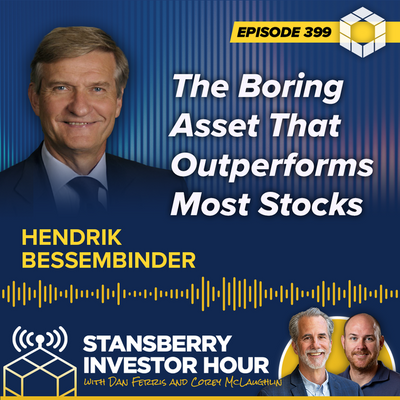
The Boring Asset That Outperforms Most Stocks
<p class="MsoNormal"><span style= "font-size: 10.0pt; mso-bidi-font-size: 12.0pt; font-family: 'Verdana',sans-serif;"> On this week's <em>Stansberry Investor Hour</em>, Dan and Corey welcome Hendrik Bessembinder to the show. Hendrik is a business professor at Arizona State University. With more than 40 years of teaching experience and 25 years of consulting experience, he joins the show to impart some of what he has discovered over his decades of work.</span></p> <p class="MsoNormal"><span style= "font-size: 10.0pt; mso-bidi-font-size: 12.0pt; font-family: 'Verdana',sans-serif;"> Hendrik kicks things off by introducing himself and sharing how he got involved in teaching. After that, he talks about his breakthrough research studying the performance of stocks versus Treasury bills, why investing over a long time horizon is crucial, and the importance of finding a competitive advantage in the markets. Hendrik then compares stock picking with professional athletics, as both are rare skills that only small portions of the population excel at. (1:47)</span></p> <p class="MsoNormal"><span style= "font-size: 10.0pt; mso-bidi-font-size: 12.0pt; font-family: 'Verdana',sans-serif;"> Next, Hendrik reveals that he's skeptical of any system that alleges it can make you wealthy, because the markets are competitive and constantly evolving. He says it all comes down to probabilities – and trying to gain an advantage that will nudge those probabilities in your favor. Hendrik also explains why he believes now is "the best trading environment ever" for retail investors in terms of cost and reliability. And he gives his thoughts on passive investing, the Magnificent Seven stocks, and diversification. (22:44)</span></p> <p class="MsoNormal"><span style= "font-size: 10.0pt; mso-bidi-font-size: 12.0pt; font-family: 'Verdana',sans-serif;"> Finally, Hendrik discusses which assets he personally has in his portfolio, his concerns about inflation, the benefits of Treasury inflation-protected securities ("TIPS"), and the downfall of meme stocks. Plus, he responds to popular criticism about the value of a Master of Business Administration degree. (40:51)</span></p>
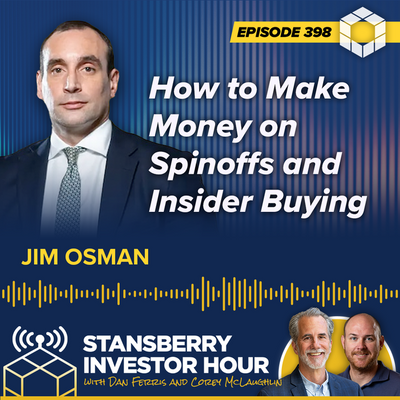
How to Make Money on Spinoffs and Insider Buying
<p class="MsoNormal"><span style= "font-size: 10.0pt; mso-bidi-font-size: 12.0pt; font-family: 'Verdana',sans-serif;"> On this week's <em>Stansberry Investor Hour</em>, Dan and Corey welcome Jim Osman back to the show. Jim is the founder and chief vision officer of consulting group The Edge – which helps its clients and investors unlock hidden corporate value from "global special situations."</span></p> <p class="MsoNormal"><span style= "font-size: 10.0pt; mso-bidi-font-size: 12.0pt; font-family: 'Verdana',sans-serif;"> Jim kicks off the show by detailing his new book that's coming out next month. It's targeted at individual investors, giving them more tools to succeed against Wall Street. Jim also discusses the importance of being yourself on social media, staying objective when it comes to investing, and how he finds special situations to profit from – mainly, spinoffs and insider buying. He explains how everyday investors can gain both an analytical edge and a behavioral edge over the markets. But as he warns, gaining such an edge involves doing your own hard work. (1:47)</span></p> <p class="MsoNormal"><span style= "font-size: 10.0pt; mso-bidi-font-size: 12.0pt; font-family: 'Verdana',sans-serif;"> Next, Jim covers what's going on in the markets right now. He says there are a lot of spinoffs happening, but he has found that in the past year, the parent company has provided the best value. Further, he shares how he identifies the best spinoffs, how the future factors into his investment decisions, and why he believes value investing is dead. Jim then names two companies undergoing a spinoff that he finds attractive today, and one that he's keeping on his radar. (19:54)</span></p> <p class="MsoNormal"><span style= "font-size: 10.0pt; mso-bidi-font-size: 12.0pt; font-family: 'Verdana',sans-serif;"> Finally, Jim discusses a recent <em>Forbes</em> piece he penned about Boeing's current problems. The company is hemorrhaging money and doesn't have a visionary leader to right the ship, but spinoffs could be the solution. Jim says Boeing is "really going to have to do something." After, he circles back to – and goes further in depth on – insider buying. And he shares his thoughts on initial public offerings and special purpose acquisition companies. (36:19)</span></p>
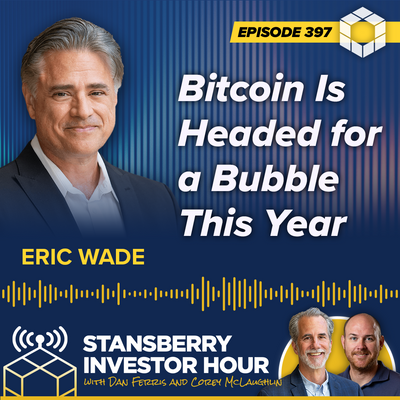
Bitcoin Is Headed for a Bubble This Year
<p class="MsoNormal"><span style= "font-size: 10.0pt; mso-bidi-font-size: 12.0pt; font-family: 'Verdana',sans-serif;"> On this week's <em>Stansberry Investor Hour</em>, Dan and Corey welcome their colleague Eric Wade back to the show. Eric is the editor of <em>Crypto Capital</em> and <em>Stansberry Innovations Report</em> here at Stansberry Research. He returns to the podcast to talk all about crypto – from the bitcoin bubble he expects to happen this year to two free crypto recommendations.<span style= "mso-spacerun: yes;"> </span></span></p> <p class="MsoNormal"><span style= "font-size: 10.0pt; mso-bidi-font-size: 12.0pt; font-family: 'Verdana',sans-serif;"> Eric kicks off the show by explaining the four-year bitcoin cycle. He breaks down how bitcoin halvings fit into it and its four one-year parts – crash, accumulation, growth, and bubble. He also covers how this cycle has played out in the past, optimism fueled by Donald Trump's presidential win, the possibility of a U.S. Bitcoin Strategic Reserve, tailwinds for further crypto adoption, and several indicators to help you spot the top of the next bitcoin bubble. However, he warns listeners to temper their expectations for gains this year. (1:46)</span></p> <p class="MsoNormal"><span style= "font-size: 10.0pt; mso-bidi-font-size: 12.0pt; font-family: 'Verdana',sans-serif;"> Next, Eric discusses the exciting world of "altcoins," i.e., cryptos other than bitcoin. These altcoins can range from silly (such as meme coins like Fartcoin) to incredibly useful (solving real-world problems). In <em>Crypto Capital</em>, Eric and his team are focused on finding the latter – "projects that are established yet phenomenally undervalued." If you're a bitcoin skeptic, Eric urges you to give altcoins a chance. (24:34)</span></p> <p class="MsoNormal"><span style= "font-size: 10.0pt; mso-bidi-font-size: 12.0pt; font-family: 'Verdana',sans-serif;"> Finally, Eric lists off two altcoins that he likes today. The first one is up more than 700% in the <em>Crypto Capital</em> portfolio, and he believes it will continue doing really well. And the second altcoin has been largely hated ever since it collapsed 90%-plus. But Eric and his team believe it could soar 10 times over the next two years and eventually challenge heavyweights Solana and Ethereum, as its "superior" blockchain technology is different from anything else out there. (40:30)</span></p>
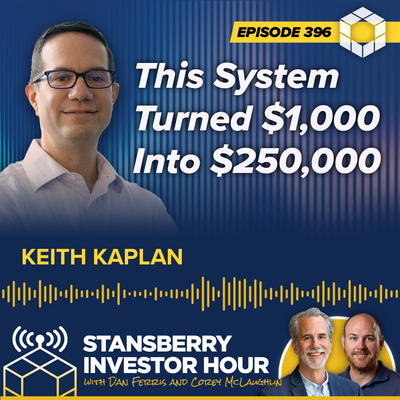
This System Turned $1,000 Into $250,000
<p class="MsoNormal"><span style= "font-size: 10.0pt; mso-bidi-font-size: 12.0pt; font-family: 'Verdana',sans-serif;"> On this week's <em>Stansberry Investor Hour</em>, Dan and Corey welcome Keith Kaplan back to the show. Keith is the CEO of our corporate affiliate TradeSmith. And he's excited to share a breakthrough technology that he and his team have worked tirelessly to develop...</span></p> <p class="MsoNormal"><span style= "font-size: 10.0pt; mso-bidi-font-size: 12.0pt; font-family: 'Verdana',sans-serif;"> Keith kicks off the show by discussing how you can use TradeSmith's new software to leverage stocks and short-term moves in order to generate income. It involves understanding both market seasonality and an individual stock's seasonality. Keith uses Tesla as an example and breaks down how he made 50% short-term gains just from reviewing past data trends. He notes that TradeSmith's data gets updated constantly, so if patterns change, users will know. After running 2.2 quintillion market tests, the TradeSmith team found the most optimal seasonality periods for 5,000 individual stocks and funds. And the numbers speak for themselves, with an 82.8% win rate and median gains of 6% over 15 trading days. (1:51)</span></p> <p class="MsoNormal"><span style= "font-size: 10.0pt; mso-bidi-font-size: 12.0pt; font-family: 'Verdana',sans-serif;"> Next, Keith goes further in depth about how the system works – including sending entry and exit alerts for each position – and how human biases come into play. He emphasizes that this tool is made for investors all across the interaction spectrum... So you can have TradeSmith fish for you and tell you which stocks to buy, or you can do the fishing yourself and use the system to research stocks, or a combination of the two. Keith also explores how TradeSmith's team looks at past cyclical patterns to select the best stocks. (21:16)</span></p> <p class="MsoNormal"><span style= "font-size: 10.0pt; mso-bidi-font-size: 12.0pt; font-family: 'Verdana',sans-serif;"> Finally, Keith shares how the algorithm works for options trading. In testing, it turned $1,000 into $250,000 over 16 years. Keith urges listeners to try the system with conservative position sizing and see for themselves the stellar results they'll get. It's all available in the <em>Trade Cycles</em> newsletter by TradeSmith. And as Keith hammers home, this technology is very advanced. Since no two stocks or funds are the same, no two algorithms end up being the same for them. (37:56)</span></p>
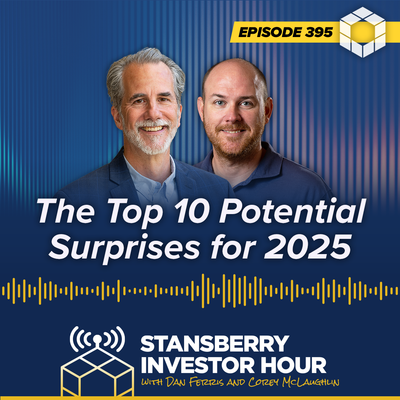
The Top 10 Potential Surprises for 2025
<p class="MsoNormal"><span style= "font-size: 10.0pt; mso-bidi-font-size: 12.0pt; font-family: 'Verdana',sans-serif;"> On this week's <em>Stansberry Investor Hour</em>, Dan and Corey share their annual list of Top 10 Potential Surprises for the new year. As Dan clarifies from the outset, these are NOT predictions. They're simply things that would surprise investors in 2025 if they happened.</span></p> <p class="MsoNormal"><span style= "font-size: 10.0pt; mso-bidi-font-size: 12.0pt; font-family: 'Verdana',sans-serif;"> We won't spoil the surprises. But just to give you an idea, you'll hear about everything from bitcoin to Elon Musk's Department of Government Efficiency to a possible Stansberry Research mayor.</span></p> <p class="MsoNormal"><span style= "font-size: 10.0pt; mso-bidi-font-size: 12.0pt; font-family: 'Verdana',sans-serif;"> Even if Dan and Corey's surprises don't come about this year, this exercise is a reminder for investors to keep their minds open and to consider a broad range of outcomes. </span></p> <p class="MsoNormal"><span style= "font-size: 10.0pt; mso-bidi-font-size: 12.0pt; font-family: 'Verdana',sans-serif;"> Surprise No. 1: 1:51<br /></span><span style= "font-size: 10.0pt; mso-bidi-font-size: 12.0pt; font-family: 'Verdana',sans-serif;">Surprise No. 2: 5:43<br /></span><span style= "font-size: 10.0pt; mso-bidi-font-size: 12.0pt; font-family: 'Verdana',sans-serif;">Surprise No. 3: 10:59<br /></span><span style= "font-size: 10.0pt; mso-bidi-font-size: 12.0pt; font-family: 'Verdana',sans-serif;">Surprise No. 4: 17:11<br /></span><span style= "font-size: 10.0pt; mso-bidi-font-size: 12.0pt; font-family: 'Verdana',sans-serif;">Surprise No. 5: 21:25<br /></span><span style= "font-size: 10.0pt; mso-bidi-font-size: 12.0pt; font-family: 'Verdana',sans-serif;">Surprise No. 6: 26:06<br /></span><span style= "font-size: 10.0pt; mso-bidi-font-size: 12.0pt; font-family: 'Verdana',sans-serif;">Surprise No. 7: 29:28<br /></span><span style= "font-size: 10.0pt; mso-bidi-font-size: 12.0pt; font-family: 'Verdana',sans-serif;">Surprise No. 8: 33:04<br /></span><span style= "font-size: 10.0pt; mso-bidi-font-size: 12.0pt; font-family: 'Verdana',sans-serif;">Surprise No. 9: 36:26<br /></span><span style= "font-size: 10.0pt; mso-bidi-font-size: 12.0pt; font-family: 'Verdana',sans-serif;">Surprise No. 10: 41:31</span></p> <p class="MsoNormal"><span style= "font-size: 10.0pt; mso-bidi-font-size: 12.0pt; font-family: 'Verdana',sans-serif;"> </span></p>
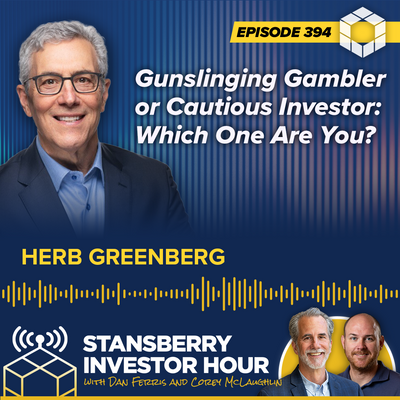
Gunslinging Gambler or Cautious Investor: Which One Are You?
<p class="MsoNormal"><span style= "font-size: 10.0pt; mso-bidi-font-size: 12.0pt; font-family: 'Verdana',sans-serif;"> On this week's <em>Stansberry Investor Hour</em>, Dan and Corey welcome Herb Greenberg back to the show. Herb started out as a financial journalist and now publishes <em>On the Street</em>, a newsletter that offers observations, insights, and opinions on various stocks and the broad market. Herb has spent 50 years researching and writing about the markets, and he joins the podcast to impart some of his wisdom.</span></p> <p class="MsoNormal"><span style= "font-size: 10.0pt; mso-bidi-font-size: 12.0pt; font-family: 'Verdana',sans-serif;"> Herb starts off by reintroducing himself, his opinions on market risk, and his history with long-biased research. He emphasizes that knowing yourself, your psychological makeup, and your skill set are crucial components to success. Some investors thrive under the pressure and enjoy the gambling nature of stocks, while others prefer to sleep well at night and take a more cautious, long-term approach. Either route is OK. And the same principle applies to specifics like when to sell a stock... "There's no one size fits all," Herb says. But the upside to every mistake is that you'll quickly learn more about yourself. (1:22)</span></p> <p class="MsoNormal"><span style= "font-size: 10.0pt; mso-bidi-font-size: 12.0pt; font-family: 'Verdana',sans-serif;"> Next, Herb discusses a recent post in his <em>On the Street</em> newsletter about home-furnishings company RH. Not long ago, RH's CEO made comments concerning debt that raised many red flags. This leads to a conversation about software company MicroStrategy, which has been using debt to buy bitcoin. "It's a pyramid atop a pyramid," Herb quips. He also shares his thoughts on bitcoin itself, talks about the 2021 market mania where "everyone was a bag holder," and dives into how retail and institutional investors differ in risk versus reward. (19:27)</span></p> <p class="MsoNormal"><span style= "font-size: 10.0pt; mso-bidi-font-size: 12.0pt; font-family: 'Verdana',sans-serif;"> Finally, Herb evaluates today's market optimism and the potential for an inflection point. He notes that many garbage stocks have gone from deep in the red to in the green this year for no reason other than hype. Herb then urges investors not to get complacent with their portfolio holdings and to always consider differing opinions on stocks, in case the setup has changed since you first bought in. "You lose sight of the ones that have not been problem children." Herb rounds things out with a discussion about short selling and market inefficiencies created by passive investing. (38:29)</span></p>
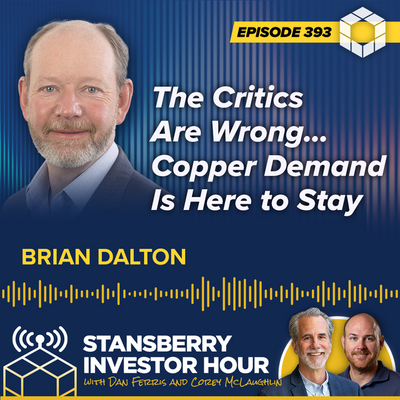
The Critics Are Wrong... Copper Demand Is Here to Stay
<p class="MsoNormal"><span style= "font-size: 10.0pt; mso-bidi-font-size: 12.0pt; font-family: 'Verdana',sans-serif;"> On this week's <em>Stansberry Investor Hour</em>, Dan and Corey welcome Brian Dalton back to the show. Brian is president and CEO of Altius Minerals, a diversified mining royalty and streaming company operating in Canada, the U.S., and Brazil.</span></p> <p class="MsoNormal"><span style= "font-size: 10.0pt; mso-bidi-font-size: 12.0pt; font-family: 'Verdana',sans-serif;"> Brian kicks things off by sharing the basics of Altius Minerals – what the company does, what sets it apart from other natural resource royalty companies, and the option value of its assets. He also talks a bit about his background and how he got his start in prospecting. (1:21)</span></p> <p class="MsoNormal"><span style= "font-size: 10.0pt; mso-bidi-font-size: 12.0pt; font-family: 'Verdana',sans-serif;"> Next, Brian explores the renewable-energy part of the business. Altius took its coal revenues and reinvested those to write royalties on renewable-energy projects, particularly wind and solar. As Brian explains, nearly all of these projects have some aspect involving energy storage. And best of all, renewable energy's resource life is basically "infinite." (15:53)</span></p> <p class="MsoNormal"><span style= "font-size: 10.0pt; mso-bidi-font-size: 12.0pt; font-family: 'Verdana',sans-serif;"> Then, Brian delves into copper. He urges listeners to ignore all of the noise around the metal – from both the "woke" and "antiwoke" sides of the aisle – and to realize that demand is steadily rising. In the short term, he says that investors can really take advantage of volatility and the irrationality of price cycles. But there's also a lot of money to be made long term, as demand isn't going anywhere. "Copper is electricity," Brian notes. Further, he discusses incentivization prices, operating costs, and the future of the industry. (28:59)</span></p> <p class="MsoNormal"><span style= "font-size: 10.0pt; mso-bidi-font-size: 12.0pt; font-family: 'Verdana',sans-serif;"> Finally, Brian talks about nuclear energy's prospects, Altius' history with uranium royalties, and how he makes decisions about Altius' capital allocation. Unlike many other companies, Altius treats share buybacks as if they're competing against external investment opportunities. If the best value in the market is in the assets Altius already owns, and if there's a wide spread between that value and the share price, only then do buybacks happen. (44:50)</span></p>
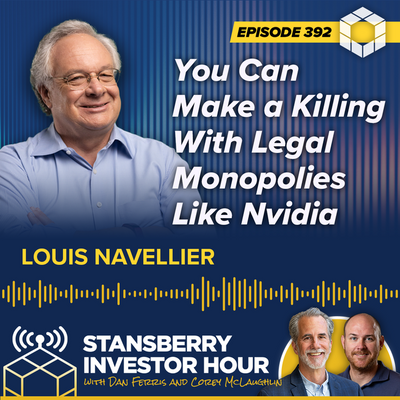
You Can Make a Killing With Legal Monopolies Like Nvidia
<p class="MsoNormal"><span style= "font-size: 10.0pt; mso-bidi-font-size: 12.0pt; font-family: 'Verdana',sans-serif;"> On this week's <em>Stansberry Investor Hour</em>, Dan and Corey are joined by Louis Navellier. Louis is a growth investor with more than 40 years of experience in the markets. His <em>Growth Investor</em> newsletter at our corporate affiliate InvestorPlace is catered toward individual investors. It helps give these folks an easy-to-understand look at current market trends and opportunities.</span></p> <p class="MsoNormal"><span style= "font-size: 10.0pt; mso-bidi-font-size: 12.0pt; font-family: 'Verdana',sans-serif;"> Louis kicks things off by sharing how he got his start in finance, how he learned about "anomalies and efficiencies" in the market, and why he dislikes banking stocks. He predicts that the implosion of private credit is going to be the next black-swan event to upset the markets. With 11% yields, private credit simply isn't sustainable. Louis also discusses what changes President-elect Donald Trump will have to make for prosperity to rise, as well as what's happening in Ukraine. (1:14)</span></p> <p class="MsoNormal"><span style= "font-size: 10.0pt; mso-bidi-font-size: 12.0pt; font-family: 'Verdana',sans-serif;"> Next, Louis touches on the market narrowing, describes which metrics his stock-grading system factors in, lists off several growth stocks he likes today, and reviews many legal monopolies he has profited from. One such name is chipmaker Nvidia, which Louis says he'll "be holding through the end of the decade." After that, he talks about why he's bullish on natural gas, how he spots legal monopolies in the first place, and the Biden administration's hostility toward tech. (18:55)</span></p> <p class="MsoNormal"><span style= "font-size: 10.0pt; mso-bidi-font-size: 12.0pt; font-family: 'Verdana',sans-serif;"> Finally, Louis shares how he decides when to cut a stock loose and gives his take on nuclear energy. When it comes to his investing philosophy, he notes, "I only buy things when they earn money." And Louis closes with his reasoning for not buying utility stocks. (38:22)</span></p> <p class="MsoNormal"><span style= "font-size: 10.0pt; mso-bidi-font-size: 12.0pt; font-family: 'Verdana',sans-serif;"> </span></p>
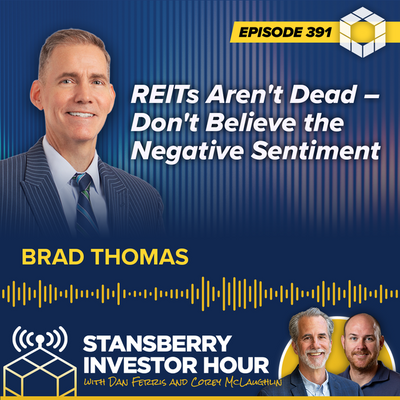
REITs Aren't Dead – Don't Believe the Negative Sentiment
<p class="MsoNormal"><span style= "font-size: 10.0pt; mso-bidi-font-size: 12.0pt; font-family: 'Verdana',sans-serif;"> On this week's <em>Stansberry Investor Hour</em>, Dan and Corey welcome Brad Thomas to the show. Brad is the founder of our corporate affiliate Wide Moat Research. There, he serves as editor for the <em>Wide Moat Daily</em>, <em>The Wide Moat Letter</em>, the <em>Intelligent Options Advisor</em>, and the <em>High-Yield Advisor</em> newsletters. Brad joins the podcast to share some of his three decades' worth of experience in real estate.</span></p> <p class="MsoNormal"><span style= "font-size: 10.0pt; mso-bidi-font-size: 12.0pt; font-family: 'Verdana',sans-serif;"> Brad kicks things off by describing his background in real estate, how he lost almost everything during the Great Recession, and how his experience helps him with his job today researching companies. Next, Brad debunks the three largest perceived overhangs for real estate investment trusts ("REITs"): debt maturities, rising rates, and the "dead" office sector. As he explains, they aren't as big of factors for equity REITs as many believe. And in particular, there are some gems that investors can find within the office sector. (1:47)</span></p> <p class="MsoNormal"><span style= "font-size: 10.0pt; mso-bidi-font-size: 12.0pt; font-family: 'Verdana',sans-serif;"> Next, Brad talks about the growth potential for many specific REIT sectors, including cannabis, cell towers, data centers, and casinos. He throws out a few stock names along the way, and also explains what influence technology has had on REITs and their operations. This leads Brad to share his "trifecta approach" for diversifying between the three main beneficiaries of technology advancements. And he gives several reasons why investors should even bother to get into REITs right now, from valuations to Donald Trump. (18:49)</span></p> <p class="MsoNormal"><span style= "font-size: 10.0pt; mso-bidi-font-size: 12.0pt; font-family: 'Verdana',sans-serif;"> Finally, Brad points out that most companies have real estate components. So understanding how business is created from the ground up gives him and his team at Wide Moat Research an advantage. He emphasizes that Wide Moat's main goals are principal preservation and finding "sleep well at night" stocks. Brad then finishes by sharing which sectors outside of real estate he finds most attractive today. (41:17)</span></p>

Why a Long-Term Investment Focus Makes All the Difference
<p class="MsoNormal"><span style= "font-size: 10.0pt; mso-bidi-font-size: 12.0pt; font-family: 'Verdana',sans-serif;"> On this week's <em>Stansberry Investor Hour</em>, Dan and Corey are joined by Matt Franz. Matt is founder and principal of Eagle Point Capital. The registered investment adviser aims to build wealth in the long term while avoiding the permanent loss of capital. </span></p> <p class="MsoNormal"><span style= "font-size: 10.0pt; mso-bidi-font-size: 12.0pt; font-family: 'Verdana',sans-serif;"> Matt kicks off the show by describing Eagle Point Capital's ownership mentality for buying stocks and what qualities he looks for in a company. As he explains, businesses that have very simple unit economics and that are noncyclical tend to be the best. He also zeroes in on specific metrics to evaluate stocks, the importance of owning businesses that reinvest capital, and his "replication mode" method for assessing a company's future potential. (1:41)</span></p> <p class="MsoNormal"><span style= "font-size: 10.0pt; mso-bidi-font-size: 12.0pt; font-family: 'Verdana',sans-serif;"> Next, Matt talks about whether brands can be economic moats. He urges investors not to conflate brand awareness with pricing power, using consumer-electronics company Toshiba as an example. This leads to a conversation about luxury brands, why Matt prefers distributors to retailers, and why he only invests in companies worth 10 times earnings or less. Matt then breaks down his long-term focus, discussing intrinsic value and giving listeners a reality check. (17:10)</span></p> <p class="MsoNormal"><span style= "font-size: 10.0pt; mso-bidi-font-size: 12.0pt; font-family: 'Verdana',sans-serif;"> Finally, Matt highlights the discipline it takes to be a long-term value investor, as it's human nature to want to add more to a position when it's soaring or sell shares on bad news. However, when you own good businesses, it's best to sit on your hands and do nothing. Matt also shares some guidelines Eagle Point Capital follows when searching for stocks in terms of market cap, industry, risk factor, and cyclicality. (37:53)</span></p>
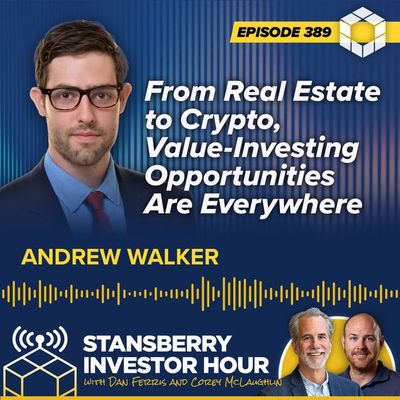
From Real Estate to Crypto, Value-Investing Opportunities Are Everywhere
<p class="MsoNormal"><span style= "font-size: 10.0pt; mso-bidi-font-size: 12.0pt; font-family: 'Verdana',sans-serif;"> On this week's <em>Stansberry Investor Hour</em>, Dan and Corey welcome Andrew Walker to the show. Andrew is a portfolio manager at value-oriented hedge fund Rangeley Capital and author of <em>Yet Another Value Blog</em>. He focuses on microcap, deep-value, and special-situations investments.</span></p> <p class="MsoNormal"><span style= "font-size: 10.0pt; mso-bidi-font-size: 12.0pt; font-family: 'Verdana',sans-serif;"> Andrew kicks off the show by sharing how he got his start as an investor and what inspired him to focus on value investing. He says that while value investing has gotten more competitive over the years, investors can still do well in this space if they think outside of the box. Andrew also discusses his renewed interest in special purpose acquisition companies ("SPACs") and whether de-SPACs are worth wading through for winners. (1:47)</span></p> <p class="MsoNormal"><span style= "font-size: 10.0pt; mso-bidi-font-size: 12.0pt; font-family: 'Verdana',sans-serif;"> Next, Andrew names a couple of companies he invested in and gives his reasoning for each play. The first is a bitcoin miner that emerged from bankruptcy. As Andrew explains, there are a multitude of problems with bitcoin mining, but this miner has managed to curtail some of those and stand out from the pack with its integration of AI. Andrew also talks about the revival of spinoffs, including one particular real estate investment trust that he likes thanks to its huge margin of safety. (15:43)</span></p> <p class="MsoNormal"><span style= "font-size: 10.0pt; mso-bidi-font-size: 12.0pt; font-family: 'Verdana',sans-serif;"> Finally, Andrew discusses another spinoff he has invested in – a company that owns prime real estate in Manhattan. It has a lot of cash and no debt on its balance sheet. And with legendary investor Bill Ackman's hedge fund owning nearly 40% of the company, Andrew believes there's much more upside ahead and that a turnaround is likely. (38:39)</span></p>
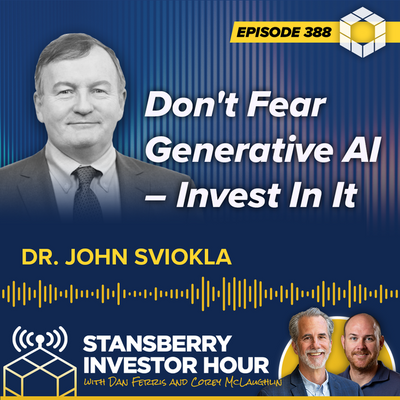
Don't Fear Generative AI – Invest In It
<p class="MsoNormal"><span style= "font-size: 10.0pt; mso-bidi-font-size: 12.0pt; font-family: 'Verdana',sans-serif;"> On this week's <em>Stansberry Investor Hour</em>, Dan and Corey are joined by Dr. John Sviokla. John is an author, executive fellow at Harvard Business School, and co-founder of GAI Insights – the world's leading generative artificial-intelligence ("AI") analyst firm. He joins the podcast to talk all things AI – its investing potential, limitations, and real-world applications.</span></p> <p class="MsoNormal"><span style= "font-size: 10.0pt; mso-bidi-font-size: 12.0pt; font-family: 'Verdana',sans-serif;"> John kicks off the show by explaining how GAI Insights is helping organizations and communities understand and use generative AI. Currently, many executives don't know enough about it to even recognize its opportunities in the workplace. John says that workers whose jobs involve words, images, numbers, and sounds will be the most impacted by this technology. He also breaks down the three new forms of capital: network, behavioral, and cognitive. When it comes to the latter, businesses are trying to protect their proprietary data and processes today by keeping their AI behind firewalls. (1:46)</span></p> <p class="MsoNormal"><span style= "font-size: 10.0pt; mso-bidi-font-size: 12.0pt; font-family: 'Verdana',sans-serif;"> Next, John talks about how these AI models are trained, the process of training workers to use AI, and the limitations of AI. One such area AI struggles with is creating new ways to look at a problem. However, it's surprisingly good at empathizing and mimicking human emotions. John then discusses AI's computability, the transformer algorithm, and how AI could impact the broad market. (19:11)</span></p> <p class="MsoNormal"><span style= "font-size: 10.0pt; mso-bidi-font-size: 12.0pt; font-family: 'Verdana',sans-serif;"> Finally, John describes the four levels of generative-AI adoption. Those in the top level – "intelligence leveragers" – drive value by using AI to build AI. Right now, technology is the only industry with these kinds of companies. But John says that in the next five to seven years, each major industry will have an intelligence leverager. This presents a huge opportunity for investors. John gives several real-world situations across different industries (like pharmaceuticals and financials) where AI implementation will be game-changing. (40:35)</span></p>
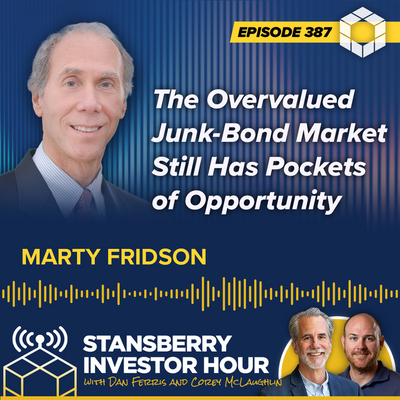
The Overvalued Junk-Bond Market Still Has Pockets of Opportunity
<p><span dir="ltr" role="presentation">On this week's </span><span dir="ltr" role="presentation">Stansberry Investor Hour</span><span dir="ltr" role="presentation">, Dan and Corey welcome Martin "Marty" Fridson</span><br role= "presentation" /> <span dir="ltr" role="presentation">back to the show. Marty is an author and expert in the field of high-yield bond investing. He</span><br role="presentation" /> <span dir="ltr" role="presentation">is also a senior analyst at Porter & Co.'s</span> <span dir="ltr" role= "presentation">Distressed Investing</span> <span dir="ltr" role= "presentation">newsletter.</span></p> <p><br role="presentation" /> <span dir="ltr" role="presentation">Marty kicks off the show by discussing the top-down view of the high-yield market. He</span><br role="presentation" /> <span dir="ltr" role="presentation">comments that right now, there is a very small risk premium. Marty breaks down the factors</span><br role="presentation" /> <span dir="ltr" role="presentation">that he uses in his model of fair value and concludes that the high-yield market is extremely</span><br role="presentation" /> <span dir="ltr" role="presentation">overvalued. At the same time, the market is forecasting a higher default rate than credit-</span><br role="presentation" /> <span dir="ltr" role="presentation">ratings agency Moody's. Marty also gives his opinion on whether we'll see a recession, what</span><br role="presentation" /> <span dir="ltr" role="presentation">it means that the inverted yield curve has not yet resulted in a recession, and why he's less</span><br role="presentation" /> <span dir="ltr" role="presentation">critical of the Federal Reserve than other investors. (1:39)</span></p> <p><br role="presentation" /> <span dir="ltr" role="presentation">Next, Marty explains that the current situation of the federal-funds rate and the 10-year U.S.</span><br role="presentation" /> <span dir="ltr" role="presentation">Treasury yield moving in opposite directions is not rare. He says it happens 40% of the time.</span><br role="presentation" /> <span dir="ltr" role="presentation">This segues to a discussion about what's happening with the junk-bond market... including</span><br role="presentation" /> <span dir="ltr" role="presentation">companies potentially having to roll over their debt to higher rates... and private credit</span><br role="presentation" /> <span dir="ltr" role="presentation">lenders now competing with high-yield bond buyers. Marty then names which sectors</span><br role="presentation" /> <span dir="ltr" role="presentation">present attractive buying opportunities today. (18:03)</span></p> <p><br role="presentation" /> <span dir="ltr" role="presentation">Finally, Marty goes further in depth about his quantitative model and what data it draws</span><br role="presentation" /> <span dir="ltr" role="presentation">upon to find attractively priced distressed debt. He then explains that because high-yield</span><br role="presentation" /> <span dir="ltr" role="presentation">bonds aren't very liquid, exchange-traded funds centered around these investments tend to</span><br role="presentation" /> <span dir="ltr" role="presentation">have a lot of variance in performance. This can have serious consequences in times of</span><br role="presentation" /> <span dir="ltr" role="presentation">extreme market disruption. (34:12)</span></p>
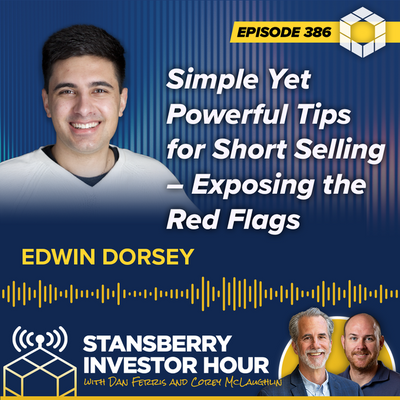
Simple Yet Powerful Tips for Short Selling – Exposing the Red Flags
<p class="MsoNormal"><span style= "font-size: 10.0pt; mso-bidi-font-size: 12.0pt; font-family: 'Verdana',sans-serif;"> On this week's <em>Stansberry Investor Hour</em>, Dan and Corey welcome Edwin Dorsey to the show. Edwin conducts deep, investigative analyses of public companies in his newsletter, The Bear Cave. By prioritizing customer relations and common-sense logic over financial data, he can gain an edge and find troubled companies for his subscribers before Wall Street does.</span></p> <p class="MsoNormal"><span style= "font-size: 10.0pt; mso-bidi-font-size: 12.0pt; font-family: 'Verdana',sans-serif;"> Edwin kicks off the show by explaining how he got his start doing short-selling research and how he identifies prime opportunities for shorting. Rather than focusing on the financials, he hunts for $1 billion to $10 billion companies in the technology or consumer sector with bad customer relationships. Edwin shares case studies of how he discovered safety issues at two child-focused companies. The first was caregiver platform Care.com, which wasn't properly vetting its caregivers. The second is Roblox, which has <em>ongoing</em> issues with child predators and gambling. (0:39)</span></p> <p class="MsoNormal"><span style= "font-size: 10.0pt; mso-bidi-font-size: 12.0pt; font-family: 'Verdana',sans-serif;"> Next, Edwin talks about why candy maker Hershey could face long-term issues now that trendy competitor Feastables is steadily stealing market share and doing a better job of appealing to the younger generation. As he points out, most investors tend to be older and male, so there are often blind spots for companies catering to youth and female demographics. Edwin also makes his bearish case for the predatory fitness-center company Planet Fitness. With the Federal Trade Commission working to make canceling memberships easier, this is bound to hurt the stock. (24:12)</span></p> <p class="MsoNormal"><span style= "font-size: 10.0pt; mso-bidi-font-size: 12.0pt; font-family: 'Verdana',sans-serif;"> Finally, Edwin names several companies that are doomed thanks to the rise of artificial-intelligence technology. He highlights call-center businesses and tax-service providers in particular, but also warns of downstream effects. After, Edwin talks more about how he first got interested in the financial world, how he learned that the numbers don't matter if the underlying business is not sustainable, and how he picks which stocks to go long. (40:23)</span></p>
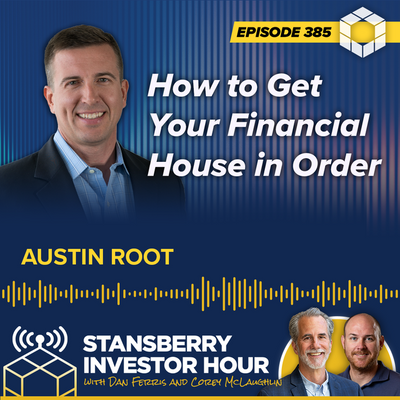
How to Get Your Financial House in Order
<p class="MsoNormal"><span style= "font-size: 10.0pt; mso-bidi-font-size: 12.0pt; font-family: 'Verdana',sans-serif;"> On this week's <em>Stansberry Investor Hour</em>, Dan and Corey are joined by Austin Root. Austin is an old friend and the chief investment officer at Stansberry Asset Management ("SAM"). SAM is a separate company from Stansberry Research and MarketWise, but it was born with the same DNA. The difference is, SAM helps individual investors optimize their portfolios.</span></p> <p class="MsoNormal"><span style= "font-size: 10.0pt; mso-bidi-font-size: 12.0pt; font-family: 'Verdana',sans-serif;"> Austin kicks off the show by discussing his favorite moments from last week's Stansberry Conference & Alliance Meeting. After, he shares what his role is at SAM and how the company helps individual investors with financial planning. Austin explains that SAM's team of specialists will look at an investor's full balance sheet – not just the part SAM is managing – and then make a personalized plan from there using projections. He emphasizes that paying down expensive credit-card debt is the most important first step, and he breaks down how macro factors influence SAM's strategies. (0:46)</span></p> <p class="MsoNormal"><span style= "font-size: 10.0pt; mso-bidi-font-size: 12.0pt; font-family: 'Verdana',sans-serif;"> Next, Austin talks about why investors should be in productive assets rather than cash, why he sees gold as inferior to shares of world-class businesses, and how bitcoin can be a good long-term store of value. He also names two stocks he finds particularly attractive right now. The first is a financial company that is trading at a discount, is poised for double-digit revenue growth, and serves as an inflation hedge. The second is a construction-materials company with a fantastic shareholder yield of nearly 10%. (24:59)</span></p> <p class="MsoNormal"><span style= "font-size: 10.0pt; mso-bidi-font-size: 12.0pt; font-family: 'Verdana',sans-serif;"> Finally, Austin explains why investors should keep politics out of their portfolios for the long term. He says inflation is the one factor he always pays attention to and everything else is noise. Austin does note, though, that he has loaded up on defense stocks for the short term since geopolitical tensions are rising around the globe. But overall, he says both candidates want to spend like mad and will be bad for the economy in the long run. (45:29)</span></p> <div style= "mso-element: para-border-div; border: none; border-bottom: solid windowtext 1.0pt; mso-border-bottom-alt: solid windowtext .75pt; padding: 0in 0in 1.0pt 0in;"> <p class="MsoNormal" style= "border: none; mso-border-bottom-alt: solid windowtext .75pt; padding: 0in; mso-padding-alt: 0in 0in 1.0pt 0in;"> <span style= "font-size: 10.0pt; mso-bidi-font-size: 12.0pt; font-family: 'Verdana',sans-serif;"> <span style="mso-spacerun: yes;"> </span></span></p> </div> <p class="MsoNormal"><em><span style= "font-size: 10.0pt; font-family: 'Verdana',sans-serif; mso-fareast-font-family: 'Times New Roman'; mso-fareast-theme-font: major-fareast; mso-bidi-font-family: Arial; color: #111111; letter-spacing: .15pt;"> Disclosure</span></em><span style= "font-size: 10.0pt; font-family: 'Verdana',sans-serif; mso-bidi-font-family: Arial; color: #111111; letter-spacing: .15pt;">: Stansberry Asset Management ("SAM") is a Registered Investment Adviser with the United States Securities and Exchange Commission. File number: 801-107061. Such registration does not imply any level of skill or training. Under no circumstances should this report or any information herein be construed as investment advice, or as an offer to sell or the solicitation of an offer to buy any securities or other financial instruments. </span></p> <p class="headline" style= "background: white; margin: 0in 0in 15.0pt 0in;"><span style= "font-size: 10.0pt; font-family: 'Verdana',sans-serif; mso-bidi-font-family: Arial; color: #111111; letter-spacing: .15pt;"> Stansberry & Associates Investment Research, LLC ("Stansberry Research") is not a current client or investor of SAM. SAM provides cash compensation to Stansberry Research for Stansberry Research's advisory client solicitation services for the benefit of SAM. Material conflicts of interest may exist due to Stansberry Research's economic interest in soliciting clients for SAM. Certain Stansberry Research personnel may also have limited rights and interests relating to one or more parent entities of SAM.</span></p>
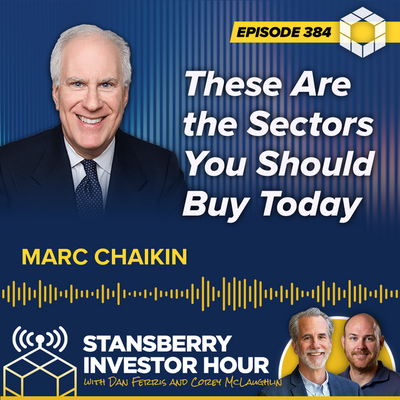
These Are the Sectors You Should Buy Today
<p class="MsoNormal"><span style= "font-size: 10.0pt; mso-bidi-font-size: 12.0pt; font-family: 'Verdana',sans-serif;"> On this week's <em>Stansberry Investor Hour</em>, Dan and Corey welcome Marc Chaikin back to the show. Marc is a Wall Street veteran with 50-plus years of total market experience. He's also the founder and CEO of our corporate affiliate, Chaikin Analytics. He joins the show to share some of his vast wisdom with listeners, from the hottest sectors around to why you shouldn't get spooked by all the volatility.</span></p> <p class="MsoNormal"><span style= "font-size: 10.0pt; mso-bidi-font-size: 12.0pt; font-family: 'Verdana',sans-serif;"> Marc kicks off the show by making his bullish case for the markets. However, he notes that this rising tide has not lifted all boats equally... He lists off several sectors that are particularly attractive to him today, plus a few he's staying away from. Marc also talks a bit about JPMorgan Chase CEO Jamie Dimon's prediction for a financial hurricane, the outlook for energy stocks, what's going on in China to make stocks so volatile, how the Federal Reserve has been doing, and the U.S.'s shift from a manufacturing economy to a service economy. (0:39)</span></p> <p class="MsoNormal"><span style= "font-size: 10.0pt; mso-bidi-font-size: 12.0pt; font-family: 'Verdana',sans-serif;"> Next, Marc emphasizes that the key to profiting as an investor is to avoid making broad economic predictions. He says that different sets of data can give you conflicting signals, so it's not worth your time trying to guess the unknowable future. Instead, you should pay attention only to momentum and earnings. Marc then criticizes financial reporting by the mainstream media, advises listeners to take advantage of current volatility rather than run from it, and highlights the bullish setups in nuclear and software stocks thanks to AI. (18:56)</span></p> <p class="MsoNormal"><span style= "font-size: 10.0pt; mso-bidi-font-size: 12.0pt; font-family: 'Verdana',sans-serif;"> Finally, Marc urges investors to not get bearish while the S&P 500 Index is having its best year since 1997. He points out that, as the dot-com mania showed us, the bull run can continue for several more years. As long as profit margins continue to rise, you want to be invested. He also explains how he uses his Power Gauge system to avoid doomed stocks. This leads to a conversation about Marc's new upcoming newsletter that will focus on what the "smart money" is buying and allow him to spot "pockets of strength." Plus, Marc weighs in on mining stocks. (38:38)</span></p>
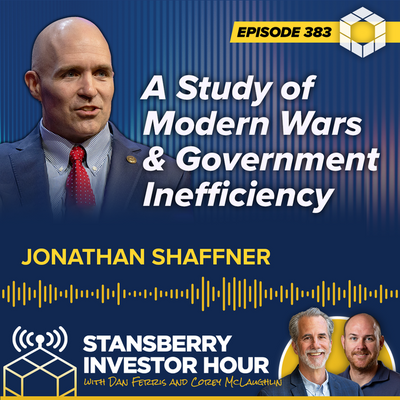
A Study of Modern Wars and Government Inefficiency
<p class="MsoNormal"><span style= "font-size: 10.0pt; mso-bidi-font-size: 12.0pt; font-family: 'Verdana',sans-serif;"> On this week's <em>Stansberry Investor Hour</em>, Dan and Corey welcome Jonathan Shaffner to the podcast. Jon is a retired U.S. Army colonel with 25 years of service who currently works as the director of federal business development at MBO Partners. MBO specializes in delivering solutions that make it safer and easier for enterprise organizations and top independent professionals to work together.</span></p> <p class="MsoNormal"><span style= "font-size: 10.0pt; mso-bidi-font-size: 12.0pt; font-family: 'Verdana',sans-serif;"> Jon kicks off the show by discussing NATO's increased presence in Europe, through the lens of his own military experience. He posits that modern wars are more ideology-based than previous ones. This leads to Jon talking about his years in Afghanistan and Iraq. After, he shares what MBO does and how it helps companies (especially in defense and health care) build better workforces. (1:00)</span></p> <p class="MsoNormal"><span style= "font-size: 10.0pt; mso-bidi-font-size: 12.0pt; font-family: 'Verdana',sans-serif;"> Next, Jon puts government spending into an investing context. He notes that through all the inefficiency and bloat, there are definite winners and losers of government contracts. He also breaks down his and MBO's involvement in helping to create value for the companies that have been awarded these contracts. Jon cites data usage as the biggest need he's seeing right now. Companies have massive amounts of data but don't know what to do with it or how to implement it. (23:05)</span></p> <p class="MsoNormal"><span style= "font-size: 10.0pt; mso-bidi-font-size: 12.0pt; font-family: 'Verdana',sans-serif;"> Finally, Jon talks about how MBO finds contractors, the possibility of it going public someday, and its research on the gig economy. He then explores what could happen with the two major ongoing wars affecting the U.S. today: Russia versus Ukraine and Israel versus Hamas. Jon predicts that the war in Ukraine will be over within 18 months, but he says the war in the Middle East is much more complicated thanks to the Houthis. (42:41)</span></p>
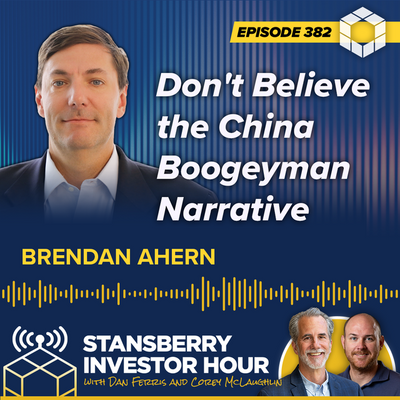
Don't Believe the China Boogeyman Narrative
<p><span dir="ltr" role="presentation">On this week's</span> <span dir="ltr" role="presentation">Stansberry Investor Hour</span><span dir="ltr" role="presentation">, Dan and Corey welcome Brendan Ahern to the</span><br role="presentation" /> <span dir="ltr" role="presentation">show. Brendan is the chief investment officer at asset manager KraneShares. The company</span><br role="presentation" /> <span dir="ltr" role="presentation">provides investors access to Chinese companies, climate investments, and uncorrelated</span><br role="presentation" /> <span dir="ltr" role="presentation">assets through exchange-traded funds.</span></p> <p><span dir="ltr" role="presentation">Brendan kicks off the show by describing the basics of KraneShares and its involvement in</span> <span dir="ltr" role="presentation">Chinese markets. He discusses the recent surge in Chinese stocks and gives context for</span> <span dir="ltr" role="presentation">what's driving it. As Brendan explains, the country is focused on stabilizing real estate prices </span><span dir="ltr" role="presentation">and stimulating the broader economy. By lowering interest rates and announcing loads of</span> <span dir="ltr" role= "presentation">subsidies that will benefit its citizens, the government can increase domestic consumption at</span> <span dir= "ltr" role="presentation">a crucial time. (0:43)</span></p> <p><span dir="ltr" role="presentation">Next, Brendan talks about China's negative reputation due to Western disinformation and</span><br role="presentation" /> <span dir="ltr" role="presentation">political rhetoric. As almost all U.S. investors are implicitly involved with China, and as the</span><br role="presentation" /> <span dir="ltr" role="presentation">majority of Western companies outsource to China, our economy depends on the foreign</span><br role="presentation" /> <span dir="ltr" role="presentation">nation. Brendan also discusses the influence U.S. investors have had on Chinese companies</span><br role="presentation" /> <span dir="ltr" role="presentation">in regard to corporate governance... billionaire hedge-fund manager David Tepper going all-</span><span dir="ltr" role="presentation">in on China... and why he believes China won't invade Taiwan. (18:11)</span></p> <p><span dir="ltr" role="presentation">Finally, Brendan breaks down the growth prospects for China today and shares his thoughts</span> <span dir="ltr" role="presentation">on the U.S. moving to produce more semiconductors domestically. After, he discusses</span> <span dir="ltr" role="presentation">today's data-driven world and the new ways this data is collected by research firms.</span> <span dir="ltr" role="presentation">KraneShares is able to leverage this data in turn and be selective about which Chinese</span> <span dir="ltr" role="presentation">companies it gets involved with. As Brendan explains, cooperation with China is both</span> <span dir="ltr" role="presentation">important for investors' portfolio diversification and for a harmonious future. (37:12)</span></p>
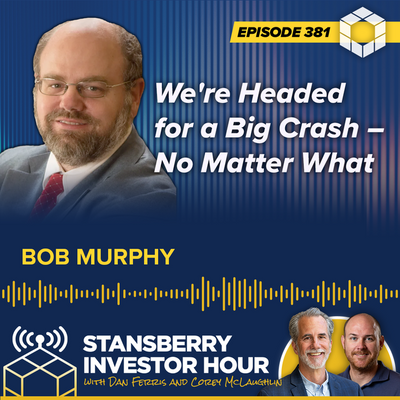
We're Headed for a Big Crash – No Matter What
<p class="MsoNormal"><span style= "font-size: 10.0pt; mso-bidi-font-size: 12.0pt; font-family: 'Verdana',sans-serif;"> On this week's <em>Stansberry Investor Hour</em>, Dan and Corey are joined by Bob Murphy. Bob is the chief economist at technology firm infineo, author of more than a dozen books, and a passionate advocate of free markets. He explores a wide variety of topics on this week's podcast, from how history is repeating itself... to the U.S. dollar's inevitable fall from dominance... to the harmful consequences of low interest rates.</span></p> <p class="MsoNormal"><span style= "font-size: 10.0pt; mso-bidi-font-size: 12.0pt; font-family: 'Verdana',sans-serif;"> Bob starts the show by explaining what exactly infineo does, how it's making life insurance an asset class, and the advantages of tokenizing life insurance. He also discusses one of his books, <em>the Politically Incorrect Guide to the Great Depression and the New Deal</em>. Even though the book is more than a decade old, and even though it's about the U.S. economy in the 1920s and 1930s, its lessons are still relevant in today's economic context. Bob notes that there's going to be a big crash no matter what. (1:13)</span></p> <p class="MsoNormal"><span style= "font-size: 10.0pt; mso-bidi-font-size: 12.0pt; font-family: 'Verdana',sans-serif;"> Next, Bob talks a bit about the presidential election, the effects of Donald Trump pulling out of the Paris Agreement, and the government's out-of-control spending problem. He predicts that the U.S. dollar will lose its status as the world reserve currency by the 2040s, and voices concerns that the U.S. is following China's lead toward a Big Brother police state with social credit scores. (19:57)</span></p> <p class="MsoNormal"><span style= "font-size: 10.0pt; mso-bidi-font-size: 12.0pt; font-family: 'Verdana',sans-serif;"> Finally, Bob shares his thoughts on the current state of the economy. He covers hyperinflation, Federal Reserve Chair Jerome Powell's actions, the inverted yield curve, and former Fed economist Claudia Sahm denying the validity of her own 100%-accurate recession indicator. Bob also talks about the harm caused by low interest rates and how they lead to malinvestment, allowing bad businesses to stay alive. (40:54)</span></p>
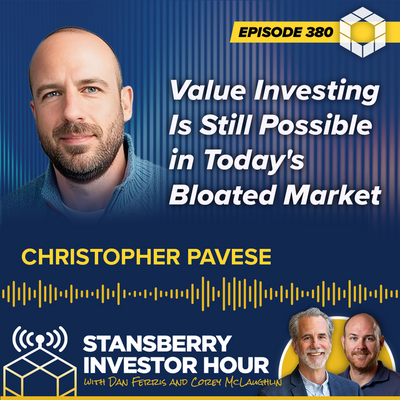
Value Investing Is Still Possible in Today's Bloated Market
<p class="MsoNormal"><span style= "font-size: 10.0pt; mso-bidi-font-size: 12.0pt; font-family: 'Verdana',sans-serif;"> On this week's <em>Stansberry Investor Hour</em>, Dan and Corey welcome Chris Pavese back to the show. Chris is the president and chief investment officer of Broyhill Asset Management. A value-oriented investment firm, Broyhill prioritizes safe, long-term success.</span></p> <p class="MsoNormal"><span style= "font-size: 10.0pt; mso-bidi-font-size: 12.0pt; font-family: 'Verdana',sans-serif;"> Chris kicks off the show by sharing a few book recommendations and explaining all about Broyhill. He covers how he got his start at the company, what differentiates it from other asset managers, and its core value-investing philosophy. As Chris notes, we've seen one of the longest stretches of value underperformance in history. However, Broyhill has kept pace with the S&P 500 Index over the past decade, despite not holding the "Magnificent Seven" tech stocks and half of the portfolio being in foreign markets. (0:43)</span></p> <p class="MsoNormal"><span style= "font-size: 10.0pt; mso-bidi-font-size: 12.0pt; font-family: 'Verdana',sans-serif;"> Next, Chris explains what closed-end funds are and why they see such major swings in sentiment. He also gives his macro outlook in regard to the Federal Reserve's rate cuts and what it means for the economy. Chris highlights the fact that today's market is one of the most concentrated in history. But as he points out, there are pockets of value in many areas, especially internationally. And despite all the geopolitical turmoil, he advises against abandoning equities completely. (19:59)</span></p> <p class="MsoNormal"><span style= "font-size: 10.0pt; mso-bidi-font-size: 12.0pt; font-family: 'Verdana',sans-serif;"> Finally, Chris discusses the importance of having a margin of safety and practicing common-sense risk management. He also mentions that the Biden administration is going hard with antitrust regulation and blocking a lot of deals, which is causing wide spreads in stock price when mergers and acquisitions are announced. Broyhill uses this merger-arbitrage strategy a fair amount to get easy money. Plus, Chris shares Broyhill's underwriting methods to gauge a business's intrinsic value. (40:08)</span></p>
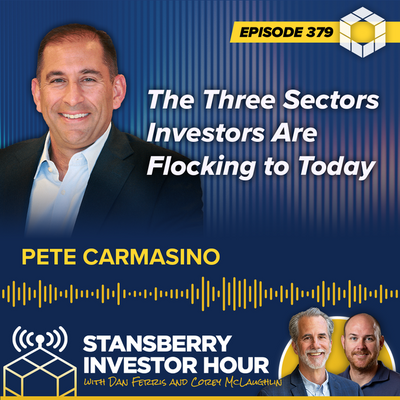
The Three Sectors Investors Are Flocking to Today
<p><span dir="ltr" role="presentation">On this week's</span> <span dir="ltr" role="presentation">Stansberry Investor Hour</span><span dir="ltr" role="presentation">, Dan and Corey welcome Pete Carmasino back to</span><br role="presentation" /> <span dir="ltr" role="presentation">the show. Pete is chief market strategist at our corporate affiliate Chaikin Analytics. He's also</span><br role="presentation" /> <span dir="ltr" role="presentation">editor of the</span> <span dir= "ltr" role="presentation">Chaikin PowerTactics</span> <span dir= "ltr" role="presentation">and</span> <span dir="ltr" role= "presentation">Chaikin PowerTrader</span> <span dir="ltr" role= "presentation">newsletters. With more than 25</span><br role= "presentation" /> <span dir="ltr" role="presentation">years of experience in the financial-services industry, Pete joins the podcast to share some</span><br role="presentation" /> <span dir="ltr" role="presentation">of his wisdom on sector rotations, pullbacks, and the housing market.</span></p> <p><br role="presentation" /> <span dir="ltr" role="presentation">Pete kicks off the show by talking about the Federal Reserve cutting interest rates,</span><br role="presentation" /> <span dir="ltr" role="presentation">unemployment ticking higher, and the difficulty bond managers are having with timing the</span><br role="presentation" /> <span dir="ltr" role="presentation">market. He also shares his thoughts on the Sahm Rule indicator, which says we're currently</span><br role="presentation" /> <span dir="ltr" role="presentation">in a recession. Pete believes that Fed Chair Jerome Powell will only do a 25-basis-point rate</span><br role="presentation" /> <span dir="ltr" role="presentation">cut, but that ultimately Japan will be the deciding factor in Powell's decision. This leads to a</span><br role="presentation" /> <span dir="ltr" role="presentation">conversation about sector rotation and which sectors are outperforming today. (0:43)</span></p> <p><br role="presentation" /> <span dir="ltr" role="presentation">Next, Pete gives pointers on how to find investing opportunities within market rotations and</span><br role="presentation" /> <span dir="ltr" role="presentation">pullbacks. He explains that a lot of the sectors that are thriving today serve as bond proxies,</span><br role="presentation" /> <span dir="ltr" role="presentation">and a lot of the individual stocks that investors are flocking to are safe havens that pay high</span><br role="presentation" /> <span dir="ltr" role="presentation">dividends. After, Pete talks about the trend in oil and gas prices over the past two years and</span><br role="presentation" /> <span dir="ltr" role="presentation">how it has been influenced by the White House's efforts to refill the Strategic Petroleum</span><br role="presentation" /> <span dir="ltr" role="presentation">Reserve. (18:46)</span></p> <p><br role="presentation" /> <span dir="ltr" role="presentation">Finally, Pete shares why he believes the housing market is on its way to reaching an</span><br role="presentation" /> <span dir="ltr" role="presentation">"equilibrium" between buyers and sellers. He says housing prices can stay high (benefiting</span><br role="presentation" /> <span dir="ltr" role="presentation">sellers) while interest-rate cuts will lower mortgages (benefiting buyers). Pete also cites</span><br role="presentation" /> <span dir="ltr" role="presentation">increases to the lifetime gift/estate tax exemption as a reason for the influx of competitive</span><br role="presentation" /> <span dir="ltr" role="presentation">all-cash housing transactions. (34:31)</span></p>
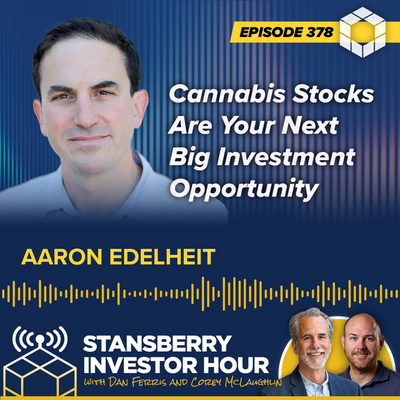
Cannabis Stocks Are Your Next Big Investment Opportunity
<p><span dir="ltr" role="presentation">On this week's</span> <span dir="ltr" role="presentation">Stansberry Investor Hour</span><span dir="ltr" role="presentation">, Dan and Corey welcome Aaron Edelheit back to the</span><br role="presentation" /> <span dir="ltr" role="presentation">show. Aaron is the founder and CEO of private investment firm Mindset Capital. He joins the</span><br role="presentation" /> <span dir="ltr" role="presentation">podcast to talk about his investing philosophy... the importance of relieving mental stress...</span><br role="presentation" /> <span dir="ltr" role="presentation">and all things cannabis – from its "great replacement" of alcohol to its legalization in more</span><br role="presentation" /> <span dir="ltr" role="presentation">and more states.</span></p> <p><br role="presentation" /> <span dir="ltr" role="presentation">Aaron begins with a story about how he received advice from the legendary Charlie Munger</span><br role="presentation" /> <span dir="ltr" role="presentation">on the "price of admission" of being an investor. He explains that this advice made him</span><br role="presentation" /> <span dir="ltr" role="presentation">reflect on his own strengths and realize that he wanted to exclusively do long-term investing</span><br role="presentation" /> <span dir="ltr" role="presentation">rather than trading. This leads to a conversation about investor psychology and mental</span><br role="presentation" /> <span dir="ltr" role="presentation">strain. Aaron shares a few tips for relieving the anxiety surrounding investing, from turning</span><br role="presentation" /> <span dir="ltr" role="presentation">off your phone and computer one day a week to doing hot yoga. (1:37)</span></p> <p><br role="presentation" /> <span dir="ltr" role="presentation">Next, Aaron talks a bit about his investing background, his career path, and how he finds</span><br role="presentation" /> <span dir="ltr" role="presentation">opportunities where others aren't looking. Today, he believes the big opportunity is in</span><br role="presentation" /> <span dir="ltr" role="presentation">cannabis stocks. He explains that certain names in this industry are breaking out despite the</span><br role="presentation" /> <span dir="ltr" role="presentation">lack of federal reform. Aaron also drops a non-cannabis name that he's interested in and</span><br role="presentation" /> <span dir="ltr" role="presentation">gives an alternative perspective on value stocks. (22:44)</span></p> <p><br role="presentation" /> <span dir="ltr" role="presentation">Finally, Aaron compares today's investing landscape with that of the 1990s. He shares that</span><br role="presentation" /> <span dir="ltr" role="presentation">there's much more financing of private companies today, which stops them from going</span><br role="presentation" /> <span dir="ltr" role="presentation">public for longer (if at all). After, Aaron makes his case for cannabis stocks. He believes that</span><br role="presentation" /> <span dir="ltr" role="presentation">they will eventually steal market share from drug companies and alcohol producers once</span><br role="presentation" /> <span dir="ltr" role="presentation">more people realize the benefits and switch over. (40:54)</span></p>
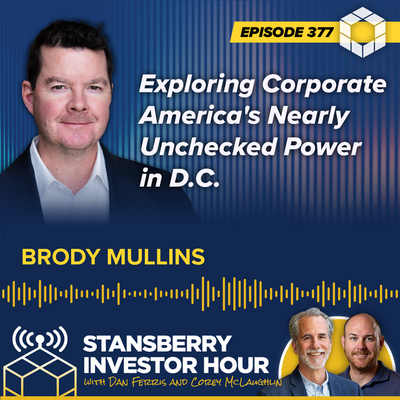
Exploring Corporate America's Nearly Unchecked Power in D.C.
<p class="MsoNormal"><span style= "font-size: 10.0pt; mso-bidi-font-size: 12.0pt; font-family: 'Verdana',sans-serif;"> On this week's <em>Stansberry Investor Hour</em>, Dan and Corey welcome Brody Mullins to the show. Brody is a Pulitzer Prize-winning investigative reporter and author of the new book <em>The Wolves of K Street</em>. He joins the podcast to share insights from his two-plus decades spent investigating the Washington political scene. </span></p> <p class="MsoNormal"><span style= "font-size: 10.0pt; mso-bidi-font-size: 12.0pt; font-family: 'Verdana',sans-serif;"> Brody kicks off the show by discussing his history reporting on antitrust regulation. He notes that recently, both major political parties in D.C. have become less friendly to Big Tech companies and are using antitrust regulation to slow their growth. After, Brody talks a bit about how he got started in journalism, the importance of holding those in power accountable, and why he has dedicated his life to investigating companies. (1:27)</span></p> <p class="MsoNormal"><span style= "font-size: 10.0pt; mso-bidi-font-size: 12.0pt; font-family: 'Verdana',sans-serif;"> Next, Brody shares some details about his book. He points out that for most of this country's history, companies had very little influence in Washington. Things only changed in the 1970s once the economy cratered and stagflation hit. Then, companies began to lobby in order to twist regulations and gain an advantage in the market. Brody also explains lobbying in simple terms, including how lobbyists raise money for members of Congress. He argues that legal loopholes and undisclosed funds to influence constituents have made companies nearly untouchable. (15:10)</span></p> <p class="MsoNormal"><span style= "font-size: 10.0pt; mso-bidi-font-size: 12.0pt; font-family: 'Verdana',sans-serif;"> Finally, Brody discusses why there's still hope for the American people to fight back. He explains that negative public perception about these big, powerful corporations (such as Amazon and Google parent Alphabet) has influenced antitrust regulators to begin taking action. He also talks about insider trading among members of Congress and emphasizes that all of these conflicts of interest are not limited to one party. (33:38)</span></p>
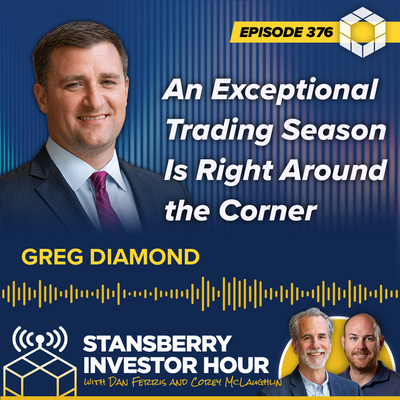
An Exceptional Trading Season Is Right Around the Corner
<p><span dir="ltr" role="presentation">On this week's</span> <span dir="ltr" role="presentation">Stansberry Investor Hour</span><span dir="ltr" role="presentation">, Dan and Corey welcome Greg Diamond back to the</span><br role="presentation" /> <span dir="ltr" role="presentation">show. Greg is a fellow analyst at Stansberry Research and editor of the trading advisory</span> <span dir="ltr" role="presentation">Ten</span><br role= "presentation" /> <span dir="ltr" role="presentation">Stock Trader</span><span dir= "ltr" role="presentation">. With nearly two decades' worth of experience trading and managing every</span><br role= "presentation" /> <span dir="ltr" role="presentation">asset class, Greg is an expert at technical analysis and interpreting market cycles.</span></p> <p><br role="presentation" /> <span dir="ltr" role="presentation">Greg kicks things off by reviewing the inflection points he predicted last time he was on the</span><br role="presentation" /> <span dir="ltr" role="presentation">podcast. He explains what these time cycles mean and how they've influenced his trading</span><br role="presentation" /> <span dir="ltr" role="presentation">strategy this year. He also discusses the upcoming presidential election and how crucial it is</span><br role="presentation" /> <span dir="ltr" role="presentation">for investors to put aside their biases. According to Greg, the market's wider emotional</span><br role="presentation" /> <span dir="ltr" role="presentation">reactions to the election could present some fantastic buying opportunities. (0:55)</span></p> <p><br role="presentation" /> <span dir="ltr" role="presentation">Next, Greg breaks down famed trader W.D. Gann's technical strategies into simple terms. He</span><br role="presentation" /> <span dir="ltr" role="presentation">emphasizes that the "why" in market cycles is not really important. What matters is whether</span><br role="presentation" /> <span dir="ltr" role="presentation">history is repeating or not. Greg warns of cycle inversions, however, and points out that</span><br role="presentation" /> <span dir="ltr" role="presentation">many charts and algorithms in technical analysis just reflect human emotion. Investors will</span><br role="presentation" /> <span dir="ltr" role="presentation">naturally reach different conclusions about the market, which creates volatility. (17:03)</span></p> <p><br role="presentation" /> <span dir="ltr" role="presentation">Finally, Greg talks about short-term trading versus holding stocks for the long term. He</span><br role="presentation" /> <span dir="ltr" role="presentation">shares that this presidential election is the most excited he has been about trading since</span><br role="presentation" /> <span dir="ltr" role="presentation">2022. Greg foresees "an exceptional trading season" after a fairly boring start to the year.</span><br role="presentation" /> <span dir="ltr" role="presentation">And he hammers home that investors should be careful of increased volatility for the next</span><br role="presentation" /> <span dir="ltr" role="presentation">few months and possibly even the next few years. (39:41)</span></p>
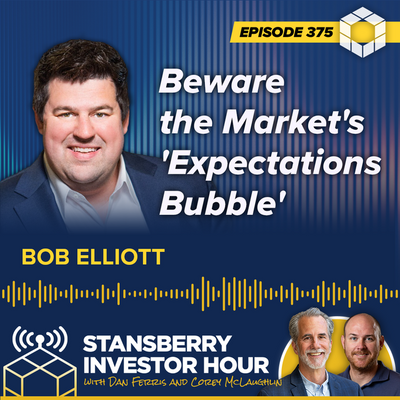
Beware the Market's 'Expectations Bubble'
<p><span dir="ltr" role="presentation">On this week's</span> <span dir="ltr" role="presentation">Stansberry Investor Hour</span><span dir="ltr" role="presentation">, Dan and Corey welcome Bob Elliott back to the</span><br role="presentation" /> <span dir="ltr" role="presentation">show. Bob is the co-founder, chief investment officer, and CEO of Unlimited. The investment</span><br role="presentation" /> <span dir="ltr" role="presentation">firm uses machine learning to replicate the index returns of hedge funds, venture capital,</span><br role="presentation" /> <span dir="ltr" role="presentation">and private equity. Bob explores a wide range of topics in the podcast, from counteracting</span><br role="presentation" /> <span dir="ltr" role="presentation">inflation with certain investments to the worsening future of globalization.</span></p> <p><br role="presentation" /> <span dir="ltr" role="presentation">Bob kicks off the show by talking about the importance of holding yourself accountable with</span><br role="presentation" /> <span dir="ltr" role="presentation">investing and about bonds in relation to the Federal Reserve's next moves. Many investors</span><br role="presentation" /> <span dir="ltr" role="presentation">are expecting an aggressive rate-cutting cycle, but as Bob points out, the Fed may not live</span><br role="presentation" /> <span dir="ltr" role="presentation">up to those expectations. He also discusses the flaws of the 60/40 portfolio in today's</span><br role="presentation" /> <span dir="ltr" role="presentation">market, why you should hold gold as part of your portfolio, and two primary factors that</span><br role="presentation" /> <span dir="ltr" role="presentation">could contribute to a long-term inflationary environment. (1:02)</span></p> <p><br role="presentation" /> <span dir="ltr" role="presentation">Next, Bob explores ways to properly balance your portfolio to preserve wealth and minimize</span><br role="presentation" /> <span dir="ltr" role="presentation">volatility. This leads to a conversation about Treasury inflation-protected securities. Bob</span><br role="presentation" /> <span dir="ltr" role="presentation">describes why they're a better investment today than they were a few years ago and what</span><br role="presentation" /> <span dir="ltr" role="presentation">gives them an edge over nominal bonds. After, he discusses the supply-and-demand</span><br role= "presentation" /> <span dir="ltr" role="presentation">imbalance in natural resources, oil's supply sensitivity versus precious metals, and the</span><br role="presentation" /> <span dir="ltr" role="presentation">green-energy movement. (20:57)</span></p> <p><br role="presentation" /> <span dir="ltr" role="presentation">Finally, Bob makes his case for investing in natural resource companies and warns listeners</span><br role="presentation" /> <span dir="ltr" role="presentation">about roll costs when trading in the futures market. He then talks from a macro perspective</span><br role="presentation" /> <span dir="ltr" role="presentation">about productivity in relation to AI. As he explains, AI has not yet led to large productivity</span><br role="presentation" /> <span dir="ltr" role="presentation">advances like we saw with the advent of the personal computer. (37:58)</span></p>
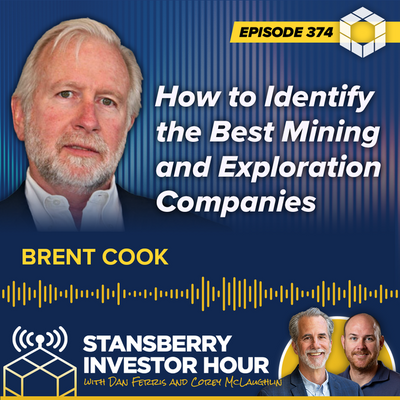
How to Identify the Best Mining and Exploration Companies
<p><span dir="ltr" role="presentation">On this week's</span> <span dir="ltr" role="presentation">Stansberry Investor Hour</span><span dir="ltr" role="presentation">, Dan and Corey welcome Brent Cook back to the</span><br role="presentation" /> <span dir="ltr" role="presentation">show. Brent is an economic geologist, as well as the founder and senior adviser of newsletter</span><br role="presentation" /> <span dir="ltr" role="presentation">company Exploration Insights. With more than 30 years of experience in property economics</span><br role="presentation" /> <span dir="ltr" role="presentation">and geology evaluations – spanning 60-plus countries – Brent has seen it all. He is one of the</span><br role="presentation" /> <span dir="ltr" role="presentation">most credible, successful, and knowledgeable mining-stock investors in the world. If you</span><br role="presentation" /> <span dir="ltr" role="presentation">invest in mining stocks, this episode is an absolute must-listen experience.</span></p> <p><span dir="ltr" role="presentation">Brent kicks off the show by discussing what's happening at Yellowstone and what he learned </span><br role="presentation" /> <span dir="ltr" role="presentation">from attending Rick Rule's mining conference. Brent warns investors to beware of mining</span><br role="presentation" /> <span dir="ltr" role="presentation">and exploration companies that are picking up old, "dead" projects and redrilling holes,</span><br role="presentation" /> <span dir="ltr" role="presentation">purely to bump up their share price and raise capital. After, Brent details a bit about his</span><br role="presentation" /> <span dir="ltr" role="presentation">career history and how he ended up in geology. (0:43)</span></p> <p><span dir="ltr" role="presentation">Next, Brent discusses what investors should look for when trying to find a mining company </span><br role="presentation" /> <span dir="ltr" role="presentation">worth buying. This includes the narrative of the broader economy, the risk profile, and</span><br role="presentation" /> <span dir="ltr" role="presentation">knowing what kinds of results you want to see from the company in terms of drill results. As</span><br role="presentation" /> <span dir="ltr" role="presentation">he explains, folks should seek high-margin companies with good management teams and</span><br role="presentation" /> <span dir="ltr" role="presentation">with deposits in friendly jurisdictions. He lists off several regions and countries that he</span><br role="presentation" /> <span dir="ltr" role="presentation">believes look promising today, plus some complications he has faced in the past. (19:21)</span></p> <p><span dir="ltr" role="presentation">Finally, Brent names a copper-mining company that he's interested in today. It has water </span><br role="presentation" /> <span dir="ltr" role="presentation">rights, no environmental liabilities, and a project that looks auspicious. He also shares a</span><br role="presentation" /> <span dir="ltr" role="presentation">gold-mining company he likes that's developing a very high-grade deposit in Australia. Brent</span><br role="presentation" /> <span dir="ltr" role="presentation">then explains the difference between mining and extracting gold and copper, and he makes</span><br role="presentation" /> <span dir="ltr" role="presentation">a bullish case for the red metal. (34:02)</span></p>
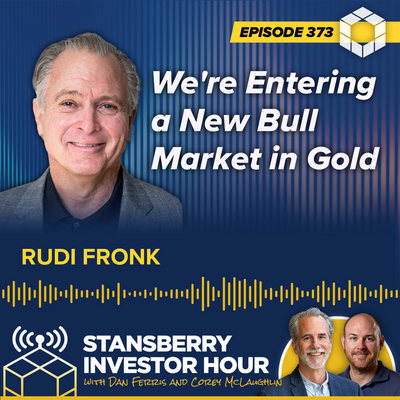
We're Entering a New Bull Market in Gold
<p><span dir="ltr" role="presentation">On this week's</span> <span dir="ltr" role="presentation">Stansberry Investor Hour</span><span dir="ltr" role="presentation">, Dan and Corey welcome Rudi Fronk back to the</span><br role="presentation" /> <span dir="ltr" role="presentation">show. Rudi is the founder, chairman, and CEO of Seabridge Gold (SA). With more than 35</span><br role="presentation" /> <span dir="ltr" role="presentation">years of experience in the gold industry, Rudi is an expert in his field. He joins the podcast to</span><br role="presentation" /> <span dir="ltr" role="presentation">talk all about precious metals mining, future opportunities for gold and copper, and what</span><br role="presentation" /> <span dir="ltr" role="presentation">sets his company apart from the rest.</span></p> <p><br role="presentation" /> <span dir="ltr" role="presentation">Rudi begins by giving a brief history of how he got into gold mining. He shares the reason he</span><br role="presentation" /> <span dir="ltr" role="presentation">started Seabridge with shareholder value in mind. He also breaks down some of the risks</span><br role="presentation" /> <span dir="ltr" role="presentation">involved in mining – including working in politically unstable countries – and why he'll never</span><br role="presentation" /> <span dir="ltr" role="presentation">build another mine again. After, he talks a bit about the technical aspects of drilling,</span><br role="presentation" /> <span dir="ltr" role="presentation">exploration, and the process behind estimating how much gold is in the ground. (1:14)</span></p> <p><br role="presentation" /> <span dir="ltr" role="presentation">Next, Rudi discusses potential joint-venture opportunities with leading mining companies for</span><br role="presentation" /> <span dir="ltr" role="presentation">Seabridge's KSM property, mainly thanks to increased demand for copper. He also talks</span><br role="presentation" /> <span dir="ltr" role="presentation">about the importance of permitting, catalysts that could move Seabridge's share price</span><br role="presentation" /> <span dir="ltr" role="presentation">higher, offsetting share dilution, and early-stage projects that are in the works. And Rudi</span><br role="presentation" /> <span dir="ltr" role="presentation">makes his case for why gold is entering a new, interesting bull market. (16:55)</span></p> <p><br role="presentation" /> <span dir="ltr" role="presentation">Finally, Rudi shares his opinion on bitcoin, talks further about soaring copper demand, and</span><br role="presentation" /> <span dir="ltr" role="presentation">delves into Seabridge's goal of giving back physical gold to investors. As he explains, the</span><br role="presentation" /> <span dir="ltr" role="presentation">KSM property is expected to produce more than 1 million ounces of gold per year for the first</span><br role="presentation" /> <span dir="ltr" role="presentation">33 years. And 35% to 49% of gold produced will be returned to the company. (33:56)</span></p>
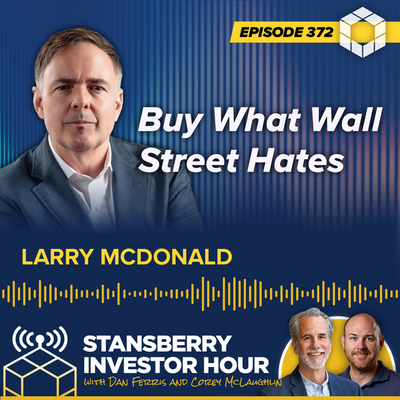
Buy What Wall Street Hates
<p class="MsoNormal"><span style= "font-size: 10.0pt; mso-bidi-font-size: 12.0pt; font-family: 'Verdana',sans-serif;"> On this week's <em>Stansberry Investor Hour</em>, Dan and Corey are joined by investor and bestselling author Larry McDonald. Larry founded <em>The Bear Traps Report</em>, an investment newsletter that looks at global political and systemic risks when making actionable trades. He is also a frequent contributor on CNBC, Bloomberg, and Fox Business News.</span></p> <p class="MsoNormal"><span style= "font-size: 10.0pt; mso-bidi-font-size: 12.0pt; font-family: 'Verdana',sans-serif;"> Larry kicks off the show by sharing his history as a trader at Lehman Brothers and how certain parts of today's market mirror the 2008 crash. He notes that commodities are extremely cheap while semiconductors just hit an all-time high. Larry predicts that capital will migrate back toward real assets. He also discusses what a second Donald Trump presidential term would mean for the bond market, the huge risk with inflation, and a possible bright spot for the housing market as Baby Boomers age. (1:01)</span></p> <p class="MsoNormal"><span style= "font-size: 10.0pt; mso-bidi-font-size: 12.0pt; font-family: 'Verdana',sans-serif;"> Next, Larry breaks down his trading strategy involving capitulation. He brings up the extreme 20% discount in copper today and makes a five-year bull case for natural gas. This leads to a conversation about the current hot stocks in artificial intelligence ("AI"). Larry says that the AI mania has gotten so bad, chief financial officers at tech companies <em>have</em> to invest in AI even if they don't want to, for fear of losing their jobs. He believes we're in the early stages of an unwinding. And he notes that many companies adjacent to AI, like those relating to the electrical grid, have been left for dead. (17:36)</span></p> <p class="MsoNormal"><span style= "font-size: 10.0pt; mso-bidi-font-size: 12.0pt; font-family: 'Verdana',sans-serif;"> Finally, Larry explains that the pain cycles following market bubbles should be longer, but quantitative easing has gotten in the way of that natural process. Bad businesses used to be cleaned out, but now they're able to survive. Larry condemns "evil" passive investing and talks about how much worse the practice has gotten in the past decade and a half. He then lists off a few specific stocks he finds attractive today and advises investors to be careful about buying dips. (36:56)</span></p>
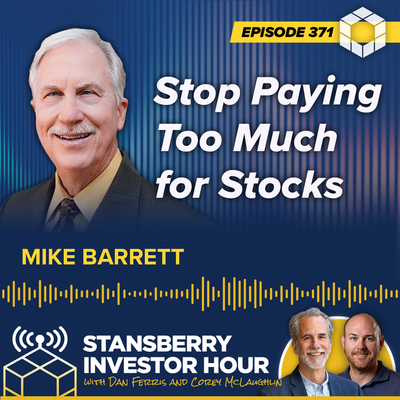
Stop Paying Too Much for Stocks
<p><span dir="ltr" role="presentation">On this week's</span> <span dir="ltr" role="presentation">Stansberry Investor Hour</span><span dir="ltr" role="presentation">, Dan and Corey welcome their colleague Mike</span><br role="presentation" /> <span dir="ltr" role="presentation">Barrett back to the show. Mike is editor of</span> <span dir="ltr" role="presentation">Select Value Opportunities</span> <span dir="ltr" role="presentation">and senior analyst of</span><br role="presentation" /> <span dir="ltr" role="presentation">Extreme Value</span><span dir= "ltr" role="presentation">. He joins the podcast to talk extensively about valuations, why you should</span><br role= "presentation" /> <span dir="ltr" role="presentation">never pay too much for a stock, and the opportunities he sees in the market today.</span></p> <p><br role="presentation" /> <span dir="ltr" role="presentation">Mike kicks off the episode by giving updates on his pecan plantation and his weekly</span> <span dir="ltr" role="presentation">Select</span><br role= "presentation" /> <span dir="ltr" role="presentation">Value Opportunities</span> <span dir="ltr" role="presentation">newsletter. He explains that this service helps subscribers beat the</span><br role= "presentation" /> <span dir="ltr" role="presentation">market while taking on less risk. The portfolio has returned about 14.5% since inception and</span><br role="presentation" /> <span dir="ltr" role="presentation">has outperformed its benchmark for nearly 80 straight weeks. Mike's secret to</span><br role= "presentation" /> <span dir="ltr" role="presentation">outperformance is his system... It focuses on valuations and gives daily rankings of 100 well-</span><br role="presentation" /> <span dir="ltr" role="presentation">known stocks. That way, subscribers can enter positions at an ideal moment. Mike</span><br role="presentation" /> <span dir="ltr" role="presentation">emphasizes the importance of valuation and reminds listeners that it's a metric for</span> <span dir="ltr" role="presentation">future</span><br role= "presentation" /> <span dir="ltr" role="presentation">performance. (1:34)</span></p> <p><br role="presentation" /> <span dir="ltr" role="presentation">Next, Mike analyzes the differences between valuing stocks in public markets and his past</span><br role="presentation" /> <span dir="ltr" role="presentation">experience with valuing real estate in private markets. Plus, he talks more about momentum</span><br role="presentation" /> <span dir="ltr" role="presentation">being another important factor in picking stocks and how valuations have changed in recent</span><br role="presentation" /> <span dir="ltr" role="presentation">times. As Mike explains, the first year he started his service, only 5% of stocks were</span><br role="presentation" /> <span dir="ltr" role="presentation">overvalued. Now, in the past year, 30% are. This is "unprecedented" and a "warning sign"</span><br role="presentation" /> <span dir="ltr" role="presentation">that investors should be aware of. Still, Mike's system can help prevent huge losses. (19:28)</span></p> <p><br role="presentation" /> <span dir="ltr" role="presentation">Finally, Mike gives his opinion on the overall market action and the broader economic</span><br role="presentation" /> <span dir="ltr" role="presentation">picture. He brings up market cycles, his belief that unemployment is about to be a big issue,</span><br role="presentation" /> <span dir="ltr" role="presentation">and factors that will lead gold and silver prices higher from here. He points out that there are</span><br role="presentation" /> <span dir="ltr" role="presentation">fewer higher-paying jobs available now and that most growth has been in lower-paying jobs.</span><br role="presentation" /> <span dir="ltr" role="presentation">This is skewing the jobs data. And he also discusses the importance of the housing sector</span><br role="presentation" /> <span dir="ltr" role="presentation">when it comes to inflation. (37:27)</span></p>
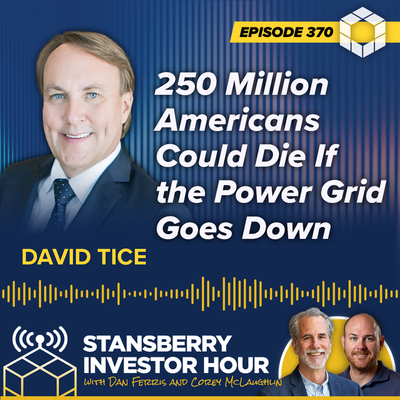
250 Million Americans Could Die If the Power Grid Goes Down
<p class="MsoNormal"><span style= "font-size: 10.0pt; mso-bidi-font-size: 12.0pt; font-family: 'Verdana',sans-serif;"> On this week's <em>Stansberry Investor Hour</em>, Dan and Corey are joined by investor and award-winning filmmaker David Tice. David is the chief investment officer and senior adviser of a short-selling exchange-traded fund. He also is partner at Moran Tice Capital Management, an investment-advisory firm. </span></p> <p class="MsoNormal"><span style= "font-size: 10.0pt; mso-bidi-font-size: 12.0pt; font-family: 'Verdana',sans-serif;"> David kicks off the show by discussing his documentary starring Dennis Quaid, <em>Grid Down, Power Up</em>. The film centers around what would happen if the U.S. power grid went down and the country was left without electricity for a lengthy period of time. David talks about how preventable the catastrophe could be if the government invested in utilities. And he shares that a disaster like this could result in hundreds of millions of Americans dying of starvation or water deprivation. As David emphasizes, this is a <em>very real</em> danger, as America's adversaries are already in the grid from a cyberattack standpoint. (1:36)</span></p> <p class="MsoNormal"><span style= "font-size: 10.0pt; mso-bidi-font-size: 12.0pt; font-family: 'Verdana',sans-serif;"> Next, David details his short-selling AdvisorShares Ranger Equity Bear Fund (HDGE). He explains that the fund is up year to date since many bad companies are finally starting to do poorly in the market, especially in commercial real estate. And several factors – overvalued stocks, high interest rates, massive national debt – are setting the country up for a huge decline. David urges listeners to prepare for the worst rather than try to eke out a few more percentage points in gains, especially considering today's geopolitical conditions. (17:44)</span></p> <p class="MsoNormal"><span style= "font-size: 10.0pt; mso-bidi-font-size: 12.0pt; font-family: 'Verdana',sans-serif;"> Finally, David breaks down how he and his team at HDGE discover companies to short. He cautions, however, that bad stocks can soar just as much as good stocks, so timing is the key factor. After, David discusses his precious metals hedge fund and the huge opportunity he sees in mid-cap producers that are selling extraordinarily cheaply. He lists off two particular gold stocks he's a fan of and explains why he has so much hope for this sector. (34:57)</span></p>
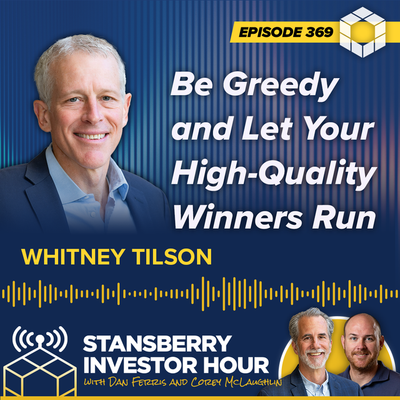
Be Greedy and Let Your High-Quality Winners Run
<p class="MsoNormal"><span style= "font-size: 10.0pt; mso-bidi-font-size: 12.0pt; font-family: 'Verdana',sans-serif;"> On this week's <em>Stansberry Investor Hour</em>, Dan and Corey are joined by their colleague Whitney Tilson. Whitney is the lead editor on <em>Stansberry's Investment Advisory</em> – Stansberry Research's flagship newsletter – as well as <em>Commodity Supercycles</em> and his free e-letter <em>Whitney Tilson's Daily</em>. Once dubbed "The Prophet" by CNBC for his prescient calls, he joins the podcast to share some financial wisdom with listeners. </span></p> <p class="MsoNormal"><span style= "font-size: 10.0pt; mso-bidi-font-size: 12.0pt; font-family: 'Verdana',sans-serif;"> Whitney kicks off the show by talking about the value of attending investing conferences and other company meetings. You can gain insights, talk to fellow investors, share ideas, and either discover promising trends or discover which trends are "bombs." Whitney emphasizes that avoiding calamities is just as important as finding the next big investment idea. He shares his experience with short selling and how he actually lost a lot of money by employing the technique. This leads to a conversation about value traps – what they are and how they can lead to ruin.</span> <span style= "font-size: 10.0pt; mso-bidi-font-size: 12.0pt; font-family: 'Verdana',sans-serif;"> (1:24)</span></p> <p class="MsoNormal"><span style= "font-size: 10.0pt; mso-bidi-font-size: 12.0pt; font-family: 'Verdana',sans-serif;"> Next, Whitney details his storied history with Netflix and why he went from shorting the company to investing in it. Ultimately, he found a 90-bagger. But he sold the stock early and left money on the table. The "most important lesson" he learned from that experience is to let your winners run. As Whitney explains, that's why index funds outperform almost all active managers over a long period of time – because they never sell their winners.</span> <span style= "font-size: 10.0pt; mso-bidi-font-size: 12.0pt; font-family: 'Verdana',sans-serif;"> (16:40)</span></p> <p class="MsoNormal"><span style= "font-size: 10.0pt; mso-bidi-font-size: 12.0pt; font-family: 'Verdana',sans-serif;"> Finally, Whitney hammers home that investors should be selective with stocks and only buy the best-quality businesses. Many of these companies see large drawdowns at some point, which can be perfect buying opportunities... even if you're not able to find the exact bottom. Whitney predicts that Nvidia could see a sizable drop since the company is relatively young and volatile. After, he shares that value stocks, small-cap stocks, and international stocks are all at 20-plus-year lows. This extreme underperformance presents an opportunity for investors wanting to diversify their portfolios. And Whitney also breaks down how to spot a high-quality business that may be struggling in the short term versus a value-trap business that will only head lower. (35:02)</span></p>
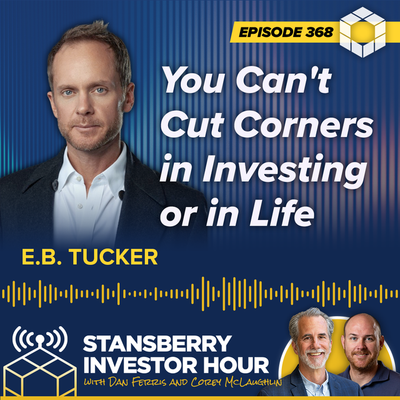
You Can't Cut Corners in Investing or in Life
<p><span dir="ltr" role="presentation">On this week's</span> <span dir="ltr" role="presentation">Stansberry Investor Hour</span><span dir="ltr" role="presentation">, Dan and Corey are joined by E.B. Tucker. E.B. is an</span><br role="presentation" /> <span dir="ltr" role="presentation">author, editor of</span> <span dir="ltr" role="presentation">The Tucker Letter</span><span dir="ltr" role="presentation">, and investor with decades of experience in the precious</span><br role= "presentation" /> <span dir="ltr" role="presentation">metals market.</span></p> <p><br role="presentation" /> <span dir="ltr" role="presentation">E.B. kicks off the show by discussing the unavoidable loss of privacy in the modern era, how</span><br role="presentation" /> <span dir="ltr" role="presentation">societal pressures influence the lives of people of all ages, and the strength it takes to</span><br role="presentation" /> <span dir="ltr" role="presentation">challenge these conventional systems. As he explains, in both the real world and in the</span><br role="presentation" /> <span dir="ltr" role="presentation">world of finance, you need to learn to let go in order for something better to come along.</span><br role="presentation" /> <span dir="ltr" role="presentation">E.B. also breaks down why voting as a shareholder is so important. (1:42)</span></p> <p><br role="presentation" /> <span dir="ltr" role="presentation">Next, E.B. recommends a few nonfinance books – one about the philosophy of happiness and</span><br role="presentation" /> <span dir="ltr" role="presentation">one about Yemeni coffee. He reminds listeners that life is about doing what makes you feel</span><br role="presentation" /> <span dir="ltr" role="presentation">fulfilled and that you should never live according to others' expectations. This leads to a</span><br role="presentation" /> <span dir="ltr" role="presentation">discussion about the role money plays in giving you the freedom to do whatever makes you</span><br role="presentation" /> <span dir="ltr" role="presentation">happy. (23:16)</span></p> <p><br role="presentation" /> <span dir="ltr" role="presentation">Lastly, E.B. talks about his new book he's working on and how he hopes it'll make readers</span><br role="presentation" /> <span dir="ltr" role="presentation">reflect on their own life and learn lessons to help them evolve as people. He relates this to</span><br role="presentation" /> <span dir="ltr" role="presentation">financial teachings, where many readers want shortcuts instead of actually learning for</span><br role="presentation" /> <span dir="ltr" role="presentation">themselves and growing their techniques. E.B. emphasizes that understanding your own</span><br role="presentation" /> <span dir="ltr" role="presentation">relationship to an investment is the real secret to success. (40:44)</span></p>
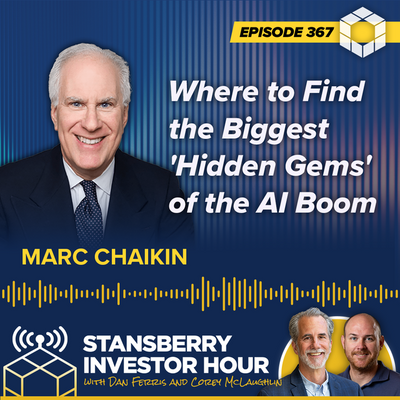
Where to Find the Biggest 'Hidden Gems' of the AI Boom
<p class="MsoNormal"><span style= "font-size: 10.0pt; mso-bidi-font-size: 12.0pt; font-family: 'Verdana',sans-serif;"> On this week's <em>Stansberry Investor Hour</em>, Dan and Corey welcome Marc Chaikin back to the show. Marc is a 50-year Wall Street veteran and the founder of our corporate affiliate, Chaikin Analytics. He also created a popular Wall Street indicator that appears in every Bloomberg and Reuters terminal in the world.</span></p> <p class="MsoNormal"><span style= "font-size: 10.0pt; mso-bidi-font-size: 12.0pt; font-family: 'Verdana',sans-serif;"> Marc kicks off the show by describing why he's so bullish in this presidential-election year. He explains that we're now entering a "sweet spot" for the market, and if there are any election surprises, that would be even more reason to buy in. Marc also lists off some sectors that he's bullish on today, especially in mid-cap stocks. These areas of the market aren't making headlines, but they're seeing steady gains and present attractive buying opportunities. (1:38)</span></p> <p class="MsoNormal"><span style= "font-size: 10.0pt; mso-bidi-font-size: 12.0pt; font-family: 'Verdana',sans-serif;"> Next, Marc shares his thoughts on the current AI boom and compares it with the introduction of the Netscape web browser in 1995. He discusses profit margins versus valuations, the potential loss of jobs due to AI, and the usefulness of large language models like ChatGPT. According to Marc, there are companies across a variety of industry groups that are going to benefit from AI. Investors just have to find them. (15:45)</span></p> <p class="MsoNormal"><span style= "font-size: 10.0pt; mso-bidi-font-size: 12.0pt; font-family: 'Verdana',sans-serif;"> Lastly, Marc shares all the details about his newest, most personal newsletter service that will be launching soon. He explains that it's going to focus on finding "hidden gems" – mid-cap or small-cap stocks that are undiscovered but have great valuations. As Marc says, "The focus is prospecting for gold nuggets." With his custom Power Gauge system by his side, Marc is going to find hidden winners – in a range of sectors – that are set to profit from the AI revolution. (34:32)</span></p>
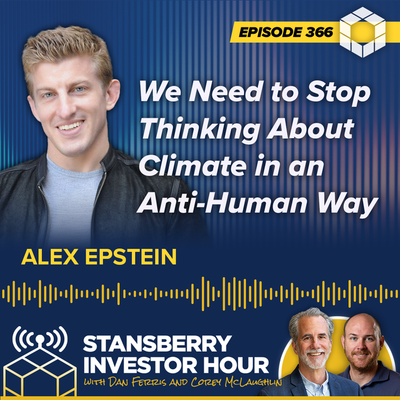
We Need to Stop Thinking About Climate in an Anti-Human Way
<p><span dir="ltr" role="presentation">On this week's</span> <span dir="ltr" role="presentation">Stansberry Investor Hour</span><span dir="ltr" role="presentation">, Dan and Corey welcome author Alex Epstein to the</span><br role="presentation" /> <span dir="ltr" role="presentation">show. Alex has written several books advocating for the use of fossil fuels, including his most</span><br role="presentation" /> <span dir="ltr" role="presentation">recent work,</span> <span dir= "ltr" role="presentation">Fossil Future</span><span dir="ltr" role= "presentation">. The self-described "energy-freedom advocate" joins the podcast</span><br role="presentation" /> <span dir="ltr" role="presentation">to challenge the popular climate-change narrative and provide more context for the crucial</span><br role="presentation" /> <span dir="ltr" role="presentation">role fossil fuels play in society.</span></p> <p><br role="presentation" /> <span dir="ltr" role="presentation">Alex kicks things off by weighing in on the debate around climate change and the effects of</span><br role="presentation" /> <span dir="ltr" role="presentation">fossil fuels. He argues that the benefits of using fossil fuels far outweigh the negatives and</span><br role="presentation" /> <span dir="ltr" role="presentation">that, in many cases, energy can be used to overcome any adverse effects. Alex also breaks</span><br role="presentation" /> <span dir="ltr" role="presentation">down the myth of unsustainability, the anti-human bias implicit in environmentalism, and</span><br role="presentation" /> <span dir="ltr" role="presentation">the incorrect belief that more folks die of climate-related catastrophes today than in the</span><br role="presentation" /> <span dir="ltr" role="presentation">past. (2:38)</span></p> <p><br role="presentation" /> <span dir="ltr" role="presentation">Next, Alex discusses his impact with politicians and lawmakers. He explains that 200 major</span><br role="presentation" /> <span dir="ltr" role="presentation">political offices use his content to direct policy and become more informed on energy topics.</span><br role="presentation" /> <span dir="ltr" role="presentation">Alex then shares his opinion on climate change, pointing out that we're currently in a climate</span><br role="presentation" /> <span dir="ltr" role="presentation">renaissance and that the Earth has never been more livable for human beings. He brings up</span><br role="presentation" /> <span dir="ltr" role="presentation">geoengineering as a way to cool the climate, asserts that the negative environmental</span><br role="presentation" /> <span dir="ltr" role="presentation">impacts are severely overblown, and emphasizes the crucial role energy plays in the</span><br role= "presentation" /> <span dir="ltr" role="presentation">economy. (21:30)</span></p> <p><br role="presentation" /> <span dir="ltr" role="presentation">Finally, Alex talks about climate-change rhetoric dominating in elections, the harm that tech</span><br role="presentation" /> <span dir="ltr" role="presentation">companies have done by blatantly lying about being 100% renewable, and why humans</span><br role="presentation" /> <span dir="ltr" role="presentation">should take pride in the fact that we're progressing as a species and learning to use the</span><br role="presentation" /> <span dir="ltr" role="presentation">Earth in new ways. He puts the anti-impact perspective into both a philosophical and</span><br role="presentation" /> <span dir="ltr" role="presentation">historical context, noting that primitive religions believed "sinning" against nature had dire</span><br role="presentation" /> <span dir="ltr" role="presentation">consequences. (34:19)</span></p>
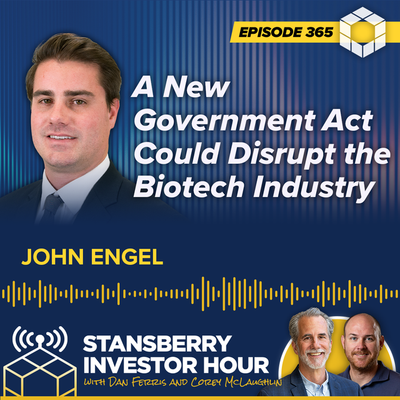
A New Government Act Could Disrupt the Biotech Industry
<p><span dir="ltr" role="presentation">On this week's Stansberry Investor Hour, Dan and Corey welcome their colleague John Engel<br role="presentation" /> to the podcast. John is the lead equity analyst on the Stansberry Innovations Report<br role="presentation" /> newsletter, where he finds companies that are revolutionizing their respective industries<br role="presentation" /> with cutting-edge technology. He also works on Prosperity Investor, a newsletter that<br role="presentation" /> focuses on opportunities in the health care sector.</span></p> <p><span dir="ltr" role="presentation"><br role="presentation" /> John kicks off the show by detailing the new Biosecure Act that's currently moving through<br role="presentation" /> Congress. Its purpose is to limit China's access to U.S. biological information. As he explains,<br role="presentation" /> this legislation is going to disrupt the industry, hurt biotech companies, and possibly even<br role="presentation" /> bankrupt the smaller players. But, conversely, it's going to allow other contract development<br role="presentation" /> and management organizations to replace Chinese ones, creating massive opportunities for<br role="presentation" /> investors. John also shares how he got his start in the biotech field at a fermentation lab and<br role="presentation" /> as a molecular biologist before shifting to the world of finance. (2:19)</span></p> <p><span dir="ltr" role="presentation"><br role="presentation" /> Next, John talks about the pandemic, vaccines, and the current bear market in biotech. He<br role="presentation" /> mentions one big story in biotech that he believes isn't getting enough attention – bispecific<br role="presentation" /> antibodies. This development allows one drug to hit two targets, so patients no longer have<br role="presentation" /> to receive two different drugs for treatment. This leads to a conversation about gene editing,<br role="presentation" /> personalized medicine, and rare diseases. (22:01)</span></p> <p><span dir="ltr" role="presentation"><br role="presentation" /> Finally, John delves into AI, Nvidia, and the "hype cycle" surrounding the technology. He<br role="presentation" /> points out that companies are desperate to use AI to their advantage, but for many of them,<br role="presentation" /> there's no use for it in their business. Plus, John discusses "advanced general intelligence,"<br role="presentation" /> which involves systems that can reason like human beings. (42:27)</span></p>
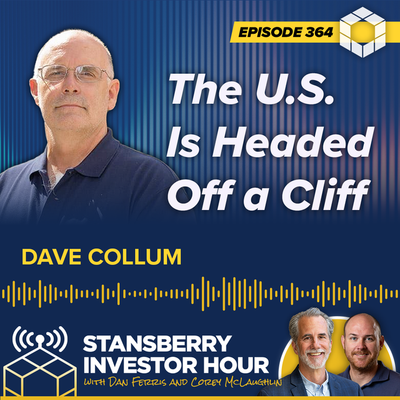
The U.S. Is Headed Off a Cliff
<p><span dir="ltr" role="presentation">On this week's</span> <span dir="ltr" role="presentation">Stansberry Investor Hour</span><span dir="ltr" role="presentation">, Dan and Corey welcome Dave Collum back to the</span><br role="presentation" /> <span dir="ltr" role="presentation">show. Dave is a professor of chemistry at Cornell University and associate editor of the</span><br role="presentation" /> <span dir="ltr" role="presentation">Journal of Organic Chemistry</span><span dir="ltr" role="presentation">. He's outspoken about many topics and issues ranging from</span><br role= "presentation" /> <span dir="ltr" role="presentation">finance to politics and everything in between. And he brings this same no-holds-barred</span><br role="presentation" /> <span dir="ltr" role="presentation">attitude to today's podcast.</span> <span dir="ltr" role="presentation">Dave starts off by discussing the link between vaccines and autism, why "live" attenuated</span> <span dir="ltr" role="presentation">vaccines are better than "dead" ones, and the effects of the COVID-19 vaccine. He</span> <span dir="ltr" role="presentation">specifically mentions how children in the U.S. receive about 72 vaccinations during</span><br role="presentation" /> <span dir="ltr" role="presentation">childhood, while children in Europe receive only three. He also argues that the war in</span><br role="presentation" /> <span dir="ltr" role="presentation">Ukraine is a direct result of NATO interfering and forcing Russian President Vladimir Putin's</span><br role="presentation" /> <span dir="ltr" role="presentation">hand. (5:31)</span></p> <p><br role="presentation" /> <span dir="ltr" role="presentation">Next, Dave talks all about the U.S. government. He breaks down why the U.S. has never</span><br role="presentation" /> <span dir="ltr" role="presentation">supported burgeoning democracies abroad and why it's a better move geopolitically for the</span><br role="presentation" /> <span dir="ltr" role="presentation">country to work with a single leader or a select few in power. He compares President Joe</span><br role="presentation" /> <span dir="ltr" role="presentation">Biden with former President Donald Trump and asserts that Biden wouldn't be able to make</span><br role="presentation" /> <span dir="ltr" role="presentation">tough calls in a time of crisis. After, Dave makes his case for why we're headed for a 40-year</span><br role="presentation" /> <span dir="ltr" role="presentation">bear market that will drag down Americans' standard of living. (24:27)</span></p> <p><br role="presentation" /> <span dir="ltr" role="presentation">Lastly, Dave contends that AI risks taking the human element out of everything, dampening</span><br role="presentation" /> <span dir="ltr" role="presentation">creativity, and cluttering scientific literature. He then discusses the role of pedophilia in</span> <span dir="ltr" role="presentation">geopolitics and the prevalence of child trafficking. And he leaves younger listeners with</span> <span dir="ltr" role="presentation">some sage financial advice. (45:39)</span></p> <p><br role="presentation" /> <span dir="ltr" role="presentation">Dan and Corey close the show by discussing the Federal Reserve's preferred inflation gauge</span> <span dir="ltr" role="presentation">– the core personal consumption expenditures ("PCE") index. The newest core PCE data</span> <span dir="ltr" role="presentation">shows that inflation has stabilized at 2.8% for the past three readings. Even though this is</span> <span dir="ltr" role="presentation">down from much higher levels in 2022, Dan and Corey point out that everyday consumers</span> <span dir="ltr" role="presentation">are still struggling with far higher prices while their paychecks don't keep pace. (1:11:12)</span></p>
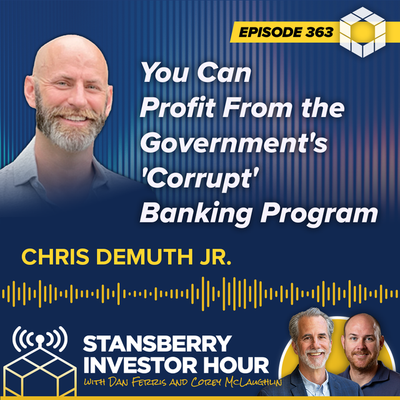
You Can Profit From the Government's 'Corrupt' Banking Program
<p><span dir="ltr" role="presentation">On this week's</span> <span dir="ltr" role="presentation">Stansberry Investor Hour</span><span dir="ltr" role="presentation">, Dan and Corey are joined by Chris DeMuth Jr. Chris</span> <span dir="ltr" role= "presentation">is a co-founder and managing partner of hedge fund Rangeley Capital. He invests in</span><br role="presentation" /> <span dir="ltr" role="presentation">mispriced securities with limited downside and corporate events that unlock value for</span> <span dir="ltr" role="presentation">shareholders.</span> <span dir= "ltr" role="presentation">Chris kicks things off by explaining what event-driven investing is, how he uses it, and how</span><br role= "presentation" /> <span dir="ltr" role="presentation">the concept of "counterparty selection" is involved. He also breaks down what</span> <span dir= "ltr" role="presentation">demutualization and remutualization are and how there are numerous opportunities in the</span> <span dir= "ltr" role="presentation">banking sector today to deploy these strategies. According to Chris, many small-cap</span><br role= "presentation" /> <span dir="ltr" role="presentation">community banks out there are attractive in terms of valuation versus large caps. (3:11)</span></p> <p><br role="presentation" /> <span dir="ltr" role="presentation">Next, Chris describes the U.S. Treasury Department's "inept, corrupt, and profligate"</span> <span dir="ltr" role="presentation">Emergency Capital Investment Program ("ECIP"). He gives two in-depth examples of ECIP</span> <span dir="ltr" role="presentation">bank stocks that were trading for far less than they were worth – Bay Community Bancorp</span> <span dir="ltr" role="presentation">and Ponce Financial. And he discusses why investors who got in early enough will profit from</span> <span dir="ltr" role="presentation">them greatly. (16:03)</span></p> <p><br role="presentation" /> <span dir="ltr" role="presentation">Lastly, Chris names three stocks that he's excited about right now and details the specifics</span> <span dir="ltr" role="presentation">of each one. The first is a tax-efficient real estate and financial-services conglomerate</span> <span dir="ltr" role="presentation">trading at a discount to its asset value. The second is a Russian-owned mining company</span> <span dir="ltr" role="presentation">operating in Venezuela that should soon benefit from litigation against the Venezuelan</span> <span dir="ltr" role="presentation">government. And the final one is a hospice provider with a lot of potential for a private-</span><span dir="ltr" role="presentation">equity shake-up and then subsequent acquisition by a larger health care company. Plus, you</span> <span dir="ltr" role="presentation">won't want to miss Chris' answer to the final question, where he explains how you can gain</span> <span dir="ltr" role="presentation">an edge as an investor simply by researching topics you're genuinely interested in. (29:44)</span></p> <p><br role="presentation" /> <span dir="ltr" role="presentation">Dan and Corey close the show by discussing Nvidia's recent blowout earnings, including its</span> <span dir="ltr" role="presentation">262% revenue gain. Since the company provides the "picks and shovels" of AI, it's benefiting</span><br role="presentation" /> <span dir="ltr" role="presentation">massively from the boom in this space. This leads Dan and Corey to compare AI stocks with</span> <span dir="ltr" role="presentation">Internet stocks during the dot-com bubble, speculate on what could happen next, and</span><br role="presentation" /> <span dir="ltr" role="presentation">explore the disconnect between the markets and the economy. (57:56)</span></p>
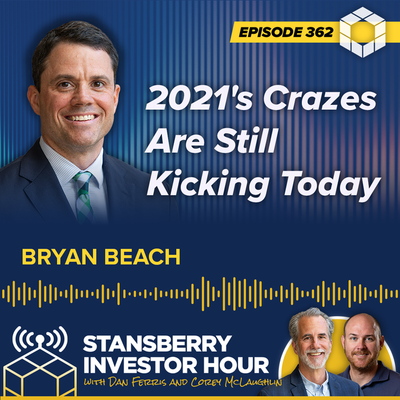
2021's Crazes Are Still Kicking Today
<p><span dir="ltr" role="presentation">On this week's</span> <span dir="ltr" role="presentation">Stansberry Investor Hour</span><span dir="ltr" role="presentation">, Dan and Corey welcome their colleague Bryan</span><br role="presentation" /> <span dir="ltr" role="presentation">Beach back to the show. Bryan is the editor of</span> <span dir="ltr" role= "presentation">Stansberry Venture Value</span> <span dir="ltr" role="presentation">and a senior analyst</span><br role= "presentation" /> <span dir="ltr" role="presentation">on</span> <span dir="ltr" role= "presentation">Stansberry's Investment Advisory</span><span dir= "ltr" role="presentation">. Bryan kicks the show off by discussing the GameStop</span><br role="presentation" /> <span dir="ltr" role="presentation">meme-stock craze and the deep-value market dynamics that were at play during the whole</span><br role="presentation" /> <span dir="ltr" role="presentation">debacle. He argues that the "dumb money" folks (such as Keith Gill) got a bad rep and the</span><br role="presentation" /> <span dir="ltr" role="presentation">self-titled "smart money" folks weren't very smart. (3:13)</span></p> <p><br role="presentation" /> <span dir="ltr" role="presentation">Next, Bryan talks about the bubbles in special purpose acquisition companies ("SPACs") and</span><br role="presentation" /> <span dir="ltr" role="presentation">Software as a Service ("SaaS"). He points out that the pendulum can quickly swing from</span><br role="presentation" /> <span dir="ltr" role="presentation">overloved to overhated. Bryan shares that, because of this, he's still finding winners in the</span><br role="presentation" /> <span dir="ltr" role="presentation">SPAC scrap heap and he believes SaaS valuations are far too low today. He also explains how</span><br role="presentation" /> <span dir="ltr" role="presentation">retail investors got clobbered by the smart money on SPACs and why cannabis stocks</span><br role= "presentation" /> <span dir="ltr" role="presentation">present such a good opportunity now with the impending reclassification of marijuana.</span><br role="presentation" /> <span dir="ltr" role="presentation">(17:33)</span></p> <p><br role="presentation" /> <span dir="ltr" role="presentation">Lastly, Bryan emphasizes the importance of stop losses and "guideposts" since they take the</span><br role="presentation" /> <span dir="ltr" role="presentation">emotion out of investing. This leads to a discussion of Amazon and its many drawdowns over</span><br role="presentation" /> <span dir="ltr" role="presentation">the course of its trading history that would have stopped investors out. After, Bryan brings</span><br role="presentation" /> <span dir="ltr" role="presentation">up small-cap restaurant-software company Par Technology and why he has so much hope for</span><br role="presentation" /> <span dir="ltr" role="presentation">its future performance. (28:02)</span></p> <p><br role="presentation" /> <span dir="ltr" role="presentation">Dan and Corey close things out by talking more about the resurgence of meme stocks –</span><br role="presentation" /> <span dir="ltr" role="presentation">GameStop and AMC Entertainment, in particular – and what it means for the market as a</span><br role="presentation" /> <span dir="ltr" role="presentation">whole. Plus, they talk about this new era of inflation we're in, the worst-case scenario of</span><br role="presentation" /> <span dir="ltr" role="presentation">rebounding inflation, and the long-lasting consequences of low interest rates. (55:39)</span></p>
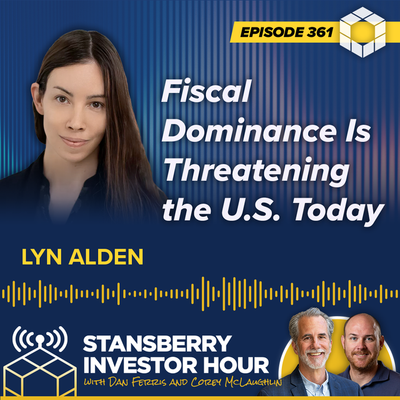
Fiscal Dominance Is Threatening the U.S. Today
<p class="MsoNormal"><span style= "font-size: 10.0pt; mso-bidi-font-size: 12.0pt; font-family: 'Verdana',sans-serif;"> <span style= "font-size: 10.0pt; mso-bidi-font-size: 12.0pt; font-family: 'Verdana',sans-serif; mso-fareast-font-family: Aptos; mso-fareast-theme-font: minor-latin; mso-bidi-font-family: 'Times New Roman'; mso-bidi-theme-font: minor-bidi; mso-ansi-language: EN-US; mso-fareast-language: EN-US; mso-bidi-language: AR-SA;"> On this week's <em>Stansberry Investor Hour</em>, Dan and Corey welcome Lyn Alden to the show. Lyn is an independent analyst, bestselling author, and founder of Lyn Alden Investment Strategy – an investment research service for both retail and institutional investors.</span> She kicks the podcast off by describing how her background in engineering has influenced her macroeconomic investing style. She explains why she became so interested in macroeconomics in the first place and why 2017 was a turning point for the U.S. economy. Lyn also talks about fiscal dominance – or when fiscal deficits and federal debts are large enough that they start reducing a central bank's options. She puts this in the historical context of the 1970s and clarifies why inflation and interest rates are so complexly intertwined today. (4:39)</span></p> <p class="MsoNormal"><span style= "font-size: 10.0pt; mso-bidi-font-size: 12.0pt; font-family: 'Verdana',sans-serif;"> Next, Lyn shares her outlook for the U.S. economy, including higher-than-baseline inflation for the foreseeable future and the country being in a similar situation to emerging markets. She discusses areas of the market where fiscal dominance has been appearing over the past few years, how the 2010s taught investors the wrong lesson, why the U.S. may experience the same economic troubles that Japan is facing right now, and the divergence between sectors going through recessions versus those that benefit from deficits. (16:42)</span></p> <p class="MsoNormal"><span style= "font-size: 10.0pt; mso-bidi-font-size: 12.0pt; font-family: 'Verdana',sans-serif;"> Lastly, Lyn cautions listeners against using the traditional 60/40 portfolio in inflationary environments like today's and instead urges them to prioritize energy, precious metals, and hard assets. She also breaks down why she finds Latin America so attractive today (particularly Brazil, Colombia, and Mexico) and gives an in-depth explanation of how technology impacts money. (34:03)</span></p> <p class="MsoNormal"><span style= "font-size: 10.0pt; mso-bidi-font-size: 12.0pt; font-family: 'Verdana',sans-serif;"> Dan and Corey close things out by discussing the backlash to Argentine President Javier Milei's economic shake-up, including his devaluing the peso against the U.S. dollar and laying off thousands of government workers. Plus, they share their thoughts on the latest speculative meme craze – closed-end fund Destiny Tech100 (DXYZ) – and what it means for the broader market. (54:28)</span></p>

Get Into Oil Before It Hits $100 Per Barrel
<p><span dir="ltr" role="presentation">On this week's</span> <span dir="ltr" role="presentation">Stansberry Investor Hour</span><span dir="ltr" role="presentation">, Dan and Corey are joined by the founder and</span> <span dir="ltr" role= "presentation">president of Chisholm Exploration, Cactus Schroeder. Cactus kicks off the conversation by</span> <span dir="ltr" role= "presentation">describing the current economics of the oil industry, why rig counts are deceptive, what's</span> <span dir= "ltr" role="presentation">happening with the Haynesville Shale and Marcellus Shale, and the upside in natural gas. He</span> <span dir="ltr" role="presentation">also explains why the Barnett Shale has become so attractive, how Chisholm Exploration</span> <span dir="ltr" role="presentation">differs from the oil majors, and how these larger companies essentially control the price of</span> <span dir="ltr" role="presentation">oil. (4:18)</span></p> <p><span dir="ltr" role="presentation">Next, Cactus discusses why his company prefers oil to natural gas, earthquakes as a side </span><span dir="ltr" role="presentation">effect of drilling, and how the Biden administration has been hampering exploration and </span><span dir="ltr" role= "presentation">pipeline development. He also details his experience in the Eastern Shelf region, including</span> <span dir="ltr" role= "presentation">both good and bad wells and royalty interests. (21:52)</span></p> <p><span dir="ltr" role="presentation">Lastly, Cactus covers the oil major he finds the most interesting today, the green-energy </span><span dir="ltr" role= "presentation">movement, and what's on the horizon for oil. He brings up Saudi Arabia cutting oil</span> <span dir="ltr" role= "presentation">production in an effort to make prices reach $100 per barrel, the consequences of the war in</span> <span dir="ltr" role="presentation">Gaza, and the ongoing fight between land ownership and mineral rights in different states.</span> <span dir= "ltr" role="presentation">(31:03)</span></p> <p><span dir="ltr" role="presentation">Dan and Corey close things out by discussing the consequences of the Drug Enforcement </span><span dir="ltr" role= "presentation">Administration moving to reclassify marijuana as a Schedule III drug. They analyze what has</span><br role= "presentation" /> <span dir="ltr" role="presentation">been happening with cannabis stocks since the announcement and the tax implications</span> <span dir="ltr" role="presentation">behind the move. Plus, they talk about Starbucks' recent disappointing earnings report and</span> <span dir="ltr" role="presentation">what weight-loss drugs becoming more available could mean for the economy and certain</span> <span dir="ltr" role="presentation">stocks. (53:32)</span></p>
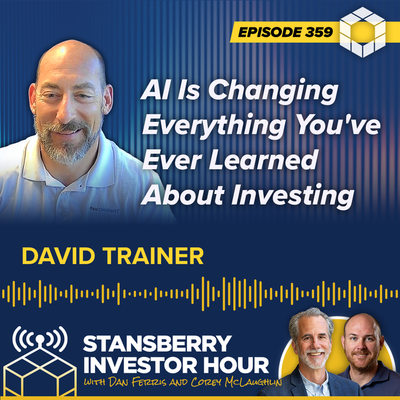
AI Is Changing Everything You've Learned About Investing
<p><span dir="ltr" role="presentation">David Trainer, the founder and CEO of New Constructs, joins the show. He kicks off the</span> <span dir="ltr" role="presentation">conversation by describing how his company takes value investing to the next level with AI.</span> <span dir="ltr" role="presentation">He explains that the days of buying stocks and holding them forever are gone. Today's</span> <span dir="ltr" role="presentation">investing landscape requires investors to be more agile, and AI helps with this. David</span> <span dir="ltr" role="presentation">specifically mentions how he uses AI to sort through millions of financial filings, footnotes,</span> <span dir="ltr" role="presentation">and data points to give him an edge and produce better results. However, he warns that AI</span> <span dir="ltr" role="presentation">is only as good as the data that goes into it. (3:49)</span></p> <p><span dir="ltr" role="presentation">Then, David talks in depth about how humans are still involved in the investing process,</span> <span dir="ltr" role="presentation">including making decisions when the AI is unsure how to interpret certain findings. He</span> <span dir="ltr" role="presentation">breaks down how New Constructs' technology is giving clients a competitive advantage and</span> <span dir="ltr" role="presentation">augmenting the rest of their strategy. Plus, David discusses the importance of using both</span> <span dir="ltr" role="presentation">technicals and fundamentals when investing, and he shares why expectations matter so</span> <span dir="ltr" role="presentation">much to valuation. (14:34)</span></p> <p><span dir="ltr" role="presentation">Lastly, David names the two sectors he finds most attractive and two that folks should</span> <span dir="ltr" role="presentation">avoid. This segues into a conversation about a recent pump-and-dump scheme used to take</span> <span dir="ltr" role="presentation">advantage of retail investors, why the U.S. Securities and Exchange Commission doesn't </span><span dir="ltr" role="presentation">take action even when it should, and the damage done by years of low interest rates. (33:35)</span></p> <p><span dir="ltr" role="presentation">Dan and Corey close things out by discussing inflation and the hotter-than-expected </span><span dir="ltr" role= "presentation">numbers for the personal consumption expenditures index. They cover unrealistic investor</span> <span dir="ltr" role= "presentation">expectations for rate cuts, the government's misplaced priorities, and the very real</span> <span dir="ltr" role="presentation">consequences of this persistent inflation on workers and small businesses. (51:20)</span></p>
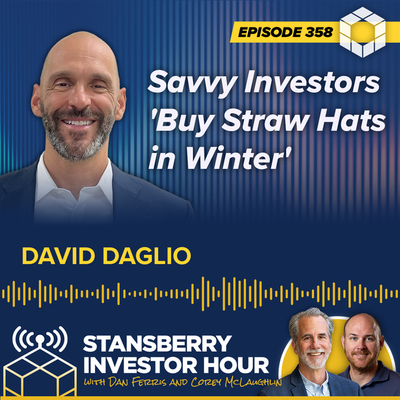
Savvy Investors 'Buy Straw Hats in Winter'
<p><span dir="ltr" role="presentation">David Daglio, the chief investment officer and global investment strategist of wealth-</span><br role="presentation" /> <span dir="ltr" role="presentation">advisory firm TwinFocus, joins the show. He kicks things off by describing himself as a</span><br role="presentation" /> <span dir="ltr" role="presentation">contrarian, and he explains that understanding who you are as a person will lead to the best</span><br role="presentation" /> <span dir="ltr" role="presentation">investing results. After, he goes into detail on how TwinFocus looks for creative "straw hat"</span><br role="presentation" /> <span dir="ltr" role="presentation">solutions that the market isn't seeing. Plus, he talks about risk premiums, the current</span><br role="presentation" /> <span dir="ltr" role="presentation">opportunity in natural gas, and the 30-year discount in gold-mining stocks. (3:29)</span></p> <p><br role="presentation" /> <span dir="ltr" role="presentation">Next, David discusses the advantages and disadvantages of working at a large firm versus</span><br role="presentation" /> <span dir="ltr" role="presentation">being an individual investor. He shares that individual investors have the advantage of not</span><br role="presentation" /> <span dir="ltr" role="presentation">being overloaded with information, plus they're their own boss and can make their own</span><br role="presentation" /> <span dir="ltr" role="presentation">decisions. David also details the three conditions TwinFocus looks for before jumping into an</span><br role="presentation" /> <span dir="ltr" role="presentation">investment, the importance of recognizing your own intellectual biases, and how market</span><br role="presentation" /> <span dir="ltr" role="presentation">skepticism can be a huge opportunity. (15:29)</span></p> <p><br role="presentation" /> <span dir="ltr" role="presentation">Lastly, David talks about "net-net" companies in the biotech sector that are trading for less</span><br role="presentation" /> <span dir="ltr" role="presentation">than their total assets... he breaks down what capital imbalance is and how to spot it... and</span><br role="presentation" /> <span dir="ltr" role="presentation">he explains that the savviest investors try to be like Spock from</span> <span dir="ltr" role= "presentation">Star Trek</span><span dir="ltr" role= "presentation">, valuing facts over</span><br role= "presentation" /> <span dir="ltr" role="presentation">feelings. (28:49)</span></p> <p><br role="presentation" /> <span dir="ltr" role="presentation">Dan and Corey close out the podcast by discussing the Stansberry Research editorial</span><br role="presentation" /> <span dir="ltr" role="presentation">meeting that happened last week. This meeting brings Stansberry's editors and analysts</span><br role="presentation" /> <span dir="ltr" role="presentation">together to discuss different investing ideas and pertinent world news. One of the hot topics</span><br role="presentation" /> <span dir="ltr" role="presentation">at the meeting was the presidential election in November. Dan and Corey emphasize that</span><br role="presentation" /> <span dir="ltr" role="presentation">the best investors keep politics out of their investing decisions and stick to their core</span><br role="presentation" /> <span dir="ltr" role="presentation">strategy regardless of which candidate takes office. (49:22)</span></p>
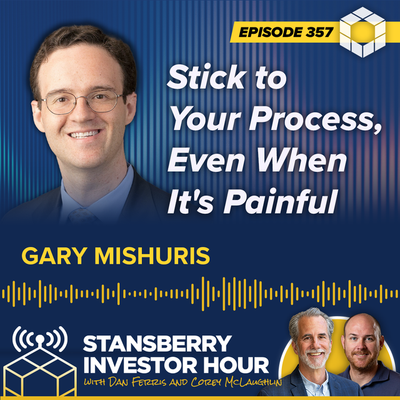
Stick to Your Process, Even When It's Painful
<p><span dir="ltr" role="presentation">Gary Mishuris of Silver Ring Value Partners talks about today's market being one of the most</span> <span dir="ltr" role="presentation">challenging periods for bottom-up investing since 2007. In terms of the quality of a business</span><br role="presentation" /> <span dir="ltr" role="presentation">versus its stock price, there isn't a lot of opportunity right now. But he emphasizes that</span> <span dir="ltr" role="presentation">transparency and candor with clients is essential, as is prioritizing the long-term process</span><br role="presentation" /> <span dir="ltr" role="presentation">over short-term performance. (5:19)</span></p> <p><br role="presentation" /> <span dir="ltr" role="presentation">Next, Gary describes what sets Silver Ring Value apart from other fund managers. He shares</span> <span dir="ltr" role="presentation">why he left the "sausage factory" of larger firms behind, how his firm makes money</span> <span dir="ltr" role="presentation">for</span><br role= "presentation" /> <span dir="ltr" role="presentation">clients rather than</span> <span dir="ltr" role="presentation">off of</span> <span dir="ltr" role="presentation">clients, and how his unique temperament and behavioral models</span> <span dir="ltr" role="presentation">allow him to make better investing decisions. (14:38)</span></p> <p><br role="presentation" /> <span dir="ltr" role="presentation">Gary also goes into detail on the psychology behind investing and compares it with a game</span> <span dir="ltr" role="presentation">of poker. He talks about trying to avoid making mistakes, continuously learning from past</span><br role="presentation" /> <span dir="ltr" role="presentation">errors, the importance of having guardrails in place, and cutting your losses. (21:44)</span></p> <p><br role="presentation" /> <span dir="ltr" role="presentation">Then, Gary explains why you should never be ashamed to change your mind, even when you</span> <span dir="ltr" role="presentation">haven't received any new information. It's OK to reanalyze the same set of facts and admit</span><br role="presentation" /> <span dir="ltr" role="presentation">that you were wrong, and he cites several examples of investors who have learned and</span> <span dir="ltr" role="presentation">grown from their past mistakes. (31:21)</span></p> <p><br role="presentation" /> <span dir="ltr" role="presentation">Lastly, Dan and Corey discuss the consumer price index and gold. Inflation came in hotter</span> <span dir="ltr" role="presentation">than expected, while gold has broken out to new highs. Dan and Corey speculate on how</span> <span dir="ltr" role="presentation">long gold's bull run can last. Plus, they detail gold being a good hedge for retirement against</span> <span dir="ltr" role="presentation">the government's money-printing addiction. (48:18)</span></p>
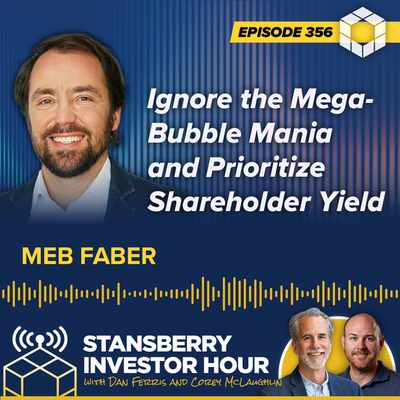
Ignore the Mega-Bubble Mania and Prioritize Shareholder Yield
<p class="MsoNormal"><span style= "font-size: 10.0pt; mso-bidi-font-size: 12.0pt; font-family: 'Verdana',sans-serif;"> Dan and Corey kick off the show by discussing inflation staying persistently higher, rampant government spending and money-printing, and the repercussions of the Federal Reserve's decade-plus of low interest rates. (0:41)</span></p> <p class="MsoNormal"><span style= "font-size: 10.0pt; mso-bidi-font-size: 12.0pt; font-family: 'Verdana',sans-serif;"> Next, Cambria Investment Management's Meb Faber joins the conversation to talk about the exchange-traded funds ("ETFs") at Cambria and why the team focuses on shareholder yield when picking stocks for these ETFs. He breaks down the importance of shareholder yield in mega-bubble markets like today's and urges investors to pay more attention to it. (24:25)</span></p> <p class="MsoNormal"><span style= "font-size: 10.0pt; mso-bidi-font-size: 12.0pt; font-family: 'Verdana',sans-serif;"> Meb then discusses managing risk on a portfolio level, including focusing on quality and value. He also covers why emerging and foreign markets are so attractive today, the opportunity in fixed-income investments like bonds and Treasury bills, and how higher interest rates have changed the game. (38:21)</span></p> <p class="MsoNormal"><span style= "font-size: 10.0pt; mso-bidi-font-size: 12.0pt; font-family: 'Verdana',sans-serif;"> Finally, Meb describes himself as a value investor and shares which areas of the economy he's most concerned about. He talks about inflation driving commodities sharply higher, gold hitting new highs, and why investing at all-time highs can still be a smart choice. (56:43)</span></p>
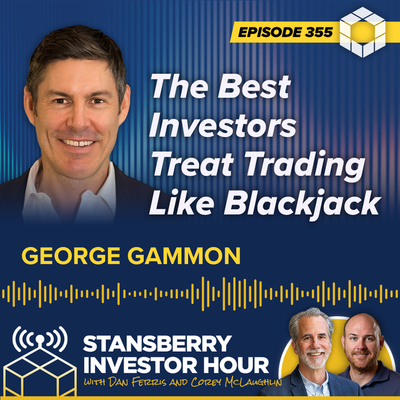
The Best Investors Treat Trading Like Blackjack
<p><span dir="ltr" role="presentation">Dan and Corey kick off the show by reviewing the most recent PCE number, what's</span><br role="presentation" /> <span dir="ltr" role="presentation">happening with inflation, and the current state of the economy. (0:41)</span></p> <p><br role="presentation" /> <span dir="ltr" role="presentation">Next, real estate expert and entrepreneur George Gammon joins the conversation and</span><br role="presentation" /> <span dir="ltr" role="presentation">explains how he became a self-described "macro addict" without any formal education in the</span><br role="presentation" /> <span dir="ltr" role="presentation">world of finance or economics. Plus, he discusses why he considers himself a libertarian and</span><br role="presentation" /> <span dir="ltr" role="presentation">why most investors and billionaires would fall into this category, even if they don't self-</span><br role="presentation" /> <span dir="ltr" role="presentation">identify as such. (21:59)</span></p> <p><br role="presentation" /> <span dir="ltr" role="presentation">Further, George describes how his investment style is influenced by being a libertarian. By</span><br role="presentation" /> <span dir="ltr" role="presentation">default, his view is that the government is always going to do the wrong thing, resulting in</span><br role="presentation" /> <span dir="ltr" role="presentation">unintended, net-negative consequences. George also goes into detail on the similarities</span><br role="presentation" /> <span dir="ltr" role="presentation">between value investing and trend following. He argues that successful value investors are</span><br role="presentation" /> <span dir="ltr" role="presentation">always looking for a catalyst so that they can catch the trend at its very beginning stages,</span><br role="presentation" /> <span dir="ltr" role="presentation">while stereotypical investors are happy to catch the middle portion of the trend. (34:16)</span></p> <p><br role="presentation" /> <span dir="ltr" role="presentation">Lastly, George explores the biggest differences between retail investors and professional</span><br role="presentation" /> <span dir="ltr" role="presentation">investors. He details the strategy that the best hedge-fund managers use: starting with a</span><br role="presentation" /> <span dir="ltr" role="presentation">macro view and then looking at the fundamentals and the narrative later. George</span><br role= "presentation" /> <span dir="ltr" role="presentation">emphasizes that these experts spend most of their time deciding how to position themselves</span><br role="presentation" /> <span dir="ltr" role="presentation">and using asymmetry to stack the odds in their favor like in a game of blackjack. (46:32)</span></p>
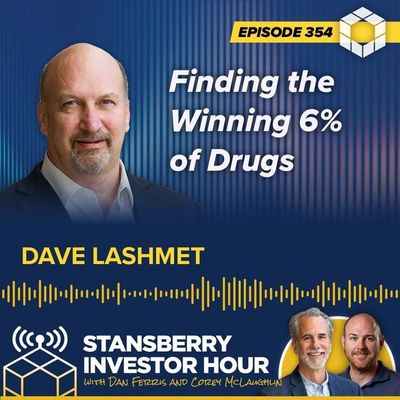
Finding the Winning 6% of Drugs
<p class="MsoNormal"><span style= "font-size: 10.0pt; mso-bidi-font-size: 12.0pt; font-family: 'Verdana',sans-serif;"> Dan and Corey kick off the show by arguing against the Federal Reserve potentially cutting rates this year. They point out that inflation is persistently volatile, gas prices are soaring and hurting everyday consumers, and the Fed is "pretending that everything is OK," according to Corey. Dan also brings up the fact that 2024 being an election year may have something to do with this. (0:43)</span></p> <p class="MsoNormal"><span style= "font-size: 10.0pt; mso-bidi-font-size: 12.0pt; font-family: 'Verdana',sans-serif;"> Next, <em>Stansberry Venture Technology</em> editor Dave Lashmet joins the conversation to discuss the biotech industry. He explains that he doesn't see biotech as a sector, and rather he looks bottom up at biotech companies to find a drug that will have a macroeconomic effect. Because only 6% of drugs that start a Phase I trial succeed, he says being selective is crucial. Dave also describes the three phases of drug testing and the importance of efficacy and safety data. (17:55)</span></p> <p class="MsoNormal"><span style= "font-size: 10.0pt; mso-bidi-font-size: 12.0pt; font-family: 'Verdana',sans-serif;"> After, Dave talks all things weight-loss drugs. He reflects on how he knew Ozempic was going to be a blockbuster drug from his boots-on-the-ground research, the incredible room for growth in this area, and the unprecedented amounts of money that biotech companies are spending on factories to develop these weight-loss drugs. (24:36)</span></p> <p class="MsoNormal"><span style= "font-size: 10.0pt; mso-bidi-font-size: 12.0pt; font-family: 'Verdana',sans-serif;"> Further, Dave discusses why the obesity epidemic has worsened over the decades and how exactly weight-loss drugs work to increase metabolism and suppress appetite. It involves something he calls the "winter switch." Plus, Dave brings up the U.S. Food and Drug Administration approving these drugs for the purpose of reducing strokes and heart attacks by nearly 20%. (32:40)</span></p> <p class="MsoNormal"><span style= "font-size: 10.0pt; mso-bidi-font-size: 12.0pt; font-family: 'Verdana',sans-serif;"> Lastly, Dave talks about the widespread economic implications behind weight-loss drugs and other areas of the market that could be impacted, such as the airline industry. However, Dave emphasizes once again that any mass changes are still years away due to supply constraints. (41:20)</span></p>
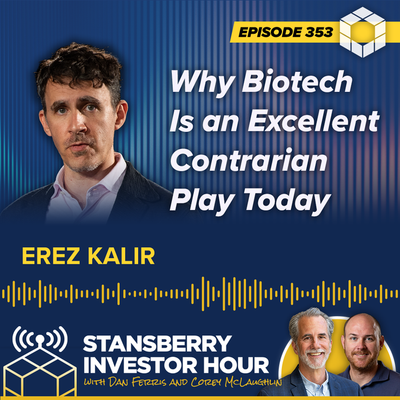
Why Biotech Is an Excellent Contrarian Play Today
<p><span dir="ltr" role="presentation">Dan and Corey kick off the show by discussing both bubbles and "anti-bubble" stocks. Dan</span><br role="presentation" /> <span dir="ltr" role="presentation">mentions how the S&P 500 Index's cyclically adjusted price-to-earnings ratio, with data</span><br role="presentation" /> <span dir="ltr" role="presentation">going back to 1871, is currently in the top 1%. He even believes this is the biggest mega-</span><br role="presentation" /> <span dir="ltr" role="presentation">bubble in all of recorded history. (0:41)</span></p> <p><br role="presentation" /> <span dir="ltr" role="presentation">Next, Porter & Co. analyst Erez Kalir joins the conversation and shares his financial</span><br role="presentation" /> <span dir="ltr" role="presentation">philosophy. He talks about investing legends who have influenced his investing style, the</span><br role="presentation" /> <span dir="ltr" role="presentation">importance of avoiding labels, and how successful investing is similar to using a Swiss Army</span><br role="presentation" /> <span dir="ltr" role="presentation">knife. Plus, Erez explains the yin and yang of macroeconomics versus security-specific</span><br role="presentation" /> <span dir="ltr" role="presentation">fundamentals and how there are extreme periods where one can entirely dominate the</span><br role= "presentation" /> <span dir="ltr" role="presentation">other. (13:00)</span></p> <p><br role="presentation" /> <span dir="ltr" role="presentation">After, Erez goes into detail about biotech – the sector's history in the stock market, how it's</span><br role="presentation" /> <span dir="ltr" role="presentation">shaped by interest rates, and how you can find companies trading at an extreme discount</span><br role="presentation" /> <span dir="ltr" role="presentation">with negative enterprise value. He argues that not being able to time the markets is merely</span><br role="presentation" /> <span dir="ltr" role="presentation">a myth, and he shares the seven factors he uses to evaluate whether a biotech stock is</span><br role="presentation" /> <span dir="ltr" role="presentation">worth buying. (21:59)</span></p> <p><br role="presentation" /> <span dir="ltr" role="presentation">Lastly, Erez explains why the conditions are right for biotech stocks today. He covers the</span><br role="presentation" /> <span dir="ltr" role="presentation">sector being hated and how this gives savvy investors a chance to break away from the herd and profit. (38:36)</span></p>
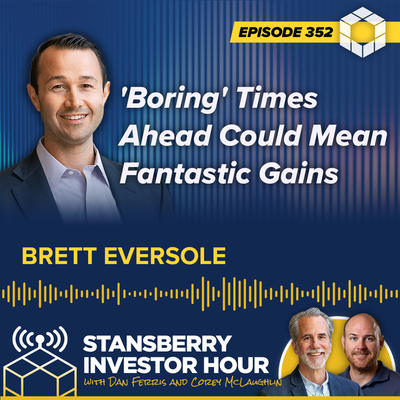
'Boring' Times Ahead Could Mean Fantastic Gains
<p><span dir="ltr" role="presentation">Dan and Corey kick off the show by discussing famed economist Nouriel "Dr. Doom" Roubini</span><br role="presentation" /> <span dir="ltr" role="presentation">and his current bullish stance. They explore whether Dr. Doom is correct in his optimism, if</span><br role="presentation" /> <span dir="ltr" role="presentation">gold's new all-time highs are here to stay, and what could happen next with bitcoin. (0:41)</span></p> <p><br role="presentation" /> <span dir="ltr" role="presentation">Next, Stansberry Research editor Brett Eversole joins the conversation and talks about</span><br role="presentation" /> <span dir="ltr" role="presentation">where he thinks stocks will go this year thanks to the election. After, he analyzes the overall</span><br role="presentation" /> <span dir="ltr" role="presentation">health of the market using several different metrics, urges investors to invest based on the</span><br role="presentation" /> <span dir="ltr" role="presentation">size of a company's market capitalization, gives his thoughts on whether small-cap stocks</span><br role="presentation" /> <span dir="ltr" role="presentation">can catch up to the rest of the market, and reviews moments of extreme volatility in history.</span><br role="presentation" /> <span dir="ltr" role="presentation">(16:49)</span></p> <p><br role="presentation" /> <span dir="ltr" role="presentation">Further, Brett describes a shareholder yield fund and how it works. He points out that if you</span><br role="presentation" /> <span dir="ltr" role="presentation">buy companies that return a lot of cash to shareholders, those companies tend to go up a lot</span><br role="presentation" /> <span dir="ltr" role="presentation">over time. He also discusses the strategies he uses in his</span> <span dir="ltr" role= "presentation">True Wealth</span> <span dir="ltr" role= "presentation">publication to find</span><br role="presentation" /> <span dir="ltr" role="presentation">winning stocks, buy in at the right time, and protect capital. (29:35)</span></p> <p><br role="presentation" /> <span dir="ltr" role="presentation">Finally, Brett explains why he isn't investing in individual Chinese stocks today, but he</span><br role="presentation" /> <span dir="ltr" role="presentation">provides one unique way to still profit from China that you may have never heard of. (47:15</span></p>
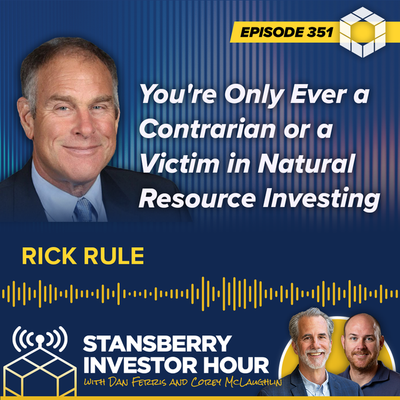
You're Only Ever a Contrarian or a Victim in Natural Resource Investing
<p><span dir="ltr" role="presentation">Dan and Corey kick off the show by discussing Warren Buffett's recent letter to Berkshire</span><br role="presentation" /> <span dir="ltr" role="presentation">Hathaway shareholders. In it, he honored his late colleague and friend Charlie Munger, plus</span><br role="presentation" /> <span dir="ltr" role="presentation">gave updates on some of Berkshire's businesses. Dan and Corey also cover Apple switching</span><br role="presentation" /> <span dir="ltr" role="presentation">its resources over from electric vehicles to artificial intelligence. (0:41)</span></p> <p><br role="presentation" /> <span dir="ltr" role="presentation">Next, Rick Rule – president and CEO of Rule Investment Media – joins the conversation. He</span><br role="presentation" /> <span dir="ltr" role="presentation">goes into depth on models, such as the discounted cash flow model. He talks about the flaws</span><br role="presentation" /> <span dir="ltr" role="presentation">with models, why models are only useful for apples-to-apples comparisons, and how a model</span><br role="presentation" /> <span dir="ltr" role="presentation">can be used on exploration companies or similar companies that don't have revenues.</span><br role="presentation" /> <span dir="ltr" role="presentation">(24:32)</span></p> <p><br role="presentation" /> <span dir="ltr" role="presentation">After, Rick goes into detail on the uranium market. He describes why uranium companies</span><br role="presentation" /> <span dir="ltr" role="presentation">have mothballed production, what makes uranium so unique in the natural resources world,</span><br role="presentation" /> <span dir="ltr" role="presentation">the differences between the spot and term markets, and how to interpret uranium</span><br role= "presentation" /> <span dir="ltr" role="presentation">companies' financials. (33:18)</span></p> <p><br role="presentation" /> <span dir="ltr" role="presentation">Lastly, Rick calls out several commodities that present good investing opportunities today.</span><br role="presentation" /> <span dir="ltr" role="presentation">He describes one of them as "stupidly cheap"... another he says is hated by investors and its</span><br role="presentation" /> <span dir="ltr" role="presentation">market is in disarray... and the final two, he explains, are being sold off because of an</span><br role="presentation" /> <span dir="ltr" role="presentation">incorrect belief that we don't need internal-combustion engines anymore. Rick even goes</span><br role="presentation" /> <span dir="ltr" role="presentation">one step further and namedrops specific companies that could be worth looking into to take</span><br role="presentation" /> <span dir="ltr" role="presentation">advantage of these price discounts. (49:15)</span></p>
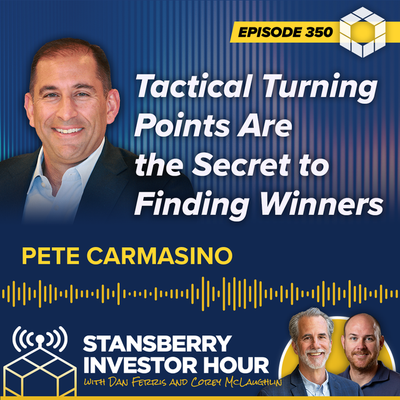
Tactical Turning Points Are the Secret to Finding Winners
<p><span class="s2">Dan and Corey kick</span> <span class= "s2">off</span> <span class="s2">the show</span> <span class= "s2">by discussing new highs</span> <span class="s2">in the S&P 500 Equal Weight Index, Japan's Nikkei 225 Index, and chipmaker Nvidia</span><span class="s2">'s stock</span><span class= "s2">.</span> <span class="s2">They analyze what these new highs mean, whether the U.S. is still in a mega-bubble, what's happening with the Japanese economy, and if Nvidia can continue its outperformance.</span> <span class="s2">(0:41)</span></p> <p><span class="s2">Next,</span> <span class="s2">Chaikin Analytics</span> <span class="s2">Chief Market Strategist</span> <span class="s2">Pete Carmasino</span> <span class="s2">joins the conversation</span> <span class="s2">and</span> <span class= "s2">d</span><span class="s2">escrib</span><span class= "s2">es</span> <span class="s2">his investing style. He notes that</span> <span class="s2">he mainly looks at</span> <span class= "s2">price</span><span class="s2">.</span> <span class= "s2">B</span><span class="s2">y</span> <span class="s2">using technical analysis and studying</span> <span class="s2">the fundamentals</span><span class="s2">, trends, and the relative strength versus the market,</span> <span class="s2">he can decipher</span> <span class="s2">whether</span> <span class="s2">a stock is overbought</span><span class="s2">. (20:28)</span></p> <p><span class="s2">Further,</span> <span class="s2">Pete</span> <span class="s2">talks about the importance of risk management and taking advantage of tactical moves</span><span class="s2">.</span> <span class="s2">He gives investors advice for how to determine when something is a tactical sell or a tactical buy, discusses the</span> <span class="s2">relationship</span> <span class= "s2">between technicals and fundamentals</span><span class="s2">, and</span> <span class="s2">explains why he looks at both offensive and defensive sectors</span> <span class="s2">for investing opportunities</span><span class="s2">.</span><span class= "s2">(25:55)</span></p> <p><span class="s2">Pete then details why he's never too bullish or bearish at any given time, plus how the Chaikin Analytics Power Gauge</span> <span class="s2">system</span> <span class="s2">helps him find potential winners.</span> <span class="s2">He describes his process for interpreting the signals and</span> <span class= "s2">discusses the</span> <span class="s2">fundamentals</span> <span class="s2">he needs to see</span> <span class="s2">to</span> <span class="s2">be</span> <span class="s2">interested in a stock.</span> <span class="s2">(39:47)</span></p> <p><span class="s2">Lastly,</span> <span class="s2">Pete</span> <span class="s2">hammers home the importance of rates – particularly the unemployment rate, since the Federal Reserve uses it</span> <span class="s2">to determine the federal-funds rate. He also shares the top five subsectors currently and</span> <span class="s2">names</span> <span class="s2">a few</span> <span class="s2">stocks</span> <span class="s2">within those sectors that could be worth keeping an eye on.</span> <span class= "s2">(51:15)</span></p>

Now Is a Great Time to Be a Bond Investor
<p>Dan and Corey kick things off by discussing Lyft shares soaring after a numeric typo in the company's earnings report, market volatility after the latest consumer price index release, the possibility of "Volmageddon" 2.0, and the harms of passive investing. When speaking about all the trouble brewing in the markets today, Dan notes, "Risks don't register until they happen." (<a class= "yt-core-attributed-string__link yt-core-attributed-string__link--display-type yt-core-attributed-string__link--call-to-action-color" tabindex="0" href= "https://www.youtube.com/watch?v=hk5s41vmqi8&t=41s" target="" rel="nofollow">0:41</a>)</p> <p>Next, Stansberry Research editor Mike DiBiase joins the conversation and shares his concerns about the bond market. Specifically, he believes that we're in the early stages of the next credit crisis. He goes into detail about why we're overdue for such an event, which specific indicators are signaling turbulent times ahead for the market, and whether the Federal Reserve could do anything to lessen the inevitable damage. (<a class= "yt-core-attributed-string__link yt-core-attributed-string__link--display-type yt-core-attributed-string__link--call-to-action-color" tabindex="0" href= "https://www.youtube.com/watch?v=hk5s41vmqi8&t=1493s" target="" rel="nofollow">24:53</a>)</p> <p>Mike also analyzes the stock market and how it paints a bleak picture. As he explains, corporate earnings declined in 2023 even though many companies had a fantastic year and posted incredible numbers. And despite this "earnings recession," stocks are still trading at all-time highs. (<a class= "yt-core-attributed-string__link yt-core-attributed-string__link--display-type yt-core-attributed-string__link--call-to-action-color" tabindex="0" href= "https://www.youtube.com/watch?v=hk5s41vmqi8&t=1945s" target="" rel="nofollow">32:25</a>)</p> <p>Then, Mike covers why he believes the struggling U.S. consumer is going to usher in the next credit crisis, how today's market is so similar to 2008's, and why corporate bonds still make for good investments. (<a class= "yt-core-attributed-string__link yt-core-attributed-string__link--display-type yt-core-attributed-string__link--call-to-action-color" tabindex="0" href= "https://www.youtube.com/watch?v=hk5s41vmqi8&t=2138s" target="" rel="nofollow">35:38</a>)</p> <p>Lastly, Mike discusses how this new era of high interest rates has irreversibly altered the investing landscape that people have grown accustomed to over the past 40 years. He explains that stocks were the favored investment when the Fed was keeping rates near zero, but bonds are back on a more equal playing field thanks to high interest rates. (<a class= "yt-core-attributed-string__link yt-core-attributed-string__link--display-type yt-core-attributed-string__link--call-to-action-color" tabindex="0" href= "https://www.youtube.com/watch?v=hk5s41vmqi8&t=2914s" target="" rel="nofollow">48:34</a>)</p>
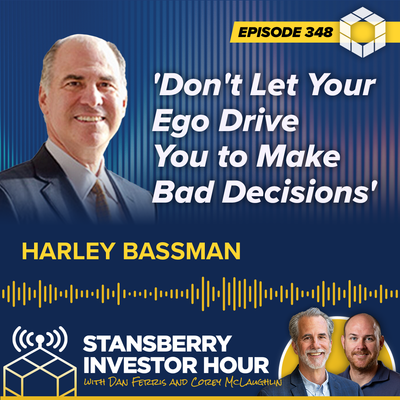
Don't Let Your Ego Drive You to Make Bad Decisions | Harley Bassman
<p><span class="yt-core-attributed-string--link-inherit-color">Dan and Corey kick things off by discussing bitcoin hitting a new multiyear high. They also critique a popular bullish argument for bitcoin, which is based off the U.S. dollar collapsing. After, they talk about the S&P 500 Index surpassing 5,000 for the first time ever and whether this level is sustainable in the long term. (</span><span class= "yt-core-attributed-string--link-inherit-color"><a class= "yt-core-attributed-string__link yt-core-attributed-string__link--display-type yt-core-attributed-string__link--call-to-action-color" tabindex="0" href= "https://www.youtube.com/watch?v=eYLMOFWWrSs&t=40s" target="" rel="nofollow">0:40</a></span><span class= "yt-core-attributed-string--link-inherit-color">)</span></p> <p><span class= "yt-core-attributed-string--link-inherit-color">Next, Harley Bassman of Simplify Asset Management joins the conversation and explains a concept called "convexity." He covers the three kinds of risk in bond investing, why short convexity is always lurking during market downturns, and why negative convexity is so difficult for investors to process. (</span><span class= "yt-core-attributed-string--link-inherit-color"><a class= "yt-core-attributed-string__link yt-core-attributed-string__link--display-type yt-core-attributed-string__link--call-to-action-color" tabindex="0" href= "https://www.youtube.com/watch?v=eYLMOFWWrSs&t=1493s" target="" rel="nofollow">24:53</a></span><span class= "yt-core-attributed-string--link-inherit-color">)</span></p> <p><span class= "yt-core-attributed-string--link-inherit-color">Harley also goes into detail on mortgage-backed securities funds. He describes what mortgage bonds are, why they yield more than corporate bonds, and how the Federal Reserve plays a huge role in all of this. (</span><span class= "yt-core-attributed-string--link-inherit-color"><a class= "yt-core-attributed-string__link yt-core-attributed-string__link--display-type yt-core-attributed-string__link--call-to-action-color" tabindex="0" href= "https://www.youtube.com/watch?v=eYLMOFWWrSs&t=1940s" target="" rel="nofollow">32:20</a></span><span class= "yt-core-attributed-string--link-inherit-color">)</span></p> <p><span class= "yt-core-attributed-string--link-inherit-color"> Lastly, Harley talks about Simplify and how it offers a unique service by jamming derivatives of all kinds (futures, options, etc.) into ETFs so civilians can invest in them. He also discusses what it was like working at Merrill Lynch during the great financial crisis, gives general investing advice, and explains what pin risk is. (</span><span class= "yt-core-attributed-string--link-inherit-color"><a class= "yt-core-attributed-string__link yt-core-attributed-string__link--display-type yt-core-attributed-string__link--call-to-action-color" tabindex="0" href= "https://www.youtube.com/watch?v=eYLMOFWWrSs&t=2935s" target="" rel="nofollow">48:55</a></span><span class= "yt-core-attributed-string--link-inherit-color">)</span></p>
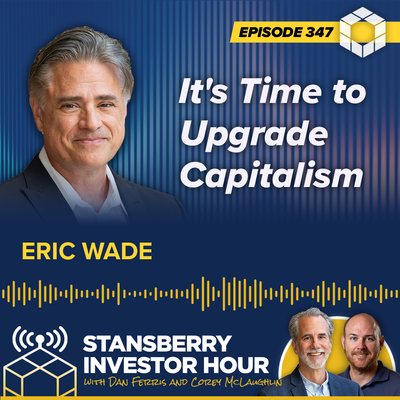
It's Time to Upgrade Capitalism
<div class="p-pdf_viewer_thumbnail"> <div data-page-number="1"> <p><span dir="ltr" role="presentation">Dan and Corey kick off the show by discussing debt spirals, death spirals, their effect on </span><br role="presentation" /> <span dir="ltr" role="presentation">things like GDP and economic growth, and the increasing reliance on debt spending. They</span><br role="presentation" /> <span dir="ltr" role="presentation">point out that the U.S. government's annual interest payment on debt will soon surpass the</span><br role="presentation" /> <span dir="ltr" role="presentation">budget for national defense. Dan also speculates that the government is using illegal</span><br role="presentation" /> <span dir="ltr" role="presentation">immigration as a means to depress wages. (0:41)</span><br role="presentation" /> <span dir="ltr" role="presentation">Next, crypto expert Eric Wade joins the conversation by discussing his current thoughts on</span><br role="presentation" /> <span dir="ltr" role="presentation">the crypto market as a whole. He notes that the U.S. just approved bitcoin spot ETFs, which</span><br role="presentation" /> <span dir="ltr" role="presentation">will allow investors to profit from bitcoin without actually holding the token. He also brings</span><br role="presentation" /> <span dir="ltr" role="presentation">up the bitcoin halving that's happening this April, AI's role in crypto, and how crypto is being</span><br role="presentation" /> <span dir="ltr" role="presentation">used to solve real-world problems. Eric briefly name-drops two such cryptos that have real-</span><br role="presentation" /> <span dir="ltr" role="presentation">world applications today. (22:08)</span><span dir="ltr" role="presentation">After, he goes into detail on his new book called</span> <span dir="ltr" role= "presentation">America vs. Americans: How Capitalism Has</span><br role="presentation" /> <span dir="ltr" role="presentation">Failed a Capitalist Nation and What We Can Do About It</span><span dir="ltr" role= "presentation">.</span> <span dir="ltr" role="presentation">This book focuses on American</span><br role="presentation" /> <span dir="ltr" role="presentation">"laborism," the shortcomings of our current capitalist system, and how all of this could be</span><br role="presentation" /> <span dir="ltr" role="presentation">improved. Eric describes that government, economics, and politics are a lot closer together</span><br role="presentation" /> <span dir="ltr" role="presentation">than they should be. He explores the history of capitalism and talks about the glaring flaws</span><br role="presentation" /> <span dir="ltr" role="presentation">of the economic system that preceded it – mercantilism. (35:30)</span><br role= "presentation" /> <span dir="ltr" role="presentation">Eric then transitions into talking about laborism and how it could be an upgrade from</span><br role="presentation" /> <span dir="ltr" role="presentation">capitalism. He spends the rest of the episode detailing how it could pull millions of folks out</span><br role="presentation" /> <span dir="ltr" role="presentation">of poverty, why it would be so closely tied to education, and the fact it would call for a hard</span><br role="presentation" /> <span dir="ltr" role="presentation">currency and a smaller government with less government intervention. As he explains, it</span><br role="presentation" /> <span dir="ltr" role="presentation">could solve many of the country's problems. (42:35)</span></p> </div> </div>
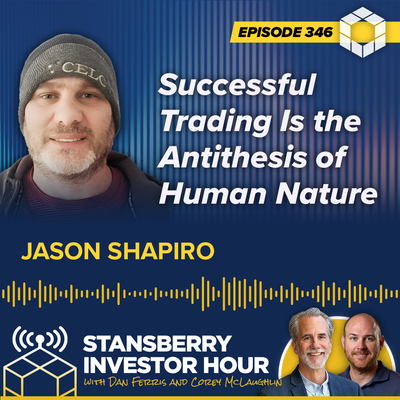
Successful Trading is the Antithesis of Human Nature
<p>Dan and Corey begin the show by discussing evidence that we're still in a bear market. They bring up equal-weight indexes fizzling out since December, the now "Magnificent Six" tech stocks still dominating, and the possibility of a decade long sideways market. </p> <p>After, contrarian trader Jason Shapiro of digital publishing company Crowded Market Report joins the conversation and gives an overview of his trading style, his financial journey, and how his strategy differs from many other traders'. While others are looking to ride the trend, Jason explains that he's looking to "fade" it and find when the trend will turn. When speaking specifically about putting the risk-reward ratio in his favor over time, he says the discounting mechanism in the market is not price – it's participation.</p> <p>This segues into a discussion about how Jason's process works. He gives advice to individual investors who are just starting out, including warning of the dangers of following trends and "copy trading." He also details how trading goes against human nature.</p> <p>Then, Jason discusses automation in his field of work – when he uses it and when he ignores its advice – and provides some examples of his strategy in action. He emphasizes that market confirmation should always come first</p> <p>Lastly, Jason explains why he's so adamant about sharing his approaches and techniques with everyday investors that they can't find in traditional financial media. And you won't want to miss Jason's answer to the final question... He shares what he believes is the real secret behind making money in the markets.</p>
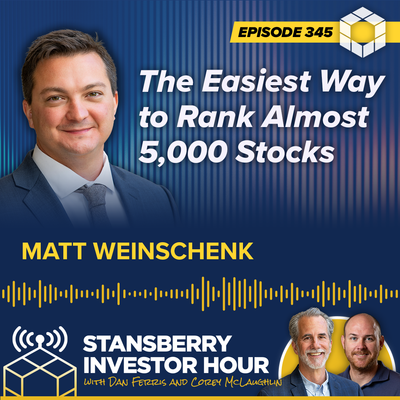
The Easiest Way to Rank Almost 5,000 Stocks
<p>Dan and Corey kick things off by discussing Argentine President Javier Milei's incendiary speech at the recent World Economic Forum in Davos, Switzerland. They start by quoting some passages from it and covering the main themes – from the negative consequences of government intervention to potentially abolishing the central bank. After, they talk about why this type of rhetoric from a politician would never fly in the U.S., even though it reflects a lot of people's feelings.</p> <p>Next, Stansberry Research Director of Research Matt Weinschenk joins the conversation and elaborates on what type of investor he considers himself to be. He brings up value investing, the importance of bottom-up business-quality analysis, and how he uses quantitative tools to find the best businesses.</p> <p>Matt then explains the "Stansberry Score," which ranks nearly 5,000 stocks from first to last. It assigns each stock both an overall number and letter grade, plus letter grades for financials, capital efficiency, and valuation. Investors can use it to check ratings on stocks they may be interested in, or they can use it to find hidden gems. If you're interested in learning more about this tool and trying it for free, you can check it out at StansberryAnnouncement.com.</p> <p>Matt also goes into detail on The Quant Portfolio. This new portfolio is fully optimized and uses Stansberry Score data to evaluate each stock. Entirely using computers and algorithms, it looks at the relationships between each stock and picks out the best ones that will work together to provide the highest returns. And so far, it's blowing the market out of the water! Matt emphasizes that in the past two years of live testing, The Quant Portfolio is up 20%, while the market is only up 5. </p> <p>Lastly, Matt talks all things econometrics – what it is, whether it's worth studying, and its interplay with machine learning.</p>
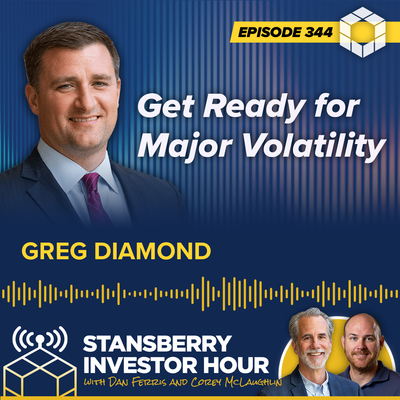
Get Ready for Volatility warns Greg Diamond
<p><span class= "yt-core-attributed-string yt-core-attributed-string--white-space-pre-wrap"> Dan and Corey kick off the show by discussing car-rental company Hertz selling one-third of its electric-vehicle ("EV") fleet and planning to reinvest in gas-powered cars. They talk about the reasons for this move, why EVs might not be a popular choice as rentals, signs that oil and gas companies are still thriving, and how the green-energy transition could lead to higher inflation. </span></p> <p><span class= "yt-core-attributed-string yt-core-attributed-string--white-space-pre-wrap"> Next, welcome Stansberry Research analyst Greg Diamond joins the conversation and analyzes the current volatility in the markets. He explains that investors and the financial media believe the Federal Reserve has beaten inflation and is going to start cutting rates soon. But as Greg notes, the opposite is most likely to happen. He also goes into detail on his study of cycles. </span></p> <p><span class= "yt-core-attributed-string yt-core-attributed-string--white-space-pre-wrap"> Then, Greg predicts important inflection points for 2024, describes how legendary trader W.D. Gann influenced his trading strategy, and explores the potential ramifications of the Fed ending its bank lending program in March. He also details why he'll be trading sectors for the first half of the year rather than individual stocks. </span></p> <p><span class= "yt-core-attributed-string yt-core-attributed-string--white-space-pre-wrap"> Lastly, Greg talks about correlations between the S&P 500 and specific exchange-traded funds. He assesses what it means for the markets when divergences happen and how extreme volatility leads to great buying opportunities. As Greg sums things up, "I think it's going to be a rough ride for bulls and bears."</span></p> <div id="snippet" class="style-scope ytd-text-inline-expander"> </div> <div class="style-scope ytd-watch-metadata"> <div id="items" class= "style-scope ytd-structured-description-content-renderer"> <div id="header-container" class= "style-scope ytd-horizontal-card-list-renderer"> <div class="title-row style-scope ytd-rich-list-header-renderer"> <div id="avatar" class="style-scope ytd-rich-list-header-renderer"> </div> <div id="title-text" class= "style-scope ytd-rich-list-header-renderer"></div> </div> <h2 id="header" class= "style-scope ytd-horizontal-card-list-renderer"></h2> </div> </div> </div>
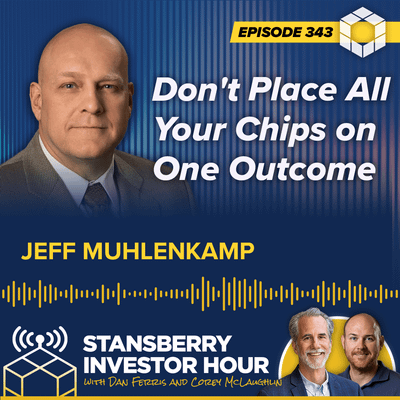
Don't Place all Your Chips on One Outcome
<p><span dir="ltr" role="presentation">Dan and Corey begin the show by discussing Disney. They cover the company's ongoing</span><br role="presentation" /> <span dir="ltr" role="presentation">proxy battle with Nelson Peltz, its recent deal with activist investor ValueAct Capital, the</span><br role="presentation" /> <span dir="ltr" role="presentation">negative impacts of its "wokeism," the new Star Wars director's controversial past</span><br role="presentation" /> <span dir="ltr" role="presentation">comments, and whether the stock is worth buying today. (0:40)</span></p> <p><span dir="ltr" role="presentation">Next, Jeff Muhlenkamp joins the conversation and gives his reaction to a "surprising" 2023. </span><br role="presentation" /> <span dir="ltr" role="presentation">Plus, he talks about what's in store for the markets this year, why it's unclear whether we're</span><br role="presentation" /> <span dir="ltr" role="presentation">headed for a recession or not since, and how you should structure your portfolio to protect</span><br role="presentation" /> <span dir="ltr" role="presentation">you no matter what happens. (26:23)</span></p> <p><br role="presentation" /> <span dir="ltr" role="presentation">Then, Jeff explains what he learned from the great financial crisis in 2008 and how he applies</span><br role="presentation" /> <span dir="ltr" role="presentation">it to his investing strategy today. He gives investors advice on everything from keeping</span><br role="presentation" /> <span dir="ltr" role="presentation">some cash on hand to handling stocks that soar quickly. (35:40)</span></p> <p><br role="presentation" /> <span dir="ltr" role="presentation">Lastly, Jeff discusses regional banking (44:00), two notable stock buys (46:47), and his</span><br role="presentation" /> <span dir="ltr" role="presentation">process for picking stocks (51:31). He details which metrics he looks at, why financial</span><br role="presentation" /> <span dir="ltr" role="presentation">newsletters are good places to look for ideas, and how to know when to exit a stock.</span></p>
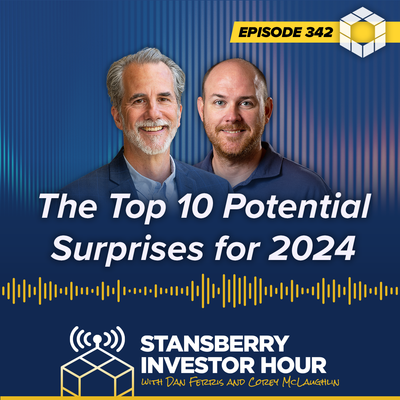
The Top 10 Potential Surprises for 2024
<p><span dir="ltr" role="presentation">Dan Ferris and Corey McLaughlin kick the episode off by reviewing their list of Top 10</span><br role="presentation" /> <span dir="ltr" role="presentation">Potential Surprises from 2023 and seeing if any of the surprises materialized. Included in this</span><br role="presentation" /> <span dir="ltr" role="presentation">list was what could happen to the S&P 500 Index, meme stocks GameStop and AMC</span><br role= "presentation" /> <span dir="ltr" role="presentation">Entertainment, inflation, bitcoin, mortgage rates, and gold. (0:32)</span></p> <p><span dir="ltr" role="presentation">After, Dan and Corey share their new list of potential surprises for 2024... </span><br role="presentation" /> <span dir="ltr" role="presentation">Magnificent Seven perform poorly (9:38)</span><br role="presentation" /> <span dir="ltr" role="presentation">S&P 500 negative annual return (13:16)</span><br role="presentation" /> <span dir="ltr" role="presentation">Rate cuts (15:58)</span><br role="presentation" /> <span dir="ltr" role="presentation">Gold hits $3,000 (19:15)</span><br role="presentation" /> <span dir="ltr" role="presentation">Bitcoin falls 50%-plus (24:04)</span><br role="presentation" /> <span dir="ltr" role="presentation">PCE at 4% (28:08)</span><br role="presentation" /> <span dir="ltr" role="presentation">Donald Trump presidency (31:51)</span><br role="presentation" /> <span dir="ltr" role="presentation">Nasty recession (37:27)</span><br role="presentation" /> <span dir="ltr" role="presentation">10-year yields above 4% (42:15)</span><br role="presentation" /> <span dir="ltr" role="presentation">S&P 500 drops 20% in a single day (44:52</span></p>
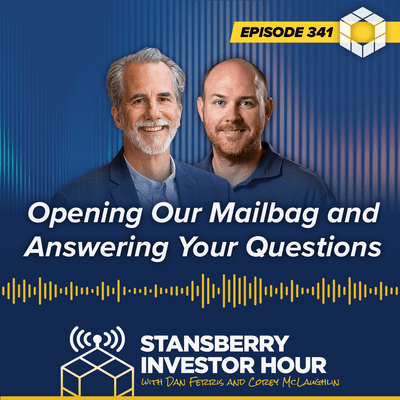
Stansberry Investor Hour's 2023 Year in Review - Mailbag Edition
<p>On this week's special mailbag episode of Stansberry Investor Hour, Dan Ferris and Corey McLaughlin are answering some of the most interesting questions they've received in recent weeks from subscribers. They tackle everything that has been on your mind – and a few things that you probably haven't even considered. Dan and Corey kick things off with questions about whether the green-energy movement and threats to eliminate fossil fuels will boost the price of oil... the broken housing market in the U.S. and what it means for homebuilders... nuclear energy's potential as a big source of power in America... and where uranium prices are headed next based on the supply-and-demand picture. </p> <p>Next, Dan and Corey address a listener who hates that they let the cat out of the bag on the upside in farmland... and respond to another listener who wants them to talk more about specific stocks and less about the Federal Reserve. Plus, Dan and Corey answer questions about political correctness, the love of money being the root of all evil, how to profit from war, and why they prefer U.S. Treasurys to money-market funds. </p> <p>Finally, Dan and Corey discuss the threat the high national debt level poses for the U.S., the development of BRICS (Brazil, Russia, India, China, and South Africa) as a geopolitical and economic power, and whether the U.S. losing its world reserve currency status would really be such a bad thing.</p>
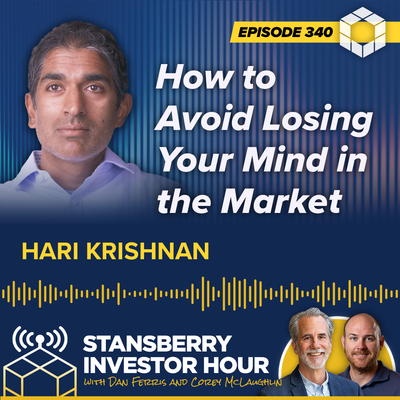
How to Avoid Losing Your Mind in the Market with Hari P. Krishnan
<p>Dan and Corey kick off the podcast by discussing 2023 as a whole. They talk about the Dow Jones Industrial Average hitting a new all-time high recently and investors looking forward to the Federal Reserve cutting rates. Plus, they go over what they're bullish on for 2024 – including homebuilders, bitcoin, and energy, among others.</p> <p>Next, author and hedge-fund manager Hari Krishnan joins the podcast to discuss his toolbox of strategies for profiting after a market sell-off. He notes that there are times that are great for buying credit, while other times aren't so good. And the same principle applies to other areas of the market as well, like with volatility.</p> <p>The conversation then shifts to how the average investor could utilize Hari's strategies. He gives a few examples of what to do in different scenarios. And he especially emphasizes the importance of having a plan. </p> <p>Further, Hari details how he assesses and categorizes risk. He describes why he looks at consistency across different asset classes and how this helps him find winning investments. Plus, Hari talks about the cycles of volatility, using equities as an example. He explains that risk taking drives the market upward, which leads to even more risk taking. It then becomes a vicious cycle that feeds on itself until it breaks.</p> <p>Finally, Dan asks Hari for his opinions on the S&P 500 Index's recent rally. Hari brings up the fact that there are currently high levels of complacency in the markets, and he argues that now is a great time for investors to think about hedges for their portfolios. He finishes by urging investors to look beyond the U.S. stock market and to broaden their opportunities with other asset classes. </p>
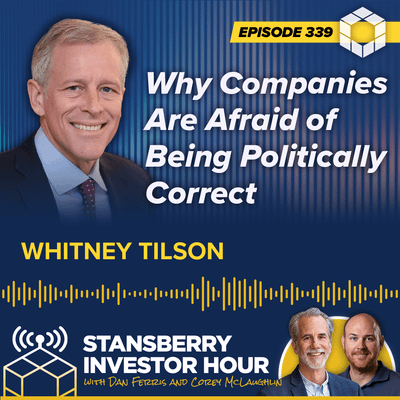
Why Companies Are Afraid of Being Politically Correct with Whitney Tilson
<p><span class="yt-core-attributed-string--link-inherit-color">Dan and Corey kick the show off by discussing the newest unemployment number and its implications for inflation, rate cuts by the Federal Reserve, the stock market, and the future of the economy. They speculate that this unemployment rate could result in the Fed putting off rate cuts for even longer.</span></p> <p><span class= "yt-core-attributed-string--link-inherit-color">Next, Whitney joins the conversation by discussing the "Magnificent Seven" tech stocks and explains why he thinks smaller-cap, more value-oriented stocks will be driving the markets next. He also compares Tesla CEO Elon Musk's "rampant narcissism," "bro culture" at the company, and antisemitic tweets with exemplars like Warren Buffett and Charlie Munger.</span></p> <p><span class="yt-core-attributed-string--link-inherit-color">This leads to a discussion about how cultural differences affect businesses. Whitney brings up Anheuser-Busch's Bud Light ad campaign with a transgender influencer and Disney fighting Ron DeSantis' controversial bill in Florida. He shares why he thinks companies are "running pretty darn scared these days" after seeing both those iconic businesses suffer for taking political stances.</span></p> <p><span class= "yt-core-attributed-string--link-inherit-color">Then, Whitney talks about his Top 10 list. He details why Berkshire Hathaway continues to be such an attractive opportunity today and why it's the perfect foundation for any portfolio. And he also emphasizes that we are no longer in a TINA world, or "there is no alternative."</span></p> <p><span class= "yt-core-attributed-string--link-inherit-color">Finally, Whitney gives his opinion on what he thinks the Fed will do next in terms of interest rates and what the potential outcomes could be. You also won't want to miss his answer to Dan's final question, where he explains why it's crucial to limit the amount of "partisan and polarized" information you're consuming in traditional media, since it could be affecting your investing choices. </span></p>
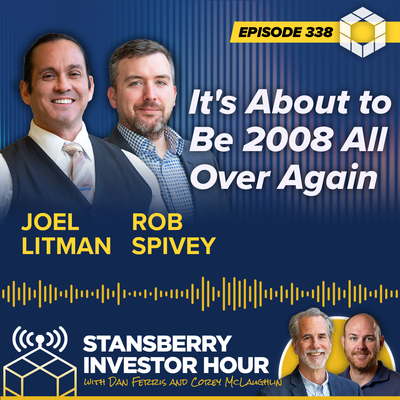
It's About to Be 2008 All Over Again
<p>Dan and Corey start by remembering Charlie Munger, reviewing his career and legacy. Plus, they cover Elon Musk's recent remarks against Disney, the chances of X (formerly known as Twitter) going bankrupt, and Musk's efforts to bring free speech to the platform. (0:40)</p> <p>Next, Joel and Rob join the show to discuss the narrative around a soft landing, the rolling- recession "nonsense," and investors getting lulled into a false sense of confidence and believing everything is fine in the markets. Joel details the macroeconomic signals that are flashing globally – from China's failings dragging the world down to hyperinflation and recession in multiple Latin American countries. Joel explains why he and Rob have recently made a major change in their forward market outlook. (26:18)</p> <p>Rob adds that another reason for their bearishness is the current credit environment. Credit is the lifeblood of the American economy. But now, it's disappearing. And according to Rob, that will further hurt economic growth. Plus, Joel explains that this same setup happened at the beginning of the great financial crisis. (34:21)</p> <p>The conversation then shifts to Fed Chair Jerome Powell's devotion to lowering inflation to 2%, the reality of "structurally higher" inflation, and how high interest rates are leading to massive investing opportunities in near-term cash-flow companies. (38:37)</p> <p>Finally, Joel and Rob discuss the bond market and why they find it so attractive today... give their opinions on "terrifying" business development companies... and analyze the Fed's next moves in regard to unemployment. (46:18)</p>
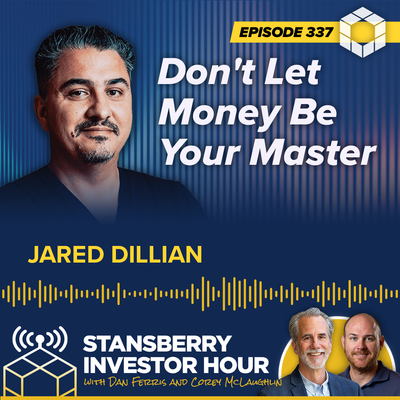
Don't Let Money Be Your Master Warns Jared Dillian
<p>Dan and Corey kick off the show by giving a sneak peek at their list of 10 things that would surprise investors in 2024 and where they predict the markets are headed. Specifically, they discuss the unassailable Magnificent Seven – which are "priced for more than perfection" – and why the high valuations aren't sustainable. While the other "Unmagnificent 493" stocks in the S&P 500 Index are essentially flat and it's "still a bear market for everything else," the Magnificent Seven have screamed higher. Dan warns that they're not safe.</p> <p>Afterward, Jared joins the conversation and gives some tips on how to make finance less stressful. He shares that it's important to not cut out small luxuries that bring you happiness, like a Starbucks coffee every now and then. Rather, he says to focus on cutting costs for the bigger items. He also explains that being too conservative with your money can be detrimental. </p> <p>The conversation shifts to discussing the two main sources of financial stress: debt and risk. Jared explains that these sources of stress aren't correlated with how much money you have and instead are entirely based on how you structure your finances. </p> <p>Jared then talks about the market as a whole and shares some predictions. He covers why he has been focused on the bond market for the past six months, why he expects a recession next year, what he thinks will happen to Treasurys and interest rates, and the psychology behind inflation. </p> <p> Lastly, Jared details why he owns essentially no U.S. stocks and instead has his money in Argentine stocks. Plus, he describes another emerging market that presents a "huge opportunity" for investors. As he says, "There's other places in the world to go where there's a lot more growth that are a lot more promising." Don't miss his thoughts on the best way to get exposure to that potential growth story. </p>
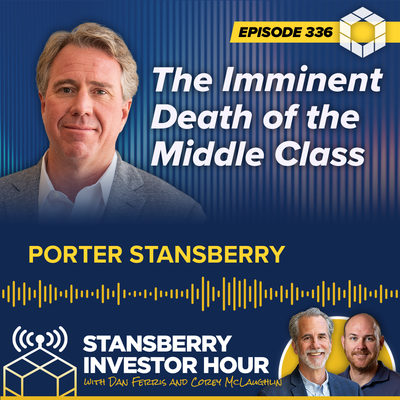
The Imminent Death of the Middle Class with Porter Stansberry
<p>On this week's Stansberry Investor Hour, Dan and Corey welcome Porter Stansberry back to the show. Porter founded Stansberry Research in 1999, and he recently returned as CEO and chairman of parent company MarketWise (MKTW). With more than 25 years of experience as a financial analyst and publisher to draw on, Porter shares his opinions on the current state of the markets and which areas of the economy look most attractive today.But first, Dan and Corey talk about investors' unfounded hopes for falling interest rates and some Wall Street analysts predicting that the Federal Reserve will soon cut rates by 150 basis points. "I just don't see that happening," Corey says. Afterward, the conversation shifts to the bond market, the drop in demand for U.S. Treasurys, China "imploding minute by minute," and the biggest "turkeys" who have made the most absurd financial decisions this year. Plus, Dan explores investor psychology and how it has been warped by a decade-plus of low rates and the longest bull market in history. (0:00)</p> <p>Porter then joins the show and discusses why Ayn Rand's 1957 book Atlas Shrugged continues to be relevant today, General Motors' chances of going bankrupt again, and his "new, old" job as CEO of MarketWise. He explains his strategy for the company going forward. (25:08)</p> <p>Moving on to the broader economy, Porter shares an updated prediction of what he sees<br /> coming for the market. In mid-September, he was concerned we were on the cusp of another major financial crisis. But now he thinks the immediate danger may be past. (42:34) </p> <p>Porter also shares that most quality businesses out there trade for high valuations, but those<br /> with unrecognized quality still present fantastic buying opportunities today. Even companies<br /> that have recently made negative headlines can still have incredible underlying value.(48:48)</p> <p>Finally, Porter details what's happening in the bond market right now and why he believes it's worth investing in. And you won't want to miss his parting message, where he explains why it's a great <span class="c-mrkdwn__highlight">time</span> to be alive despite any global issues or societal problems. "Most investors make the mistake of not being optimistic enough," he says. (57:35)</p>
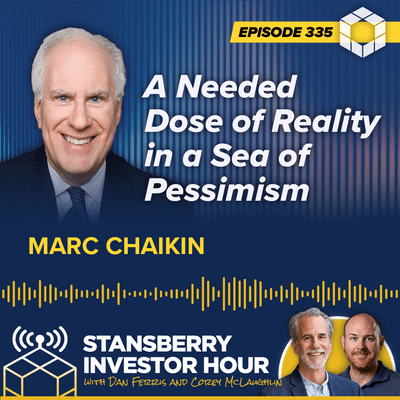
A Needed Dose of Reality in a Sea of Pessimism with Marc Chaikin
<p>On this week's Stansberry Investor Hour, Dan and Corey are joined by Marc Chaikin. After 50 years working on Wall Street, Marc founded our corporate affiliate – Chaikin Analytics – to guide everyday investors. Marc starts by describing how his Power Gauge helps investors identify stocks, excel in timing investments, and most importantly, prevent portfolio losses. "No matter how good your fundamental research is or quant model [is], if the market doesn't agree with you, guess who wins? The market always wins; you're investing in what I call "dead money," he states.</p> <p>Then, Marc explores 2023 being a difficult year for bearish investors, the likelihood of a recession, and how artificial intelligence ("AI") has led to unprecedented productivity enhancements. "That's where this whole convergence of technology, data, and machine learning<br /> comes in. I think it's going to unleash unbelievable advances in medicine, data analytics for retail, and self-driving cars eventually," he asserts.</p> <p>Finally, Marc shares his thoughts on today's market, including the "Magnificent Seven" stocks, the U.S. national debt, the real estate sector, and 10-year Treasury yields. He explains that he and many other leading investors are bullish on stocks, but the media prefers doom-and-gloom headlines for clicks. "They just don't want to put optimists on TV because it's not controversial," he concludes.</p>
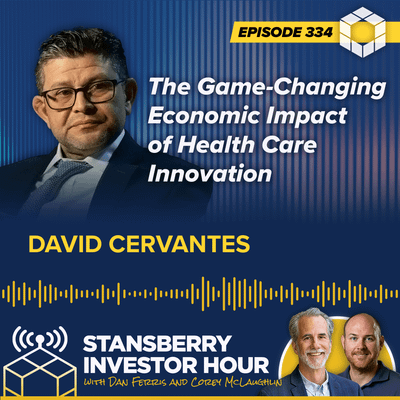
The Weight Loss Revolution is Underway
<p><span data-preserver-spaces="true">On this week's </span><em><span data-preserver-spaces= "true">Stansberry Investor Hour</span></em><span data-preserver-spaces="true">, Dan and Corey are joined by David Cervantes, principal and founder of Pinebrook Capital Management. David shares his groundbreaking thesis that could transform not only health care but also the broader economy. But first, Dan and Corey discuss disgraced FTX founder Sam Bankman-Fried being found guilty of fraud, coworking-space company WeWork's impending bankruptcy, and fluctuating Treasury yields. (00:48)</span></p> <p><span data-preserver-spaces="true">Next, David joins the conversation to detail the far-reaching consequences of obesity, plus the potential impact of new weight-loss drugs on the economy. He notes that obesity not only places a significant financial burden on the health care system but also hampers overall productivity and gross domestic product ("GDP") growth rates. However, David clarifies that GLP-1 (or glucagon-like peptide 1) drugs have the potential to revolutionize obesity treatment. (26:28)</span></p> <p><span data-preserver-spaces="true">David then explores the potential winners and losers of this medical innovation. He stresses that it's not too late to make money off the drug manufacturers since there are plenty of companies developing and trying to improve these weight-loss drugs right now. He also touches on other sectors that will benefit from mass weight loss. (41:45)</span></p> <p>➡️ <a href="https://youtu.be/uweWRQhsfl0">Watch Here</a></p>
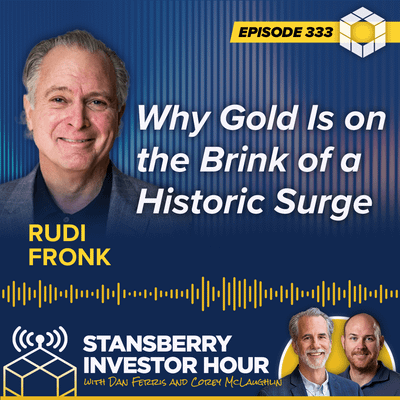
Why Gold Is on the Brink of a Historic Surge
<p>On this week's Stansberry Investor Hour, Dan and Corey are joined by Rudi Fronk, chairman, CEO, and co-founder of Seabridge Gold (SA). But first, Dan and Corey kick off the podcast by discussing the latest numbers for gross domestic product ("GDP") and the core personal consumption expenditures price index. Then, they also explore what they think the Federal Reserve will do next and what will happen to the stock market. (00:41)</p> <p>Next, Rudi joins the show to chat about Seabridge Gold, the outlook for the gold market, and risk within the industry. Rudi emphasizes that Seabridge is not a mining company, and it instead partners with major mining companies to co-develop assets while retaining around 40% to 49% interest in projects. (16:21)</p> <p>He believes the current challenges in the Treasury market as well as hedge funds using leverage to accumulate positions will ultimately drive gold prices to new heights. Rudi boldly predicts that gold will surpass its previous all-time high of approximately $2,063 an ounce by the end of this year. Moreover, he details why he foresees gold's price surging to multiples of its current value over the next few years. (24:26)</p> <p>Rudi concludes by explaining why it's so difficult for mining companies to turn a profit and why so many of them never get any dollars out of the ground. "I don't have a high respect for most of my industry," he says simply. If you're interested in investing in the gold industry or just want to know more about it, don't miss this week's show. (36:32)</p> <p>➡️ <a href="https://youtu.be/52WV4KvQNP4">Watch Here</a></p>

It's the End of Globalization as We Know It with Peter Zeihan
<p>In this week's Stansberry Investor Hour, Dan and Corey welcome geopolitical strategist and critically acclaimed author Peter Zeihan back to the show. But first, reporting live from the conference, Dan and Corey share their insights from this valuable event for subscribers. They offer a recap of the presentations delivered by notable figures, including Stansberry Research founder Porter Stansberry, legendary cyclist Lance Armstrong, and respected financial writer Morgan Housel. (:41)</p> <p>Then Peter joins the show to dissect the ongoing Ukraine situation and other geopolitical conflicts dominating the headlines. Peter discusses Israel's strategic shift from being a technology consumer to a producer, saying "Israelis, almost to a Chinese scale, were stealing tech... and so they decided to go in the business of making tech." Dan and Peter also explore investment prospects in Israel, what a peace treaty between Saudi Arabia and Israel would mean, how Iran could disrupt the peace process, and incompetence in the Israeli government. (16:50)</p> <p>Finally, Dan and Peter shift their focus to China. The nation is undergoing dramatic shifts in demographics and experiencing a severe population decline, which has profound implications for the nation's future. Peter predicts that China will cease to exist as a unified industrialized nation within the next decade. (36:18)</p> <p>➡️ <a href="https://youtu.be/kcsRHodkg44">Watch Here</a></p>
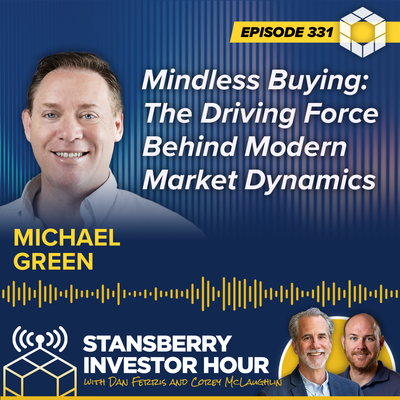
Mindless Buying: The Driving Force Behind Modern Market Dynamics with Michael Green
<p>On this week's Stansberry Investor Hour, Dan and Corey are joined by Michael "Mike" Green. Mike is the chief strategist and portfolio manager of Simplify Asset Management – an investment advisory firm. He has spent nearly 30 years studying markets and market structures, and he brings his decades of insight to today's show.</p> <p>But first, Dan and Corey discuss the evolving landscape of the bond market, the opportunity in Treasury bills, and the potential impact of high bond yields on the broader investment world. Corey warns...</p> <p>Take advantage of it now, because if the economy goes in the crapper in the future, the [bond] rates are going to go down when the Fed cuts [interest] rates.</p> <p>Mike then joins the conversation to delve into the world of passive investing, which involves never transacting and only ever holding assets. This leads to a strategy of mindless buying:</p> <p>[The stock market is] marching upwards, being led by a very few number of extremely large-cap stocks that have relatively limited growth prospects... In real terms, PepsiCo's sales are down over the last decade. This is true for companies like Apple where their sales growth, since the introduction of the iPhone 5, [is] stagnant... certainly not justifying the types of valuations that we see.</p> <p>Finally, Mike details how the Federal Reserve can influence the markets with interest rates, and in turn how interest rates can affect passive investing. Moreover, he highlights the unique opportunity in the bond market and explains why bonds are an attractive option for investors.</p> <p>➡️ <a href="https://youtu.be/5vatofUq_w0">Watch Here</a></p>
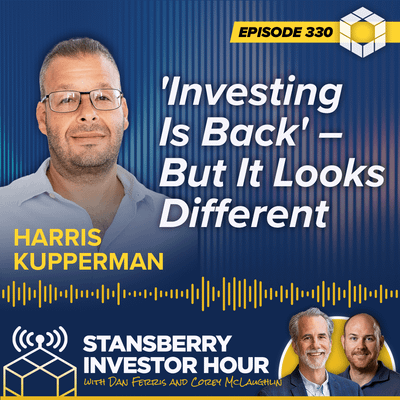
'Investing Is Back' – But It Looks Different
<p><span data-preserver-spaces="true">In this week's episode of </span><em><span data-preserver-spaces="true">Stansberry Investor Hour</span></em><span data-preserver-spaces="true">, Dan and Corey welcome Harris "Kuppy" Kupperman back to the show. But first, Dan and Corey discuss the surprising employment numbers that exceeded expectations and fueled speculation about further interest-rate hikes. They also cover the turbulence in the bond market and the significance of the yield curve finally correcting after more than 18 months of inversion. (00:41)</span></p> <p><span data-preserver-spaces="true">Next, Kuppy joins the show to express his skepticism about the widespread belief that the world can revert to "normalcy," that interest rates will decline, and that another bull market will kick off. Instead, he explains why he thinks there will be significant changes in the next couple of years while "everyone's playing the old playbook." (20:22)</span></p> <p><span data-preserver-spaces="true">Kuppy also gives his take on the overall economy, addressing sectors with inflationary correlations. He describes his outlook on inflation as a series of sine waves, with periodic fluctuations of heating up or cooling down. However, he focuses on the overarching trend of upward inflation and predicts that it will surpass previous highs in the coming years. (31:24)</span></p> <p>➡️ <a href="https://youtu.be/oGAzgRU7iBA">Watch Here</a></p>
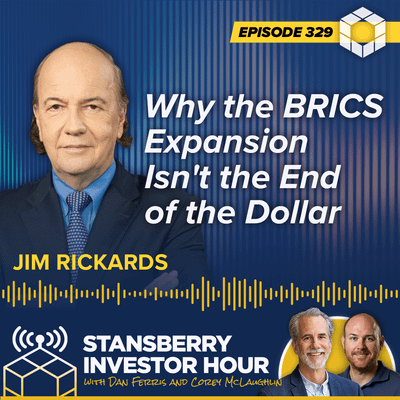
Why the BRICS Expansion Isn't the End of the Dollar
<p>On this week's Stansberry Investor Hour, Dan and Corey are joined by renowned economist Jim Rickards, who details his illustrious career, the development of the BRICS currency, and its potential ramifications for the global monetary system. But first, Dan and Corey kick off the podcast by discussing store closures, Amazon's monopoly allegations, and commercial real estate's decline. (00:41)</p> <p>Next, Jim joins the conversation to share some of what he has learned during his storied career, specifically from being the general counsel on a hedge fund's $3.6 billion rescue deal. He also explains why he grew dissatisfied with risk management and how he became one of the first in finance to use "complexity theory." (20:06)</p> <p>Dan then steers the conversation to the BRICS initiative – i.e., the five countries' goal to create an alternative currency that will challenge the dominance of the U.S. dollar. Jim explains the origins of BRICS, highlighting how they have created financial institutions similar to the World Bank and the International Monetary Fund. (33:31)</p> <p>Jim stresses the significance of the BRICS currency, as it would facilitate trade among member nations without the need to rely on the U.S. dollar. However, Jim emphasizes that a BRICS currency should not be interpreted as the end of the U.S. dollar's reign. Rather, it would be a formidable competitor in the global currency arena. (41:41)</p> <p>➡️ <a href="https://youtu.be/VmJDs9K_-xk">Watch Here</a></p>
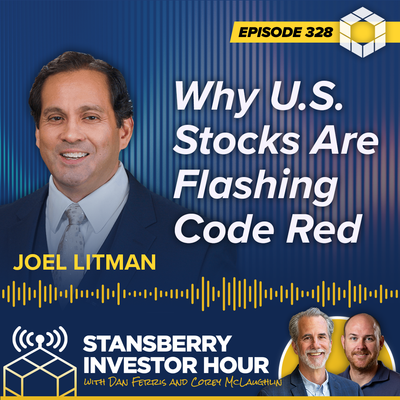
Why U.S. Stocks Are Flashing Code Red
<p>On this week's Stansberry Investor Hour, Dan and Corey are joined by Joel Litman, the founder of our corporate affiliate Altimetry. But first, Dan and Corey kick off the podcast by discussing the latest Federal Reserve meeting, a recent study about what happens to stock price when artificial intelligence ("AI") gives answers at earnings calls instead of humans, and the emergence of a robot CEO for a rum company. (00:00)</p> <p>Next, Joel joins the conversation and gives the reasons for his growing bearish sentiment. He points out some significant red flags that have caught his and his fellow analysts' attention, including the historical pattern of a credit crisis preceding every major bear market. Joel explains that the current sentiment and valuation trends are heading in the wrong direction. (16:42)</p> <p>Joel then moves on to the impact of high interest rates on the market. He explains that he and the folks at Altimetry employ "Uniform Accounting" principles, meaning they do not use the same price-to-earnings multiples as Bloomberg or CNBC. Instead, they perform their own calculations. Joel argues that, to control inflation, interest rates need to be maintained at a level higher than what Fed Chair Jerome Powell seems to favor. (20:56)</p> <p>Finally, Joel discusses U.S. stocks being overallocated in investors' portfolios today and why this serves as a concerning indicator of market conditions. Plus, looking globally, he details why he finds Chinese and Russian stocks unattractive for investment. (37:36)</p> <p> ➡️ <a href="https://youtu.be/FeC1drS9GJc">Watch Here</a></p>
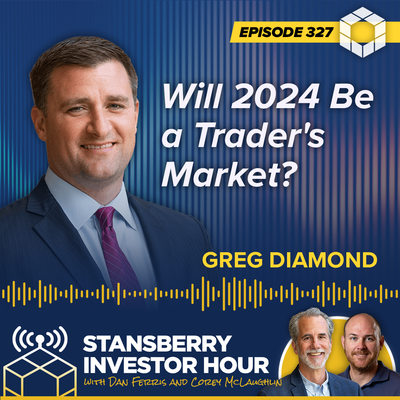
Bullish Momentum vs. Bearish Concerns: Will 2024 Be a Trader's Market?
<p>On this week's Stansberry Investor Hour, Dan and Corey are joined by Stansberry colleague Greg Diamond the editor of Ten Stock Trader, a trading service based on technical analysis. Dan and Corey cover the European Central Bank raising its rates to a multidecade high, inflation "killing people on Main Street" who are racking up credit-card debt, and poverty levels rising. (00:41)</p> <p>Next, Greg joins the conversation by talking about his overall perspective on the market. He explains why he thinks "2024 is going to be a trader's market" despite believing that huge uptrends will come to an end. And he says banks will play a crucial role in determining overall market health (18:03)</p> <p>Regardless of these concerns, Greg maintains a bullish sentiment as long as the existing upward trend remains intact. "It's not time to sell yet," he emphasizes. He then proceeds to share his insights on the Fed, highlighting its inherently political nature and its susceptibility to political influence. (30:53)</p> <p>Finally, Greg discusses his primary objective when determining whether a market is poised to rise or fall. To leverage his positions, he frequently embraces higher risk levels but carefully optimizes his trading advantage in other ways. (40:14)</p> <p><span style= "font-family: -apple-system, BlinkMacSystemFont, 'Segoe UI', Roboto, Oxygen, Ubuntu, Cantarell, 'Open Sans', 'Helvetica Neue', sans-serif;"> ➡️ </span><a style= "font-family: -apple-system, BlinkMacSystemFont, 'Segoe UI', Roboto, Oxygen, Ubuntu, Cantarell, 'Open Sans', 'Helvetica Neue', sans-serif;" href="https://youtu.be/IbMBxG-HKow">Watch Here</a></p>
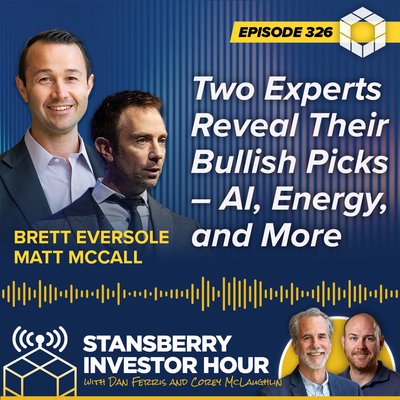
Two Experts Reveal Their Bullish Picks - AI, Energy, and More
<p><span data-preserver-spaces="true">On this week's </span><em><span data-preserver-spaces= "true">Stansberry Investor Hour</span></em><span data-preserver-spaces="true">, Dan and Corey are joined by two of their Stansberry Research colleagues, Matt McCall and Brett Eversole. But first, Dan and Corey kick off the podcast by discussing three famous investors who all made headlines recently for giving negative future market outlooks. </span></p> <p><span data-preserver-spaces="true">Brett and Matt join the conversation by talking about why they're bullish right now. Matt notes that the reason 2022 was so brutal for investors was because of the Federal Reserve rapidly raising interest rates. While one more small rate hike before the year's end is possible, Matt still thinks the rate cycle is nearly over. This would, in turn, be good for equities and move the markets higher.</span></p> <p><span data-preserver-spaces="true">Then, Brett shares some of his AI-industry favorites... and notes that the market as a whole has the potential to massively increase productivity, leading to increased margins. Specifically, Brett believes there's a structural change happening in the companies that make up the stock market.</span></p> <p><span data-preserver-spaces="true">Finally, Brett and Matt talk briefly about housing supply and homebuilders before launching into the energy sector. Brett emphasizes that while there's a push for green energy, we're going to need fossil fuels for a very long time. Plus, Matt highlights the problem of many renewable-energy projects being completely built but unable to get onto the energy grid because the grid is so old.</span></p> <p><span data-preserver-spaces="true">➡️ <a href= "https://youtu.be/UOe_qkcCswU">Watch Here</a></span></p>
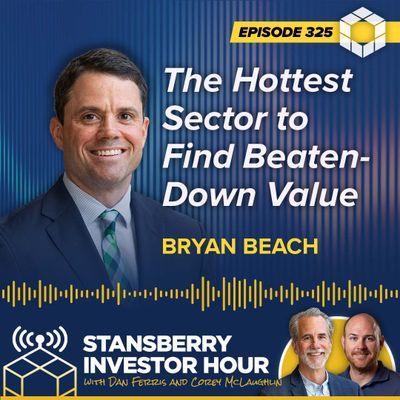
The Hottest Sector to Find Beaten-Down Value
<p>This week in Stansberry Investor Hour, Dan and Corey are joined by their Stansberry Research colleague, Bryan Beach. Bryan is the editor of Stansberry Venture Value, which is Stansberry's small-cap value newsletter. Dan and Corey kick off the podcast by dissecting the latest in the market, starting with the recent Republican political debate and Federal Reserve Chair Jerome Powell's presence in Jackson Hole, Wyoming. (00:00)</p> <p>Bryan then joins the conversation to break down his value-investment approach. This approach extends across industries and is guided by the pursuit of "value nuggets." One of Bryan's central investing tenets involves identifying companies that have experienced significant declines in value. And right now, the Software as a Service ("SaaS") space is a prime example of such undervaluation. (20:53)</p> <p>The conversation then shifts to Bryan's previous role as an accountant. He recalls Wall Street's historical inclination toward upfront software-purchase models, which encompassed future maintenance packages and fees. But Salesforce changed all that in the early 2010s by reshaping the software landscape. The transition toward the SaaS model gained remarkable traction between 2015 and 2021. (27:50)</p> <p>More recently, SaaS companies have experienced a downturn in popularity. But Bryan sees this as an opportunity. Bryan and Dan go into how if Warren Buffett were a young investor today, he would likely be captivated by the software sector. The two draw connections between Buffett's historical interest in newspapers and the appeal of software business today. Bryan highlights their affordability and upward momentum, making them prime investment candidates. (46:00)</p> <p>➡️ <a href="https://youtu.be/cZKKOr7x3-k">Watch Here</a></p>
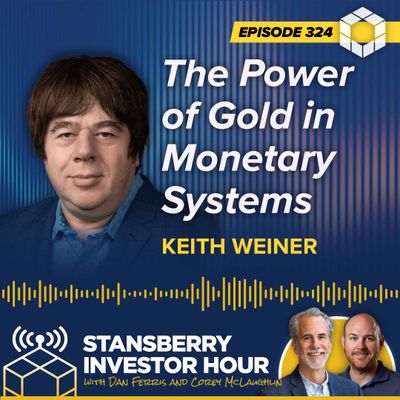
Honest Money: The Power of Gold in Monetary Systems
<p>On this week's Stansberry Investor Hour, Dan and Corey are joined by Keith Weiner. He's the founder and CEO of Monetary Metals, a gold investment firm. But first, Dan and Corey kick off the podcast by discussing the potential implications of stress in the bond market, and how bond yields have been showing signs of movement. Plus, they highlight that the yield curve could be signaling a recession sign. (00:00)</p> <p>Next, Keith joins the conversation by sharing his beliefs on gold and the world's monetary system. He starts with his "origin story," describing how he founded and then sold a successful software company. Then Keith and Dan shift gears to dive into the current state of the economy. With three of the largest bank failures in history this year and the U.S.'s credit being downgraded recently, they discuss how this may be affecting people's attitudes toward gold. (18:34)</p> <p>Finally, Keith goes on to share his insights on the debate of gold versus bitcoin. He emphasizes that gold's stability and millennia-long history of wealth preservation give it an edge over any cryptocurrency. While bitcoin has seen speculation and massive price fluctuations, gold's enduring stability makes it an attractive choice for conservative savers, even in times of economic uncertainty. (40:53)</p> <p>➡️<a href="https://youtu.be/5FEceH2f-jw">Watch Here</a></p>
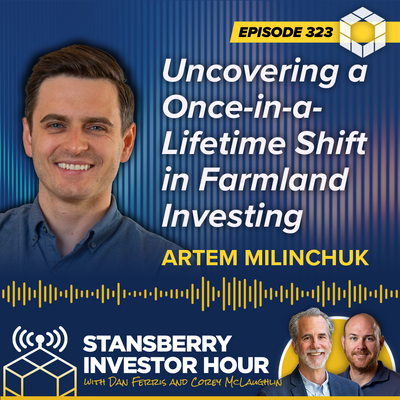
Uncovering a Once-in-a-Lifetime Shift in Farmland Investing
<p>On this week's Stansberry Investor Hour, Dan and Corey welcome Artem Milinchuk to the show. He's the founder and Head of Strategy for FarmTogether. First, Dan and Corey kick off the podcast by discussing the last CPI and PPI reports. While the CPI reading came in at 3.2% inflation, certain components within the CPI are much higher. Inflation is still here, and now it's just a matter of what direction it goes and what the Federal Reserve does next. (00:00)</p> <p>Next, Artem joins the conversation to share the benefits of farmland investments. Farmland boasts comparatively lower volatility than stocks, real estate, gold, and other asset classes. Artem highlights that the charm of farmland lies not only in its resilience during inflationary and recessionary periods but also in its capacity to diversify portfolios. (16:15)</p> <p>The discussion shifts to the impact of elevated prices and interest rates on farmland investments. Artem provides insights into the broader farmland market, revealing that a significant majority (98%) of farmland is currently family-owned. He anticipates substantial changes in ownership over the next two decades, with the U.S. Department of Agriculture projecting a transformation of up to two-thirds of farmland. (24:00)</p> <p>Artem shares his extensive experience investing in farmland on behalf of others since 1992, achieving impressive returns of approximately 10.5%. He concludes by drawing a noteworthy comparison between farmland investing and U.S. Treasuries, highlighting farmland's potential as a robust hedge against inflation. (44:57)</p> <p>➡️ <a href="https://youtu.be/-3Xyk7eX2Ww">Watch Here</a></p>
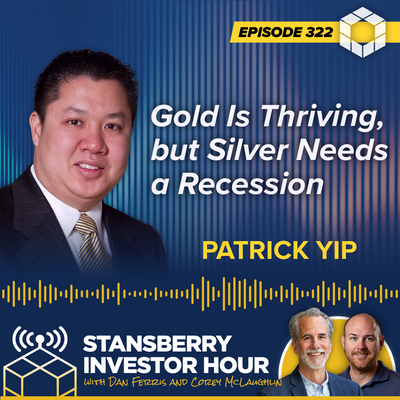
Gold Is Thriving, but Silver Needs a Recession
<p>On this week's Stansberry Investor Hour, Dan and Corey are joined by Patrick Yip, director of business development at the American Precious Metals Exchange ("APMEX"). Dan and Corey kick off the podcast by discussing the latest news surrounding their skepticism of the U.S.'s credit downgrade and discuss the recent jobs report and the implications of unemployment levels reaching a historic low. (00:43)</p> <p>Then, Patrick joins the conversation to talk about the silver and gold markets and their respective prices. He notes that there's almost a lack of interest in precious metals right now, which has led to them being undervalued. Patrick believes that a recession would give them the chance to appreciate significantly in the coming years. (19:40)</p> <p>With regards to the role of the U.S. dollar as a global reserve currency, Patrick raises concerns about the dollar being weaponized for political agendas. This would prompt investors to seek refuge in gold and silver. Yip also delves into the nuances of choosing between coins, bars, and rounds in the precious metals market. And he offers practical advice for investors based on their individual preferences and investment goals. (38:46)</p> <p>Then, Dan asks Patrick about the idea of minting a trillion-dollar platinum coin as a way to avert the debt ceiling... To hear Patrick's opinion on whether this proposal would work and what would happen to the price of precious metals if the government were to mint such a coin, check out today's podcast. (52:40)</p> <p>➡️ <a href="https://youtu.be/oVID0eXviH8">Watch Here</a></p>
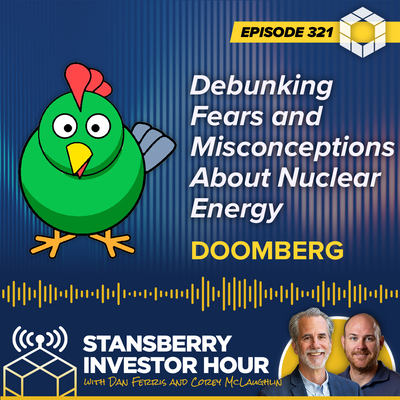
Debunking Fears and Misconceptions About Nuclear Energy With Doomberg
<p>On this week's Stansberry Investor Hour, Dan and Corey are joined by an anonymous guest referred to as "Doomberg." Dan and Corey kick off the podcast by discussing the likelihood that the Federal Reserve will keep raising interest rates. Corey mentions that Chairman Jerome Powell let some "subliminal thoughts" on inflation slip, hinting at what the Fed may be planning from here. (00:00)</p> <p>Next, Doomberg joins the conversation to discuss why he and the rest of his team have decided to remain anonymous and shares his thoughts on Ontario's energy-strategy document and how the province is far ahead of the U.S. in its energy journey. (19:15)</p> <p>Doomberg then discusses his take on climate change. He mentions that he's bullish on the human spirit and the ingenuity required to fight climate change. That said, he believes it's unfair to minimize the impact that modern human development has had on the environment. The state of industrial pollution, for example – especially in China – is a real-world scandal. (29:50)</p> <p>Finally, Doomberg concludes with the prospect of a gold-backed currency and nuclear power. He and Dan discuss the ongoing anti-nuclear propaganda and the need to reevaluate the public perception of nuclear energy as a viable and safe solution to climate change. (45:53)</p> <p>➡️ <a href="https://youtu.be/pcD89cRPuJs">Watch Here</a></p>
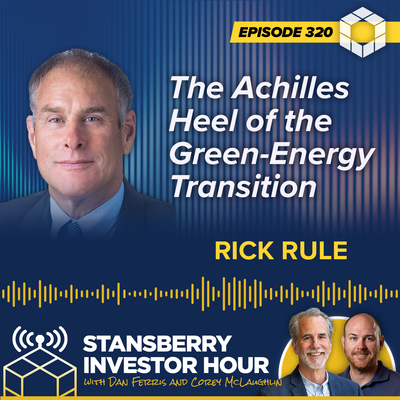
The Achilles Heel of the Green-Energy Transition
<p>On this week's Stansberry Investor Hour, investing veteran Rick Rule returns to the show. Rick is president and CEO of Rule Investment Media and a director at Sprott. He joins Dan and Corey to talk about the trend of global electrification and all things copper. (00:00)</p> <p>Dan and Corey kick off the podcast by discussing a crucial topic – the global net-zero-emissions target set by institutions, corporations, and governments. To achieve this ambitious goal by 2050, there will need to be an increase in green-power generation and electric vehicles. A significant rise in demand for this essential resource would lead to higher copper prices. (00:48)</p> <p>Rick then joins the conversation to share his profound insights on the electrification of the world. The copper talk continues, with Rick passionately emphasizing that achieving net-zero emissions is an inevitable and vital goal. Dan raises pertinent questions about copper production's inability to keep pace with demand. (22:07)</p> <p>Then, Dan and Rick cover the two major copper-producing nations that have been at the forefront of meeting this demand... Chile and Peru. While Chile's mining industry is threatened by shifting political priorities, Peru grapples with the influence of nongovernmental organizations. (43:18)</p> <p>➡️ <a href="https://youtu.be/WHAXn9w8fhk">Watch Here</a></p>
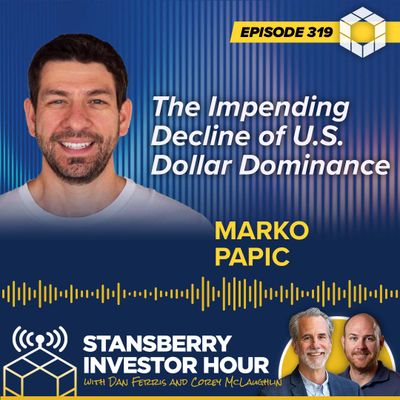
The Impending Decline of U.S. Dollar Dominance in an Era of Multipolarity
<p>On this week's Stansberry Investor Hour, Dan and Corey welcome frequent guest Marko Papic back to the show. Marko is a partner and chief strategist for asset-management platform Clocktower. Together, they tackle the shifting landscape of globalization, the dominance of the U.S. dollar, and investment opportunities in emerging markets. (00:00)</p> <p>Dan and Corey kick off the podcast by discussing the perplexing issue of the U.S. government "losing money while making money." They explore the implications of this inefficiency and its connection to the broader topics of inflation, recent Consumer Price Index data, and the Federal Reserve's monetary policies. (00:41)</p> <p>Then, Marko joins the conversation to share his thoughts on multipolarity, or the distribution of power among several countries. Despite the rise of emerging markets and the global shift toward multipolarity, the U.S. dollar remains the predominant currency worldwide. Marko believes "the dollar will continue to have stickiness as a predominant currency," but he predicts a steep decline within the next year." (28:07)</p> <p>Marko concludes by highlighting that investors can still profit by adopting a longer-term perspective that considers geopolitical and macroeconomic trends. He suggests keeping an eye on economies with favorable prospects, such as Indonesia's control of the Nickel market, Vietnam's vital role in global trade, and Mexico's refrain from fiscal stimulus packages. (45:57)</p> <p>➡️ <a href="https://youtu.be/PHuNHCsGBxs">Watch Here</a></p>
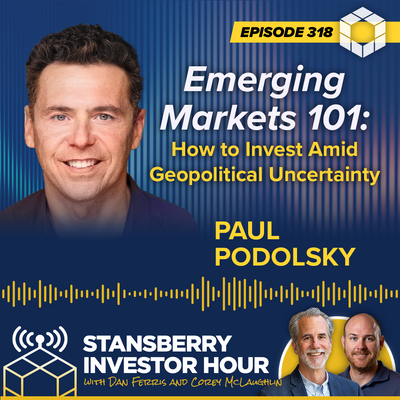
Emerging Markets 101: How to Invest Amid Geopolitical Uncertainty
<p>On this week's Stansberry Investor Hour, Dan and Corey are joined by Paul Podolsky. Paul previously worked as a strategist for Bridgewater Associates – one of the largest hedge funds in the world – for nearly 16 years. Now, he's the founder of Still Press, an author, and the host of the Things I Didn't Learn in School podcast.</p> <p>But first, Dan and Corey discuss Ben & Jerry's recent tweet about "stolen Indigenous land," as well as the broader implications for businesses engaging in political activism. They explore the potential impact on market performance, consumer behavior, and the overall perception of companies like Target, Disney, Starbucks, Unilever, and Anheuser-Busch. (00:41)</p> <p>Paul then joins the conversation to highlight his experiences at Bridgewater under billionaire investor Ray Dalio and share insights on the second-largest economy in the world, China. He says Chinese assets can offer positive expected returns and low correlation with other assets, which makes them attractive today. However, Paul draws from his experience with trading Russian assets to inform his views on China. He emphasizes that the future of both China and Russia remains uncertain. (19:40)</p> <p>Lastly, Paul shares his insights on another potentially lucrative emerging market... Chile. Despite the challenges Chile faces due to political fluctuations, Paul explains how it remains an investable option for those seeking diversification. As global economic debates continue, it's crucial for investors to carefully evaluate the potential returns and risks of investing in emerging markets. (45:27)</p> <p>➡️ <a href="https://youtu.be/uIYRoVSMUs8">Watch Here</a></p>
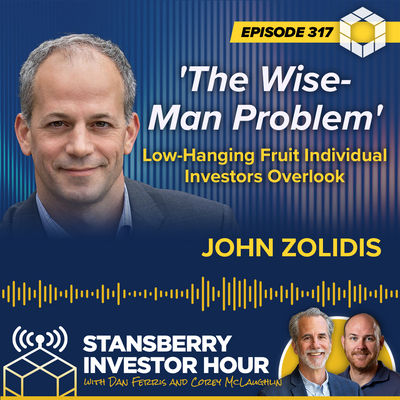
'The Wise-Man Problem' – Low-Hanging Fruit Individual Investors Overlook
<p>On this week's Stansberry Investor Hour, Dan and Corey are joined by equity analyst John Zolidis. He's the president and founder of Quo Vadis Capital, which provides research for both professional money managers and individual investors, specifically in the retail and restaurant sectors. </p> <p>Dan and Corey kick off the podcast by discussing what they're bullish on – what they like, what they want to buy, and what they're buying. Corey expresses optimism in U.S. stocks, citing their recovery and global financial leadership as "the best house in a bad neighborhood." Dan shares his optimism for the housing sector, highlighting historically low inventory levels. (00:41)</p> <p>Then, John joins the conversation to share his perspective on the possibility of beating the market and overcoming cognitive biases in investing. He brings up "the wise-man problem," referring to the cognitive bias that arises from an individual's belief that they have seen and understood all market situations based on past experiences. (19:41)</p> <p>John challenges the belief that outperforming the market is impossible, citing the importance of understanding companies and long-term prospects. John emphasizes the need to align investments with financial goals and avoid short-term performance targets influenced by media hype. He believes a longer-term perspective is the key to gaining an edge as an individual investor. (39:23)</p> <p>➡️ <a href="https://youtu.be/th5e45808wM">Watch Here</a></p>
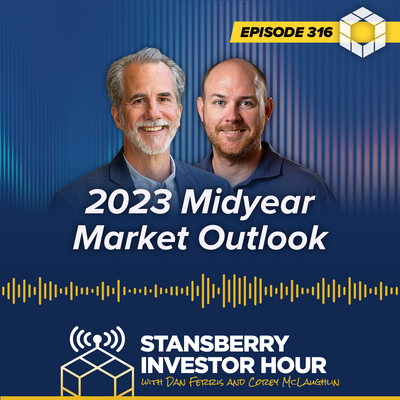
Midyear Market Outlook: What Our Mailbag Tells Us About Investor Sentiment
<p><span dir="ltr" role="presentation">In this special mailbag episode of</span> <span dir="ltr" role="presentation">Stansberry Investor Hour</span><span dir="ltr" role="presentation">, Dan and Corey delve into a wide</span><br role="presentation" /> <span dir="ltr" role="presentation">range of questions from their audience. They shed light on prevailing market sentiments and</span><br role="presentation" /> <span dir="ltr" role="presentation">offer valuable advice. But first, Dan debriefs Corey on his recent trip to Vail, Colorado for the</span><br role="presentation" /> <span dir="ltr" role="presentation">VALUEx conference</span></p> <p><span dir="ltr" role="presentation">This is a valuable conversation on investor sentiment that you won't want to miss. And it</span><br role="presentation" /> <span dir="ltr" role="presentation">even provides insights that will help guide investors seeking to navigate the ever-changing</span><br role="presentation" /> <span dir="ltr" role="presentation">financial landscape. Keep sending your thoughts and questions to</span><br role= "presentation" /> <span dir="ltr" role= "presentation">feedback@investorhour.com</span> <span dir="ltr" role="presentation">and let us know what's on your mind!</span></p> <p>➡️ <a href="https://youtu.be/4oIwH9bEfCY">Watch Here</a></p>
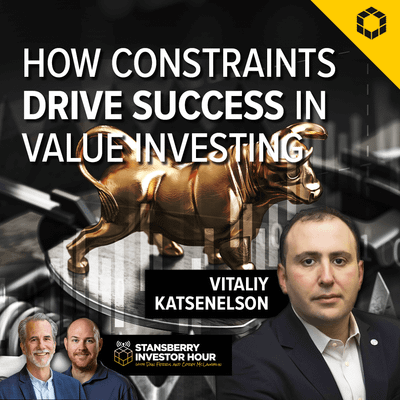
How Constraints Drive Success in Value Investing
<p>On this week's Stansberry Investor Hour, Dan and Corey are joined by frequent guest Vitaliy Katsenelson. He's the CEO and chief investment officer at portfolio-management company Investment Management Associates, or IMA. In his fourth appearance on the Investor Hour podcast, Vitaliy returns to discuss his approach to being a constraint investor and discovering undervalued companies for all his clients.</p> <p>But first, Dan and Corey talk about the recent Federal Reserve meeting, the implications of the central bank's words and actions, and where they think the Fed will go from here. Dan and Corey both believe that in the near term, the market is telling us that we're coming to the end of the rate-hike cycle but "people just aren't buying it" yet. Since the stock market has been doing well these past couple of weeks, Dan thinks the Fed probably won't start cutting rates anytime soon. And because the unemployment rate is still near a record low, Dan and Corey argue that it's the only logical place to look when making a case for rate cuts.</p> <p>Vitaliy then joins the conversation to share the origin of his vacation-style conference, VALUEx Vail... the screening process for attendees... and what Dan should expect while attending this week in Vail, Colorado. Afterward, they discuss the importance of constraints in life and how that relates to investing. Dan says...</p> <p>"People are really creative when they are backed into a corner and they have a lot of constraints on them."</p> <p><a href="https://youtu.be/Yx82CwvBLmU">Watch Here</a></p>
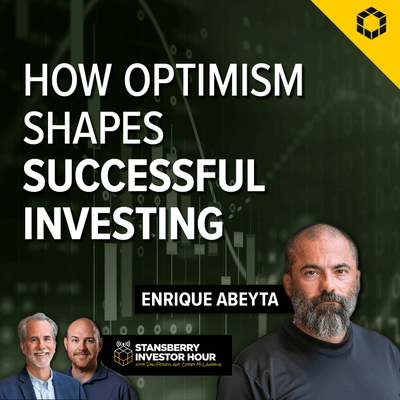
'Plan The Trade, Trade The Plan' – How Optimism Shapes Successful Investing
<p>In this week's Stansberry Investor Hour podcast, Dan and Corey are joined by Enrique Abeyta, an analyst from Empire Financial Research. Enrique shares his insights on investing and offers stock advice through his newsletters. The discussion starts with the recent lawsuits filed by the SEC against Coinbase Global and Binance for offering securities without proper licenses. Enrique then talks about his mosaic approach to investing, which involves analyzing various data points and perspectives. The conversation also covers the impact of technology on asset management and newsletters, the value versus growth investing debate, and Enrique's views on the banking industry.</p> <p>➡️ <a href="https://youtu.be/Mf96MdyZgf0">Watch Here</a></p>
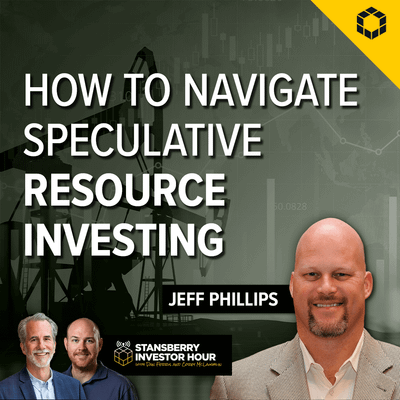
How to Navigate Speculative Resource Investing With Jeff Phillips
<p>In this week's Stansberry Investor Hour, Dan and Corey are joined by Jeff Phillips. He's a well-respected expert in the resource and mining industries and president of Global Market Development. With more than 20 years of experience consulting with Fortune 500 companies and government agencies, Jeff is one of the most trusted names in his field. Now, he's giving us an exclusive look into his "highly speculative" approach to investing.<br /> <br /> But first, Dan and Corey discuss the recent impressive U.S. employment numbers and their potential impact on interest rates. According to Dan, "It ain't looking like a recession anymore." After that, Dan and Corey examine the burgeoning artificial-intelligence ("AI") bubble – highlighting Nvidia's recent run, its continued growth, and its varying effects on different professions and sectors. </p> <p>Then, Jeff joins the conversation to talk about his unique approach to speculation. Jeff shares his belief that the financial markets are facing a significant problem and are on the verge of a substantial decline in asset valuations. However, amid this cautionary note, Jeff highlights the potential for exceptional growth in speculative natural resource stocks. He thinks they're a promising investment in an otherwise uncertain market landscape...</p> <p>➡️ <a href="https://youtu.be/v4Oran4uwL8">Watch Here</a></p>
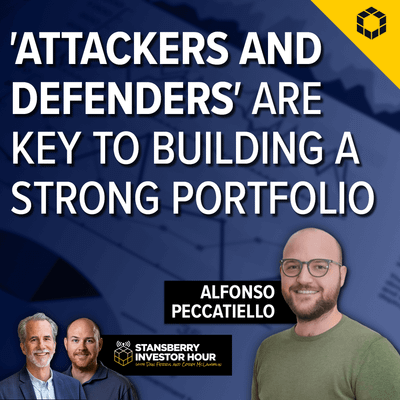
'Attackers and Defenders' Are Key to Building a Strong Portfolio
<p>On this week's Stansberry Investor Hour, Dan and Corey are joined by Alfonso "Alf" Peccatiello. He's the founder and CEO of disruptive investment-strategy firm The Macro Compass. His company provides educational macroeconomic analysis and professional portfolio strategies to bridge the gap between Wall Street and everyday investors. And Alf brings those same skills to the podcast by simplifying complex topics for our listeners.</p> <p>Dan and Corey begin the episode by talking about chipmaker Nvidia. Its recent earnings report sent shares soaring and prompted one of the biggest moves in U.S. stock market history by market cap. Part of the reason for that big move was the company projecting a huge increase in sales next quarter. The chips that Nvidia makes will help with the coming artificial-intelligence revolution, so investors are buying in hand over fist. However, Dan and Corey question whether the company is worth these high valuations.</p> <p>Alf then joins the conversation to discuss the debt ceiling. He predicts that U.S. politicians will probably reach a deal to raise it... but he also analyzes the magnitude and severity of damage to economic growth that a default would bring. Alf further explains that he believes Republican Party members are using time to their advantage to try to get the best out of the deal, since the Democrats took more time to start negotiations. Regardless of what happens with the deal, he warns... Investors must always have attackers and defenders in their portfolio.</p> <p>Next, Alf mentions the Federal Reserve's aggressive rate hikes and how those have caused U.S. stocks to remain relatively expensive. But even with this poor outlook for U.S. stocks, he points out that you can still find "attackers" in Japanese stocks. With the country's nominal growth picking up, wages rising over 4%, and the new Bank of Japan governor not rushing to raise interest rates, Japanese equities are reasonably valued and poised for growth.</p> <p>Lastly, Alf and Dan revisit March's banking meltdown. Alf notes that loose regulations led to terrible risk management, but he argues that the rest of the banking industry will not be affected much. Now, though, the second part of the problem is exposure to commercial real estate, credit quality, and the asset quality of bank loans. In short, the banking system is deteriorating. Tune in to hear Alf and Dan's take on what's coming next so you can prepare yourself for this slow-moving train wreck.</p>
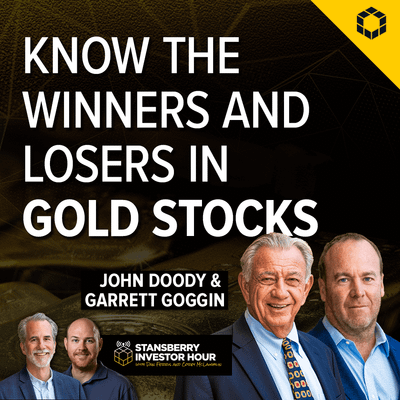
How to Pick the Winners and Avoid the Losers in Gold Stocks
<p>On this week's Stansberry Investor Hour, Dan and Corey are joined by fellow Stansberry Research analysts John Doody and Garrett Goggin. John, an ex-economics professor, started Gold Stock Analyst (GSA) in 1994 and even popularized the metric "market cap per ounce." Meanwhile, Garrett is a chartered financial analyst and certified market technician who started his career on the floor of the New York Stock Exchange before ultimately joining GSA in 2010. Dan and Corey start off by talking about how economists have continued to call for a recession in the coming three months... for the past nine months. With consumer spending growing, gross domestic product ("GDP") rising, and the housing market looking better, the two discuss the possibility that we're already in a recession... and question whether we need to reevaluate the criteria for a recession. Dan notes that despite two consecutive quarters of negative GDP – the textbook definition of a recession – an official recession has still not been called. John and Garrett then join the conversation to discuss the recent run on banks. Garrett notes that the federal-funds rate is too high. With the economy slowing down, he says that the Federal Reserve will have to start cutting rates soon. Plus, if the government raises the debt ceiling, the Fed's balance sheet will continue higher. This will be a good thing for gold. As Garrett explains... A banker's best friend is a shareholder's worst enemy. The conversation then shifts to John's gold stock portfolio. He mentions that he only looks for companies that have already completed a feasibility study or are already in the production stage. John points out that the gold companies in his portfolio are all at different stages in the process. He also warns that there could be a two- to three-year period after the feasibility study where nothing exciting happens to the stock. Adding to that, Garrett emphasizes that when looking at gold companies, it's imperative to analyze how the company is being managed. That way, you can make sure it's generating good shareholder value. Lastly, Garrett and John argue that royalty companies are structured to get lucky... by locking in costs. The companies do this so that as the price of gold rises, they can continue expanding. As long as one of its 100 mines does well, a royalty company will thrive. Royalty stocks certainly have their benefits in comparison with mining stocks. But as John and Garrett discuss, mining stocks are also extremely leveraged.</p>

The Slow-Moving Reality of the Housing Cycle and Inflation Concerns With Bob Elliott
<p>In the latest episode of Stansberry Investor Hour, Dan and Corey welcome Bob Elliott to the show. Bob is the co-founder, CEO, and chief information officer of Unlimited, a firm that uses machine learning to create products that replicate index returns. Bob drops in to share his valuable perspective on inflation intricacies and supply-chain issues. </p> <p>But first, Dan and Corey address the unique challenges the housing market is facing right now... particularly how homeowners are holding on to their properties due to historically low mortgage rates. While advantageous for homeowners, this trend has reduced housing supply and subsequently driven prices upward.</p> <p>Bob Elliott then joins the conversation to provide his insights on the current state of the Consumer Price Index. He highlights the underlying inflation in the economy, which is closely tied to wages and service prices, resulting in a stable inflation rate of 5%. He explains...</p> <p>"Once we started to get a flattening out of oil prices... and used auto prices... those going from falling to flat has a positive pressure on inflation."</p> <p>Bob also delves into the gradual nature of housing cycles and the dynamics of the housing market throughout and following the pandemic.</p> <p>"That's the nature of these cycles... They don't progress rapidly. They aren't the kind of force that will drastically alter the Federal Reserve's outlook within the next three months."</p> <p>Bob explains that numerous structural and tactical factors influence these cycles. However, as input costs decrease, construction activity is expected to increase, which will eventually stimulate economic growth.</p> <p>➡️ <a href="https://youtu.be/cCOGSydrffg">Watch Here</a></p>

The 'Big Bottom' Looms - Why the Final Drawdown Could Be Near
<p>On this week's Stansberry Investor Hour, Dan and Corey are joined by Chris Igou. Chris is a fellow Stansberry Research analyst and the editor of DailyWealth Trader, a daily trading advisory. But first, Dan and Corey argue that banking regulations "hand the incumbents an advantage" and restrict competition. According to Dan, consolidation in the banking industry – like JPMorgan Chase's recent takeover of First Republic Bank – can create backstop and incentive issues. Dan also shares his belief that interest rates will remain higher than expected for longer, despite the market consensus for the Federal Reserve to cut rates.<br /> <br /> Then, Chris joins the conversation to discuss his trading style and macroeconomic outlook for the market. He shares how the Fed's rate hikes are increasing the cost of borrowing and squeezing earnings, leading to smaller profit margins. Chris also notes that the S&P 500 Index's most significant drawdown in this current bear market has been 25%. That number is relatively normal for a bear market, since the average drop during a recession is typically around 40% from peak to trough. He explains...<br /> <br /> "We've got some time where credit is going to be tight and unemployment is still at 3.5%... Historically, you just don't bottom there."<br /> <br /> Finally, the trio analyzes previous false bear market rallies that would get investors excited and optimistic before hitting a sudden downturn. Chris warns that the same could happen this time around. He cites the bear markets of 2000, 2008, and 2020 as examples and shares that he expects more pain in the coming months based on historical patterns.</p> <p>➡️ <a href="https://youtu.be/JEVwNY9-cnA">Watch Here</a></p>
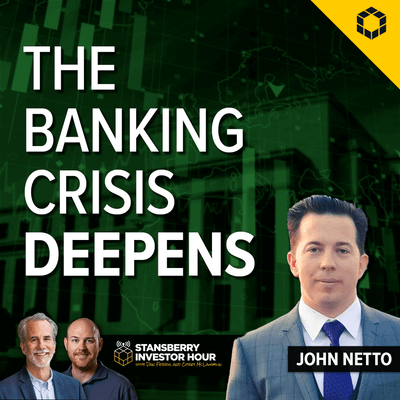
The Four Key Factors for Analyzing Fed Events Amid a Deepening Banking Crisis
<p>This week's episode of Stanberry Investor Hour features John Netto, author of investing book The Global Macro Edge. </p> <p><br /> Dan and Corey start the episode by examining the recent failure of First Republic Bank – the second-largest U.S. bank failure to date – and its acquisition by JPMorgan Chase. They raise concerns about the ongoing banking crisis and the role the government plays in backing "too big to fail" banks. With three of the four largest bank failures in U.S. history happening in the past two months, there's growing uncertainty heading into this week's Federal Reserve meetings.<br /> <br /> Then, John joins the conversation and shares insights from his book, including the concept of how emotions act as the lubricant for decision-making. He says that traders often make the mistake of analyzing their success based solely on the results rather than how well they executed their process. To combat this phenomenon, John created the "Netto number." He explains how it can help investors recognize when their strategy begins to decay and how they can use it to maximize returns.<br /> <br /> The discussion then shifts to central banks and monetary policy, with John describing his four factors for analyzing Fed events. Based on his analysis, John argues that the Fed will not be cutting rates this year and will instead be keeping them near a 4.5% to 5.5% pace until the second quarter of 2024...<br /> <br /> "Because we have interest rates at 7%, it's going to take a long time for this housing inventory to roll over."<br /> <br /> He asserts that if we go into a recession, it will be a very mild one. You can hear his full reasoning in today's Investor Hour.</p> <p>➡️ <a href="https://youtu.be/LYGfkj_fZmM">Watch Here</a></p>
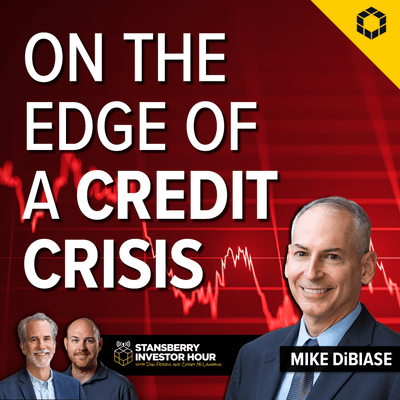
'The Next Bankruptcy Wave is Just Starting'
<p>In this week's Stanberry Investor Hour, Dan welcomes fellow Stansberry Research analyst Mike DiBiase to the show. Mike came to Stansberry in 2014 after spending nearly two decades in finance and accounting. He now serves as our bond-investment expert.</p> <p>To kick the episode off, Dan and Corey discuss the latest home-sales data, how these numbers compare with the previous year's, and what this means for the economy going forward. Dan emphasizes that the housing market is a crucial indicator of a looming recession, and he questions the potential impact of inflation when the market collapses...</p> <p>"Yes, we're going to cry uncle at some point... when the market [does], where will inflation be?"</p> <p>Mike then joins the conversation, and the three delve deeper into recessionary trends and post-pandemic inflation. Mike explains why the current inflationary period reminds him of a famous quote by economist Milton Friedman – "Money-printing is like alcoholism" – and that the bad effects have to come first to cure inflation.</p> <p>➡️ <a href="https://youtu.be/Omd8pet6eK0">Watch Here</a></p>
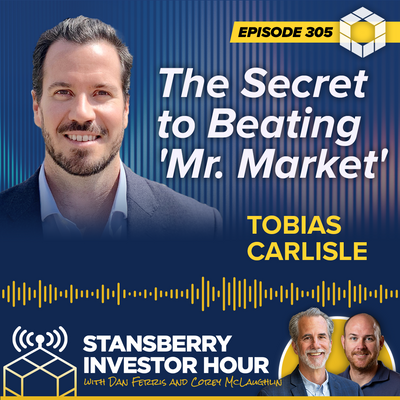
The Secret to Beating 'Mr. Market': A Lesson in Value Investing
<p>In this episode of the Stansberry Investor Hour, Tobias Carlisle discusses the current investment landscape and how many value investors have shifted their focus to growth stocks. </p> <p>Prior to the interview, Dan discusses the concept of "Mr. Market" versus the "smart money". He cites a quote from Benjamin Graham's book Security Analysis, where he states that the stock market is a voting machine in the short term and a weighing machine in the long term. While this may be true for some companies, Dan suggests that there are many whose value doesn't change nearly as much as the stock market suggests, citing periods of sideways movement in the stock market as examples.</p> <p>Then Dan and Tobias delve into the energy sector, noting the challenges of transitioning to EVs and solar. Tobias emphasizes the limitations of nuclear energy and the challenges of investing in the financial and banking sector. He prefers investing in businesses that are in a more broken-down state and cites coal companies as an example.</p> <p>➡️ <a href="https://youtu.be/vcyWv7ipgPU">Watch Here</a></p>
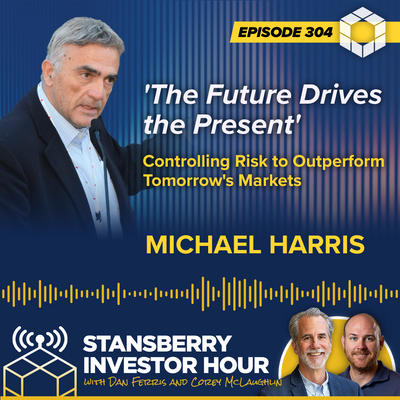
'The Future Drives the Present' - Controlling Risk to Outperform Tomorrow's Markets
<p>Dan and Corey delve into the Personal Consumption Expenditures (PCE) index and its latest release from last week. They discuss the significance of this development and how it could affect the Federal Reserve's decision to raise interest rates.</p> <p>The two also point out that recent behavior in the bond market suggests that the end of the Federal Reserve's rate-hike plans may be near. While this move may contribute to future CPI and PCE numbers, Dan and Corey are not entirely convinced that it will solve the other issues in the economy.</p> <p>Then, Dan introduces Michael Harris, a renowned quantitative trader who is credited with developing the first program to identify anomalies in price action and generate automatic code for popular platforms. Michael is also a prolific author, having written four books on price recognition and his market analysis blog, Price Action Lab.</p> <p>Michael explains his approach to trading and notes that while there are no barriers to entry in trading, the biggest challenge is maintaining discipline and effectively managing risk.</p> <p>Michael goes on to express his surprise at the inability of most active managers to outperform the market and makes the case that as long as the US dollar remains the world's reserve currency, the US will continue to dominate in the technology sector.</p> <p>➡️ <a href="https://youtu.be/_ND-2m7cxI8">Watch Here</a></p>
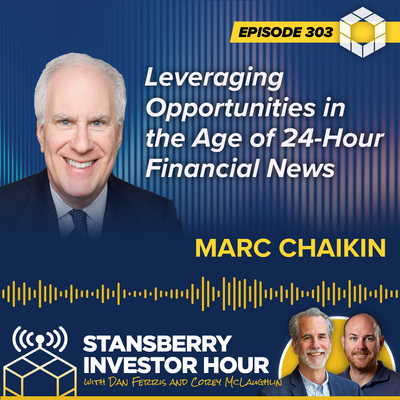
Leveraging Opportunities in the Age of 24-Hour Financial News
<p>Click here to sign up for Marc's latest event: <span class= "yt-core-attributed-string--link-inherit-color"><a class= "yt-core-attributed-string__link yt-core-attributed-string__link--display-type yt-core-attributed-string__link--call-to-action-color" tabindex="0" href= "https://www.youtube.com/redirect?event=video_description&redir_token=QUFFLUhqbk5pYzV3WHpJLXFYX2lRYXZmbDdHMGFNUk1iZ3xBQ3Jtc0tsdEtuaGZ0akcwRlU4SlRGNVRxb3RZVXI4ZkpSZW5ybDJTZDB1TWt2WmR1bWxBd1JIcVVYTVRGRUloOEZYb0FROU15QzVMZEZDS0lWaDdVOThxVmVJRVhQdVAydUdRRDUtN1hRRHVwRnZ6LVdBRDAyVQ&q=https%3A%2F%2Fwww.chaikinevent.com%2F&v=Z6nE1hnFxzw" target="_blank" rel= "nofollow noopener">https://www.chaikinevent.com</a></span></p> <p>We're excited to welcome back Marc Chaikin, founder of Chaikin Analytics. In this episode, Marc and Dan delve into the ongoing banking crisis and explore why Marc views this "bear" market as a buying opportunity.</p> <p>As an experienced investor, Marc understands the challenges of staying informed in today's complex fiscal and monetary landscape:</p> <p>"If you're an investor, you've got to be looking for opportunities and it's a really trite saying, but there's a bull market somewhere."</p> <p>He notes that we're currently experiencing a rolling run-up, with stocks beginning to bottom out and go into uptrends. Marc argues that labeling the market as a bull or bear is less important than seeking out investment opportunities.</p> <p>Finally, he highlights the risks of assuming the market will continue to behave a certain way, and why investors need to focus on finding opportunities regardless of market conditions.</p> <p>➡️ <a href="https://youtu.be/o_PxANSlHoM">Watch Here</a></p>
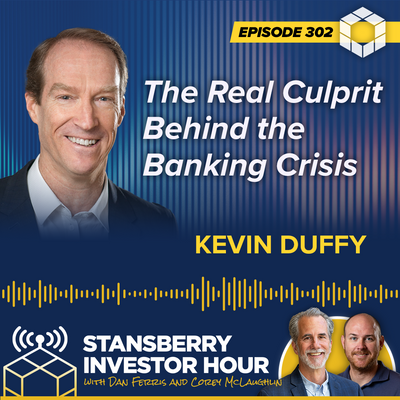
The Real Culprit Behind the Banking Crisis
<p>This week, a Stansberry Investor Hour listener-favorite returns to the show... Kevin Duffy, editor of The Coffee Can Portfolio newsletter and hedge-fund manager, is back. And on his mind is the spectacular, near-overnight collapse of banks. But the foundation of this month's banking fiasco was laid years ago.</p> <p>He explains how it all started... how Silicon Valley banks had risky loan books balanced with less-risky U.S. Treasurys... how banks' assets tripled during the two years of pandemic-driven government stimulus... and how the bond bubble burst and set off a chain reaction. </p> <p>Kevin also shares that the root of the problem comes from the U.S.'s fractional-reserve banking system and reliance on the Federal Reserve and leverage. A simple way to understand the problems with today's banks is to list the characteristics of an ideal hedge fund. When that list is inverted, it describes a modern-day fractional-reserve bank.</p> <p>➡️ <a href="https://youtu.be/O1zqIGUiZWk">Watch Here</a></p>
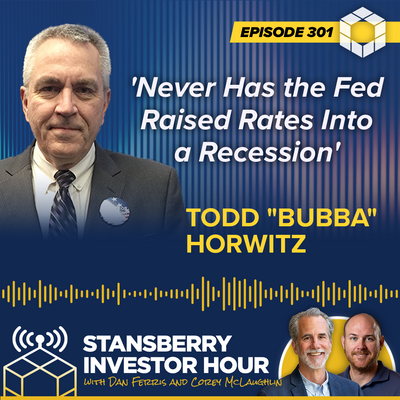
'Never Has the Fed Raised Rates Into a Recession'
<p>Shockwaves from the collapse of Silicon Valley Bank and Signature Bank are rippling through markets – from stocks to oil and cryptocurrency. The Stansberry Investor Hour welcomes back legendary trader Todd "Bubba" Horwitz to warn about bank bailouts and his thoughts on "the absurdity" of the Federal Reserve.</p> <p>Bubba tells Dan Ferris and Corey McLaughlin how he's trading soft commodities and mentions how it could be daunting for most investors. But for the brave who buy these assets at good prices, they're in for a reward:</p> <p><br /> "I think we're due for a big market across the board pretty much in all commodities, especially the consumable-goods commodities. Gold and silver, I think they're going to go higher but they're not consumable – they're going to be needed for money pretty soon."</p> <p>Bubba also explains why the "Fed pivot" narrative is a myth... why the 10-year Treasury yield could run up to 6%... and why you should sometimes take a break from financial media, leaving listeners with his final words: "Don't let the day-to-day news get to you."</p> <p>➡️ <a href="https://youtu.be/rS8-Y5b1UG0">Watch Here</a></p>
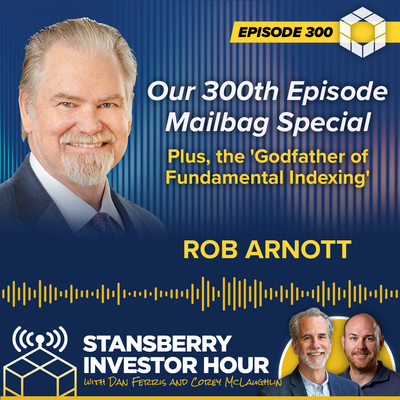
Our 300th Episode Mailbag Special, Plus the 'Godfather of Fundamental Indexing' Rob Arnott
<p>This week, you'll get a glimpse of what goes on in the mind of a true innovator in financial strategy. Hailed by Dan as the "godfather of fundamental indexing," Rob Arnott, founder and chairman of the board of Research Affiliates, returns for another provocative interview.</p> <p>As promised, Dan and his co-host Corey kick things off with a mailbag special to celebrate Stansberry Investor Hour's 300th episode. Thanks to listeners like you, we've collected quite a few e-mails. So today, the duo will tackle a couple of the burning questions you've sent us.</p> <p>Another milestone in today's episode comes in the form of Research Affiliates' proprietary RAFI Fundamental Index ("RAFI") strategy, which is nearing its 20th anniversary. Rob shares some history about his pioneering work that's used by industry heavyweights like Charles Schwab and PIMCO.</p> <p>Rob also warns against following the herd by explaining what happens when you mix availability bias and a bubble. And, with the help of monkeys, he shares how inherently flawed the traditional idea of weighting only by market cap can be... In a nod to economist Burton Malkiel – who once wrote how a blindfolded monkey throwing darts could outperform a fund manager – Rob and his colleagues simulated the monkey for one of their research papers...</p> <p>➡️ <a href="https://youtu.be/KcxYz6-7uwY">Watch Here</a></p>
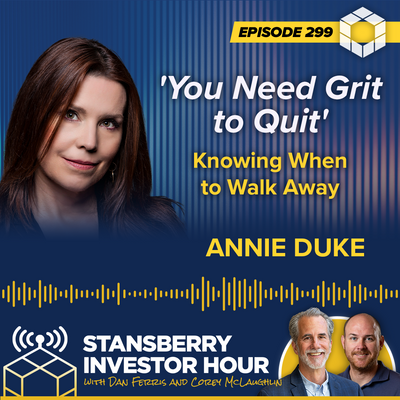
'You Need Grit to Quit' – Knowing When to Walk Away With Annie Duke
<p>We're eager to have former professional poker player, public speaker, and bestselling author Annie Duke on this week's episode to discuss her latest book, Quit: The Power of Knowing When to Walk Away, teaches you how to be a smart quitter.</p> <p>"Quitters never win, winners never quit." That's not true. Winners actually quit a lot. And it's in fact how they win. When you look at the best investors, they are so good at getting off the positions that aren't so worthwhile that they can then reinvest that capital into things that are worthwhile..."</p> <p>Annie also discusses the psychology behind other common pitfalls for retail investors, like loss aversion, focusing on portfolio outliers, relying on intuition, and more. Today's episode is one you won't want to miss.</p> <p>➡️ <a href="https://youtu.be/x18yKyWyigk">Watch Here</a></p> <p>00:00 Inflation status quo<br /> 5:08 Recession prospect<br /> 11:26 Quit: The Power of Knowing When to Walk Away<br /> 19:59 Winners and losers in stock picking<br /> 27:08 How does intuition play out in investing?<br /> 32:10 Checklist manifesto in investing<br /> 38:21 "Stick to the plan"<br /> 47:42 Psychological aspect of investing<br /> 51:00 Annie’s investment tips</p>
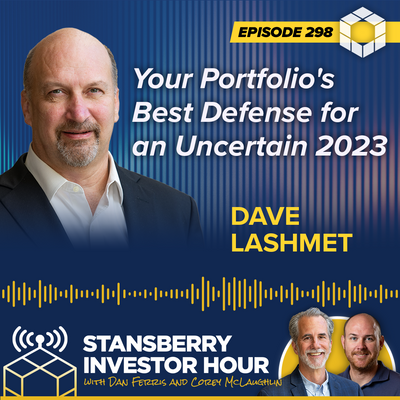
Your Portfolio's Best Defense for an Uncertain 2023
<p>Stansberry Venture Technology editor Dave Lashmet returns to the show. He's our go-to for anything and everything related to emerging technologies. </p> <p>Whether it's the ongoing Russia-Ukraine war... more nuclear threats from North Korea... or the Chinese spy balloon fiasco... geopolitics has already become 2023's overarching theme. It's also why Dave is bullish on one corner of the market in particular...</p> <p>"The simple thesis is that we don't know what 2023 will be like for investors – if it'll be a bear, a bull, or a sideways market. But what we do know is that the best way to play defense in 2023 is going to be to buy defense stocks."</p> <p>Dave also shares one company's stock that is poised to soar thanks to its groundbreaking new stealth technology. And just like other defense stocks on Dave's radar, it has a "very, very, very long [tail]" and "monopolies [on technologies]." Plus, Dave also details exactly what he looks for when screening military tech stocks, along with his "secret decoder ring" for choosing pharmaceutical companies to invest in.</p>
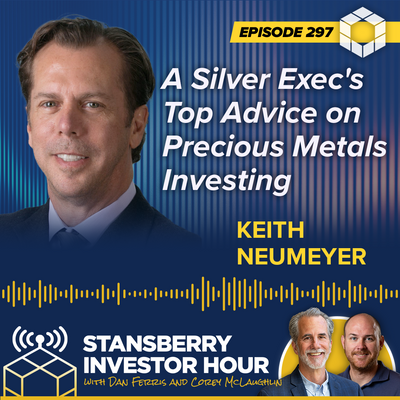
A Silver Exec's Top Advice on Precious Metals Investing
<p>We're excited about this week's <em>Stansberry Investor Hour</em> show... Keith Neumeyer – the founder, president, and CEO of major Canadian mining company First Majestic Silver – shares what it takes to make a fortune in the industry.</p> <p>As Keith explains, "The mining sector brings a huge amount of value to the human race" as many modern technologies rely on it, especially silver...</p> <blockquote> <p>All the different technologies we started to adopt as a human race in the mid-'80s and beyond, I just put two and two together and I said, "Silver is the glue that holds everything together. Without silver, none of this is going to work."</p> </blockquote> <p>Silver is crucial to modern society, and it can be highly rewarding... as long as you know what you're doing. Before signing off this week's podcast, Keith shares the top qualities novice investors should look for in a mining company. (Solid management is his top pick.) And he recommends not waiting too long to take profits or holding on for the elusive 10-bagger, saying...</p> <blockquote> <p>These things will spike all of a sudden [...] The stock will go up 300%, 400%, 500%, which is fantastic. That's what the mining sector can do for you if your timing is right. But you have to be smart as an investor. If you're up 300%, you'd better be selling something. If you don't, you're an idiot. If you're up 500%, I would suggest you're out of the stock completely.</p> </blockquote> <p>➡️ <a href="https://youtu.be/BZ3V0m_JHbk">Watch Here</a></p>
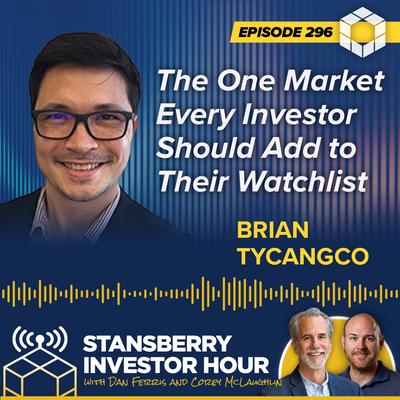
The One Market Every Investor Should Add to Their Watchlist
<p>The biggest growth story of 2023 has been three years in the making. And today's <em>Stansberry Investor Hour</em> guest is at the forefront of it all...</p> <p><em>Commodity Supercycles</em> editor Brian Tycangco is Stansberry Research's resident expert in the energy and natural resources space.</p> <p>After being shuttered behind strict COVID-19 policies for the past three years, China is finally open for business with the global markets again. Its residents – with trillions of dollars socked away during those long years – are itching to travel and spend. And the country's high-value manufacturing sites are set to lead a global bull market in electric vehicles.</p> <p>At the same time, Brian says we're seeing an increased U.S. manufacturing presence in labor markets like India, Indonesia, and Thailand – which means incredible investing opportunities across Southeast Asia.</p> <p>Also on today's podcast, Brian urges investors to not be so easily scared off by sensational headlines from Western media... like the furor over Chinese President Xi Jinping's power move to extend his term of leadership or the concerns over the wealthiest citizens leaving the country – and taking their money with them.</p> <p>Thanks to his residency in Asia (the Philippines, to be exact), Brian has gotten a firsthand look at the sentiment. He says, "Everything isn't as bad as it seems in China," and that most Chinese have a "back-to-business mentality."</p> <p>Lastly, when it comes to adding this market to your portfolio, he says you still have to be practical...</p> <blockquote> <p>You don't go all-in on China, but you don't also not have exposure to a place like this. There's always room for China in anyone's portfolio [...] It'd be crazy not to have exposure just because of geopolitics.</p> </blockquote>
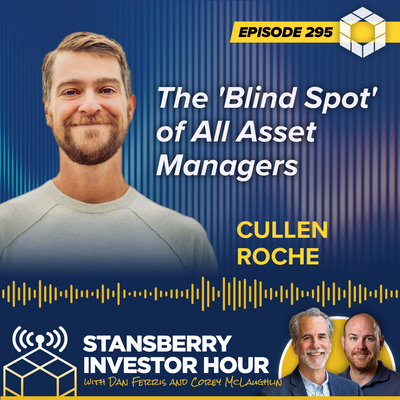
The 'Blind Spot' of All Asset Managers
<p>This week, one of Dan's favorite guests returns for his fourth <em>Stansberry Investor Hour</em> appearance... Cullen Roche is the founder of portfolio-management firms Orcam Financial and Discipline Funds. He is also the author of two of the most widely circulated research papers in finance and a highly rated book named after his popular financial blog, Pragmatic Capitalism.</p> <p>But first, Dan and Corey examine the biggest news events of the past week. And some have gotten a little too close for comfort to the extreme scenarios in the "Top 10 Potential Surprises for 2023" episode.</p> <p>As for our guest's economic outlook, Cullen discusses why disinflation could be this year's theme... why it's too early to be picking bottoms in the "huge, slow-moving beast" of housing... and why he thinks the Federal Reserve is likely to hike rates a bit more before adopting a wait-and-see approach...</p> <p>➡️ <a href="https://youtu.be/d7ftZikuAx0">Watch Here</a></p>
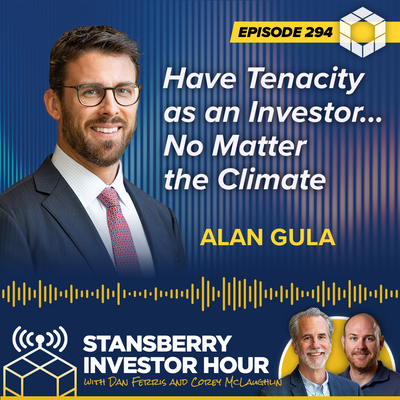
Having the Tenacity as an Investor... No Matter the Climate
<p><span data-preserver-spaces="true">This week, we're thrilled to welcome a brand-new guest to the </span><em><span data-preserver-spaces="true">Stansberry Investor Hour</span></em><span data-preserver-spaces="true">... who happens to be the lead analyst for Stansberry Research's longest-running flagship publication: Alan Gula. </span></p> <p><span data-preserver-spaces="true">But first, Dan and his co-host Corey discuss the latest hot-button topics: Big Tech's sweeping wave of layoffs, why media coverage of the "debt-ceiling crisis" is just "pure noise," the "cat-and-mouse game" of the lag effects of Federal Reserve policy, and whether there could be an encore to last year's bond-market beatdown.</span></p> <p><span data-preserver-spaces="true">Speaking of distressed investments... today's guest had a front-row seat to the financial crisis, as he was working Barclays Investment Bank's distressed-debt desk when Lehman Brothers filed for bankruptcy. Alan worked at some of Wall Street's biggest firms before joining Stansberry Research. </span></p> <p><span data-preserver-spaces="true">"I think that any good recommendation has a good macro tailwind. And cycles are crucial from a macro standpoint," says Alan. </span></p> <p><span data-preserver-spaces="true">But finding a winner requires more than just the right macroeconomic setup... As Alan states, it's one that "marries both the macro and the bottom-up fundamentals research." He dives deep into his bottom-up research process. And he also shares his No. 1 tip for successful investing.</span></p>
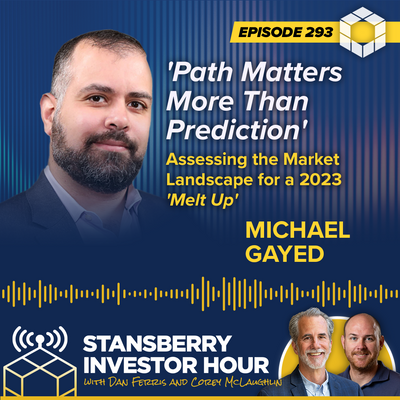
'Path Matters More Than Prediction' – Assessing the Market Landscape for a 2023 'Melt Up'
<p>For today's episode of <em>Stansberry Investor Hour</em>, we've managed to reel in one of Dan's favorite Twitter personalities: Michael Gayed.</p> <p>Michael is the brains behind The Lead-Lag Report, a long-term investment strategy newsletter. </p> <p>According to Michael, "Path matters more than prediction, "... <em>especially in the credit event and the market rally he sees possible in 2023</em>. He relies on multiple indicators that "get ahead of highly volatile regime shifts in equities," and "when they [the indicators] all give you the same message, that's your tell."</p> <p>Michael also breaks down the lumber-to-gold indicator for market moves... the fallacies in market timing and adapting to the market... the meaning behind his Twitter profile picture... and more.</p> <p>Plus, you'll also hear Dan and Corey discuss how stock bulls pinning their hopes on a Fed pivot could be in for a disappointment and the latest in shenanigans from the duo's favorite dethroned crypto king.</p>

How to Make Volatility Work for You in 2023
<p>We're back to our regular <em>Stansberry Investor Hour</em> programming this week. And to kick off a new year of the show, we welcome Greg Diamond, editor of <em>Ten Stock Trader</em>.</p> <p>A chartered market technician ("CMT") and Stansberry's resident expert in technical analysis, Greg has almost 20 years of experience in portfolio management and trading across every asset class you can think of. That's why he's the perfect fit for <em>Ten Stock Trader</em> – Stansberry's unique daily trading service in which Greg has nailed down multiple double- and triple-digit winners.</p> <p>According to Greg, "2023 is going to be marked with incredible trading opportunities." He explains that one of the tools for navigating market volatility this year is being able to identify certain trends, and he also explains how technical analysis can help you do that. His strategy might be intimidating for most, but Greg encourages folks to keep an open mind and step out of the box...</p> <p>This is a can't-miss episode. Check it out now.</p>
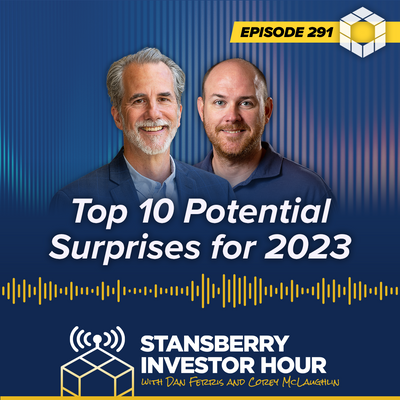
Top 10 Potential Surprises for 2023
<p>Today was the first trading day of the new year. So for this week's <em>Stansberry Investor Hour </em>episode, we thought it'd only be fitting to kick off 2023 with our fourth annual "Top 10 Potential Surprises" for investors.</p> <p>Dan Ferris teams up with co-host Corey McLaughlin to bring you this year's list. Keeping with Dan's favorite adage of "Prepare, don't predict," these 10 surprises aren't predictions... They're possible events investors are unprepared for, based on current market conditions.</p> <p>We won't spoil the surprises. But just to give you an idea, you'll hear about...</p> <ul> <li>A bullish trend in two assets (including one Dan has never been a fan of)</li> </ul> <ul> <li>A commonly held view of today's bear market (and why it's a mistake)</li> </ul> <ul> <li>A specter of the 2021 stock market's most infamous names (and what it portends)</li> </ul> <ul> <li>A "blistering" market event (one that's guaranteed to "shock the hell out of everyone")</li> </ul> <ul> <li>A repeat of history (and an event Dan says is his "pet surprise" that he'll always have on his Top 10 list)</li> </ul> <p>Dan and Corey also ask each other the show-standard "Final Question," as today's special episode doesn't feature a guest (we'll return to our normal format next week). Plus, Dan reveals his four tips on how to best prepare for all that 2023 could unleash.</p>
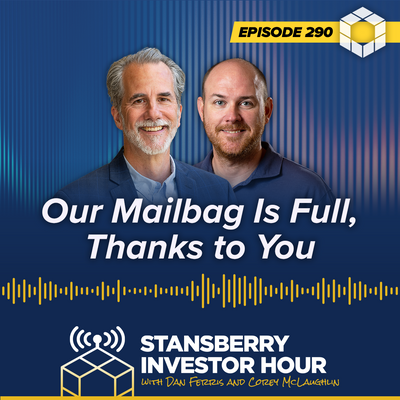
Our Mailbag Is Full, Thanks to You
<p>This week's <em>Stansberry Investor Hour</em> episode features multiple guests...</p> <p>And they're you, our listeners.</p> <p>You see, we've been reading every e-mail and listening to every voicemail as they've come in. So for today's episode, we're opening the floodgates and sharing as many of your mailbag missives as we can cram into the show's hour.</p> <p>We'll share your feedback – both good and bad – and questions that run the gamut from...</p> <p><em>What is the most interesting buy-and-hold opportunity considering the crisis in Europe?</em></p> <p>To...</p> <p><em>Is Dan about to pass away?</em></p> <p>Dan and his co-host Corey McLaughlin tackle all your comments and questions. You'll also hear...</p> <ul> <li>Dan and Corey's picks for "the most interesting buy-and-hold opportunity"</li> </ul> <ul> <li>The duo's take on Big Tech's layoffs</li> </ul> <ul> <li>What made one listener say, "It's the equivalent of Dan getting married and not telling us who this new person is"</li> </ul> <ul> <li>Why Stansberry Research values conflicting opinions</li> </ul> <ul> <li>The next "sleeper" crisis that's lurking for the U.S., according to Corey</li> </ul> <ul> <li>Dan's vote for the "dumbest thing in the world"</li> </ul> <ul> <li>Market bearishness and what Dan thinks is "baloney" about it</li> </ul> <p>Get ready for today's special episode... As Dan says, "There's a lot to unpack."</p>
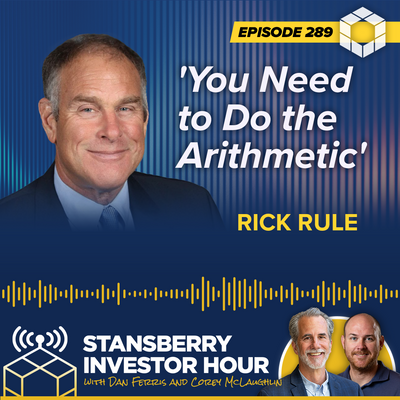
'You Need to Do the Arithmetic' with Rick Rule
<p>This week's <em>Stansberry Investor Hour</em> guest is hailed by Dan Ferris as "the blueprint for a great guest." And co-host Corey McLaughlin says, "I get excited when I know he's going to be talking somewhere." Rick Rule is back for his fourth appearance.</p> <p>For our newer listeners, Rick is one of the most accomplished natural resource investors on the planet. He began his financial career in the securities business in 1974 and has been principally involved with natural resource securities ever since. And over his long career, Rick has originated and participated in hundreds of debt and equity transactions with private, pre-public, and public companies. Even after a decade of serving as Sprott U.S. president and CEO, he's still spending his retirement years in the markets as founder and CEO of Rule Investment Media.</p> <p>After opening with "the most entertaining [news] item" on their minds this week and an in-depth discussion on natural resource stocks, last week's latest Consumer Price Index report, Big Tech layoffs, and unemployment numbers... the duo chat with Rick about how to navigate the market these days.</p> <p>The get-rich-quick fads – like meme stocks, cryptocurrencies, Cathie Wood's ARK universe, and SPACs (that's "special purpose acquisition companies") – are all "over and done," according to Dan. And success now requires some elbow grease...</p> <blockquote> <p>All that easy money that was a narrative plus a chart that goes up to the right... it's all done. Now, you have to be a bargain hunter. You need to do the bottom-up work. As Rick Rule likes to say, "You need to do the arithmetic." And for people who do the arithmetic and do the work, this is their time to shine.</p> </blockquote> <p>Rick touches on the fundamental analysis behind it all, untangling the complex interplay between the oil industry and politics for listeners. And Dan, who has been itching to know what Rick has to say about investing in natural resources, gets his answer...</p> <blockquote> <p>There's a very good intermediate-term play in the oil and gas sector. Ironically, that's almost guaranteed by our government. [... ]</p> <p>If you are willing to subject yourself to government stupidity both in the United States and Canada – which is to say, if you are willing to subject your purse to the twin threats of Biden and Trudeau – then the opportunities become truly staggering.</p> </blockquote> <p>While Rick doesn't shy away from natural resource investments that carry "complex political risk" and require some arithmetic legwork, he understands listeners might hesitate to do the same. If you're eyeing oil and gas stocks, he suggests Big Oil could hold the key for some great intermediate-term returns.</p> <p>So, whether it's hunting for the latest investment opportunities in uranium, natural gas, or precious metals... or poking fun at a few world leaders... Rick covers it all in this week's episode.</p>
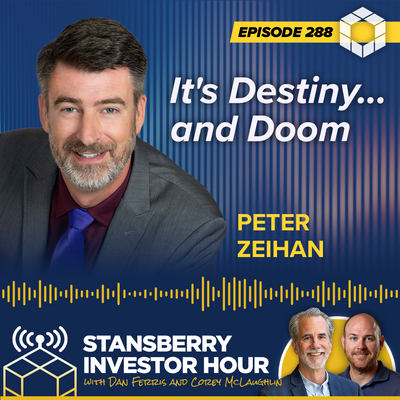
It's Destiny... and Doom
<p>If anyone can make Dan exclaim, "If you don't get the hell away from your microphone, I'm going to keep you here all day," it's today's <em>Stansberry Investor Hour</em> guest: geopolitical strategist and <em>New York Times</em> bestselling author Peter Zeihan.</p> <p>But first, Dan and his co-host Corey McLaughlin kick off the show by dissecting the conflicting – and confusing – news headlines on the direction of stocks and housing into 2023. The duo also evaluates ARK Investment Management founder Cathie Wood's latest Twitter ramblings (and why she sounds like a certain founder of a certain defunct cryptocurrency exchange).</p> <p>Circling back to today's guest, Peter is also the founder of his own firm, Zeihan on Geopolitics, where he provides his expert analysis to clients that include Fortune 500 companies, trade associations, policymakers, and government agencies of all levels. His first three books – <em>The Absent Superpower</em>, <em>The Accidental Superpower, and Disunited Nations –</em> have been recommended by U.S. Senator Mitt Romney, political scientist Ian Bremmer, and CNN anchor Fareed Zakaria. His fourth book, <em>The End of the World Is Just the Beginning: Mapping the Collapse of Globalization,</em> was published in June 2022 and is a <em>New York Times</em> bestseller.</p> <p>And in this week's episode, he and Dan start by diving into the topic of deglobalization. Peter says the pace of deglobalization has accelerated since the start of the current decade – fueled by declining birth rates and an aging population. Additional kindling has come in the form of the COVID-19 pandemic, Chinese President Xi Jinping's narcissistic "cult of personality," and the Russia-Ukraine war. Global economies are in for some grim times... And as Peter puts it, "We are looking at the end of the world that we understand – probably in the next 36 months."</p>
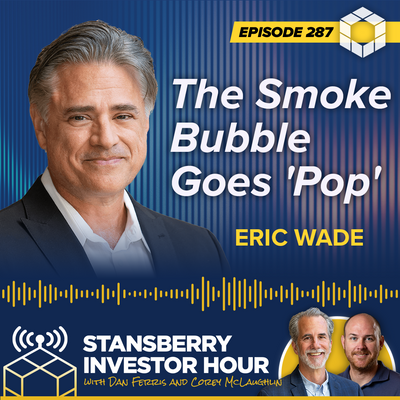
The Smoke Bubble Goes 'Pop'
<p>We're kicking off this week with a special <em>Stansberry Investor Hour</em> episode on all things cryptocurrency... and it's a roundtable talk. Dan Ferris and co-host Corey McLaughlin sit down with the perfect guest for today's show: Stansberry's in-house crypto guru Eric Wade.</p> <p>Eric is the editor of <em>Crypto</em> <em>Capital</em>, <em>Crypto</em> <em>Cashflow</em>, and the <em>Stansberry</em> <em>Innovations</em> <em>Report</em> at Stansberry Research. He got his start in cryptos by mining bitcoin and Ethereum and quickly moved on to building and programming his own miners... before going on to rack up big gains in crypto investments.</p> <p>Despite the drama the FTX crash has caused, Eric says there's something afoot right now that's "much bigger news in the long run." As for the rest of this week's roundtable, Dan, Eric, and Corey discuss the future of crypto regulations... how "Brazil is the middle-class taxpayer of America"... and some challenging questions on bitcoin as a currency (posed by the ever-skeptical Dan).</p> <p>Plus, the trio examines last week's <em>New York Times</em> interview with disgraced founder Sam "I've Had a Really Bad Month" Bankman-Fried – one that was equal parts bizarre, awkward, and, as Corey describes, riveting.</p>
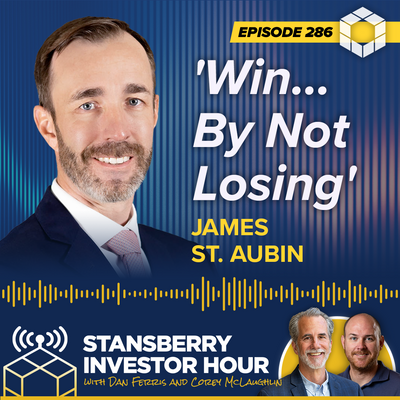
'Win... By Not Losing'
<p>Even though stocks finished the week higher, investors have several new reasons to snap out of the holiday-weekend lull as economic and market uncertainties still loom ahead... like the geopolitical risks surrounding Taiwan's elections, a stateside natural disaster, and the latest in struggling world economies. But, as Dan says, instead of worrying about how the world's problems will be solved, you should focus on ensuring the best defense for your portfolio. That's why he has brought on an expert in risk management, James St. Aubin, the chief investment officer of Sierra Investment Management.</p>
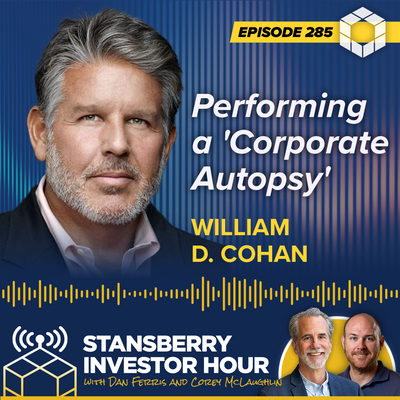
Performing a 'Corporate Autopsy'
<p>This week's <em>Stansberry Investor Hour</em> episode features one of the most accomplished financial journalists today. He's a returning guest, and his latest book couldn't have come out at a better time...</p> <p>But first, Dan and <em>Stansberry Digest</em> editor Corey McLaughlin start off the episode's "opening rant" by taking on a recent headline-maker: the FTX debacle. The world is watching rapt as global authorities comb through the wreckage left by the collapse of this prominent cryptocurrency exchange... only to discover that "it's worse than we initially thought."</p> <p>Among other "scandals and wonderful things that crashed and burned," as Dan puts it, no one can forget the shocking downfall of another market monolith: General Electric (GE). This company gave us life-changing innovations like the light bulb, radio broadcasts, fluorescent lamps, X-ray machines, jet engines, and more... before it went into a dramatic tailspin starting two decades ago.</p> <p>That's why today, award-winning author William D. Cohan joins us for his second appearance to cover this spectacular corporate meltdown in depth. His latest book, <em>Power Failure: The Rise and Fall of an American Icon</em>, features rare interviews with key figures from GE (like former CEO Jack Welch). Published just a week ago, it has already drawn scores of praise.</p> <p>William's prolific career includes several other books – three of which are <em>New York Times bestsellers –</em> <em>and</em> writings for numerous financial publications like <em>Fortune</em>, <em>Barron's</em>, and the <em>Financial Times</em>, to name a few. Plus, he has 17 years of experience in mergers and acquisitions (M&A) banking at some of Wall Street's biggest firms like Lazard, Merrill Lynch, and JPMorgan Chase.</p> <p>Dan picks William's brain about the writing process for his book...</p> <blockquote> <p>There's a dead body on the floor, and how did it get there? I'm doing the autopsy. I'm doing a corporate autopsy. How did GE go from being the valuable, most respected company in the world to irrelevant, being broken up, being a fraction of both what it was worth and the respect people had for it?</p> </blockquote> <p>The two discuss GE's beleaguered history... and then William shares his No. 1 qualitative factor in fundamental analysis that investors should always consider while researching a stock.</p>
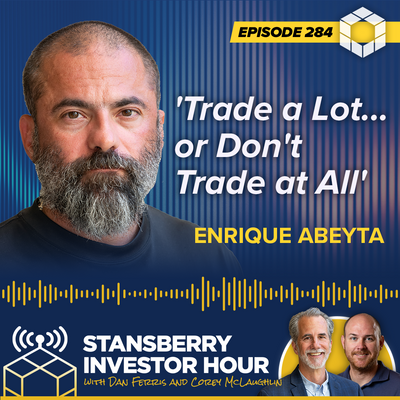
'Trade a Lot... or Don't Trade at All'
<p>This week, <em>Stansberry Investor Hour</em> listeners are in for a treat... Dan has brought back Empire Financial Research's own (and listener favorite) Enrique Abeyta, editor of <em>Empire Elite Trader</em>, a short-term trading service that draws from a pool of mid- to large-cap stocks.</p> <p>Dan and Enrique launch into a spirited discussion about the belief that a stock's value directly correlates to the company's value. And Enrique warns about the danger of believing that this is 100% true...</p> <p>He explains what Dan calls "a more inclusive, superior mental model for someone who wants to trade stocks for less than five years"... and discusses how sentiment and positioning matter more for stocks over the short term, with fundamentals and macroeconomics becoming the main drivers over the long term.</p> <p>Enrique also explains the power of "positive psychology" and keeping a disciplined approach for investing success. Plus, he reminds listeners that there's a silver lining in rough markets like today's and that these are truths rooted in history...</p>
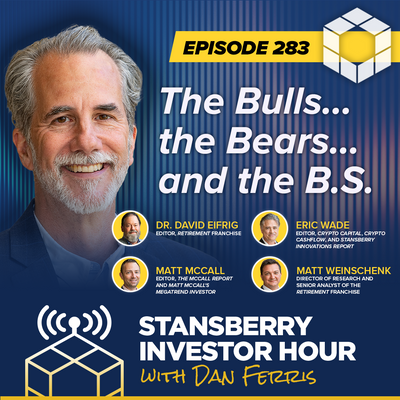
The Bulls... the Bears... and the B.S.
<p>Last month, your <em>Stansberry Investor Hour</em> host and <em>Extreme Value</em> editor Dan presented at the 20th annual Stansberry Conference alongside dozens of exceptional speakers. And today, he's giving his listeners a special peek into one of the panels he participated in with fellow editors.</p> <p>This wasn't your typical roundtable discussion... Instead, moderator and Stansberry Research's Director of Research Matt Weinschenk had gathered some of Stansberry's "more outspoken and colorful personalities" for a lively game of "Bull, Bear, or B.S."</p> <p>Dan is joined by his colleagues: the <em>Retirement</em> franchise's Dr. David "Doc" Eifrig, <em>Crypto Capital</em> and <em>Crypto Cashflow</em>'s Eric Wade, and Matt McCall of <em>The McCall Report</em> and <em>Matt McCall's MegaTrend Investor</em>. The four must each choose whether they're bullish or bearish – or calling B.S. – on some of the most controversial topics in finance today.</p> <p>They also share their viewpoints on the current stock market valuation in terms of the CAPE Shiller P/E (that's cyclically adjusted price-to-earnings) ratio. You'll also hear each editor's take on the future of the housing market, consumer spending, energy stocks, bitcoin, and the metaverse – including Dan's hot take on well-known companies like gaming pioneer Atari grabbing up virtual real estate...</p> <p>You can also <a href= "https://youtu.be/TnxJWM_NCmk"><strong>click here to watch a video of the panel on YouTube</strong>.</a></p>

Recession in 2023 Is a 'Done Deal'
<p>In this week's episode, Dan welcomes back four-time <em>Stansberry Investor Hour</em> veteran Marko Papic.</p> <p>Currently, the geopolitics and macroeconomics specialist serves as a partner and the chief strategist of asset manager Clocktower Group. Before that, Marko was the senior vice president and chief strategist on geopolitical strategy at global investment research firm BCA Research for nearly a decade. He has also worked at Stratfor, one of the world's top geopolitical-intelligence platforms.</p> <p>Marko last joined us in late January, shortly before the Russia-Ukraine war exploded. Today, he's turning his attention to someone "much more relevant and powerful than Vlad[imir Putin]"... chairman of the U.S. Federal Reserve, Jerome Powell.</p> <p>We realize the topic of our central bank's next steps might seem worn out. After all, it has been splashed across the top news headlines daily for most of 2022. But the Fed's actions are massively influencing the global financial system right now. As Marko says...</p> <blockquote> <p>Literally everything that is going on in the world is kind of irrelevant if J. Powell continues to be very hawkish.</p> <p>When the Fed decides it has had enough, everything else can start mattering again. Until then, it's really just all about them.</p> </blockquote> <p>Marko explains the Fed setup that could set off "the most calamitous recession in the history of the United States," and he shares his preferred indicators for a recession.</p> <p>He also discusses the Paul Volcker versus Arthur Burns debate... two former Fed chairmen who defined their careers by tackling inflation. Will Powell follow in Burns' dovish footsteps or take a more uncompromising stance like Volcker did?</p> <p>Finally, Marko highlights a future threat to the markets: the 2024 presidential election. As for which side he's on, he elicits some chuckles from Dan with his candor...</p> <blockquote> <p>I don't care, right or left... I bathe myself in nihilist indifference. My job is to forecast. It doesn't matter.</p> </blockquote>
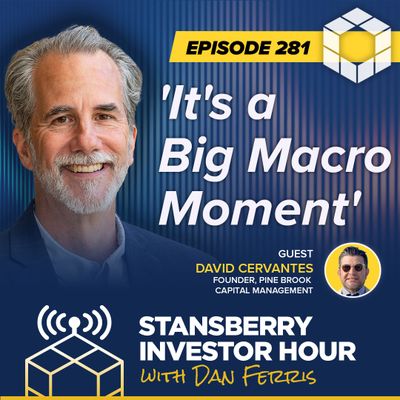
'It's a Big Macro Moment'
<p>We're excited to have a brand-new guest for this week's <em>Stansberry Investor Hour</em> episode. And Dan has long admired him for his keen macroeconomic insights...</p> <p> </p> <p>David Cervantes, the founder of New York's Pine Brook Capital Management, joins us today. Before establishing his firm in 2015, David already had roughly two decades of experience in the financial industry with Wall Street heavyweights like Wells Fargo, JPMorgan Chase, UBS, Bank of America, and Morgan Stanley.</p> <p> </p> <p>Given the carnage in the markets, an uptick in inflation and volatility, and sky-high mortgage rates, Dan says, "We're on another planet versus a year ago." It's a big moment for macroeconomics... and that's exactly why Dan brought David on this week. He shares his expertise in understanding and explaining large-scale economic factors and gives his take on what's next for the markets.</p> <p>David also covers the debate between a cyclical versus secular bear market, the Federal Reserve's No. 1 fear, and whether he's in the soft-landing camp. As for his take on the future, it's one heavily colored by the Fed's true nature...</p>
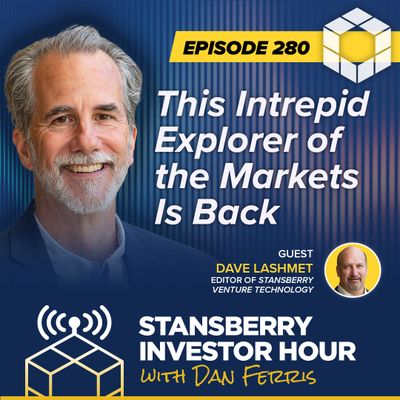
This Intrepid Explorer of the Markets Is Back
<p>This week, we've brought back <em>Stansberry Venture Technology</em> editor Dave Lashmet.</p> <p>Dave mines the markets for lucrative opportunities in publicly traded, small-cap companies. A typical "diamond in the rough" might pioneer a revolutionary new drug or technology. These early-stage innovators can potentially change the world for the better – and rake in outsized gains for investors. And the best part about investing in these kinds of companies lies in their resilience to bear markets like today's...</p> <p>Dave rejoins us today with a special look into some of the most promising new trends in the biotech space. You'll hear about a leader in robotic surgery... cutting-edge radiation therapy that Dave has been tracking for several years... new breakthroughs in cancer treatment... and the true story – one that leaves Dan momentarily speechless – of a man who overcame life-changing, traumatic injuries to become a crusader for patient rights.</p>
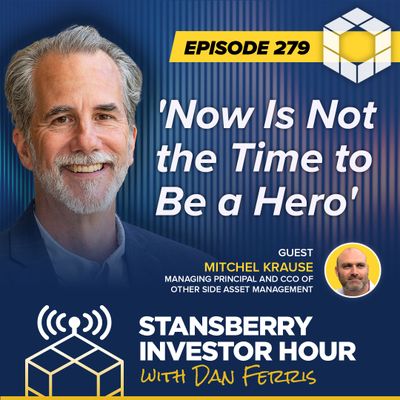
'Now Is Not the Time to Be a Hero'
<p>We're excited to share today's guest's take on the markets – especially following his April 2020 appearance on the show when the market was clawing its way back up from its March 23 bottom.</p> <p>This week, Dan welcomes back Mitchel Krause to <em>Stansberry Investor Hour</em>. Mitchel is the managing principal, chief commercial officer, and founder of Other Side Asset Management, an investment firm focused on capital preservation, risk management, and transparency. A 20-plus-year veteran of the financial services industry, he has served as first vice president at Stifel and Ryan Beck & Co.</p> <p>Mitchel was last on the show in April 2020... not long before Federal Reserve Chair Jerome Powell admitted the central bank had "crossed a lot of red lines" with its aggressive emergency measures during the pandemic. Today, Mitchel says, "Every time I look, the data is different and it looks worse"... from bubbles popping in crypto, housing, equities, and U.S. Treasurys to the negative wealth effects of consumer spending tanking and inventories rising. And he's wondering just what the Fed might do next...</p> <blockquote> <p>You're seeing it in all the data, and yet Wall Street's estimates haven't come down nearly enough for Q4 or Q1 of next year. So this will continue for probably the next three-plus quarters. [...]</p> <p>We're probably closer to still a top than watching this all bottom out. The question becomes what red lines are crossed in order to try to possibly save this. That's the risk every central banker essentially tries to plan something... We'll pivot if we need to pivot from our positions.</p> </blockquote> <p>Mitchel also believes we're currently in a "disinflationary investing regime." He says you should analyze "how the markets are looking at things" rather than relying on backward-looking metrics like the Fed-favorite Consumer Price Index. And instead of readily believing the headlines, he urges listeners to demand more evidence, more data, and do their own research.</p> <p>Furthermore, Mitchel says you should "prepare yourself for another two or three quarters of what you've just seen" and make capital preservation your No. 1 goal right now. He also warns against falling into the trap of trying to time the market bottom. Lastly, Dan picks Mitchel's brain about positioning, especially since he "has never talked to anyone holding 70%-plus cash."</p>
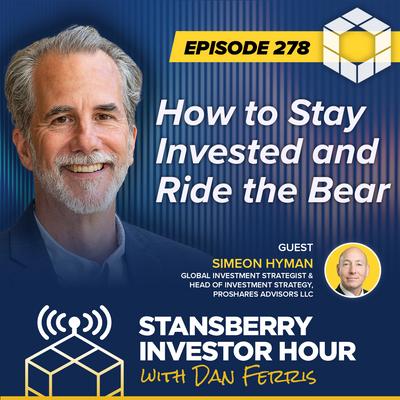
How to Stay Invested and Ride the Bear
<p>When we first spoke with Simeon last year, the bull market was raging. Stocks were on a tear, with the S&P 500 Index hitting high after high. Things are vastly different today...</p> <p>This time around, Simeon shares a couple of views on the U.S. economy from a macroeconomic perspective... including his take on interest rates, inflation, and some critical U.S. Federal Reserve policies that the media isn't talking about.</p>
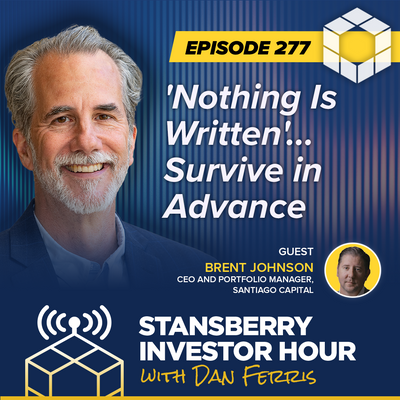
'Nothing Is Written'... Survive in Advance
<p>Today's <em>Stansberry Investor Hour</em> guest is the man behind a theory that Dan says "scares the crap out of me when I think of foreign markets"...</p> <p>We're thrilled to have Brent Johnson, the creator of the famous "dollar milkshake theory," on this week's episode.</p> <p>A seasoned Wall Street veteran with decades of experience in finance and money management, Brent is currently the CEO of Puerto Rico-based Santiago Capital, a wealth management firm focusing on macroeconomic trends. </p> <p>Brent says most folks who have read or heard about his dollar milkshake theory think it's just about the U.S. dollar going higher. But he says there's more to this narrative... He explains how the Federal Reserve's switch to quantitative tightening is like a straw sucking up liquidity from markets worldwide – strengthening the dollar. And it's a story that he says is playing out right now, with a soaring greenback and other currencies in a tailspin...</p> <p style="padding-left: 40px;">After the global financial crisis, governments and monetary authorities around the world were forced to provide incredible amounts of liquidity... They created this big pool of liquidity, and they kept doubling down on it and doubling down on it...</p> <p style="padding-left: 40px;">The world mixed this big milkshake of liquidity and capital that needs to go somewhere. But as we get further into this, it's going to cause a global sovereign debt crisis because the debts have just gotten too big. A lot of that capital is going to flow into the U.S. dollar – or U.S. dollar assets – and deprive that liquidity to the rest of the world.</p> <p>As the dollar gets stronger, that attracts more capital and it also puts more pressure on the rest of the world – which makes the U.S. even look more attractive on a relative basis and perpetuates more capital flows. The U.S. dollar is going to "drink the world's milkshake."</p> <p> With another clever analogy, Brent also explains just how much power the buck lends to America. There's a "rigged" poker game playing out where the U.S. has the upper hand – and it has the "biggest stack at the table" with its currency. If any of the other countries "wins a big hand and tries to leave," Uncle Sam's "guards" at the door – or the dollar's privilege as the world's reserve currency – are ready to rob them of their profits. However, he says that the greenback could eventually plummet and end up in the same trouble that other currencies are undergoing... ultimately leaving gold as the "last man standing" at the table.</p> <p> Brent also shares which of his favorite movies served as the inspiration for his theory. And his takeaway for surviving this challenging economic environment should resonate with longtime <em>Investor Hour</em> listeners... It's all about preparing for even the most unthinkable outcomes and building a well-diversified portfolio – or, as Dan always says, "Prepare, don't predict." And this time, Brent's cinematic muse is <em>Lawrence of Arabia</em>... </p> <p>Be prepared. Nothing is certain. "Nothing is written." Any of these ideas that you have that you think are absolutely foolproof, I would throw them in the trash can. Just open your eyes. Be ready for anything.</p>
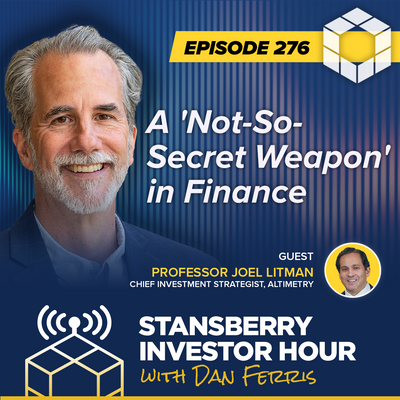
A 'Not-So-Secret Weapon' in Finance
<p>It has been just over two years since his last <em>Stansberry Investor Hour</em> appearance...</p> <p>So today, we're honored to have Professor Joel Litman, Altimetry's chief investment strategist and founder, back on the show.</p> <p>Joel's resume boasts top honors and achievements in finance and education. He's the president and CEO of Valens Research, chair of the Uniform Adjusted Financial Reporting Standards (or "Uniform Accounting") Advisory Council, a member of the Association of Certified Fraud Examiners, a certified public accountant, and a board member of a leading brokerage firm in Asia.</p> <p>He's also a professor at Hult International Business School's top-ranked international MBA program and has taught at business schools worldwide – like Harvard Business School, the London Business School, and Shanghai Advanced Institute of Finance.</p> <p>Joel's uncanny intuition is well-known in the world of finance... He called the 2008 crash and even accurately timed 2020's market bottom. And he starts today's episode by sharing one of his tools for success...</p> <p style="padding-left: 40px;">Understanding corporate credit and national country credit is the canary in the coal mine of any major equity bear market in history...</p> <p style="padding-left: 40px;">You always see corporate credit crises at the beginning of any massive long-term bear market.</p> <p> </p> <p>Each month, Joel and his team apply Uniform Accounting to fix thousands of errors in companies' financial statements. This proprietary analysis gives investors the real story behind a company... and a clearer picture of its true profitability.</p> <p>Joel's talent and passion for teaching shine as he breaks down the complicated topic of earnings reports' accounting standards. Plus, he and Dan discuss the current state of U.S. corporate credit, searching for the "perfect stock," the future of the dollar, and more.</p>
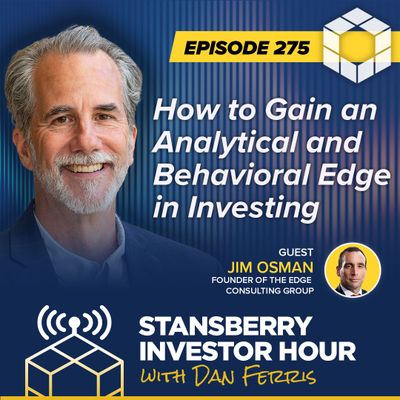
How To Gain an Analytical and Behavioral Edge in Investing
<p>For this week's <em>Investor Hour</em>, we're proud to bring you Jim Osman, founder and chief vision officer of consulting group The Edge.</p> <p>A 30-year veteran of the markets and portfolio management, Jim founded The Edge in 2005. Currently headquartered in New York City and his native country of England, the firm provides actionable (and market-beating) research to institutional and individual investors. In addition to overseeing The Edge, Jim regularly contributes to the hedge funds and private-equity division at <em>Forbes</em>. He has also written for other big names in financial publications like <em>Barron's</em>, the <em>Wall Street Journal</em>, and Bloomberg.</p> <p>At The Edge, he helps his clients uncover profitable investing opportunities by helping them hone both an analytical and a behavioral edge in investing...</p> <p>On the analytical side, he focuses on special situations, which he defines as "unusual or atypical" events that drive stock prices. These catalysts can be external or internal. Spinoffs, in particular, are a great source of value plays, and Jim shares how he invests in them on the show.</p> <p>On the behavioral side, Jim highlights that emotional investing and fear of missing out can be costly. But he says that by understanding your risk, there's a way to manage your emotions...</p> <p>[It's] not even [about] 'curb the emotion,' because we all are emotional creatures. It's whether you can <em>recognize</em> it... You can recognize your emotion and handle that. Then your actual thesis will play out.</p> <p>In today's interview, Jim takes a deep dive into managing risk analytically and behaviorally... and why he considers it the ultimate solution to investment success.</p>
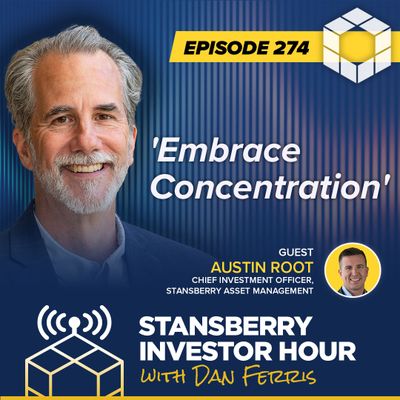
'Embrace Concentration'
<p>This week, we're excited to welcome back a familiar voice to <em>Investor Hour</em>: Austin Root, the chief investment officer of Stansberry Asset Management ("SAM"). </p> <p>It has been more than two years since Austin's last conversation with Dan. During that time, Austin left behind a storied career at Stansberry Research – as the director of research, director of corporate development, and the editor and portfolio manager of Portfolio Solutions – to join SAM, where he develops and manages investment strategies across all portfolios.</p> <p>This year, investors have had to contend with a turbulent market. But Austin has done a stellar job of helping SAM clients navigate – and even outperform – these choppy markets. He shares some of his unusual strategies in today's interview but says his job isn't just about maintaining a great stock-picking record. Rather, it's about drilling down these "mission critical" basics that every investor should incorporate into their portfolio... </p> <blockquote> <p>Performing well is not just about identifying great stocks. More important than picking the stocks themselves is asset allocation, risk management, position sizing. These are all mission-critical aspects to investment success.</p> </blockquote> <p> Also in this week's interview, Austin recounts what it was like to work with some of the investment world's biggest celebrities – like Steve Cohen, Julian Robertson, and George Soros. Plus, he shares the top four qualities that he looks for in investments, his favorite book on value versus growth investing, and more.</p>
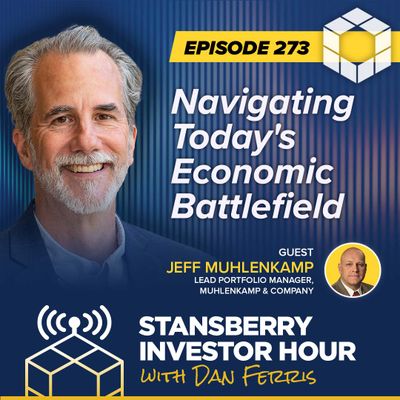
Navigating Today's Economic Battlefield
<p>This week's guest, Jeff Muhlenkamp – the lead portfolio manager of financial planner Muhlenkamp & Company – got a unique start in investing...</p> <p>Jeff's background is impressive – 20 years of service in the U.S. Army, a Bachelor of Science in electrical engineering, a master's degree in organizational leadership, and a Chartered Financial Analyst designation. As a result, he brings the perfect blend of discipline, analytical prowess, and leadership to portfolio management.</p> <p>Jeff's foray into investing shows just how resourceful he is... Back in 1988, when his father ran Muhlenkamp & Company, Jeff made his first investment there. He came up with the money by applying for a military car loan... then shrewdly using only a small portion to buy the cheapest car he could find and dedicating the remainder to launch a new career in investing. </p> <p>Today, Jeff prefers a measured, bottom-up approach when screening for opportunities. (One of his metrics happens to be in Dan's list of "Five Essential Financial Clues.") But he knows a well-rounded investor can't discount top-down considerations as well, like the No. 1 macroeconomic factor for U.S. investors to understand right now and the importance of market-cycle dynamics. </p> <p>And for his answer to Dan's "Final Question," Jeff leaves listeners with stunningly practical advice...</p> <p style="text-align: left; padding-left: 40px;">Don't risk money you can't afford to lose... At an individual level, where your decision-making starts is: <em>How much do you make? How much do you spend? Are you saving money? And for what purpose?</em></p> <p>Those sorts of strategic decisions in your life are going to be much more important than the kind of decisions you'll hear analysts and financial planners talk about.</p>
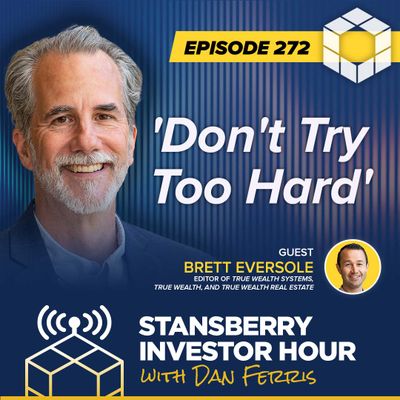
'Don't Try Too Hard'
<p><span data-preserver-spaces="true">We're excited to bring on a brand-new</span><em><span data-preserver-spaces= "true"> Stansberry Investor Hour</span></em><span data-preserver-spaces="true"> guest this week – a name that Stansberry Research readers will undoubtedly recognize: Brett Eversole...</span></p> <p><span data-preserver-spaces="true">After working with Stansberry Research heavyweight Dr. Steve Sjuggerud for more than a decade, Brett is now the lead analyst for Steve's suite of publications. In </span><em><span data-preserver-spaces="true">True Wealth</span></em><span data-preserver-spaces="true">, Brett and his team help their readers uncover safe, alternative investments that are overlooked by Wall Street. In </span><em><span data-preserver-spaces="true">True Wealth Systems</span></em><span data-preserver-spaces="true">, they use advanced, proprietary software to amplify investor returns in every corner of the market.</span></p> <p><span data-preserver-spaces="true">And in </span><em><span data-preserver-spaces="true">True Wealth Real Estate</span></em><span data-preserver-spaces="true">, they scour the market for deals that combine the power of investing directly in private real estate with the ease of profiting from housing stocks. That's where Brett and Dan start this week's interview...</span></p> <p><span data-preserver-spaces="true">A slew of new data released just last week confirms that the housing sector is in a worsening tailspin. But as a contrarian, Brett says the masses have mistakenly "over extrapolated" this cooldown and that we're not, despite popular belief, in a 2000s-style bubble that's headed for a bust.</span></p> <p><span data-preserver-spaces="true">Housing is like water – it's at the bottom of Maslow's hierarchy of needs... Nobody panic-sells their house.</span></p> <p><span data-preserver-spaces="true">He explains why today's reality is far different from what most folks fear and that with the right data and analysis, you can even uncover ways to profit in the housing sector today.</span></p> <p><span data-preserver-spaces="true">As for the driving force behind this slowdown, inflation is another topic that Brett and Dan tackle. They discuss its history (like the "guns and butter" era Dan lived through), their outlook on interest rates, and the Federal Reserve "pivot" narrative.</span></p> <p><span data-preserver-spaces="true">Finally, you'll hear about a shared musical hobby between the two and how it intersects with finance. And Brett leaves listeners with advice on how to work smarter – and not harder – with tips on developing effective work habits.</span></p>
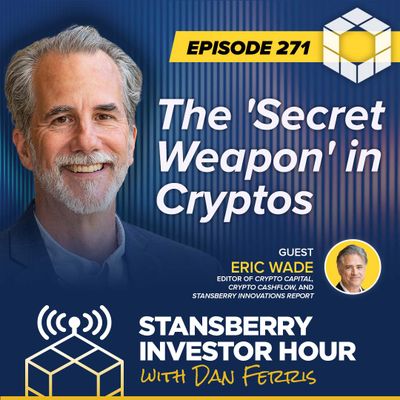
The 'Secret Weapon' in Cryptos
<p>This week, Dan welcomes back an <em>Investor Hour</em> favorite... Stansberry Research's resident cryptocurrency expert Eric Wade.</p> <p>Eric is the editor of <em>Crypto Capital</em>, <em>Crypto Cashflow</em>, and the <em>Stansberry Innovations Report</em>. Before joining Stansberry, he was a successful investor, Internet entrepreneur, founder of an internationally renowned business, and a movie scriptwriter. His passion for cryptos started with mining bitcoin and Ethereum before moving on to other strategies within the sector that raked in multiple double-digit winners.</p> <p>As Eric tells Dan, it's undeniable that we're in a crypto bear market, and there are "no bailouts, no mulligans, no do-overs" for this volatile, sometimes-unforgiving industry. But even amid the current "crypto winter," he has uncovered winning trades for his readers that boast double- and triple-digit yields...</p> <p>"We look for the source of the yield. And what surprises a lot of people is that we're in a world where most of us expect that most yield comes from being the other side of someone else's transactions, someone else's debt... But in the crypto space, we've managed to monetize that..."</p> <p>"Some of your yields can come from other people's mistakes. And that monetization, to me, that's what the blockchain/crypto industry has as a secret weapon. Any strategy or tactic that anybody has deployed in the financial industry – you can monetize it now."</p> <p>On the show, Eric and Dan discuss this secret weapon and the unlikely places you can use it.</p> <p>He also shares a quick lesson on crypto basics using easy-to-understand analogies for listeners who are new to crypto. He delves into Ethereum's potential future as a global currency rivaling the U.S. dollar. And he challenges our host to a <em>spirited</em> discussion surrounding Dan's long-held belief that crypto is just "speculative technology" that "doesn't feel like a currency or a store of value." (Spoiler: Eric says Dan is dead wrong.)</p>
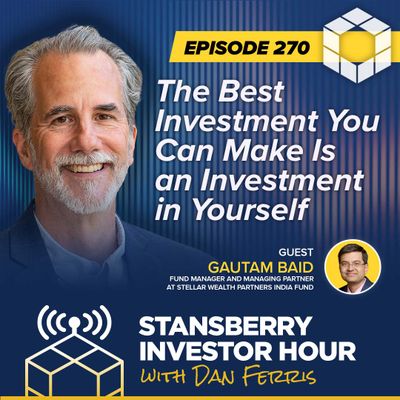
The Best Investment You Can Make Is an Investment in Yourself
<p>This week, we're honored to bring you the inspiring tale of Gautam Baid...</p> <p>When Gautam first immigrated from India to the U.S. in 2015, he made ends meet by working a grueling graveyard shift as a hotel clerk. The nights were slow and long and monotonous. So Gautam passed the time by investing in himself. He voraciously read every finance and investment book he could get his hands on. As he tells Dan...</p> <p style="padding-left: 40px;">Even though it was a big challenge for me intellectually, physically, culturally, and emotionally, today, in hindsight, I highly value those days of my life because for the first time... I finally got some time for myself to read and learn...</p> <p style="padding-left: 40px;">This was the phase in my life during which I was about to realize the power of compounding knowledge.</p> <p>Gautam used this knowledge to build an "intellectual foundation in investing." And in just a few years, he propelled himself from minimum-wage night shifts to a CFA charterholder, an internationally bestselling author, a feature in Morningstar Research's Learn From the Masters series, and the founder of his own investment firm, Stellar Wealth Partners India Fund. </p> <p style="padding-left: 40px;">In this week's episode of the <em>Stansberry Investor Hour</em>, Gautam and Dan discuss his unique definition of value investing, his No. 1 strategy that works across different market cycles and macroeconomic environments, the one time he received praise directly from the Oracle of Omaha himself, and the fundamental power of investing in yourself...</p> <p style="padding-left: 40px;">The body is limited in ways that the mind is not. By the time most people are 40 years old, their bodies begin to deteriorate. But there is no limit to the amount of growth and development that the mind can sustain. Reading keeps our minds alive and growing... Books are truly life-changing.</p>
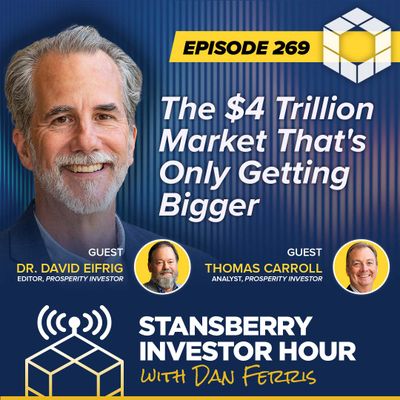
The $4 Trillion Market That's Only Getting Bigger
<p>This week, for the first time ever, Dan is featuring <em>two</em> guests on the show. Regular <em>Investor Hour</em> listeners should instantly recognize their names... Dr. David "Doc" Eifrig and Thomas Carroll. </p> <p>Doc is an MBA, former Wall Street trader, published author, <em>and</em> medical doctor. (Plus, he even owns a winery.) In the Stansberry Research universe, he's the editor of <em>Retirement Millionaire</em>, <em>Retirement Trader</em>, <em>Income Intelligence</em>, <em>Advanced Options</em>, and the <em>Health & Wealth Bulletin</em>.</p> <p> Tom was once named by <em>Fortune</em> magazine as the No. 1 health care analyst in the U.S. His research has been referenced by health care publications and institutional investors alike, along with CNBC, Bloomberg, and Fox Business. And Stansberry readers know him for his investment expertise in the emerging legal cannabis market.</p> <p>In today's interview, Tom says health care is the most promising and important economic sector of the market right now...</p> <p style="padding-left: 40px;">Some people think it's a boring sector to invest in, but I think it's paramount for every investor – for anyone who takes a self-directed or a primary interest in how they're investing their money. They have to know and have some exposure to health care. It's a $4 trillion market that's only getting bigger. It goes up each and every year. </p> <p>That's why he and Doc recently joined forces with John Engel – a former biochemist and one of Stansberry's resident biotechnology experts – to launch a new research product, <em>Prosperity Investor</em>.</p> <p>In this monthly advisory, the powerhouse team shares the best of the current industry stalwarts, next-generation medicine, emerging digital-health solutions, and much more.</p> <p>On the show, Doc and Tom also share some of the biggest trends in the space. You'll hear about advancements in telemedicine, breakthrough research in immunology, and navigating the complexities in managed care.</p> <p>Lastly, you won't want to miss the duo's final bit of advice for listeners... a nugget that Dan – once he removed his jaw from the floor – called "one of the best, most actionable answers ever given in the history of the show."</p>
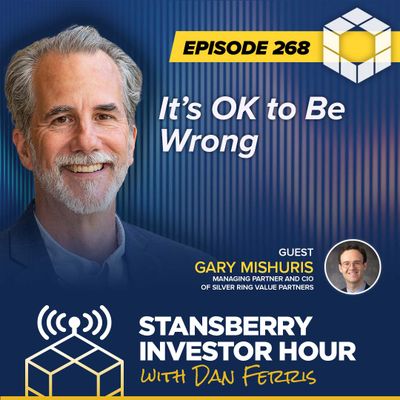
It's OK to Be Wrong
<p>This week, Dan brings a fresh voice to the show: seasoned value investor Gary Mishuris. </p> <p>Gary is currently the managing partner and chief investment officer of Silver Ring Value Partners, an investment firm that focuses on long-term intrinsic value investing. He has more than two decades of portfolio and asset-management experience plus degrees in computer science and economics from the Massachusetts Institute of Technology ("MIT")... which is where he received the advice that shaped his career.</p> <p>Gary used to make rookie investor mistakes – like losing his shirt after putting all his money into a hot stock that tanked. But when Warren Buffett came to speak at Gary's alma mater, his words put the ambitious young man on a path to learn value investing instead of "gambling around with tech stocks."</p> <p>Today, Gary has his own priceless advice to share with our listeners, such as keeping a well-diversified and allocated portfolio. He warns against blindly chasing the price action and stubbornly allocating half of one's portfolio to the biggest position... </p> <p style="padding-left: 40px;">I would say the goal there is to make sure that no one position can really sink the ship... It's good to have conviction, but you need to make sure that your process over time – which drives the outcome – is not in any one position.</p> <p>But having conviction isn't entirely a terrible thing. As he explains, it's all about maintaining the "delicate balance"... </p> <p style="padding-left: 40px;">You have to be sufficiently flexible to adjust to the reality of the changes but have sufficient conviction... [so] you don't fall to the market's pressure.</p> <p>During their conversation, Dan and Gary delve deep into the common psychological pitfalls that can come with investing. Gary also discusses the importance of exercising caution by playing "behavioral defense" amid a sea of folks who too often rely on "behavioral offense." He even shares his proprietary "thesis tracker" – a unique way to evaluate the performance of every investment in your portfolio.</p> <p> Finally, Gary leaves us with the No. 1 trait he says every investor should have: humility...</p> <p style="padding-left: 40px;">You want to be humble in this business... Base your approach on humility and then work really hard from a position that you can be wrong a lot, and then build that being wrong into everything.</p>
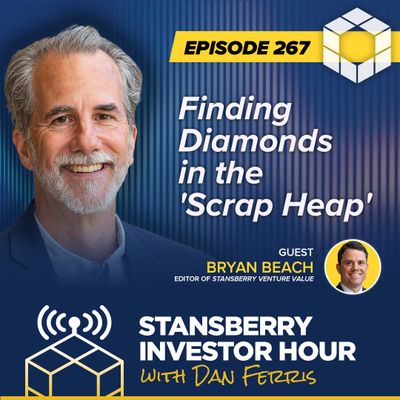
Finding Diamonds in the 'Scrap Heap'
<p>This week, Dan welcomes a guest who he describes as "my style of investor"... <em>Stansberry Venture Value</em> editor Bryan Beach.</p> <p>In his newsletter, Bryan hunts for gems in the beaten-down, hated microcap sector of the market. And no one does it better than Bryan... Thanks to years of creating and auditing financial reports for the "Big Four" and software companies, he has honed his talent for uncovering opportunities within the dense terrain of Securities and Exchange Commission ("SEC") filings.</p> <p>Dan and Bryan delve into a conversation about special purpose acquisition companies ("SPACs") – a topic Bryan has been covering well before the 2021 bubble popped. And he has dug deep into the "SPAC scrap heap" to uncover a few diamonds in the rough, naming a few businesses on his radar, too.</p> <p>Bryan also discusses another overvalued group of stocks that's a favorite of his – Software as a Service. Then, he scrutinizes the housing market, and Dan shares his "macro" point of view on the matter.</p> <p> Finally, Bryan urges listeners to keep an open mind when investing... and to not readily dismiss the speculative side of the market...</p> <p> "I encourage our readers to be thinking about all parts of their port. There's a time to go deep in microcaps and there's a time to avoid them altogether. And everyone's situation is a little bit different. That's what I think is important...</p> <p> Pull up and look down at your portfolio. Get out of the weeds and look down at your whole portfolio... There's some part of the market that you haven't thought about in a while that you probably should think about again."</p>
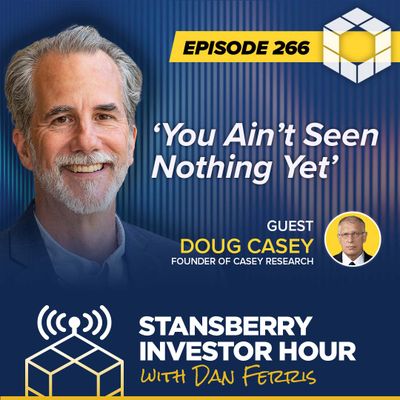
'You Ain't Seen Nothing Yet'
<p>Today's guest last joined Dan at the <em>Investor Hour</em> table when the world was in the throes of a newly declared pandemic. This time, he visits us amid rampant inflation... a newly declared bear market... and likely a nascent recession.</p> <p>Doug is the founder of Casey Research and a prolific writer with several highly acclaimed books under his belt. His financial book <em>Crisis Investing</em> was a <em>New York Times</em> No. 1 bestseller for weeks, dethroning the works of heavyweights such as economist Milton Friedman, former President Richard Nixon, and astronomer Carl Sagan.</p> <p>Doug isn't afraid to let loose on controversial topics like the Second Amendment and the police. And he doesn't mince words when it comes to Uncle Sam... </p> <p style="padding-left: 40px;">I despise politics... Politics is actually institutionalized coercion. It's all about the government and who runs it. The government is an entity that holds a gun to your head – subtly or overtly – and tells you to do what you're told.</p> <p style="padding-left: 40px;">Increasingly, American life is revolving around the state, the government, and what it does... That's putting people at odds with each other. </p> <p>Thanks to Big Brother's excessive intervention throughout the years, Doug says, "The entire country has been greatly over-financialized... It's all going to come crashing down." He decries the U.S. Federal Reserve's heavy-handed plays and longs for a "stable, capitalist free market society."</p> <p>And as for Dan's customary Final Question, Doug says rather than an "instant cosmic breakthrough," he'd like to leave listeners with a short-but-sweet, positive affirmation...</p> <p style="padding-left: 40px;">Don't sweat the small stuff... Just try to live an ethical life. Try to be happy, try to be mellow, and things will take care of themselves.</p>
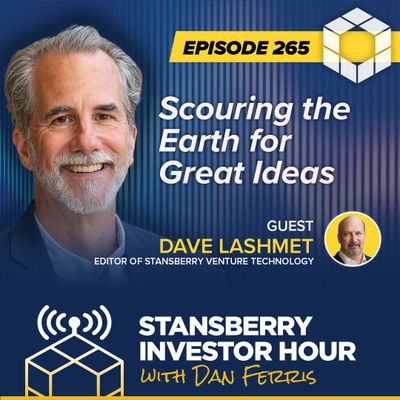
Scouring the Earth for Great Ideas
<p>This week, Dan introduces a brand-new guest to <em>Stansberry Investor Hour</em>... But he's no stranger to Stansberry Research.</p> <p>Dave Lashmet, colleague and editor of <em>Stansberry Venture Technology</em>, joins Dan for a fast-paced talk on innovation, technology, and, of course, investing. His <em>Venture Technology</em> service uses a "venture capitalist" investing approach and focuses on biotechnology firms. And according to Dan, Dave is "well known as a man who scours the Earth for great ideas," thanks to his boots-on-the-ground research and networking at countless conferences and meetings.</p> <p>The two dive into Stansberry Research's history – including how founder Porter Stansberry actually hired Dave after meeting him in college... where Dave was Porter's professor. And Dave also regales Dan with tales of his former job as a self-described "mix between an engineer and a businessperson inside a tech company."</p> <p>Dan also commends Dave for his recent recommendation to <em>Venture Technology</em> subscribers to sell their remaining stake in Nvidia (NVDA) for an eye-popping 1,400% return. And Dave gives an in-depth analysis of the biggest risks to the company, ranging from overseas geopolitical tensions to direct competitors like Intel (INTC). </p> <p>He also offers insights on the dichotomy between venture capitalists and "angel investors" and reveals exactly what he looks for in a company. Finally, he shares what investors should watch out for when researching prospective portfolio candidates.</p>
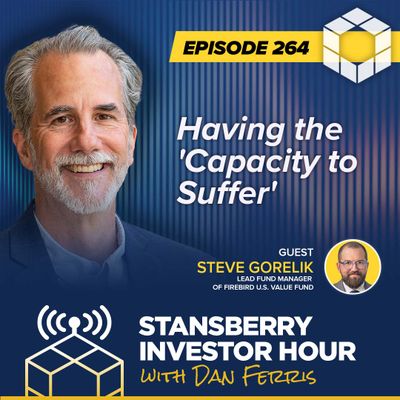
Having the 'Capacity to Suffer'
<p>Today, Dan welcomes first-time <em>Investor Hour</em> guest Steve Gorelik to the show. A 15-plus-year veteran of Firebird Management, Steve currently manages the Firebird U.S. Value Fund. And as a native Belarusian, there's no one better suited to manage Firebird's Eastern Europe and Russia funds as well. </p> <p>The big question Dan asks Steve is how he has been handling the funds amid the Russia-Ukraine war. Steve shares his thoughts on Russia's investment prospects and the ruble's volatility. And he explains that, surprisingly, many Eastern European companies present very robust investment opportunities – as long as the countries' macroeconomics look good. </p> <p>When it comes to doing the legwork on researching a prospective addition to your portfolio, Steve emphasizes that you shouldn't just look at how a company makes money... Seeing how a company <em>spends</em> its money is critically important, too. He also delves into the prospect he sees in a particular type of financial company. And finally, according to Steve, every investor should aim to hone this invaluable trait, especially in today's tumultuous market...</p> <p style="padding-left: 40px;">The number of people who are able to hold through a year like 2022... and then be afraid to get back into the market when things are bottomed out... it's the capacity to suffer. It's the capacity to take a loss and not be afraid of what's happening. It's the capacity of being able to do the hard thing and get rewarded for it because other people won't. And that's going to be a competitive advantage both in investing... and in life.</p>
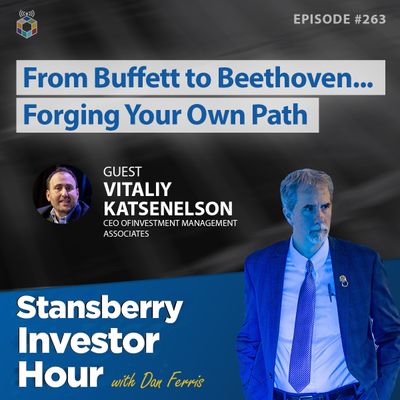
From Buffett to Beethoven... Forging Your Own Path
<p>We're now in a bear market... But today's <em>Stansberry Investor Hour</em> episode won't focus on that.</p> <p>Instead, Dan has a unique guest whose rousing words will be a respite from the recent market carnage. </p> <p>Vitaliy Katsenelson is the CEO of value-investing firm Investment Management Associates. He's the author of two books and an award-winning writer featured in publications like the <em>Financial Times</em> and <em>Barron's</em>. However, Vitaliy describes himself as a "student of life." And he has just released his third book, called <em>Soul in the Game: The Art of a Meaningful Life</em>.</p> <p>As a classical-music lover, Vitaliy had a revelation when writing about the travails faced by some of his favorite composers during their own creative processes – from being compared with a former great to pioneering a piece that broke the rules. It's about learning how to push past the anxiety and forge your own path in life and investing...</p> <p style="padding-left: 40px;">In any profession, there's always going to be somebody who's considered to be the "greatest" whatever... It's so easy for us to just copy Warren Buffett. Instead, what we should be doing is we should be looking at how Warren Buffett is thinking. Also, we should not be afraid to think on our own...</p> <p style="padding-left: 40px;">You can look at the way Buffett invests, and you can actually build your own path.</p> <p>The learning process can be complicated. But as Dan chimes in, "Things worth doing take time." He and Vitaliy also talk about the importance of repetition – whether it's rereading Nassim Taleb's book to unpeel its complicated layers or watching <em>Pulp Fiction</em> on repeat to understand the hype.</p> <p>In this episode, Vitaliy also shares concepts from <em>Soul in the Game</em>, such as striking the right balance between art and craft in life. And he gives what might be the shortest answer ever (just two words!) to Dan's "Final Question."</p>
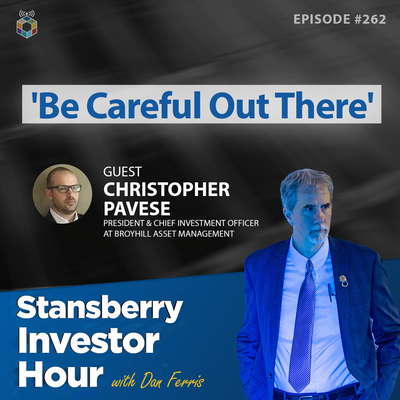
Be Careful Out There
Today, we welcome Broyhill Asset Management President and Chief Investment Officer Chris Pavese to the <em>Stansberry Investor Hour</em>. <p>It has been three years since Dan and Chris last spoke on our show. And needless to say, a lot has changed in the markets and the world since then – including a pandemic, war, and economic turmoil. As a seasoned industry veteran who has guided his clients through previous cataclysmic financial events, Chris has some advice to offer novice investors...</p> <p> </p> <p>He explains the big mistake fledgling investors make is "chasing the most spectacular returns" and looking for advice from people or places that "put up great numbers in bull markets" while ignoring their performance during bear markets. After all, he says, "The most spectacular returns of 2021 are posting the most spectacular losses this year."</p> <p> </p> <p>Chris and Dan both agree that focusing on finding value in a market environment like this one is your best bet. That's the kind of research Chris' firm Broyhill specializes in... like examining big mergers and acquisitions to look for gems and breezing past airline stocks – which Chris describes as "notoriously awful businesses with notoriously awful balance sheets" – in favor of an overlooked sector right next door.</p> <p>Finally, Chris imparts some wisdom regarding investor behavior thanks to his many years of advising clients – including the psychology around the big topic of "when to sell." And he shares the one simple and absolutely essential, yet often overlooked, thing to do before investing in any public company.</p> <p style="padding-left: 40px;">As human beings, we always do the opposite of what we should be doing. We're always buying when we should be selling – when the stock has gone down. And we're selling when the stock has gone up... That's the time to lock yourself in and ride that wave to make as much profit as possible.</p> <p>Keith uses the company's software during the episode to give a rundown of the best and worst sectors to be in right now, as well as several market big dogs. He also shares the No. 1 metric that investors should home in on when researching recession-proof companies.</p> <p>And he regales Dan with tales of how much hate mail TradeSmith received when it warned subscribers early of the major market slumps in 2020 and 2022 (which, of course, came true).</p>
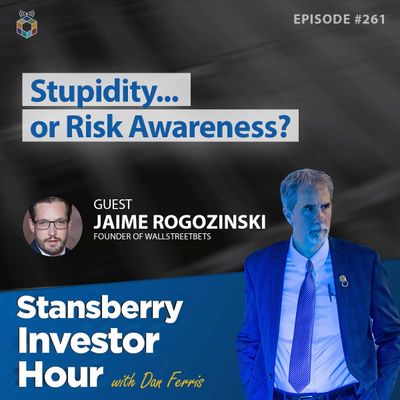
Stupidity... or Risk Awareness?
<p>Yes, they've gotten a lot of flak. But could there be something more to the "meme-stock mania" crowd? </p> <p>In this week's <em>Investor Hour</em> episode, host Dan Ferris welcomes WallStreetBets founder Jaime Rogozinski back to the show.</p> <p>WallStreetBets is an infamous forum on social media site Reddit. The online community came to public attention in early 2021 when its denizens – often viewed as young, uneducated, and risk-hungry investors – crippled hedge funds by pumping up undeserving "dead stocks" like AMC Entertainment (AMC) and GameStop (GME).</p> <p>In this week's interview, Jaime gives his eye-opening perspective on the 2021 mania, saying there's more to the story than the negative picture painted by the media...</p> <p style="padding-left: 40px;">It's a sophisticated way of doing risk awareness. But it's a conduit for people that start off in a risk-hungry environment and eventually move into a more responsible, traditional approach – but with a tremendous knowledge, I would say, even more so than the average person that starts off with lower-risk approaches.</p> <p>Jaime also shares what he has learned about investor behavior from watching the action play out across the Reddit board...</p> <p style="padding-left: 40px;">When people go into the market and start off with a bunch of wins, it is very dangerous. It's much more dangerous than if they start off by losing money. And the reason why is because it kind of speeds up the learning curve. Somebody that loses money right away is forced to take a step back, slow things down, understand a little bit better, and not be so impulsive. Somebody that makes money without knowing what they're doing goes through these, kind of like, Dunning-Kruger effects... which basically is a way of saying people don't have the ability to measure their own abilities.</p> <p> He assuages Dan's curiosity on whether anyone from WallStreetBets has ever blamed him for their losses. And he shares stories of even meeting some of the members. Plus, Jaime's simple but sage answer to Dan's <em>Investor Hour</em>-standard "Final Question" will resound in your investing... and in your life.</p>
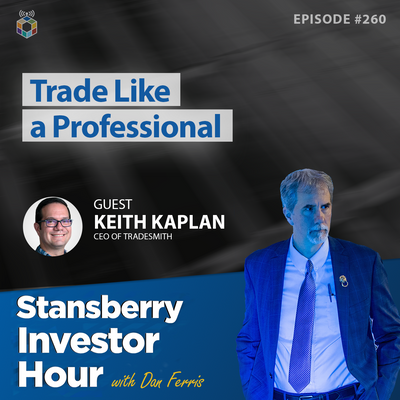
Trade Like a Professional
On the heels of last week's special bear market presentation comes the perfect guest for today's episode: <em>Investor Hour</em> veteran, software architect, and CEO of portfolio-tracking service TradeSmith Keith Kaplan. <p>As the threat of a recession looms, hunting for "forever businesses" while pruning portfolio losers at the right moment becomes critical for individual investors. The process can be overwhelming on your own. But TradeSmith's elegantly built trading software – the backbone of a product suite that offers everything from portfolio creation to management – distills all that complicated information into a simple, intuitive system. It's similar to what the professionals use, but it's engineered for the retail investor. </p> <p>In this week's interview, Keith explains how his company's proprietary technology strives to make investing less daunting, using easy-to-understand "stoplight system" volatility indicators and smart trailing stop alerts. After all...</p> <p>As human beings, we always do the opposite of what we should be doing. We're always buying when we should be selling – when the stock has gone down. And we're selling when the stock has gone up... That's the time to lock yourself in and ride that wave to make as much profit as possible. </p> <p>Keith uses the company's software during the episode to give a rundown of the best and worst sectors to be in right now, as well as several market big dogs. He also shares the No. 1 metric that investors should home in on when researching recession-proof companies.</p> <p>And he regales Dan with tales of how much hate mail TradeSmith received when it warned subscribers early of the major market slumps in 2020 and 2022 (which, of course, came true).</p>
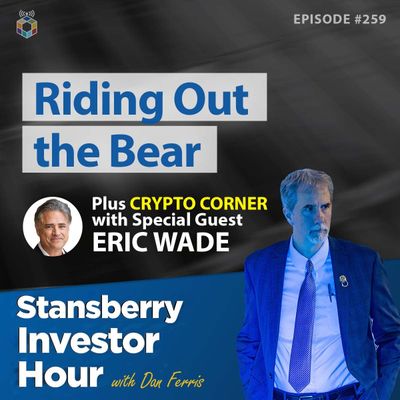
Riding Out the Bear
<p>In this week's Investor Hour, Dan's going solo. Instead of the usual tête-à-tête with a guest (we'll return to this regularly scheduled format of our program next week, though), he wants to share something with his listeners that he recently hammered home in the Stansberry Digest...This is a bear market. I've been a fool not to think it. And I've been a fool not to say it to you. So let's consider that huge mistake fixed... I'll never make it again as long as I live. So for today's episode, Dan's coming straight to you, the listener, with his keen observations on the recent market action and his tips on what steps you can take to protect your portfolio. And to round out his assessment of today's bear market in equities, he's bringing on fellow colleague and resident cryptocurrency expert Eric Wade for a special commentary on the bear market in cryptos.</p>
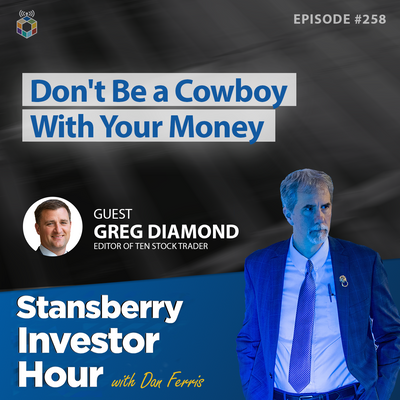
Don't Be a Cowboy With Your Money
258 <p>While this year has presented a difficult trading environment for everyone so far, Greg's <em>Ten Stock Trader</em> advisory has been making a killing. Its win rate stems from Greg's expertise in technical analysis – a strategy that relies on studying past market and human behavior to predict what's next. With nearly two decades of experience trading and managing multibillion-dollar portfolios across every asset class, Greg is well-versed in guiding his subscribers to profits... while also knowing when to sit back and be patient. </p> <p>But it's not just about technical analysis... Greg also underlines the importance of understanding the fundamentals of market behavior, inspired by his recent readings on legendary investor and trader Stanley Druckenmiller...</p> <p>At the end of the day, follow the Fed. What's the Fed doing? Are they opening the spigot and releasing cash into the market? Or are they not?</p> <p>So, what's Greg's secret to surviving – and thriving – in this rocky market while everyone else gets "whipsawed"?</p> <p>Greg says it all boils down to making sure you have two crucial items in your trading toolkit, both of which have led his readers to consistently make money, regardless of what the market is doing. And he explains why he believes the popular notion of checking your emotions at the door before investing or trading is actually a misconception.</p>
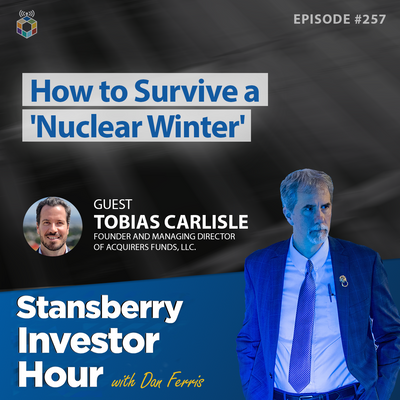
How to Survive a 'Nuclear Winter'
In today's dismal market, value stocks remain a beacon of hope for investors... And there's no one better suited to discuss this topic than recurring <em>Investor Hour</em> favorite, Tobias Carlisle. Tobias is the founder and managing director of deep-value investment firm Acquirers Funds, which is centered around his trademarked valuation tool – the Acquirer's Multiple. Simply put, it's a "valuation ratio used to find attractive takeover candidates"... and is favored by many activists and buyout firms. On top of creating a proprietary metric, Tobias has also written several books, including <em>The Acquirer's Multiple</em>, <em>Concentrated Investing</em>, <em>Deep Value</em>, and <em>Quantitative</em> <em>Value</em>. <p>So, what does Tobias have to say about the slump we're in?</p> <p style="padding-left: 40px;">It's not really a question of where you think the market's going to go because you're invariably going to be wrong... The best return you're going to get is by being fully invested.</p> <p>He says "names that can survive a nuclear winter" are the keys to surviving this bear market. To Tobias, that means focusing on deeply undervalued companies – ones that are buying back shares, are cheap, and are growing at a reasonable pace. He also breaks down the art of valuation – including his Acquirer's Multiple measure – and how to identify the right time to buy or sell.</p>
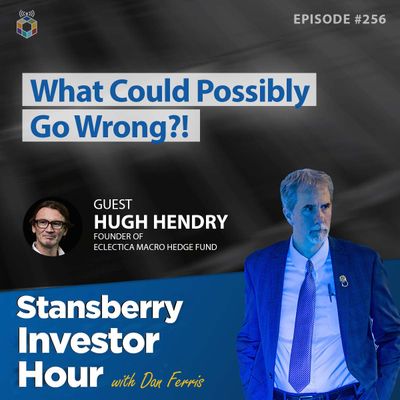
What Could Possibly Go Wrong?!
In this week's episode, returning guest Hugh Hendry joins Dan for another round at the <em>Stansberry Investor Hour</em> table... <p>Hugh founded the now-defunct Eclectica Asset Management in 2005. He rose to fame as the "Scottish hedge-fund king" when his fund returned 30%-plus during the throes of the financial crisis. He's also well-known for his outspoken remarks and contrarian views. One time, he even duked it out with a Nobel Prize-winning economist on television, asking, "Um, hello? Can I tell you about the real world?"</p> <p> These days, Hugh entertains a wide audience with his wit and energetic market commentary in his podcast, <em>The Acid Capitalist</em>.</p> <p>Today's conversation begins with a bang, as Dan and Hugh tackle one of the biggest market headlines: the stock sell-off. Shares of "FAANG" giants like Netflix, Amazon, and Apple are tanking... And it's hard to see these behemoths – which were once among the best-performing tech companies in the world – as "risk free" businesses anymore. Instead, they could herald a recession. So, what does Hugh have to say on the matter?</p> <p>It's going to be really long, but it's going to be entertaining. Wear comfortable clothing. </p> <p>He and Dan chat about several other topics, including inflation's grim march, Bill Hwang's multibillion-dollar fraud indictment, the "malevolent shadow of the Federal Reserve" behind high prices in oil and mining industries, and bitcoin as a risk-on versus risk-off asset.</p> <p>No one is safe from Hugh's wisecracks – not even the ultrawealthy. In addition to financial topics, he shares his thoughts on Elon Musk's latest follies, the real reason Bill Gates and Jeff Bezos vacationed in St. Barts, and what he thinks of Johnny Depp's biggest purchase</p>
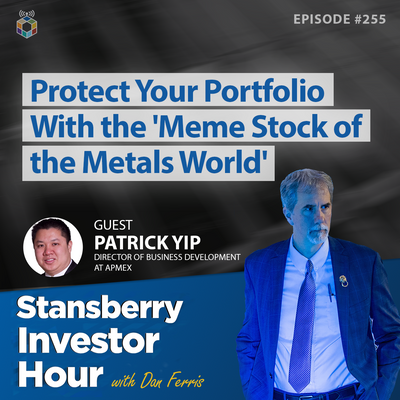
Protect Your Portfolio With the 'Meme Stock of the Metals World'
With inflation creeping higher and higher these days, now is the perfect time for this week's guest to make his <em>Stansberry Investor Hour</em> debut. <p>Patrick Yip is a precious metals expert. He's the director of business development at APMEX, one of the largest online precious metals retailers in the U.S., as well as the manager of OneGold, APMEX's innovative investment platform for vaulted positions in gold, silver, and platinum.</p> <p>And he says that in a market fraught with uncertainty like we're seeing today, it's especially important for conservative and speculative investors alike to consider adding precious metals to their portfolios...</p> <p>If history repeats itself, inflation at its current rate could erode half of your wealth in nine years. No one knows what the future is going to give us. But if history repeats, precious metals are going to protect your wealth and maybe even increase your wealth.</p> <p>Gold, he says, is perfect for those seeking extra portfolio protection during periods of high inflation. If metals rally like they did during the inflationary cycles of the 1960s and '70s, investors could see gold hit $5,000 in the next few years. That's more than 150% higher than today's prices.</p> <p>And silver – what Dan teasingly calls the "meme stock of the metals world" – offers equal opportunity for investors willing to stomach a little more volatility. Right now, silver premiums are sky-high. But as Patrick discusses, it all boils down to simple supply-and-demand economics...</p> <p>He walks listeners through each step of coin making's complicated process from mine to mint and pinpoints the exact spot in the supply chain that's "stressed the most" right now. And he unveils how his OneGold system offers a unique way to directly own silver while bypassing the high prices.</p> <p>Finally, Patrick touches on what Dan calls "the elephant in the room" – another popular (though, very different) asset – and how it holds up to gold and silver in one's portfolio.</p>
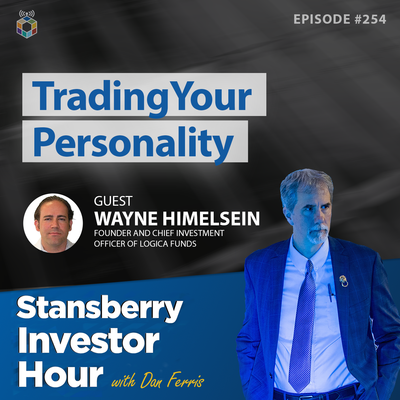
Trading Your Personality
In this week's episode, Dan Ferris is joined by the chief investment officer of Logica Capital Advisers, Wayne Himelsein. <p>Wayne founded the investment advisory firm in 2011. Throughout his 25-year career, he has developed and refined his quantitative-trading methods, risk, and portfolio-management processes. A self-proclaimed "quant trader," Wayne uses advanced mathematics to help identify moneymaking opportunities in both good times and bad.</p> <p>So in today's unforgiving market environment, he's a valuable guide for novice and veteran investors alike.</p> <p>When asked to define himself as an investor, Wayne emphasizes how investing should be thought of as "trading your personality." You should invest in a way that aligns with how you see and understand the world...</p> <p>What's funny to me is that people get really... rigorous about their view. If somebody, for example, is not very mathematical and they deeply believe in the fundamentals – understanding the company and talking to management and the whole other side of the world of investing – then I've seen, in that framework, them looking down on the quantitative side... like the two worlds have to be bifurcated...</p> <p>Everybody's entitled to be who they are and trade that way. You're going to do better being yourself... Why do you have to speak or look badly at the way other people choose to express their personality in the markets?</p> <p>Dan and Wayne dig deep into "familiar market signals," including how to best utilize them for your investing style. They also discuss the importance and influence of market bubbles, the pressures of news headlines on investing, and the need to explore and remain curious as a modern-day investor.</p>
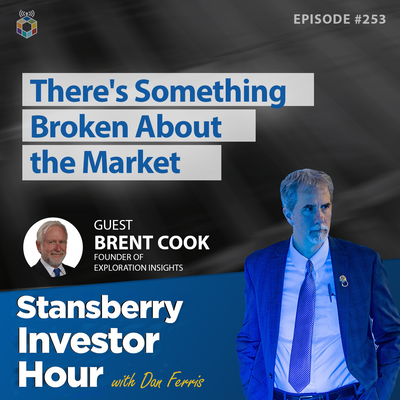
There's Something Broken About the Market
Metals and mining stocks are a hot topic right now. Global commodity prices continue to surge as the Russia-Ukraine conflict rages on... The U.S. is looking to ramp up domestic production of the minerals needed to produce electric-vehicle batteries... Even the "meme stock" crowd is jumping on board, recently pushing a previously unnoticed small metals miner up nearly 800%. <p>According to Dan, "There's something broken about the market." So this week on <em>Stansberry Investor Hour</em>, he invites seasoned geologist Brent Cook to break down the real opportunities in this highly complex industry.</p> <p>Over his storied career, Brent has worked in more than 60 countries consulting on proposed mine sites. His knowledge spans all areas of the mining business, from the conception stage to detailed technical and financial modeling for mine development and production. In 2008, he founded the popular <em>Exploration Insights</em> newsletter and helped develop what is now one of the most invaluable tools in the industry, the Drill Hole Interval Calculator.</p> <p>In other words, when Brent talks about mining and geology... we listen.</p> <p>On this week's episode, Brent offers four key tips for uncovering the greatest mining and exploration stocks and reveals how he personally avoids "red flag" companies. As he wryly puts it...</p> <p style="padding-left: 40px;">You can screen out a bunch. You can pick up [on] the bullsh*t. If you want to wash your hands after you've shaken, that's a bad sign.</p> <p>Mining, metals, and exploration companies can be extremely volatile and speculative. But they can also be rewarding for patient, long-term investors. So whether you've already tucked a junior miner away into your portfolio, you're eyeing a few metals companies, or you're just looking to get started, be sure to check out this week's episode.</p>
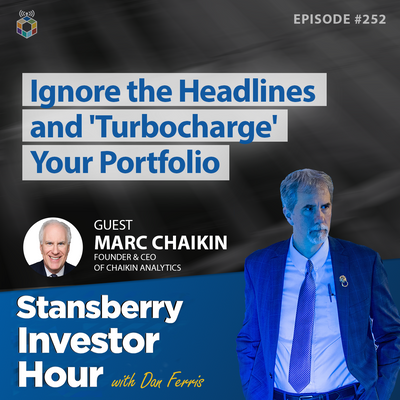
Ignore the Headlines and 'Turbocharge' Your Portfolio
<p>For this week's episode of <em>Stansberry Investor Hour</em>, Dan Ferris welcomes back powerhouse guest Marc Chaikin, the founder, and CEO of Chaikin Analytics.</p> <p>Marc is a 40-year Wall Street veteran who, more than a decade ago, developed a revolutionary investing tool called the Chaikin Power Gauge. It's an objective, quantitative system that simplifies the stock-picking process and levels the playing field between institutional and individual investors.</p> <p>This week, Marc also shares some interesting tidbits about the Power Gauge's history, including when he showed the Nasdaq how his tool could "turbocharge" its three core indexes to yield double-digit outperformance. And at Dan's request, Marc gives his outlook on investing in technology stocks, along with a tip on the one quantitative measure that he uses to pick out the "cash-flow cows" from all the beaten-down tech stocks that litter the market.</p>
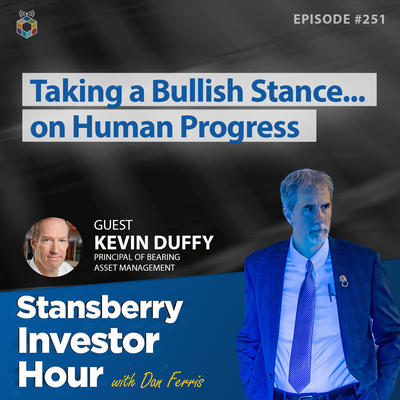
Taking a Bullish Stance... on Human Progress
In this week's interview, Kevin Duffy – who has been in the game for more than 40 years, from buying his first stock at age 13 to shorting heavyweights in the housing and credit bubbles –shares his unique perspective on today's investing atmosphere. <p><br /> He and Dan discuss everything from the stocks, commodities, and inflation concerns that are shaping today's financial environment to the cultural shifts caused by pandemic-accelerated digital revolution and Disney's employee walkout.</p>
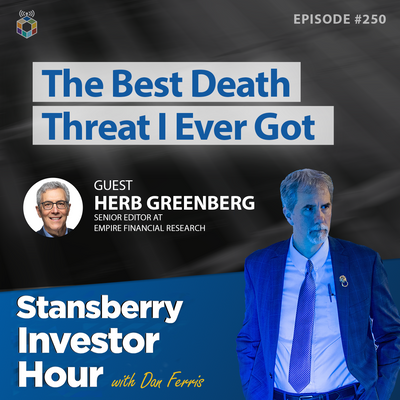
'The Best Death Threat I Ever Got'
<p>This week, Dan Ferris speaks with Herb Greenberg. A renowned investigative financial journalist and now the senior editor for Empire Financial Research, Herb has had a storied, 40-plus-year career in the financial markets. Herb discusses plans to launch a brand-new, long-only research service. He shares his process for empowering and educating the everyday investor, as well as what goes into researching the best companies for his readers. And in his answer to Dan's traditional Final Question, he describes one of the biggest changes he has made in his own life – a change that he urges all listeners to make as well: eliminate toxicity...</p>
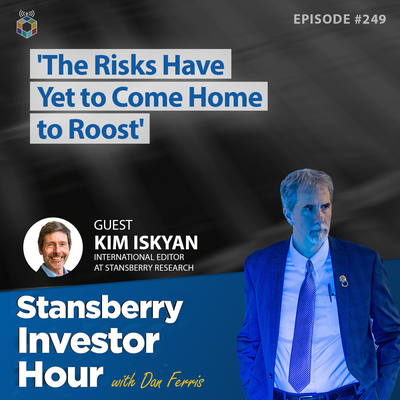
The Risks Have Yet to Come Home to Roost
In this week's episode of Stansberry Investor Hour, Dan dives right into discussing the biggest current crisis that has upended the global markets: the Russia-Ukraine war. And Dan's guest today is none other than Stansberry Research's international editor, Kim Iskyan. <p>There's no one better suited for the topic at hand than him. The two chat about everything from how Venezuela and Iran could benefit from Russia's isolation... to how China might even have "the chance to become the geopolitical soft power it wants to be"... and to how it all might play out for "the ultimate dictator," Russian President Vladimir Putin.</p> <p>Kim also shares two unique and pertinent investment ideas for these turbulent times</p>
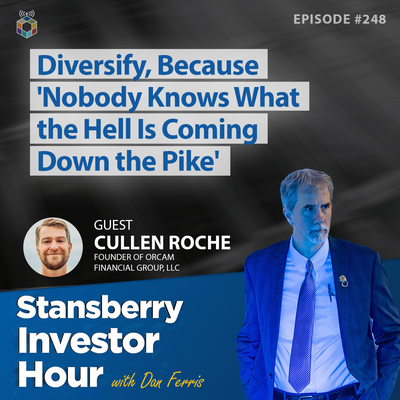
Diversify, Because 'Nobody Knows What the Hell Is Coming Down the Pike'
This week on Stansberry Investor Hour, Dan brings back Cullen Roche, one of his "favorite people to talk to," for a third interview. As the Fed readies to "tap the brakes" on its quantitative-easing programs, an unimaginably wide range of potential outcomes exists for the markets. However, one thing is certain: Years of volatility loom ahead. So for investors looking to build their own "all-weather" portfolios, Cullen shares some portfolio-designing tips – many of which are near and dear to Dan's heart.
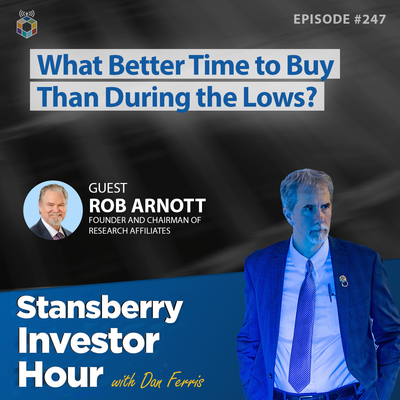
What Better Time to Buy Than During the Lows?
<p>In this week's episode of Stansberry Investor Hour, Dan speaks with Rob Arnott. When Rob talks, we listen. And right now, he's saying that the market cycle is turning from one predominated by growth to one predominated by value.</p> <p>That presents an exceptional opportunity for the patient contrarian value investor. Rob discusses his two "core investment principles" and his forecast for out-of-control inflation (including a few "inflation fighter" places to consider putting your money today).</p> <p>He also covers a proprietary definition of the term "bubble," what's going on with electric vehicles, the "best way to read the news," and much more.</p>
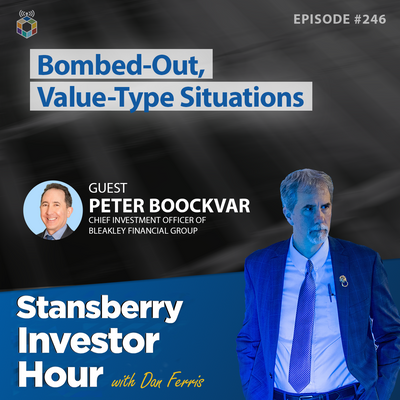
"Bombed-Out, Value-Type Situations"
<p>Today, Dan talks with Peter Boockvar, the chief investment officer of $8 billion wealth-management firm Bleakley Financial Group.</p> <p>As a top-down investor, Peter focuses on "bombed-out, value-type situations" that can be distilled into overarching investing themes.</p> <p>One of the big themes Peter sees right now is a global, unstoppable force of people wanting to break out of their pandemic bubbles and travel. That doesn't mean he's long airlines. In fact, he cautions against such proven, cyclical money pits... instead preferring alternative plays on the travel industry, like hotels, casinos, or online travel agencies. </p>
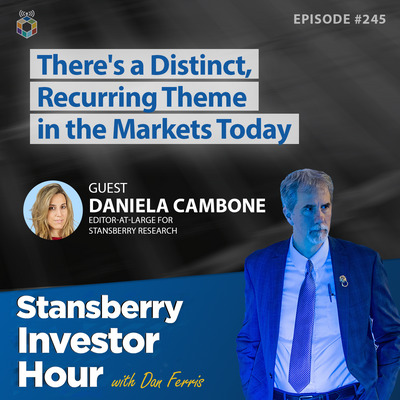
There's a Distinct, Recurring Theme in the Markets Today
<p class="p1">This week, Dan Ferris talks with veteran journalist and Stansberry Research Media Anchor Daniela Cambone</p> <p class="p1">Daniela has covered the financial markets for more than a decade. In that time, she has interviewed such high-profile figures as Congressman Newt Gingrich, Economic Advisor Stephen Moore, and investors like Mark Cuban, Jim Rogers, and Steve Forbes.</p> <p class="p1">And as she discusses on the show, her work has given her a truly unique perspective into the distinct, recurring themes that leading financial minds are seeing right now in inflation, hard assets, the stock market...</p> <p class="p1">At the current rate of 7%, inflation hasn't been this high since 1982. And Daniela suspects that, in actuality, inflation is "running way higher" than the U.S. Federal Reserve wants to admit.</p> <p class="p1">"I don't buy the 7% narrative at all," she says. "At one point, the Fed is going to have to act more aggressively [than they currently are if] they don't want the beast to get out of hand."</p> <p class="p1">In this kind of uncertain environment, Daniela encourages everyone to educate themselves and take control of their own financial freedom by holding assets unloved by the mainstream media... by focusing on long-term investing, gold-mining stocks, or crypto... and most importantly, by educating themselves.</p> <p class="p1">"We are in unprecedented times," she ends by saying. "Now, more than ever, you have to educate yourself. Don't count on the banking system or on whatever your neighbor's doing. Do it for yourself. Do it for your family. Do it for your legacy."</p>
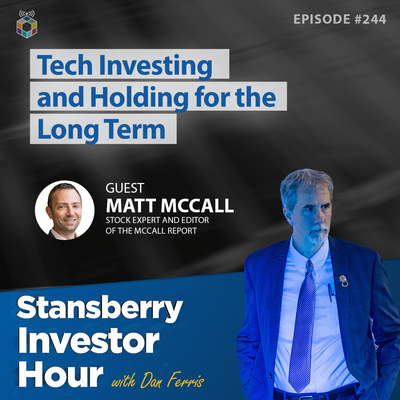
Tech Investing and Holding for the Long Term
<p>This week, Dan Ferris welcomes back to the show stock-picking expert Matt McCall<span style= "font-style: inherit !important; font-weight: inherit !important;"><a href="webextlink://This%20week,%20Dan%20Ferris%20welcomes%20back%20to%20the%20show%20stock-picking%20expert%20Matt%20McCall.">.</a> Matt has two decades of experience in finance and has made some incredible thousand-percent gains in his career.</span></p> <p>And because Matt believes in buying and holding for the long haul, this month's stomach-churning stock volatility didn't faze him... Matt says too often folks "hit the sell button too quickly... and panic selling doesn’t work in the long run."</p> <p>He reminds listeners that market corrections are natural and inevitable, and smart investors should use these pullbacks as opportunities to buy. Matt still believes in his Roaring 2020s thesis – that the coming decade will be the best years for investing that we've seen yet – but recessions and drawdowns are absolutely a part of it.</p> <p>Dan and Matt talk technology, one of Matt's cornerstone investing themes. He's still bullish on electric vehicles and Tesla, a company he calls a leader in the industry and sites the current downtrend in these stocks as a great time to get in.</p> <p>They also discuss 3D printing, something Matt is really excited about, and he says that "by the end of the decade, it could be a trillion-dollar industry." Almost every sector can utilize 3D printing – housing, automobiles, medicine, aerospace – and it's an area most investing folks aren’t even looking at yet.</p> <p>Matt joined Stansberry Research last year, and his subscribers have already achieved impressive gains. And he believes this 3D printing trend is a massive opportunity brewing beneath the surface right now, one that can help investors make a small fortune... projecting 1,000% long-term potential. <strong><a href= "https://orders.stansberryresearch.com/?cid=MKT598884&eid=MKT607472&step=start&plcid=PLC129159"> Click here for all the details and to find out how you can access his recommendations</a></strong>.</p> <p> </p>
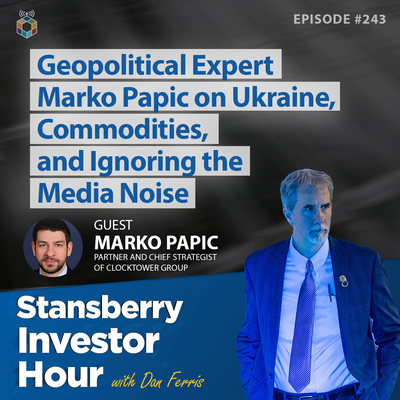
Geopolitical Expert Marko Papic on Ukraine, Commodities, and Ignoring the Media Noise
<p>The current tensions between Russia and Ukraine have been all over the news… perhaps even contributing to this week's big market sell-off.</p> <p>But Dan Ferris' guest this week on Stansberry Investor Hour has some reassuring words for any concerned listeners: You can relax. </p> <p>Dan sits down with one of his favorite guests -- geopolitical expert Marko Papic, who is the Partner and Chief Strategist at an alternative investment asset management firm. Marko is Dan's "No. 1 macro guy" and specializes in geopolitics, macroeconomics, and markets. And Marko says it's life as usual right now for folks in Ukraine, and the media noise surrounding the possibility of war is just over-done news hype… </p> <p>Marko clarifies that if a war does happen, yes of course there would be global and market implications. But for right now, it’s just a local regional issue being sensationalized by the media.</p> <p>They also discuss inflation, which Marko says will continue to be an issue. He reminds everyone "This isn't the 1970s…" and that regular folks today "don’t have the stomach for a real recession" needed to fight inflation. </p> <p>Dan plays a bit of devil's advocate with him about commodities and emerging markets investing, which Marko says is his No. 1 capital allocation idea right now. Despite this being a contrarian idea, he tells Dan that "commodity-linked plays should pay off in 2022."</p> <p>They touch on COVID's continuing effect on the markets, as well as value-growth trades. Plus, don’t miss Dan's opening rant about this week's "flash crash." </p> <p> </p>
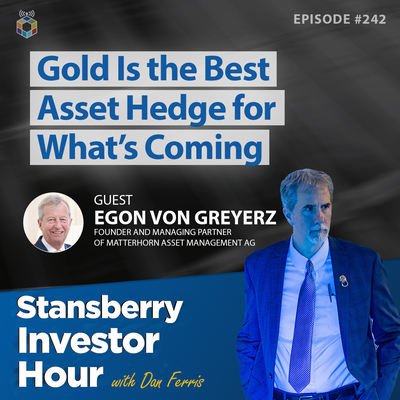
Gold Is the Best Asset Hedge for What’s Coming
<p>This week on <em>Stansberry Investor Hour</em>, Dan Ferris sits down with Egon von Greyerz, Founder and Managing Partner of Matterhorn Asset Management AG. Egon, whose company specializes in wealth preservation, has been a gold bug for decades. He and Dan talk about how gold is the No. 1 hedge against inflation and market chaos.</p> <p>Egon says “gold is the best instrument you could ever buy to ensure your wealth.” And holding gold will protect you from the coming consequences of our current massive market bubble... created and fueled by the Federal Reserve’s unlimited money printing and our highest inflation rate in decades.</p> <p>Unfortunately, Egon predicts that the impending “wealth destruction will be massive.” And the folks who think the Fed is going to swoop in and save the system again this next crash are wrong... Egon says that there are “tough times ahead,” but this makes wealth preservation, which includes holding gold, even more crucial. </p> <p>Dan and Egon also discuss bitcoin, as many have asked if gold will be replaced by the popular cryptocurrency. Egon is confident that will never happen, and makes the bold prediction that “bitcoin won’t still be around in 50 years.” He goes on to say that bitcoin “will always be a fringe investment”... and that “it’s not real money.”</p> <p>Lastly, Dan asks every guest the same last question: “If you can leave our listeners with only one last thought, what would it be?” And Egon’s answer won’t disappoint... Dan says his response is one of the best he’s ever heard.</p> <p>Listen to this episode for even more fascinating conversations about gold and our economy, plus check out Dan’s rant on exactly who’s in charge of the stock market…</p>
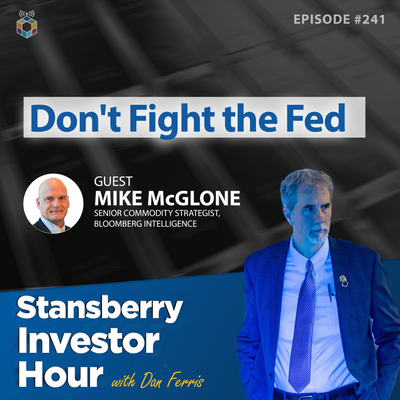
Don't Fight the Fed
<p>This week on the show Dan sits down with Mike McGlone, Senior Commodity Strategist for Bloomberg Intelligence. Mike has more than 25 years experience in futures and commodities trading beginning at the Chicago Board of Trade.<br /> <br /> Mike claims "the game is over"… The Federal Reserve will continue to tighten until the stock market goes down. We're long overdue for a correction, and this country's inflation is at its highest rate in 40 years. The Fed will take away the punch bowl, and guess what will come out ahead as a result? Cryptos...<br /> <br /> Dan and Mike dive into bitcoin, which Mike says is the "least risky" crypto out there. He explains that bitcoin is still in its price-discovery stage, steadily gaining adoption in a world that’s going digital. Bitcoin is currently our benchmark digital currency – well on its way to becoming the global digital collateral.</p>
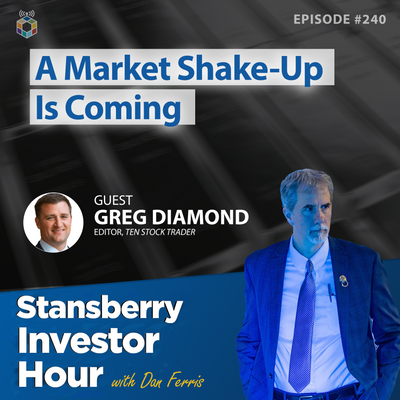
A Market Shake-Up Is Coming
<p>We've got former portfolio manager and current editor of <em data-stringify-type="italic">Ten Stock Trader</em>, Greg Diamond, on the podcast this week. Greg has almost two decades of experience managing multimillion-dollar portfolios across every asset class. He uses his expert technical analysis to decipher the behaviors and patterns of the market.</p> <p>Greg offers insights on the future of the S&P 500, the Dow, and the Nasdaq heading into 2022. Importantly, Greg warns that a huge wave of volatility is coming in the next few months. He's holding a special webinar next week on January 13 about this approaching market shake-up. You can find out more at <a class="c-link" href="http://messagefromgreg.com/" target="_blank" rel="noopener noreferrer" data-stringify-link= "http://messagefromgreg.com" data-sk= "tooltip_parent">messagefromgreg.com</a>. </p> <p>Greg and Dan also discuss how to apply technical analysis to rising interest rates and how we can leverage historic market data to best understand the future of inflation. They walk through the importance of risk management and how to incorporate those principles into your daily investing approach for a sounder strategy.</p> <p>After the interview, stay tuned for Dan's musings on the crypto market, specifically his reactions to people questioning if it has any real utility in the world.</p>
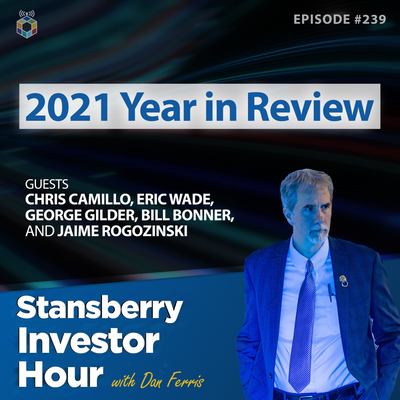
2021 Year in Review
<p>As 2021 draws to a close, it's time to look back and reflect on an incredibly eventful year in the markets...</p> <p>But we're not just doing a simple year in review.</p> <p> We've decided to revisit some of our favorite interviews of the year and compile the very best excerpts, just for you...</p> <p>Dan recaps some amazing lessons from thinkers like Chris Camillo (Episode #192), Eric Wade (Episode #216), George Gilder (Episode #218), Bill Bonner (Episode #225), and Jaime Rogozinski (Episode #230)...</p> <p>You'll hear some big ideas, unbelievable stories, and some truly deep insights from some of the smartest folks anywhere in the world...</p> <p>It's the one episode this year you DEFINITELY don't want to miss.</p> <p> Listen to some of the most influential Investor Hour interviews of the year on this week’s episode.</p>
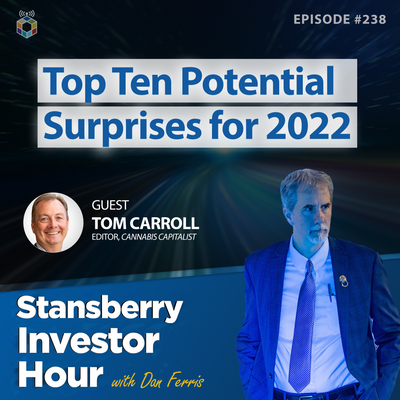
Top Ten Potential Surprises for 2022
<p>This week, Dan invites one of the most respected healthcare analysts anywhere in the world onto the show...</p> <p>His work has been featured in <em>The Wall Street Journal</em>, <em>Bloomberg</em>, <em>The Financial Times</em>, <em>Kiplinger</em>, <em>CBS</em>, and <em>USA Today</em> – just to name a few.</p> <p>In fact, he was previously ranked by <em>Fortune Magazine</em> as the #1 Healthcare analyst in the U.S.</p> <p>And today, he's here to talk about one of the best value plays anywhere in the stock market.</p> <p>The one and only Tom Carroll.</p> <p>Tom knows the healthcare industry landscape as well as anyone. In fact, that's what led him to start his newsletter with Stansberry Research, <em>Cannabis Capitalist</em>.</p> <p>According to Tom, nationwide federal legalization of cannabis is inevitable. It's a matter of <em>when</em> and not <em>if</em>, which gives investors an incredible opportunity right now...</p> <p> </p> <p>You can get into these stocks at a better value than you could one year ago... but today many of these companies have better revenues, earnings, and balance sheets than ever before...</p> <p>Tom says if you ignore this opportunity, you'll likely come to regret it...</p> <p>Plus, he even shares the name and ticker symbol of THREE of his favorite cannabis stocks that he's recommended to his readers...</p> <p>If you've considered entering the cannabis space, but weren't sure the best way to go about it, this is an episode you don't want to miss...</p>
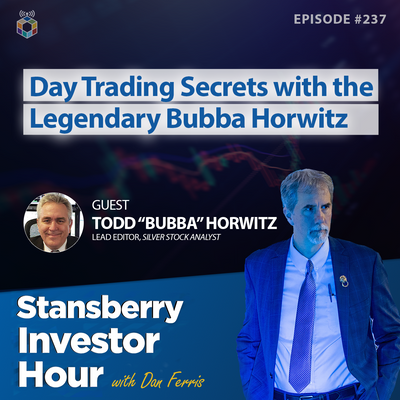
Day Trading Secrets with the Legendary Bubba Horwitz.
<p>If you're worried about inflation, you're not alone...</p> <p>The Consumer Price Index for November just hit a 22-year high... and the Producer Price Index increased at its highest rate <em>ever</em>.</p> <p>Now many folks are looking to juice the returns in their portfolio to make up the difference...</p> <p>But when it comes to trading stocks, the truth is that majority of retail investors end up getting burned...</p> <p>But that doesn't mean it can't be done successfully...</p> <p>To show us how it's done, Dan invites the legendary trader Todd "Bubba" Horwitz onto the show... When it comes to trading, few men on Earth can match Bubba's resume.</p> <p>In 1980, he was one of the original market makers in the SPX Trading Pit at the Chicago Board of Options Exchange, where he remains a member today...</p> <p>When it comes to trading in insane markets like we have today, Bubba has seen it all. He's been at it for over 40 years and has developed a bit of a cult-like following...</p> <p>Bubba even does live trading with his followers. You can follow along as he trades his actual money, and mimic his trades, if you so choose. For more info, visit <a href= "http://www.BubbaTrading.com">www.BubbaTrading.com</a>...</p> <p>If you've ever been curious about how to trade stocks safely, this is a conversation you don't want to miss...</p>
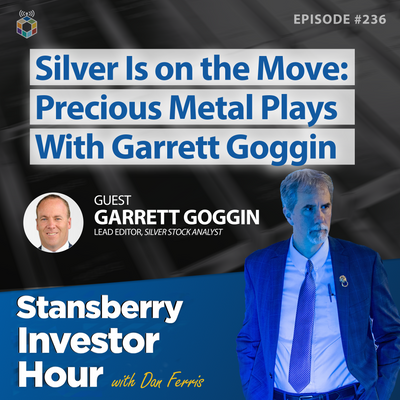
Silver is on the Move: Precious Metal Plays with Garrett Goggin
<p>This week, Dan encourages listeners to learn to look where others aren't looking...</p> <p>And invest where others aren't investing... </p> <p>Avoid things like gambling on-call options... and instead, look to buy real assets when you see them at attractive values.</p> <p>This week, Dan invites Garrett Goggin onto the show to discuss an industry he says is one of the best values anywhere in the market today.</p> <p>Garrett began his career on the New York Stock Exchange where he worked right on the floor executing trades. </p> <p>He has worked alongside John Doody, as his right-hand man and analyst for <em>Gold Stock Analyst</em> and <em>Silver Stock Analyst</em>.</p> <p> Over the past 5 years, Garrett's <em>Silver Stock Analyst</em> Fave 5 portfolio has had incredible results... up 401.3% for an average of 45.2% per year. </p> <p>So when it comes to finding opportunities in silver, there's no one you'd rather have by your side than Garrett.</p> <p>Dan and Garrett talk about why silver is priced so low today, how government policies are affecting the industry, and what's the best way to play the upcoming silver bull market he's predicting.</p> <p>Garrett even gives the names of a few of his favorite silver stocks that he typically reserves for his paid subscribers...</p> <p>If you've ever thought about adding some precious metals to your portfolio, this is a conversation you won't want to miss.</p>
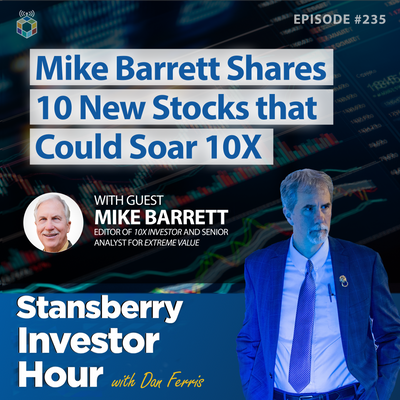
Mike Barrett Shares 10 New Stocks that Could Soar 10X
<p>If you've ever wondered how Dan finds recommendations for his <em>Extreme Value</em> newsletter, today is your lucky day... </p> <p>Because this week, Dan is letting <em>Investor Hour</em> listeners peek behind the curtain to hear from one of his closest colleagues.</p> <p> He's the senior analyst for <em>Extreme Value</em>, the one, and only Mike Barrett.</p> <p>Mike uses decades of cash flow modeling and valuation expertise to help identify some of the highest upside stocks anywhere in the market.</p> <p>In fact, Dan says that Mike is the <em>real brains</em> behind many of Stansberry Research's top recommendations...</p> <p>Like when Mike showed his readers how to make <strong>20X their money in just 7 months</strong> on a small biotech company treating Alzheimer's disease...</p> <p>Or how to make up to <strong>19X their money in just over a year and a half</strong>, with a small California firm of only 76 employees...</p> <p>Or the time he showed his followers how to make <strong>9X their money in 6 months</strong> on a company fighting COVID-19...</p> <p> The truth is, he's one of Stansberry Research's best-kept secrets...</p> <p>But that's not likely to last much longer...</p> <p>Because now Mike is stepping forward to reveal his new 5-Step approach that he's developed to identify many of these massive 10X winners.</p> <p>He's written a new special report with 10 different new stocks with 10X potential, that have NEVER been covered by anyone at Stansberry Research. You can learn more at <a href= "http://www.MikeMessage.com">www.MikeMessage.com</a>.</p> <p>If you're looking to add a boost to your portfolio, this is a conversation you don't want to miss.</p> <p>P.S. If you're interested in hearing more about some of Mike's biggest winners, he's giving away all the details on it right here, and it's 100% free to attend. To learn more, visit <a href= "http://www.MikeMessage.com">www.MikeMessage.com</a> </p>
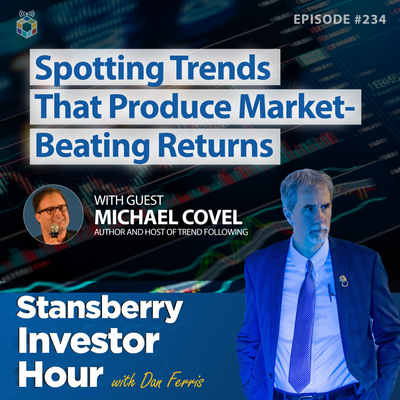
Spotting Trends that Produce Market Beating Returns
<p>When so many sectors are reaching new highs, where is the best place to put your money?</p> <p>This week, Dan brings in entrepreneur Michael Covel, to help answer that tough question.</p> <p>Mike is the author of five books, including an international bestseller, <em>Trend Following: Learn to Make Millions in Up or Down Markets</em>, and <em>The Complete Turtle Trader</em>...</p> <p>He also created <a href= "http://www.TrendFollowing.com">www.TrendFollowing.com</a> where his consistent market-beating strategy has begun to spread, as he now services clients in 70 different countries.</p> <p>Mike is very active on Twitter, publishes his blog, and records his podcast weekly.</p> <p>And today, Mike stopped by so Dan could get his thoughts on some popular trends in the market.</p> <p>Tech stocks, value stocks, cryptos...</p> <p>Dan gets Mike's thoughts on where these trends are moving in the short term.</p> <p>But perhaps, even more importantly, the two discuss how to be cautious when so many sectors are making new highs...</p> <p>And how to make a specific plan to preserve your wealth in the event of a downturn.</p> <p> As Mike says, you should ask yourself, "Are you okay with losing up to 50% of your net worth?"</p>
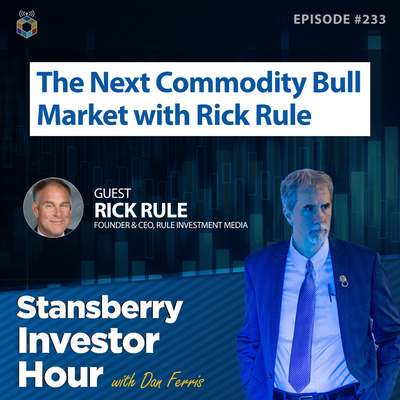
The Next Commodity Bull Market with Rick Rule
<p>In a market like we see today, investors tend to throw caution to the wind...</p> <p>Whether it's the next SPAC offering, cryptocurrency, or even an obscure ape-themed piece of digital art, it seems like you can find a buyer for just about any asset nowadays...</p> <p>But, as Dan often points out, chasing these short term gains has tons of risk. For most folks, you're likely much better off holding real hard assets as a part of a diversified investment portfolio.</p> <p>So that's why this week, Dan invites Rick Rule back onto the show to talk about investing in real hard assets and the booming resource markets.</p> <p>Rick began his career in the securities business in 1974 and has been principally involved with natural resource securities ever since. Over his long career, Rick has originated and participated in hundreds of debt and equity transactions with private, pre-public, and public companies.</p> <p>Today, Rick is widely regarded as one of the most accomplished natural resource investors on the planet.</p> <p>During their conversation, Dan and Rick dive deep into the weeds on the rising inflation numbers and what that means for commodity prices going forward...</p> <p>Rick even shares the names of a few fascinating ways to play uranium and silver markets, that you likely have never heard of before.</p> <p>It's an episode with a ton of valuable ideas that you won't want to miss. Rick shares some of the biggest lessons he's learned and unlearned from his nearly 50 years of investing experience.</p>
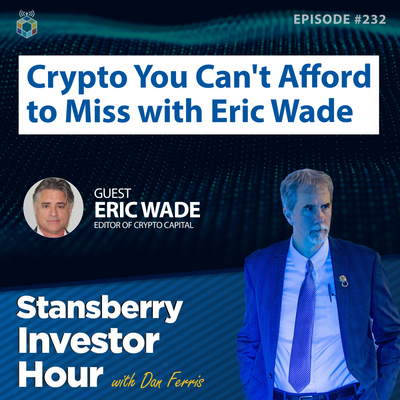
Crypto You Can't Afford to Miss with Eric Wade
<p>With so many Bitcoin holders enjoying huge profits, many are wondering if it's time to take some money off the table?</p> <p> Or hold tight before the final stage of this bull market?</p> <p> To settle this debate, Dan invites long-time friend and repeat guest, Eric Wade, back onto the show to take all things Bitcoin and cryptocurrency.</p> <p> Eric is an early internet entrepreneur, angel investor, screenwriter, and editor of <em>Crypto Capital</em>.</p> <p>In a few short years, he's recommended dozens of 100%+ winners and even ten 1,000%+ winners. He knows more about the crypto space than just about anyone on the planet.</p> <p>During their conversation, Dan and Eric discuss the big <em>gold vs Bitcoin</em> debate, where Eric sees Bitcoin's price in the years ahead, and even when's the right time to sell your stack.</p> <p>Plus, Eric shared some details on a new project he's working on, which he plans to reveal on November 17th...</p> <p>He'll be talking about the top 6 cryptos his research shows has the highest upside at this stage of the crypto cycle...</p> <p> You can get it 100% free of charge just for listening to his event. You can find more details at <a href= "http://www.BitcoinBoomEvent.com">www.BitcoinBoomEvent.com</a>.</p> <p>Whether you've held Bitcoin for years, or if you're curious about the opportunity of getting in today, this is a conversation you won't want to miss.</p>
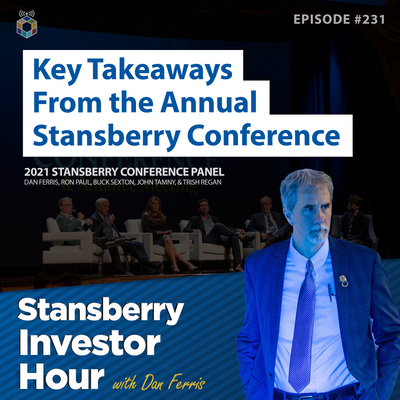
Key Takeaways from the Annual Stansberry Conference
<p>We decided to do something special for podcast listeners this week...</p> <p>Instead of a standard one-on-one interview like we typically have on the Investor Hour, we're letting you listen in on an extremely exclusive conversation with some of the world's most brilliant economic and political commenters.</p> <p>This is your invitation to listen in to the American Economic Panel Discussion at the Annual Stansberry Conference in Las Vegas. </p> <p>Typically, it costs several thousand dollars to attend this event in-person.</p> <p>But today, you're getting a slice of the experience 100% free of charge.</p> <p>The panel is hosted by Buck Sexton, along with some of the most influential and outspoken guests, such as Dr. Ron Paul, Trish Regan, John Tamny, Grant Williams, and our very own Dan Ferris... </p> <p>The panel does a deep dive into many of the most pressing questions on many American's minds, like...</p> <p><em>How bad do you see inflation getting?</em></p> <p><em>What kind of political costs could the Biden Administration pay from rising inflation?</em></p> <p><em>What are the implications of the Federal Reserve creating some other version of a Central Bank Digital Currency?</em></p> <p><em>And if you could speak to the current administration and give them some policy advice, what would it be?</em></p> <p><em> </em>And they don't sugarcoat things.</p> <p>The panel gives you the straight facts about the real problems facing our government and the Federal Reserve...</p> <p>While at the same time, giving listeners tons of practical advice to help ensure you're prepared for whatever's next.</p> <p> If you're worried about the direction our country is headed, this is a conversation you CANNOT afford to miss... </p> <p>Also, if you're interested in hearing more about the Stansberry Conference, including over 60 of the highest conviction investment ideas from our editors, you still have the chance to watch the whole thing at <a href= "https://orders.stansberryresearch.com/?cid=MKT572858&eid=MKT587039&step=start&plcid=PLC119387&assetId=AST200442&page=3"> 2021livestream.com</a>...</p>
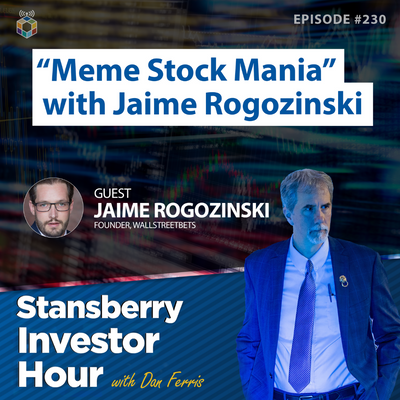
"Meme Stock Mania" with Jaime Rogozinski
<p>In 2021, many hedge funds on Wall Street took a beating...</p> <p>And strangely, thousands of retail investors made out like bandits...</p> <p>Was it an anomaly? Or is it part of a new paradigm shift in the world of finance?</p> <p>Dan looks to answer some of these questions by sitting down with the one man who knows more about the rise of retail investors than just about anyone...</p> <p>He was one of the most anticipated guest speakers during this week's Stansberry Conference in Las Vegas...</p> <p>And he's even had a film crew follow for the past year, creating a documentary on his life...</p> <p>He's the original founder of the infamous subreddit – WallStreetBets – the one and only Jaime Rogozinski.</p> <p>Jaime originally founded WallStreetBets on Reddit in 2012... And by 2019, WallStreetBets amassed over 1 million subscribers and had over 3 million monthly unique users.</p> <p>Earlier this year, the group caused quite a stir when they bid stocks like GameStop, AMC, and other so-called "meme stocks" up hundreds of percent.</p> <p>During their conversation, Jaime recalls some hilarious stories about WallStreetBets members who have made and lost massive fortunes in the stock market.</p> <p>He even shares the story of some members who invested in the wrong stock... and <em>accidentally</em> made a ton of money.</p> <p>Risky? Yes...</p> <p>Dangerous? Perhaps...</p> <p>But Jaime contends that the many people on WallStreetBets are learning to trade the best way possible – with a smile on their face and some real skin in the game.</p> <p>If you've ever been tempted to trade meme stocks, or just want to hear more about some of this crazy world, this is a conversation you must listen to...</p>
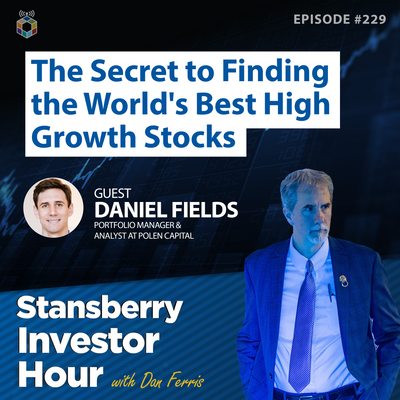
The Secret to Finding the World's Best High Growth Stocks
<p>When Bitcoin is soaring to all-time highs...</p> <p> And the stock market is more expensive than it's ever been...</p> <p>It's incredibly easy to get caught up in the mania...</p> <p>After all, everywhere you look, people are getting rich in stocks and crypto, and it's natural to want to get in on the action.</p> <p>But it's important to go about it the right way... </p> <p>So, Dan invites Daniel Fields of Polen Capital, onto the show this week to talk about the world of high-growth stocks.</p> <p>Daniel is responsible for the day-to-day portfolio management and investment analysis for the international growth fund at Polen Capital.</p> <p>Before joining Polen Capital, he spent 8 years in Hong Kong, where he worked for GaveKal Capital and Marshall Wace, LLC as a research analyst evaluating Asian growth companies.</p> <p>Daniel uses his experience from his years abroad to identify fantastic businesses with high growth potential, that the average investor has never heard of...</p> <p>But perhaps even more importantly, he gives the listeners his insight into what to avoid when investing in high-growth stocks.</p> <p>He even shares the names of a handful of interesting companies from all over the world that he's very bullish on in the coming years. </p> <p>Daniel brings plenty of expertise to the table and gives a ton of great practical advice for anyone thinking about allocating more growth stocks to their portfolio... </p>
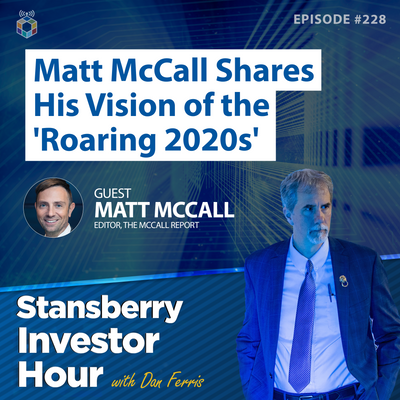
Matt McCall Shares His Vision of the 'Roaring 2020s'
<p>When you ask folks about what worries them the most, one of the most common responses researchers heard was "the future."</p> <p>But today's guest doesn't look at it that way.</p> <p>When Matt McCall thinks of the future, he sees dozens of trends that will greatly improve all our lives... and a world of incredible investment opportunities. </p> <p>And when Matt talks about investment opportunities, it pays to listen.</p> <p>After all, he's recommended an incredible <strong>40 different 1,000% winners in his stock-picking career.</strong></p> <p>So, this week, Dan decided to invite Matt back onto the show for a couple of reasons.</p> <p>The first is to get Matt's insight into some of these megatrends that will shape the way we live... trends like the future of transportation, blockchain technology, cryptocurrency, and much more.</p> <p>And the second is to welcome him as the newest editor to join the Stansberry Research family. </p> <p>The two have an enlightening conversation that'll leave you much more optimistic about where we're headed. </p> <p>Matt even shares the names of two stocks that recently became public, flying completely under the radar today, that he believes could be his next 10X winner... </p> <p>It's one you DO NOT want to miss!</p>
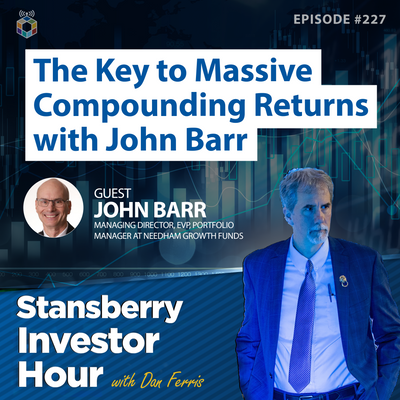
The Key to Massive Compounding Returns with John Barr
<p>Inflation fears are rising...</p> <p>And for many folks nearing retirement, it's happening at the worst possible time.</p> <p>That's why it's absolutely critical to hold a portion of your wealth in solid long-term investments, so your nest egg lasts as long as you do...</p> <p>But what's the best way to do it safely and with as little risk as possible?</p> <p>Dan looks to answer this question by sitting down with the portfolio manager of the Needham Aggressive Growth fund – Mr. John Barr.</p> <p>Prior to his career on Wall Street, John worked for 14 years in the electronic design and automation industry, giving him unique insights into the world's high-growth technology companies that many of his colleagues on Wall Street lack. </p> <p>Today, he works as a co-portfolio manager of Needham Growth fund and portfolio manager of the Needham Aggressive Growth fund.</p> <p>During their conversation, John explains his philosophy of finding stocks that deliver compounding returns. He looks for what he calls "hidden compounders" before they become "quality compounders."</p> <p>He even shares the name of one company in his portfolio that he bought at $7... which today is priced around $140... approximately a 20X winner...</p> <p>Then he tells Dan about another stock he absolutely loves... But this one is still in the "hidden compounder" stage...</p> <p>The company trades for around $10 today, and John thinks that long term, it could join the ranks of some of his biggest winners.</p> <p>If you're looking to invest in high upside growth stocks, but want to know how to go about it the right way, this is a conversation you don't want to miss...</p>
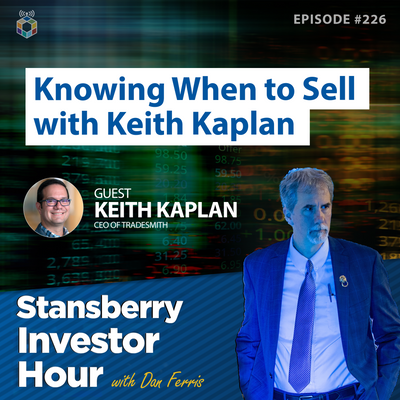
Knowing When to Sell with Keith Kaplan
<p>When you see endless stories of greed and speculation in the market...</p> <p>And you feel in your heart something is wrong...</p> <p>But stocks continue to rise higher and higher... </p> <p>What's an investor to do?</p> <p>This week Dan sits down with Tradesmith CEO, Keith Kaplan, to help answer this difficult conundrum...</p> <p>Before Keith came to Tradesmith, he worked as a software architect for many years...</p> <p>But despite a great profession, a steady income, and a good head on his shoulders, he struggled with his investments...</p> <p>During his quest to improve, he was stunned and frustrated with the general lack of available tools and financial literacy most investors have... </p> <p>Now, he's using his 25 years of experience as a veteran software architect to change that, by providing sophisticated but easy-to-use tools for the everyday retail investor.</p> <p>During their conversation, Keith talks about some of the mistakes he made early in his investing career, and how his new software aims to eliminate those emotional errors.</p> <p> He even shows Dan how Tradesmith's software can reduce the risk in your portfolio by simple allocation...</p> <p>But whether you use Tradesmith – or another system for your "buy" and "sell" signals – Keith and Dan both agree the most important thing is to have a plan and stick to it.</p> <p> If you're concerned about the possibility of an oncoming bear market, but are still holding stocks, this is a conversation you do not want to miss...</p> <p> </p>
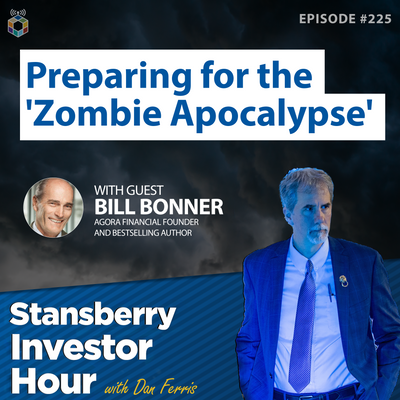
Preparing for the 'Zombie Apocalypse' with Bill Bonner
<p>On this week's episode of the <em>Stansberry Investor Hour</em>, Dan invites an incredibly special guest onto the show...</p> <p>He's a man who's launched over 1,000 new products, acquired dozens of businesses, and employed thousands of people...</p> <p>In a way, he's largely responsible for helping Dan get to where he is today... </p> <p>His biggest claim to fame is founding Agora Financial, now the largest independent research network on the planet... </p> <p>The one and only Bill Bonner.</p> <p> For those of you that don't know, Bill was the one who interviewed Dan, way back in November of 1997, when he first set out to become a financial analyst...</p> <p> The two kick off the conversation like old friends, recounting tales from the old days, and catching up on what's new in life...</p> <p>But the conversation turns gravely serious when Dan gets Bill's take on some major developments happening in the world right now...</p> <p>The two discuss the fast-developing Evergrande debt crisis, the rising inflation we're seeing just about everywhere, and where we might see societal upheaval flare up next...</p> <p>Bill explains what this all means for investors, and gives the listeners some key advice on how to protect yourself from that worst-case scenario... </p> <p>If you're concerned about what's going on in America today, it's a conversation you do not want to miss...</p> <p>You can listen to Dan's full conversation with Bill and much more in this week's episode.</p>
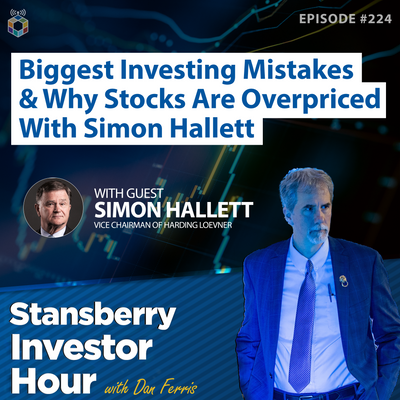
Biggest Investing Mistakes & Why Stocks are Overpriced with Simon Hallett
<p>On this week's episode of the <em>Stansberry Investor Hour</em>, we're inviting a different type of guest onto the show.</p> <p>He's a man with tons of experience as an investor...</p> <p>After all, he worked as a portfolio manager for Harding Loevner for many years...</p> <p>But what really sets him apart, is that he is the owner of a professional soccer team in England...</p> <p>This week, Dan invites owner of the Plymouth Argyle, Simon Hallett, onto the show...</p> <p>Simon's not your typical guest, so Dan takes this opportunity to ask Simon all the questions from a successful businessman and sports owner.</p> <p>The two have a lighthearted conversation about what it's like watching your favorite sports team as a child, then growing up to become the owner...</p> <p>Then they pivot to some of the best investing lessons Simon has learned over his many years as a portfolio manager...</p> <p>And Dan picks up on a ton of good advice from Simon that applies to every investor.</p> <p>It's a conversation full of great business and investing insights... from a man with decades of experience to show for it.</p> <p>You can listen to Dan's full conversation with Simon and much more on this week's episode.</p> <p> </p>
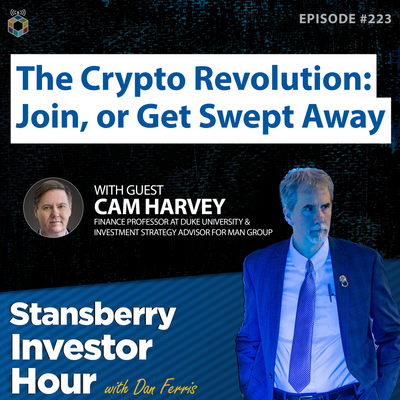
The Crypto Revolution: Join, or Get Swept Away.
<p>El Salvador has officially made Bitcoin legal tender.</p> <p>Some in traditional finance are calling it an experiment doomed to fail...</p> <p>While others are calling it one of the biggest stories in the history of cryptocurrencies...</p> <p>One thing is for sure... This decision will likely have far-reaching effects around the world for years...</p> <p>Will other countries soon follow suit? Could this be the big adoption catalyst that sends Bitcoin soaring up towards $100K? Or will this experiment end disastrously and serve as a warning for other small nations thinking of doing the same thing?</p> <p>To help us make sense of this incredible new development, Dan invited crypto expert, Cam Harvey, onto the show...</p> <p>Cam is the professor of Finance at the Fuqua School of Business at Duke University.</p> <p>And he's also served as editor of the <em>Journal of Finance</em> from 2006-2012... as well as the President of the American Finance Association in 2016.</p> <p>When it comes to cryptocurrencies, Cam is <em>way ahead of the curve</em>...</p> <p>When Bitcoin was trading between $200 - $400 per coin, Cam was giving lectures to his students about Bitcoin during his finance classes...</p> <p>During their conversation, Cam and Dan discuss at length what El Salvador's recent move could mean for the US Dollar, traditional financial institutions, and other nations that might be thinking of doing the same thing...</p> <p>If you've thought about investing in cryptos and don't know where to get started, Cam says we're less than 1% into this disruption, so now is the perfect time...</p> <p>In fact, Cam walks listeners through the first 2 steps you need to take to get started in the crypto space the right way...</p> <p>He says every listener should consider entering the crypto space... because in his words,</p> <p><em>"You can either join this revolution, or get swept away by it..."</em></p> <p>Listen to Dan's conversation with Cam and more on this week's episode.</p>
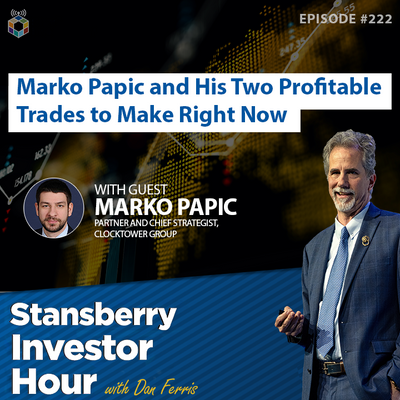
Marko Papic and His Two Profitable Trades to Make Right Now
<p>As an investor, it's extremely important to realize how much government policy decisions can impact your portfolio.</p> <p>So, on the <em>Investor Hour</em> this week, we decided to take a 'step back' and have a conversation with one of the top minds in macroeconomics.</p> <p>He's a repeat guest of the show... </p> <p>And given the enormous increase in government budgets... and all the turmoil happening around the world today, Dan couldn't wait to have him back to discuss how some of the big macrotrends happening today could impact the market going forward.</p> <p>Marko Papic joins us as this week's guest.</p> <p>Marko works as partner and chief strategist at Clocktower Group, an alternative asset management firm where he leads the firm's strategy team providing bespoke research to clients and partners on geopolitics, macroeconomics, and markets.</p> <p>And he's also the author of the popular book, <em>Geopolitical Alpha: An Investment Framework for Predicting the Future.</em></p> <p>Dan and Marko discuss the situation in Afghanistan, what the future holds for Chinese tech stocks, plus a shocking prediction on where some of the most commonly held blue chip stocks could be headed this decade...</p> <p>Marko even shares two "30-Day trades" he thinks could be highly profitable if you act quickly.</p> <p>Listen to Dan's conversation with Marko and more on this week's episode.</p>
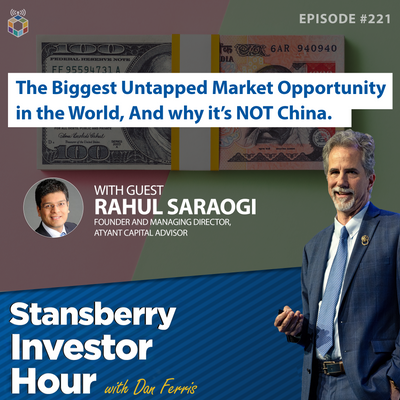
The Biggest Untapped Market Opportunity in the World, And why it’s NOT China.
<p>Here at the <em>Stansberry Investor Hour</em>, we specialize in bringing you investment stories you likely won't hear anywhere else...</p> <p>And today, Dan invites an old friend, Rahul Saraogi, onto the show to take a look at a market that is extremely undervalued and often neglected by Wall Street.</p> <p>It's a market where manufacturing is taking off...</p> <p>Infrastructure spending is expanding rapidly...</p> <p>And consumption is increasing at an incredible rate, fueled by over 1.4 billion people...</p> <p>And despite practically zero attention from many mainstream financial sources, this market has some striking similarities to where China was 20-25 years ago...</p> <p>That's why Rahul says if you consider yourself a value investor, this could be the world's biggest untapped opportunity... </p> <p>Listen to Dan's conversation with Rahul and more on this week's episode.</p>
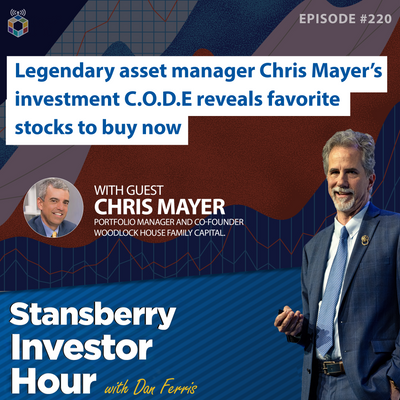
Legendary asset manager Chris Mayer’s investment C.O.D.E reveals his favorite stocks to buy now
<p>On this week's episode of the <em>Stansberry Investor Hour</em>, Dan invites "one of his favorite people in the entire investing universe" back onto the show.</p> <p> </p> <p>He's the author of several must-read investing books, including <em>100 Baggers: Stocks that Return 100-to-1 and How to Find Them</em>.</p> <p> </p> <p>And his most recent book, <em>How Do You Know?: A Guide to Clear Thinking About Wall Street, Investing, & Life</em>, won the 2019 S.I. Hayakawa Book Prize, a prestigious honor awarded by the Institute of General Semantics.</p> <p> Chris Mayer joins the show to talk about some of the highest-upside stocks you'll find anywhere in the stock market.</p> <p>During their conversation, Chris gives Dan a full run-down of what he looks for to find stocks with the potential to reach 100x returns.</p> <p> That may sound like an outrageous quest with a wildly improbable chance of success... but when Chris studied hundreds of 100-baggers of the past, he found that several definitive patterns emerged...</p> <p> He explains the key characteristics of these massive winners, and why you don't need an M.B.A. or degree in advanced finance to find these stocks...</p> <p> Chris even shares the name and ticker symbol of a handful of lesser-known stocks that he loves right now... stocks in high-growth industries, with genius business models, including one he calls "the Berkshire of software companies."</p> <p> It's extremely rare an Investor Hour guest delivers so many names of stocks with so much upside potential...</p> <p>So, make sure you have a pen and paper handy to jot down the name of some of these companies and their ticker symbols.</p> <p>If you're looking for higher gains to help boost your portfolio, this is a conversation you won't want to miss.</p> <p>Listen to Dan's conversation with Chris and much more on this week's episode.</p>
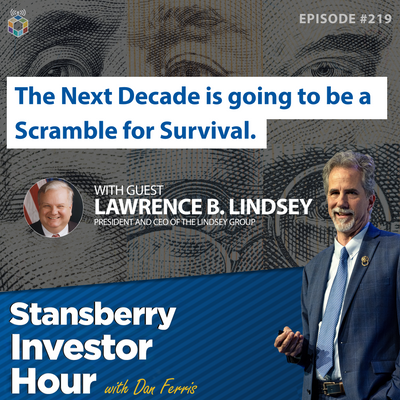
The Next Decade is going to be a Scramble for Survival.
<p>This week, Dan welcomes a truly unique guest onto the <em>Stansberry Investor Hour...</em></p> <p>He served as George W. Bush's Chief Economic Advisor during the 2000 Presidential campaign.</p> <p>And he later held top positions in the Bush Administration, including Assistant to the President for Policy Development, and Director of the National Economic Council...</p> <p>But the real reason Dan is excited to talk to this week's guest, is that for several years, he served as the Governor of the Federal Reserve System.</p> <p>Lawrence Lindsey joins Dan for an important conversation about the state of economy.</p> <p>Lawrence has unique insights into our government and monetary system that few guests on the show can claim... and there's no one better to answer questions about the critical issues we're facing today. </p> <p>Dan picks Lawrence's brain on issues like rising inflation, our relations with China, and the seemingly endless money printing going on today.</p> <p>Lawrence doesn't hold back. He and Dan discuss the problems the Fed is facing, how the government is attempting to mask this crisis, and the problems that we'll likely see accelerate in the coming years...</p> <p>Lawrence gives listeners a grim outlook over the next decade...</p> <p>But he also shares what he is doing with his money today, and give you steps you can take right now to protect yourself.</p> <p>Listen to Dan's conversation with Lawrence and much more on this week's episode.</p> <p>You can also purchase Larry's new book the Currency War at <a href= "https://currencywarbook.com/">Currenywarbook.com </a></p>
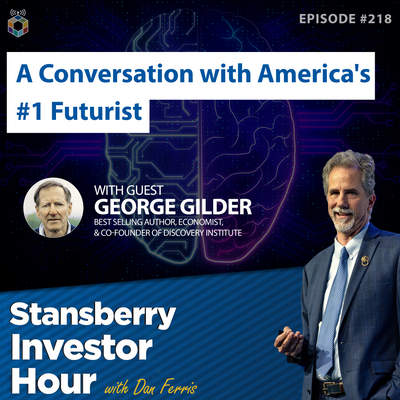
A Conversation with America's #1 Futurist
<p>On this week's episode of the <em>Stansberry Investor Hour</em>, Dan invites an incredibly special guest onto the show.</p> <p>He studied for years under Henry Kissinger at Harvard University...</p> <p>He later helped pioneer the formulation of supply-side economics as Chairman of the Lehrman Institute's Economic Roundtable...</p> <p>And he's widely regarded as America's #1 futurist...</p> <p>The one and only, George Gilder.</p> <p>George is best known for many of his best-selling books including, <em>Wealth and Poverty</em>, <em>Life After Television</em>, <em>Life After Google</em>, and his latest work, <em>Gaming A.I.: Why A.I. Can't Think but Can Transform Jobs.</em> </p> <p>And today, Dan brings him onto the show to pick his brain in an exclusive one-on-one interview.</p> <p>During his conversation with Dan, George discusses the real reason gold has stood the test of time as a currency... the one big mistake Satoshi Nakamoto made when he created Bitcoin... and some stunning facts about how leaving the gold standard opened the door for widespread abuse in the currency trading markets.</p> <p>George is truly one of the leading economic and technological thinkers of the past 40 years, and we're incredibly lucky to have him on the show today.</p> <p>If you want a better understanding of what truly goes on behind the scenes with the world's biggest banks and most influential governments, this is an interview you don't want to miss.</p> <p>Listen to Dan's conversation with George and much more on this week's episode.</p>
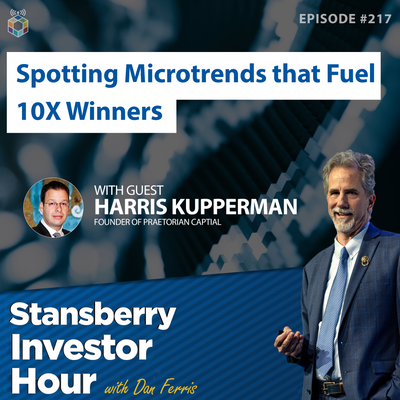
Spotting Microtrends that Fuel 10X Winners with Harris Kupperman
<p>As a new investor, it's easy to feel intimidated by the sheer volume of financial data that's out there...</p> <p>But the truth is, you can make a ton of money in the stock market, without spending hours per day researching stocks... or reading hundreds of books on different investment strategies...</p> <p>On this week's episode, Dan invites Harris Kupperman onto the show to explain how.</p> <p>Harris is the founder of Praetorian Capital, a hedge fund based in Florida with a long track record of market beating performance. He's also the Chief Adventurer at <a href= "https://adventuresincapitalism.com/">AdventuresInCapitalism.com</a>, an investment blog uncovering unique opportunities around the world.</p> <p>Today, he visits to talk about his shockingly simple way of investing that has a long history of producing incredible gains... </p> <p>Harris says he doesn't concern himself with interest rates...</p> <p>He doesn't care where the next 50 BPS on the 10-year treasury yield is going...</p> <p>Or what the Forex rate is going to be...</p> <p>Instead, he looks for microtrends that are happening in society – ones that are obvious once you spot them – and then he identifies the safest, highest upside way to play them.</p> <p>And he's not going for 20% or 50% gains... Harris is looking for stocks with the potential to go up 5x to 10x higher...</p> <p> During the interview, Harris shares two stocks with Dan that he's identified that are poised to grow rapidly, thanks to some of these microtrends happening today.</p> <p>When he explains the microtrends, and the stock that are positioned to benefit, you'll be surprised that these stories aren't front page news...</p> <p> </p>
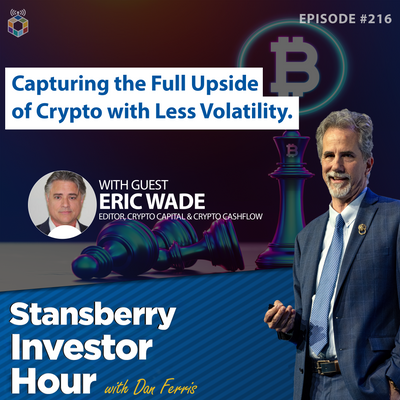
Capturing the Full Upside of Crypto with Less Volatility
<p>There's a lot of uncertainty in the crypto markets today...</p> <p> Over the last couple months, we've received a big increase in crypto-related questions from <em>Investor Hour</em> listeners... Questions like:</p> <p><em>Could quantum computing hack the Bitcoin system, rendering it useless?</em></p> <p><em> </em><em>Is government regulation coming soon?</em></p> <p><em>And out of the literally thousands of cryptos out there... how do you choose the right one?</em></p> <p>To help answer these questions, Dan invites crypto expert, Eric Wade, back onto the show </p> <p>Eric is an early internet entrepreneur, angel investor, screenwriter, and editor of the <em>Crypto Capital</em> newsletter here at Stansberry Research.</p> <p> Eric started mining Bitcoin and Ethereum long before 99% of folks had ever even heard the term "cryptocurrencies." His <em>Crypto Capital</em> newsletter has had dozens of 100%+ winners and even a handful of 1,000%+ winners. He knows more about the space than just about anyone on the planet.</p> <p>During their conversation Dan leaves no stone unturned, asking Eric everything you've ever wondered about the crypto space.</p> <p>Eric also shares a new project he's working on recently – a fascinating way to capture the full upside of the crypto market, but with less volatility and more consistent returns.</p> <p>If you've watched the incredible gains in the crypto markets, but are still waiting on the sidelines, this is a conversation you won't want to miss. </p> <p>P.S. If you're interested in learning more about Eric's new project, he made a short video explaining everything you need to know. Make sure you visit <a href= "http://www.cryptocash2021.com">www.cryptocash2021.com</a> while it's still online.</p> <p><em> </em></p>
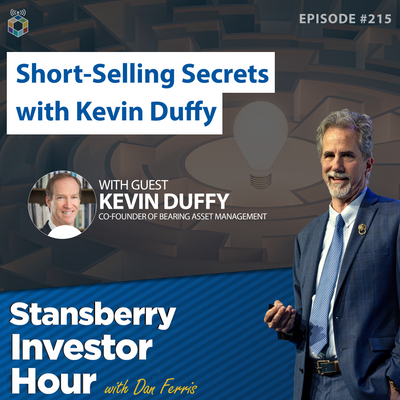
Short-Selling Secrets with Kevin Duffy
<p>Since the bottom of the Covid market crash, on March 23, 2020, the S&P 500 is up an incredible 100%...</p> <p>Which begs the question... is this bull market picking up steam?</p> <p>Or are investors sleepwalking towards a big market crash?</p> <p>Shorting the market can be risky business, so to help answer these questions, Dan invites repeat guest Kevin Duffy back onto the show...</p> <p>Kevin co-founded Bearing Asset Management back in 2002, which is famous for warning their clients about the housing and credit bubble before the crash of 2008.</p> <p>Kevin and Dan discuss many of the overvalued sectors of the market... But Kevin says that though the market looks risky today, there's always great opportunities if you know where to look.</p> <p>In fact, Kevin talks about some industries he's been following that are just entering the mass adoption stage and could be poised for explosive growth...</p> <p>Plus, Kevin shares a few secrets he's learned over the years in the risky business of short selling that you won't hear anywhere else...</p> <p>If you've ever been curious about hedging your portfolio, and even how to make huge profits from a potential downturn, this is a conversation you don't want to miss...</p> <p>Listen to Dan's conversation with Kevin, and much more, on this week's episode.</p>
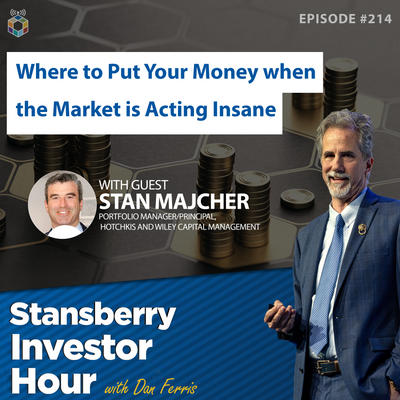
Where to Put Your Money when the Market is Acting Insane
<p>Even if you're in complete denial about the markets, it's tough to ignore the signs of extreme excess in the markets today...</p> <p>This year, more brokerage accounts were registered than ever before...</p> <p>Capital inflows are seeing outrageous all-time highs...</p> <p>NFTs are selling for millions... and meme stocks are more popular than ever...</p> <p>So, where can investors find value in the market at a time like this?</p> <p>On this week's episode, Dan invites special guest Stan Majcher onto the show to help answer this question...</p> <p>Stan comes with over 27 years of industry experience, and today he serves as portfolio manager of the Mid-Cap Value fund (HWMAX) at Hotchkis & Wiley...</p> <p>During their conversation, Dan and Stan discuss one corner of the market that has been almost completely forgotten by most investors.</p> <p>Stan says that right now, big changes are happening in this industry, and there's some very strong bullish tailwinds for stocks in this space that the public hasn't picked up on yet. He says many investments in this space are criminally undervalued and could see much higher prices very soon.</p> <p>If you're looking at the markets and are searching around for investments with actual value, you might want to consider some of the ideas Stan shares.</p> <p>Listen to Dan's conversation with Stan, and much more, on this week's episode.</p>

There's Never Been a Better Time in History for this Trade
<p>On the opening rant this week, Dan gives the listeners something special that he typically only reserves for his newsletters subscribers.</p> <p> Dan reveals the full details on a trade that he's liked off and on for many years now...</p> <p>Not only that, but he walks you through the trade step by step...</p> <p>And he explains why there's never been a better time in history to put this trade into action...</p> <p>Then, on this week's interview, Dan invites Danton Goei of Davis Advisors onto the show. Danton joined Davis Advisors in 1998, and now works as portfolio manager for the Davis Large Cap, Global, and International portfolios.</p> <p> During his conversation with Dan, Danton takes the listeners behind the curtain, explaining many of the ins and outs of portfolio management that he's learned over decades experience managing multiple funds...</p> <p>Plus, during their conversation Danton shares the names of two stocks that he absolutely loves right now.</p> <p> One is a fairly popular name that has been shunned in the media as of late... but the other pick is one you've likely never heard before with massive upside... </p> <p>If you're looking to personally mange your own investment portfolio, Dan and Danton cover a ton of valuable material you won't hear anywhere else. </p> <p> Listen to Dan's conversation with Danton, and much more, on this week's episode.</p>
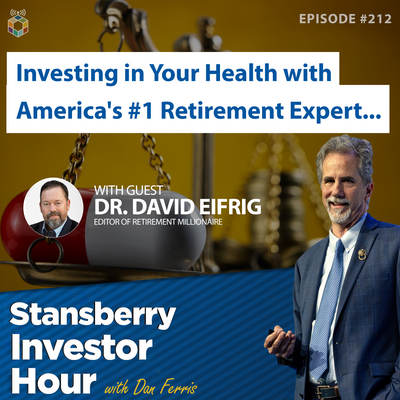
Investing in Your Health with America's #1 Retirement Expert...
<p>On this week's episode of the <em>Stansberry Investor Hour</em>, Dan invites arguably the #1 retirement expert in America onto the show...</p> <p>He began his career as an elite derivatives trader on Wall Street at Goldman Sachs...</p> <p> He helped pioneer specialized options trading strategies for large banks like Chase Manhattan and Yamaichi, known as the Goldman Sachs of Japan...</p> <p> But after over a decade on Wall Street, he grew disgusted with the culture of greed and left his Senior Vice President role to pursue a more fulfilling career practicing medicine.</p> <p> Today, he shares the secrets he learned as an elite trader on Wall Street with thousands of everyday investors like you, through his franchise of retirement newsletters.</p> <p>Stansberry Research's own... Dr. David Eifrig.</p> <p>Or as he's known around the office, Doc.</p> <p>During their conversation, Dan and Doc discuss some of the absurd examples of excess in the markets today... the likelihood of inflation in the coming years and how much of an impact it can have on your savings... and Doc's favorite way to produce safe, reliable income for those already in retirement. He’s even holding his own webinar for those who want to learn more about this unique strategy. You can find more info at <a href= "http://www.MessageFromDoc.com">www.MessageFromDoc.com</a> </p> <p>Doc has a way of explaining complex financial instruments in a way that's easy to understand that you've likely never heard before. </p> <p> Plus, Dan gets Doc to finally open up and shares the story of what happened on Wall Street years ago that ultimately led him to get fed up with the system.</p> <p>The two have an enlightening conversation with tons of valuable insight for anyone nearing retirement age. If you've got any money in the markets and are nearing retirement, you won't want to miss it.</p> <p>Listen to Dan's conversation with Doc, and much more, on this week's episode.</p>
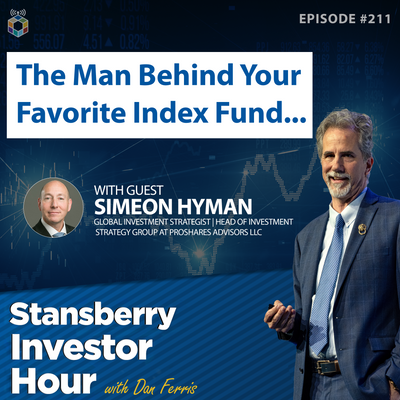
The Man Behind Your Favorite Index Fund...
<p>On this week's episode of the <em>Stansberry Investor Hour</em>, Dan invites an incredibly special guest onto the show.</p> <p>He's served as the Head of Investment Strategy and Due Dilligence for UBS...</p> <p>And spent several years at Bloomberg, where he was Chief Investment Officer for Bloomberg's technology-driven wealth management business, Bloomberg Black...</p> <p> Today, he is the global investment strategist and head of investment strategy at ProShares, and he has insight into the markets that few can match...</p> <p>Simeon Hyman joins Dan on the show to discuss everything that's going on in the markets today, plus how ProShares is developing products to help retail investors take advantage of major new investment trends and new opportunities. </p> <p>During their conversation, Dan and Simeon talk about the rise of passive investing... what's going on with the new meme stocks trend... and what changing interest rates mean for you and your holdings going forward...</p> <p> Simeon even shares some new ETFs that ProShares has developed to take advantage of new trends in the market, like a new momentum ETF (QQQA)... and an ETF designed to capitalize on the rise of online retail (ONLN). </p> <p>The two have a captivating conversation filled with tons of valuable insight from one of the most in-the-know investors on the planet.</p> <p>Listen to Dan's conversation with Simeon, and much more, on this week's episode.</p>
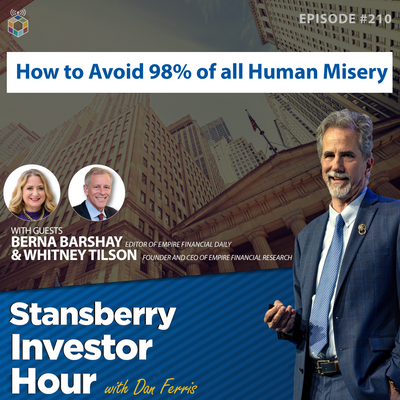
How to Avoid 98% of all Human Misery
<p>This week, we're doing something that's never been done in the history of the <em>Investor Hour</em> podcast...</p> <p>It's a two-part interview with two incredibly special guests.</p> <p>The first is a new face to <em>Investor Hour</em> listeners. Berna Barshay is a rising star at Empire Financial Research, who in less than a year has already begun to make a name for herself with her email newsletter read every day by thousands.</p> <p> During their conversation, Berna shares her unique perspective that has helped her spot massive winners the rest of Wall Street hated, like Lululemon, up over 20x since going public.</p> <p>She's even holding her own webinar for those who want to learn more about her unique strategy. You can find more info at <a href= "http://www.empire2021.com">www.empire2021.com</a>.</p> <p>The second guest is a remarkable man who started a hedge fund out of his Manhattan apartment which he grew to over $200 million...</p> <p>He's appeared numerous times on national television where he has broken some of the biggest financial scandals in America... </p> <p>And he's even climbed Mount Kilimanjaro...</p> <p>The one and only, Whitney Tilson...</p> <p>Whitney joins Dan this week to talk about his latest book.</p> <p>It's not a book on finance... Or a novel about his relationship with Charlie Munger or Warren Buffett... Or another one of the hundreds of books on working hard to become successful in life.</p> <p>It's a book Whitney says is aimed toward his three daughters as they enter adulthood.</p> <p> Whitney's book <em>The Art of Playing Defense: How to Get Ahead by Not Falling Behind</em> is one of the few books that explores what to do once you become successful, detailing how to avoid the five most common calamities Whitney says cause 98% of human suffering.</p> <p>It's a valuable conversation chocked full of fantastic advice for listeners of all ages.</p> <p>If you're looking to strengthen the relationships in your life, this is an interview you don't want to miss. </p> <p>Listen to Dan's conversation with Whitney and more on this week's episode.</p> <p> </p>
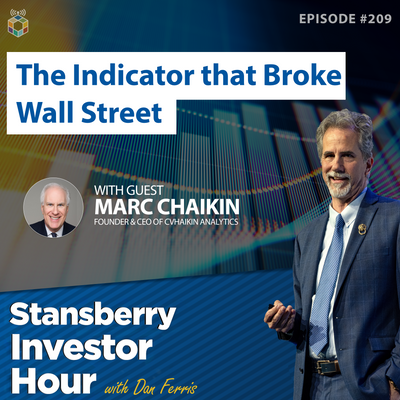
The Indicator that Broke Wall Street
<p>On this week's episode of the <em>Stansberry Investor Hour</em>, Dan invites an incredibly special guest onto the show.</p> <p>He's spent 50 years on Wall Street... survived 9 bear markets...</p> <p>He's appeared numerous times on Fox Business and CNBC's Mad Money – where host Jim Cramer said he's learned <em>NEVER</em> to bet against him...</p> <p>The one and only, Marc Chaikin.</p> <p>Marc has created one of Wall Street's most popular indicators, the Chaikin Power Gauge, which has become industry standard, appearing in every Bloomberg and Reuters terminal in the world, used by hundreds of banks, hedge funds, and every major brokerage site...</p> <p>During his conversation with Dan, Marc shares how lessons from legends like Warren Buffett and Seth Klarman led him to use a unique blend of fundamental and technical analysis to create his Chaikin Power Gauge...</p> <p>Marc explains the key factors his indicators value most, how they're weighted, and even a few sectors of the market – including some company names and ticker symbols – that the Chaikin Power Gauge indicator says are screaming buy right now.</p> <p>Plus, Marc explains how you can try the Chaikin Power Gauge, 100% free, just by signing up for his upcoming webinar at <a href= "http://www.2021prediction.com">www.2021prediction.com</a>.</p> <p>If you're serious about managing your own investment portfolio, this is an interview you don't want to miss.</p> <p>Listen to Dan's conversation with Marc and more on this week's episode.</p>
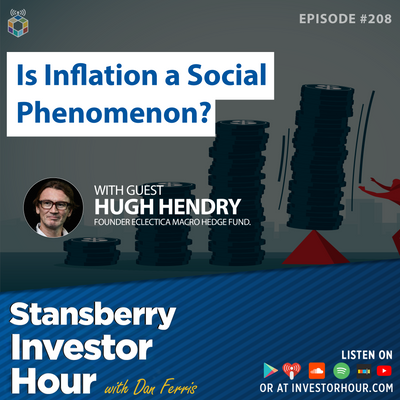
Is Inflation a Social Phenomenon?
<p>After Bitcoin plunged 54% from its all-time-high in April, many crypto speculators are feeling quite shaken...</p> <p>But Dan points out that it's what <em>didn't happen</em> after the crypto crash that’s worth noting...</p> <p>No banks went under... the Fed didn't need to bail anyone out... We didn't see a big systemic collapse...</p> <p>And Bitcoin is still standing...</p> <p>Not to mention, Dan points out that one of the biggest names in the investing world just announced he bought some Bitcoin for the very first time...</p> <p>Then on this week's interview, Dan invites Hugh Henry onto the show. Hugh is an award-winning hedge fund manager, market commentator, real estate investor, and podcaster.</p> <p>Hugh previously worked at Odey Asset Management, before he founded Eclectica Asset Management in 2005, where he achieved a 31.2% return during the 2008 financial crisis.</p> <p>During their conversation, Hugh elaborates on his stance that inflation is more of a social phenomenon than many people give it credit for.</p> <p>Hugh also explains how if you spot some of these social trends, and are willing to take a contrarian stance, you could find some amazing investment opportunities at the best value they've been in years.</p> <p>He even shares the names of 4 or 5 stocks trading at rock-bottom prices that he absolutely loves going forward...</p> <p>Then on the mailbag this week, one listener asks Dan an in-depth question about life insurance and holding cash... And another long-time listener asks what Dan thinks about the popular assertion that gold will plummet when a crisis happens...</p> <p>Listen to Dan tackle these questions and more on this week's episode.</p>
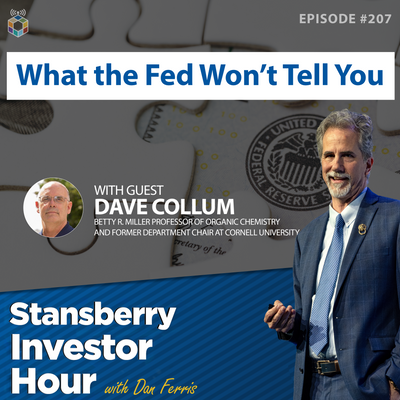
What the Fed Won' Tell You
<p>It's been a rough week for crypto investors...</p> <p> After Bitcoin reached over $64,000 in April, the world's most popular crypto has plunged as low as $30,000 on some exchanges earlier this week...</p> <p>Dan opens the show with an update on the situation, and tells the listeners what he's doing with his Bitcoin today...</p> <p>Then on this week's interview, Dan invites Dave Collum back onto the show for another great conversation. Dave is the Betty R. Miller Professor of Organic Chemistry and former Department Chair at Cornell University.</p> <p>He's also a staunch Libertarian, a fan of gold, the Austrian business cycle, and he's not at all afraid to speak his mind.</p> <p> During their conversation, Dave and Dan talk about a wide range of controversial topics, like how the inflation numbers from the Fed are completely bogus, how the climate change industrial complex became corrupt, and how a massive top is currently brewing in the market despite what you're being told.</p> <p> Then on the mailbag this week, a new listener to the podcast asks Dan his general advice for how to handle the current market environment...</p> <p> Dan takes his time responding to the listener, explaining all the key places he believes you should have your money, plus a couple of helpful lessons to consider.</p> <p> Listen to Dan tackle this great question and several more on this week's episode.</p>

Where to Find Big Gains in Resource Stocks
<p>In the final stages of the bull market, thoughtful investing is typically replaced with reckless speculation... </p> <p>And today, we're seeing warning signs in nearly every corner of the market...</p> <p> Investors everywhere are throwing caution to the wind in hopes of finding the hottest tech stock, SPAC offering, or cryptocurrency that'll help them get rich quick...</p> <p>So that's why this week, Dan is bringing the listeners back down to Earth by focusing on a corner of the market that fuels nearly every other industry, but has recently been forgotten by most of the financial media...</p> <p>On this week's episode, Dan invites Rick Rule of Sprott Inc. onto the show to talk about natural resource investing.</p> <p>Rick began his career in the securities business in 1974 and has been principally involved with natural resource securities ever since. Over his long career, Rick has originated and participated in hundreds of debt and equity transactions with private, pre-public, and public companies.</p> <p>Today, Rick is widely regarded as one of the most accomplished natural resource investors on the planet.</p> <p>During their conversation, Rick talks about how stepping down from his position as managing director and president at Sprott has allowed him to focus more time and energy on researching potential investments in the resource space.</p> <p>Rick and Dan discuss where he sees opportunity in the resource market today, including a handful of stocks from the other side of the globe that he believes are currently trading at steep discounts.</p> <p>If you're okay with some riskier, higher upside plays, Rick shares the names of a few stocks which he says are "the cheapest resource stocks on the planet..."</p> <p>Then on the mailbag this week, Dan answers a couple great questions from listeners who have written in...</p> <p>One listener asks Dan his thoughts about a recent quote from Stanley Druckenmiller, where he discusses the possibility of the dollar losing its status as the global reserve currency...</p> <p>And another listener shares what he believes is the real motivation behind the new E.S.G. investing trend....</p> <p>Dan gives his thoughts on these questions and more on this week's episode.</p>
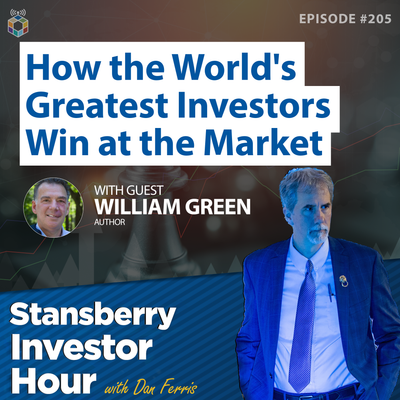
How the World's Greatest Investors Win at the Market
<p>Credit Suisse released a report with some shocking findings about a group of stocks you likely haven't been paying attention to...</p> <p>Across the entire world, across nearly every industry, from small cap to large cap, this forgotten category of stocks has outperformed its peers... and by a wide margin.</p> <p>On the opening rant this week, Dan examines all the facts behind the surprising phenomenon... and discusses what potential investors should do with this information.</p> <p>Then on this week's interview, Dan invites William Green onto the show.</p> <p>William has written for many leading publications like <em>The New Yorker</em>, <em>Time</em>, <em>Fortune</em>, <em>Forbes</em>, <em>Barron's</em>, <em>The London Spectator</em>, <em>The Economist</em>, and many more.</p> <p>He's also interviewed Presidents, Prime Ministers, and scores of the world's most successful billionaire investors.</p> <p>He shares some of the best lessons he's learned in his latest book, <em>Richer, Wiser, Happier: How the World's Greatest Investors Win at the Market and in Life.</em></p> <p>During their conversation, William gives Dan some fascinating insights he's learned during interviews with famed investors like Charlie Munger, Joel Greenblatt, Sir John Templeton, Jack Bogle, Bill Miller, Howard Marks, Tom Gayner and many more.</p> <p>William has so many great stories that by the end, Dan promises William that he will definitely be invited back for another show.</p> <p>Then on the mailbag this week, one listener writes in challenging Dan on one of his more controversial opinions and Dan felt the need to respond..</p> <p>Dan doesn't fully agree with everything the listener says, but after some careful consideration, he admits the listener is "absolutely right" on one important point.</p> <p>Listen to Dan's full response on this week's episode.</p>
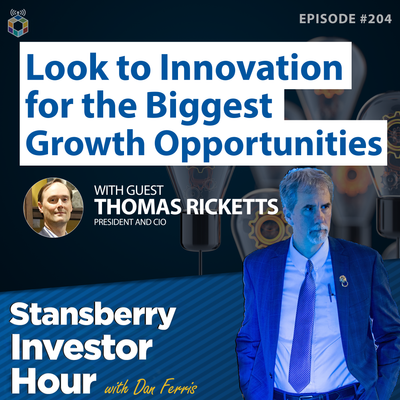
Look to Innovation for the Biggest Growth Opportunities
<p>In March, Tesla sold off about 10% of their Bitcoin...</p> <p>Elon Musk said the reason they sold was to, "prove the liquidity of Bitcoin as an alternative to holding cash on the balance sheet..."</p> <p>On the opening rant this week, Dan examines all the facts behind the surprising move...</p> <p>And explains why he's not buying Musk's explanation...</p> <p>Then on this week's interview, Dan invites Thomas Ricketts onto the show.</p> <p>Thomas is President and CIO of Evolutionary Tree Capital Management, a firm exclusively focused on innovation investing. Evolutionary Tree uses their unique investment process to differentiate between hype and real innovation that yields future growth.</p> <p>Their approach has led Evolutionary Tree to find stocks like HubSpot, ServiceNow and Pinterest before they were well known.</p> <p>During their conversation, Dan asks Thomas what the main difference between innovation investing and speculating really is. Thomas explains how his firm uses 8 special criteria to separate the hype from the legitimate long-term opportunities.</p> <p>Thomas even gives the listeners a handful of stocks he loves in cloud computing and biotech – two industries he says are poised for massive growth over the coming decades.</p> <p>Then on this week's mailbag, one listener asks Dan how to buy "some additional insurance via buying put options..."</p> <p>Another listener asks what Dan thinks about the sudden shift to ESG initiatives being parroted in many major industries.</p> <p>And a final listener asks an excellent question about inflation and conventional economic wisdom.</p> <p>Dan gives a thorough reply to this question and more on this week's episode.</p>
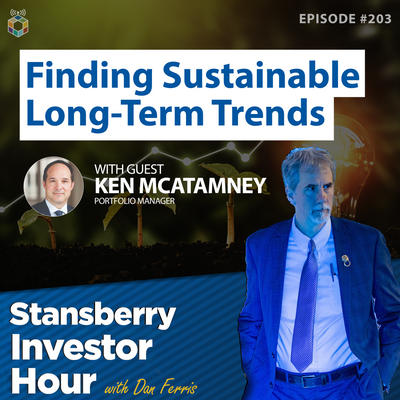
Finding Sustainable Long-Term Trends in an Era of Insane Valuations
<p>Dan opens this week's rant completely beside himself, as he shares the latest story of jaw-dropping excess in the market.</p> <p>But this isn't the story of your typical cryptocurrency pump and dump...</p> <p>Or a message board banding together to try to create the next "meme stock..."</p> <p>It comes from a business you'd never expect in a million years... and Dan calls it the single most insane example of speculative froth he's EVER seen in the markets.</p> <p>Then on this week's interview, Dan invites Ken McAtamney onto the show.</p> <p>Ken is the head of the global equity team and a portfolio manager for William Blair's International Growth, Global Leaders, and International Leaders strategies.</p> <p>Before joining William Blair in 2005, Ken was a vice president at Goldman Sachs, where he was responsible for institutional equity research coverage for both international and domestic equities.</p> <p>Dan and Ken cover a wide range of major growth themes that will likely shape the future investment landscape. Ken presents a ton of unique ideas of how many current industries may evolve and the massive opportunities you should be looking for.</p> <p>During their conversation, Ken shares nearly a dozen names of stocks with sustainable long-term growth in emerging industries that he loves.</p> <p>And finally, the mailbag is filled with some great questions this week... One listener asks Dan if he thinks we could ever have a sovereign debt crisis like Jim Rickards describes?</p> <p>Another listener asks Dan to elaborate on what he meant when he previously said "gold is a bauble..."</p> <p>And a long-time listener asks who is the best author of investment books and why, taking fame and notoriety out of the equation and focusing only on substance?</p> <p>Dan gives a thoughtful reply to this question and more on this week's episode.</p>
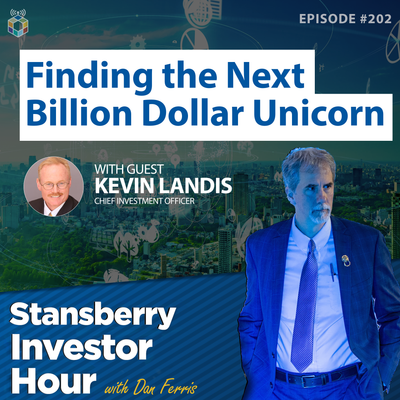
Finding the Next Billion Dollar Unicorn with Kevin Landis
<p>Across the entire U.S. stock market, going all the way back to 1926, a small fraction of stocks are responsible for the lion's share of the market's gains.</p> <p>Dan examines this phenomenon with a deep dive into the Bessembinder Study and comes away with a few key takeaways for individual investors trying to beat the market. </p> <p>Then on this week's interview, Dan invites Kevin Landis onto the show. </p> <p>Kevin was born and raised in Silicon Valley and has over 30 years of experience in market research, product management and investment in the technology sector.</p> <p>And today, Kevin is the Chief Investment Officer at Firsthand Capital Management, an investment advisory firm he founded in 1994. He currently manages two technology sector mutual funds and a publicly traded venture capital fund.</p> <p>Dan asks how Kevin and his firm were able to identify stocks like Roku, Twitter, SolarCity, and Yelp before they became the massive winners they are today...</p> <p>The two also discuss how the current incentives in the asset management industry typically hurt your ability to make large gains... and how his firm works to break that mold. </p> <p>And finally, the mailbag is filled with some great questions this week. One listener asks Dan an interesting question about Tesla that tests his value investing philosophy...</p> <p>Then a listener writes in supporting the retail investors in GameStop, giving a different take on the situation. Is there more to this story than we've been told?</p> <p>And another listener from Australia has some questions on gold's price lately and the potential of a top in the crypto markets...</p> <p>Listen to Dan give his take on these topics and more on this week's episode.</p>
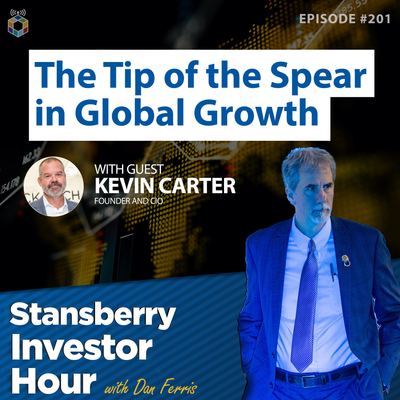
The Tip of the Spear in Global Growth
<p>GameStop is selling up to 3.5 million new shares, looking to raise money amid their newfound hype and popularity in the investing world.</p> <p>Dan opens the show by explaining why this is actually a very smart business move...</p> <p>But he says even though it's the right move for GameStop, he wants no part in it. And he cautions anyone else still thinking about jumping on this train.</p> <p>Then Dan invites Kevin Carter onto the show to talk about one of the fastest-growing areas anywhere in the markets, that sadly many Americans overlook.</p> <p>Kevin is the founder and Chief Investment Officer at EMQQ, an Emerging Markets Internet and E-Commerce Index. Over the past 20 years, he's partnered with Princeton economist and indexing legend, Dr. Burton Malkiel, focusing on China and emerging markets, ultimately creating the EMQQ Index.</p> <p>During their conversation, Kevin teaches Dan some stunning facts about the massive opportunity investing in emerging markets outside of the U.S. provides today... (like did you know that over half of the world's mobile payment users live in Africa?)</p> <p>Kevin makes a very strong case for putting money in emerging markets today, even listing out a handful of his favorite personal holdings from his index... like one he calls the Amazon.com of Poland... another known as the Amazon.com of Africa... and even one little-known fintech company that Berkshire Hathaway bought 5% of during its IPO.</p> <p>Kevin says that if you have a long-term timeline, you absolutely need to take a look at the emerging markets internet sector... He calls it the "tip of the spear" when it comes to global growth.</p> <p>And finally, we had an ultra-light mailbag this week...</p> <p>So light, in fact, that Dan decided to hold off until next week's episode.</p> <p>So don't forget, please send in any questions you may have, any comments on the show, or even any politely-worded criticisms into us at <a href= "mailto:feedback@investorhour.com">feedback@investorhour.com</a>...</p> <p>Until then, you can listen to Dan and Kevin's conversation and more on this week's episode.</p>
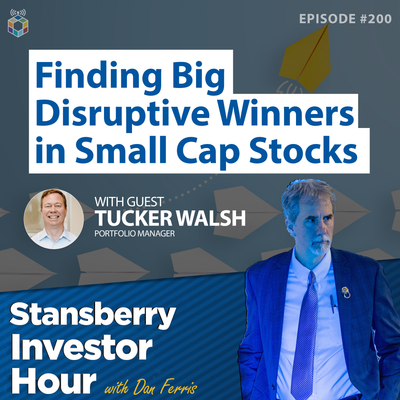
Finding Big Disruptive Winners in Small Cap Stocks
<p>A little-known family investment office made big news this week... </p> <p>Archegos Capital Management's risky leveraged bets on ViacomCBS Inc. and Discovery Inc. set off a wave of forced liquidations at a number of Wall Street Banks.</p> <p>Estimates show Bill Hwang, the man behind Archegos, levered his positions as much as 5X and so far has triggered the liquidations of positions approaching $30 billion in value.</p> <p>Dan takes a deep look at this story of greed and hubris before leaving listeners with one crystal clear takeaway.</p> <p>Then Dan invites Tucker Walsh onto the show for a conversation about one of the hottest sectors of the market over the past year – small cap growth stocks.</p> <p>Tucker is head of the Small Company Growth Team and lead Portfolio Manager at Polen Capital's U.S. Small Company Growth strategy. Prior to joining Polen Capital Tucker spent 10 years as CEO at Copper Rock Capital Partners and 9 years as Managing Director and Head of Small Cap Growth Team at State Street Research.</p> <p>Tucker and his team look to invest in fast-growing, disruptive businesses that use technology to compete in the digital age.</p> <p>But he stresses that profitability is important, and discipline is critical when you're investing in this space. Thoroughly researching and investigating each company and objectively looking at both best and worst case scenarios without getting attached is key.</p> <p>During their conversation, Tucker shares the name of a few stocks he thinks could have massive potential in the coming years and are great buys right now.</p> <p>Then on the mailbag, listener Peter W. writes in explaining why he was not happy with Dan's interview last week... He argues Dan and Per left out some pretty important details during the conversation about regulations.</p> <p>Dan listens to Peter's side and gives his rebuttal to this question and many more on this week's episode.</p>
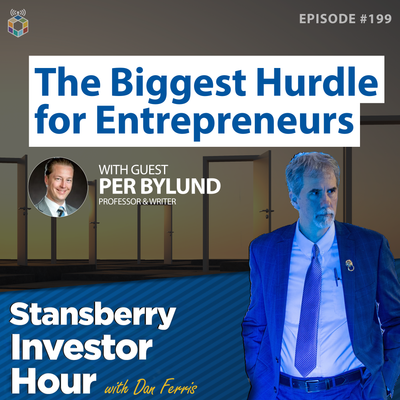
The Biggest Hurdle for Entrepreneurs
<p><span style= "font-family: -apple-system, BlinkMacSystemFont, 'Segoe UI', Roboto, Oxygen, Ubuntu, Cantarell, 'Open Sans', 'Helvetica Neue', sans-serif;"> Shortly after they exchanged hellos, an old friend of Dan's enthusiastically told him about all the money he's made in penny stocks.</span></p> <p>And what he said next pretty much stopped Dan in his tracks...</p> <p>On this week's rant, Dan takes a look at the continued rise of risky speculations in the markets... and gives some advice for anyone still dabbling in them.</p> <p>Then Dan invites economist Per Bylund in for a conversation about a topic not often discussed on the show. Per is Assistant Professor of Entrepreneurship and Records-Johnson Professor of Free Enterprise in the School of Entrepreneurship at Oklahoma State University.</p> <p>His research focuses on issues of entrepreneurship, strategic management and organizational economics, especially where they overlap with regulation and policy.</p> <p>Per explains how the long term effects of regulation are easy to ignore because they are often unseen. But if we want as prosperous a world as possible, we should all pull our head out of the sand and begin to pay attention.</p> <p>Dan and Per also touch on the minimum wage debate, the Bernie Madoff fraud, and even some common economic fallacies touted by Nobel-Prize-winning economists.</p> <p>Then on the mailbag, Dan has a couple follow up questions about buying into GBTC. Another listener writes in asking for some clarification on Dan's take on Warren Buffett and gold. And another listener asks Dan's thoughts about when it's time to take some profits off the table in Bitcoin.</p> <p>Listen to Dan's take on these questions and more on this week's episode.</p>
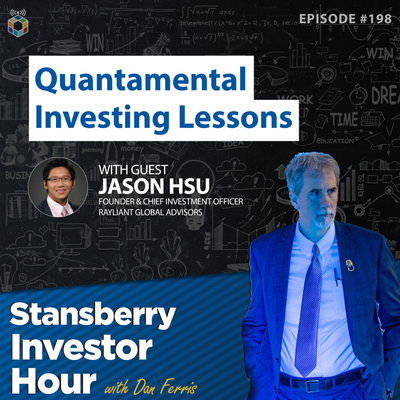
Quantamental Investing Lessons with Jason Hsu
<p>One year ago today, Bitcoin traded for around $5,200...</p> <p>Today, it's hovering around $58,000...</p> <p>When one of your investments has grown to a massive winner, what's the next step?</p> <p>It's a tough question that every investor needs to face on their own. But on this week's rant Dan looks back to the story of Robert Kirby and the coffee can portfolio, which suggests sometimes the best thing to do... is nothing at all.</p> <p>Then on this week's interview, Dan invites Jason Hsu onto the show. Jason is Chairman and CIO of Rayliant, an asset manager who focuses on generating alpha from investing in China and other inefficient emerging markets.</p> <p>Some asset managers tend to lean towards a quantitative approach... Some use a fundamental approach...</p> <p>Jason shares how Rayliant has blended the two into one in order to take advantage of the massive opportunity in China and other emerging markets. </p> <p>During their discussion, Dan and Jason discuss the massive opportunity in China today... how the Chinese government's hands-on approach differs from the U.S. government's way of doing things... and how his firm is making it easier than ever for investors to gain exposure to emerging markets around the globe that are often overlooked.</p> <p>Then on the mailbag, Dan answers your questions, comments and politely-worded criticisms. But this week, there's only one big question that Dan wants to focus on... It's one that many investors – retail and institutional alike – have been wondering.</p> <p>Is it better to buy Bitcoin outright or are Bitcoin ETFs, like GBTC, a suitable way to gain exposure?</p> <p>Listen to Dan's take on this popular question and more on this week's episode.</p>

The Quant Approach to Innovative Investing
<p>Is gold just another "greater fool" investment?</p> <p>Warren Buffett seems to think so. Or at least, he's said as much in his 2011 letter to investors, when he compared gold to the tulip bulb mania.</p> <p>On this week's rant, Dan examines this point of view and explains what Buffett doesn't seem to grasp when it comes to gold...</p> <p>Then on this week's interview, Dan invites Gregg Fisher onto the show. Gregg is the founder and portfolio manager of Quent Capital, an asset management firm focused on systematically investing in global innovation.</p> <p>Many guests on the show fell in love with finance and investing later in life... but that's not the case with Gregg. Gregg was born into the investment business and well on his way by the time he was a teenager. By the time he left college, Gregg helped pioneer some of the quant trading strategies that are so common in the industry today.</p> <p>During their discussion, Gregg explains why so many small innovative companies are often overlooked. But he stresses that if you're willing to do a little extra leg work, many innovative small caps present a massive opportunity.</p> <p>By the time the interview is over, Dan is left questioning if he has enough money in small cap stocks.</p> <p>Then on the mailbag, Dan fields several questions from listeners about gold, including one listener who gives a fantastic real-world demonstration of gold's long term value. Another listener writes in and shares a story of remorse for selling his Bitcoin a little too soon. Dan gives him some words of wisdom and reassures him that "we've all been there."</p> <p>Listen to Dan's response to these questions and more on this week's episode.</p>
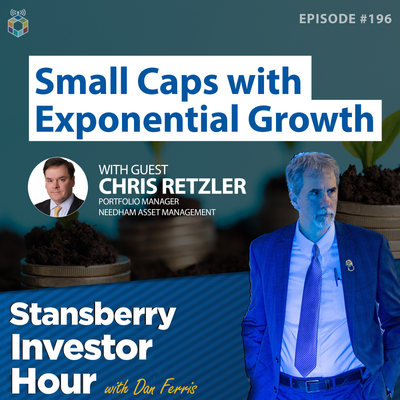
Small Caps with Exponential Growth
<p>It’s not the sexiest part of the market, but Dan decides to break down <em>bonds</em>.</p> <p>If you look at the benchmark ten-year bond treasury yield, it has tripled since last year. Does this mean the bond rally is over and we’ve topped out at the bond market? Or is inflation finally kicking in as yields climb?</p> <p>Bond interest rates are the lowest they’ve been since there’s been data for this, and if the Fed keeps trying to stabilize and suppress rates, printing endless cash and buying new government debt, the more dire the economic consequences will be. They <em>should</em> just let the market adjust naturally, or we’ll have 2008 all over again.</p> <p>Dan’s guest this week is Chris Retzler, a portfolio manager at a small-cap growth-fund for Needham Funds Asset Management. His fund thrived during the bear-market bottom, nearly doubling. Retzler’s forte focuses on nurturing long-term relationships with his portfolio companies’ management teams and seeking out undiscovered investment opportunities.</p> <p>The appeal of small-cap stocks is the <em>room for growth</em> along with a more potent potential for gains -- but how does Retzler make <em>his</em> market picks? His fund has succeeded during the pandemic (Moderna is in their portfolio), but what exactly are the best small-cap markers?</p> <p>It appears getting acquainted with management is a vital first step in investing with emerging small-cap companies. To be a concentrated investor, you have to know with whom you're investing<em>.</em> Regarding small-cap tech opportunities, look for capital-intensive companies that don’t have a lot of competition in the same space, e.g., semiconductor makers. And he highlights telemedicine as a surging fertile investing ground for explosive growth.</p> <p>Oh, and always follow Warren Buffet’s four basic tenets of investing.</p> <p>Listen to their conversation and much more on this week’s episode, including mailbag questions that cover everything from aluminum to acquisitions.</p> <p>Also, check out a new episode of Stansberry’s podcast where politics and economics meet, <a href= "https://americanconsequences.com/podcast/"><em>American Consequences with Trish Regan</em></a>.</p>
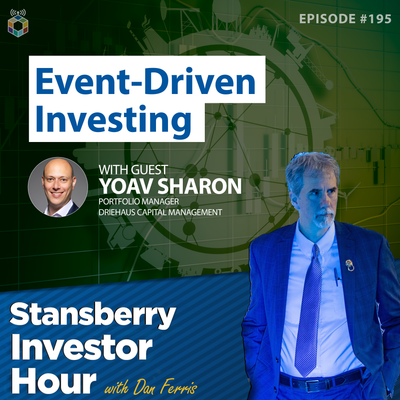
Event-Driven Investing
<p>Well, the market proved Dan right yet again.</p> <p>ARK Investment Management, CEO Cathie Wood, and their ETFs lost three out of their 60 billion last week -- Dan knew from ARK’s ballistics charts that the stock seemed to be topping out.</p> <p>While he applauds Cathie and her company for getting into the disruptive tech game in 2014, he knows that Tesla and Bitcoin (part of ARK’s ETF bundle) remain hot stocks that are <em>way</em> ahead of themselves -- and too easily swayed by an Elon Musk tweet.</p> <p>Everyone wants to be in the market right now, but when stocks top out like this, Dan likens it to people contentedly queuing up for a Broadway show, only to be slaughtered once they get inside. Or, in other terms, be cautious right now, investors.</p> <p>Dan’s guest this week is Yoav Sharon, a portfolio manager for the Driehaus Capital Management, in charge of investment research and securities selection. He boasts 16 years of industry experience and has been a senior member of Driehaus’ investment team for eight years.</p> <p>Event-driven investment strategy is a topic Dan has never covered before on the show, so Yoav breaks it down for us: it’s a niche part of the market that takes advantage of company-specific catalysts. The following <em>events</em> would qualify: mergers and acquisitions, arbitrage, corporate restructuring, and complex business models like healthcare.</p> <p>Yoav’s fund sees and seizes these moments, explaining that event-driven investing only goes to where the opportunity lies. This strategy provides a limited correlation to broader markets, less volatility, better performance, and capital preservation during drawdown periods. Yoav also reveals the critical markers to determine whether market events are worthwhile and shares a bevy of other alternative investing tips.</p> <p>Listen to their conversation and much more on this week’s episode.</p> <p>Your podcast host, Dan Ferris, recently went on-record saying: “If I had to put ALL my money in 1 stock – This Would be It.” <strong>Get the Full Story Here: </strong><a href= "https://orders.stansberryresearch.com/?cid=MKT519574&eid=MKT523099&encryptedSnaid=&snaid=&step=start">https://orders.stansberryresearch.com/?cid=MKT519574&eid=MKT523099&encryptedSnaid=&snaid=&step=start</a></p> <p>Also, check out a new episode of Stansberry’s podcast where politics and economics meet, <em>American Consequences with Trish Regan</em>.</p>
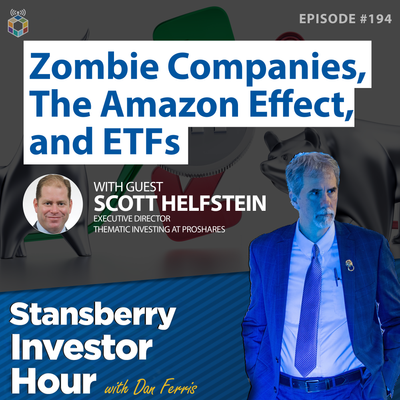
Zombie Companies, The Amazon Effect, and ETFs
<p>Is Bitcoin going to continue to climb, or has it already reached its peak? Dan reflects on the reflexivity of some of these gangbuster stocks. He also shares his must-read pick for financial history books, and not just for great topics of conversation at parties. Then, Scott Helfstein, executive director of Thematic Investing at ProShares, joins Dan to talk about the ever-evolving trends of ETFs. While Thematic Investing seems to have become a new buzz word, Scott argues that the term originated inside ETF trading and Thematic is just the next evolution. Scott also breaks down key sectors that he thinks were transformed by the pandemic in 2020. And finally, on the mailbag this week, Dan answers additional questions about Bitcoin and confronts a staggering accusation of not being humble. Listen to their conversation and much more on this week’s episode.</p>
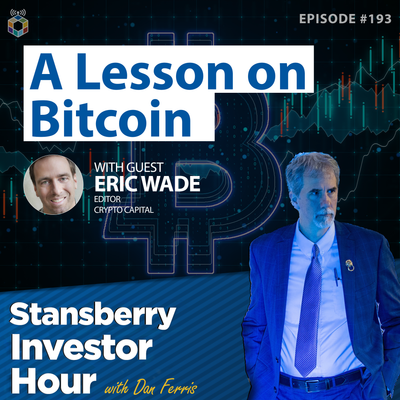
A Lesson on Bitcoin with Eric Wade
<p>The Melt Up is upon us...</p> <p>Retail investors are getting rich piling into stocks, irrational exuberance is at dangerous highs, and all valuations have gone out the window. </p> <p>But is this the big one? Are we seeing the Mother of All Melt Ups? Dan opens the show by sharing a few increasingly troubling news items that have him worried...</p> <p>Next, Dan invites Stansberry Research's, Eric Wade, onto the show for a conversation on all things crypto. Eric is an entrepreneur, investor, screenwriter, and editor of the <em>Crypto Capital</em> newsletter at Stansberry Research. Dan takes this opportunity to ask him all the beginner questions others are afraid to ask:</p> <p><em>What exactly is Bitcoin?</em></p> <p><em>What do I own when I own Bitcoin?</em><em> </em></p> <p><em>Won't the government try and shut it down?</em><em> </em></p> <p><em>If they can't do that, won't the government tax and regulate it to death?</em></p> <p><em>Could another crypto come along and replace Bitcoin?</em></p> <p>Eric answers everything Dan throws at him while keeping things simple. He stressed that you don’t need to have a degree in computer science to invest in Bitcoin. Eric explains what makes Bitcoin unique, how it became the leader in crypto, and why that's not likely to change anytime soon.</p> <p>Listen to their conversation and much more on this week's episode.</p> <p><span style="font-weight: 400;">Interested in more from Stansberry Research? Check out the American Consequences podcast here: https://podfollow.com/americanconsequences</span></p>
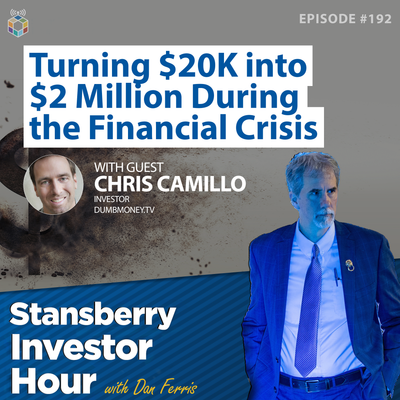
Turning $20K to $2 million During the Financial Crisis
<p>The GameStop rise has come and gone.</p> <p>Last week, shares for the retail video game store traded as high as $480... but over the past week the stock has plummeted over 80%.</p> <p>Dan examines the situation and comes away with some key takeaways about free brokerage apps, like Robinhood, and who they truly serve.</p> <p>Then Dan brings the perfect guest onto the show to discuss the situation, legendary trader and market wizard, Chris Camillo.</p> <p>In 2007, Chris began his investing career by turning $20,000 into over $2 million, during a three-year period where you were lucky to make any gains in the market at all.</p> <p>Today, Chris is an accomplished author, investor, and entrepreneur who has been featured in Jack Schwager's book <em>Unknown Market Wizards</em>.</p> <p>Chris' trading style is pretty different than anything we've covered on the show before.</p> <p>Chris explains how he uses social arbitrage investing to try to get out ahead of new trends and identify early shifts in popular movements.</p> <p>Chris says he does almost 100% of his research and trading right from his phone, using social media sites like Twitter, Reddit, and Discord to find his ideas. That's how Chris was able to see the covid crash coming ahead of time, and place a trade that made him <em>a 7-figure windfall...</em></p> <p>Dan and Chris sit down and discuss some of the biggest calls he's gotten right, big opportunities he's missed, and his advice for anyone getting into trading.</p> <p>Listen to their conversation and much more on this week's episode.</p> <p><span style="font-weight: 400;">Interested in more from Stansberry Research? Check out the American Consequences podcast here: https://podfollow.com/americanconsequences</span></p>
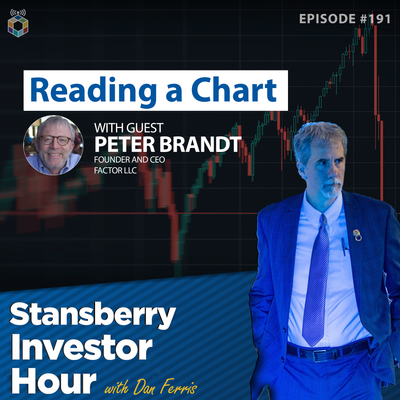
Reading a Chart with Peter Brandt
<p>Five days ago, GameStop traded for less than $50 per share.</p> <p>Yet on Thursday, at the time of this writing, the stock has soared as high as $482.85...</p> <p>What on earth is going on?</p> <p>Dan explains what is behind the meteoric rise of GameStop, AMC, and a few other unassuming stocks in this week's opening rant.</p> <p>Then Dan invites a trading legend and "market wizard" onto the show. For decades, Peter Brandt has been considered one of the world's foremost authorities on using classical charting principals to trade futures, forex and even the crypto markets.</p> <p>Peter is also featured in the acclaimed book by Jack Schwager, <em>Unknown Market Wizards: The Best Traders You've Never Heard Of</em>. He's also the second wizard we've had on the podcast.</p> <p>Peter gives Dan an in-depth look into why the classical chart patterns don't seem to work anymore, and how Peter's adjusted his trading today. If you think of yourself as a trader, this is an interview you cannot afford to miss.</p> <p>And finally, on this week's mailbag Dan receives a great question about how the dollar could strengthen amidst this environment of stimulus. Another listener has a few questions about the recent censorship across big tech.</p> <p>Dan gives his thoughts on these topics and more on this week's episode.</p> <p><span style="font-weight: 400;">Interested in more from Stansberry Research? Check out the American Consequences podcast here: https://podfollow.com/americanconsequences</span></p>

What's Wrong With the Hedge Fund Industry?
<p>Despite the multitude of problems facing our country, stocks keep moving higher and higher, leading more people to question if we're currently in a bubble.</p> <p>This leads Dan to explore two important questions. What do you do with your money when you know you're in a bubble? And what do you do if you know that bubble can last for years before popping?</p> <p>Then Dan invites Andrew Beer, Managing Member at Dynamic Beta Investments, on to the show to answer some questions about the world of hedge funds.</p> <p>Andrew joined the hedge fund industry in 1994 as a portfolio manager at Baupost for the legendary Seth Klarman. In recent years, Andrew's focus has been on how the hedge fund model can be improved based on liquidity, access, and cost perspectives.</p> <p>Dan and Andrew discuss his start in the industry and how things have changed over the past 3 decades. Andrew shares some of the reasons hedge funds have declined in popularity over the years.... and how his firm, Dynamic Beta Investments, is looking to change that.</p> <p>And finally, on this week's mailbag quite a few listeners write in to give their perspective on what living through a coup is really like. Some agree with Dan while some others take exception with how Dan spoke about the situation. One even accuses Dan of being a Trump cultist!</p> <p>Listen to Dan's fiery rebuttal to this email and more on this week's episode.</p> <p><span style="font-weight: 400;">Interested in more from Stansberry Research? Check out the American Consequences podcast here: https://podfollow.com/americanconsequences</span></p>
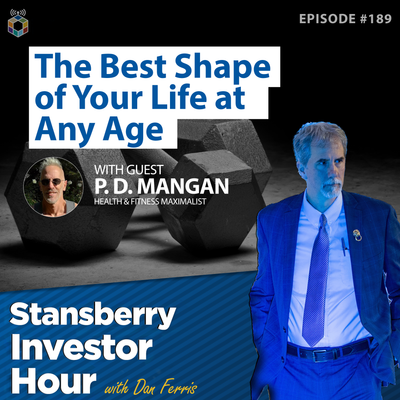
The Best Shape of Your Life At Any Age
<p>Every year, the top resolution for millions of Americans is to lose weight and get in better shape.</p> <p>But the numbers show this is far easier said than done.</p> <p>So this week, instead of focusing on your wealth, we're taking a look at your health as Dan brings fitness guru and internet sensation, P.D. Mangan, onto the show.</p> <p>P.D. shares the story of how at age 50, he was frail, feeling terrible, and in general poor health. But today at age 65, he's in better shape than most 20-year olds.</p> <p>P.D. shares the shockingly simple way he did it – <em>without the help of dozens of supplements or steroids –</em> and without spending endless hours in the gym. P.D. is unique in that his advice typically goes against what many traditional health experts have been saying for decades.</p> <p>Today, he helps teach folks of all ages how to eat right, get stronger, live longer and win with science-based health and fitness.</p> <p>Listen to his discussion with Dan and more on this week's episode.</p> <p><span style="font-weight: 400;">Interested in more from Stansberry Research? Check out the American Consequences podcast here: https://podfollow.com/americanconsequences</span></p>
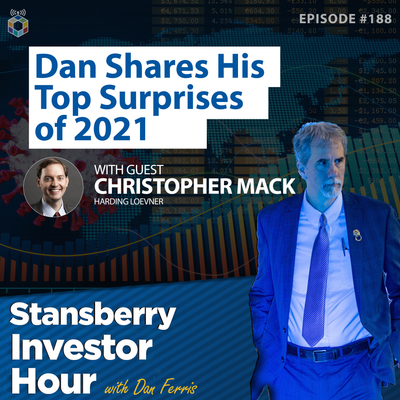
Dan Shares His Top Surprises of 2021
<p>As we start a new year, Dan is keeping up with his tradition of sharing his Top 10 Potential Surprises for 2021.</p> <p>Could one of 2020's hottest stocks take a big hit? Could we see a massive correction in the entire market soon? Could Bitcoin continue on its current pace or is a crash imminent?</p> <p>Dan covers these topics and more, sharing some huge surprises that would stun the investing world.</p> <p>And just like last year, Dan plans on coming back to these surprises later in the year to check and see if any of them come to fruition.</p> <p>Plus, Dan brings new guest onto the show, Christopher Mack. Chris works for investment management firm, Harding Loevner, where he started in 2004. Today he works as an analyst in Information Technology, a portfolio manager, Global Small Companies (Co-Lead), and as a Global Equity & World Equity Partner.</p> <p>Dan and Chris have a long in-depth discussion on opportunities they see happening in the markets in 2021. Chris also shares some helpful insights to be aware of that he's learned in his experience working as a portfolio manager since 2004.</p> <p>Chris even shares some of his favorite stocks, including two retail stocks that have niches outside of the Amazon ecosystem that could thrive in the coming years.</p> <p>Listen to his discussion with Dan and more on this week's episode.<br /> <br /> <span style="font-weight: 400;">Interested in more from Stansberry Research? Check out the American Consequences podcast here: https://podfollow.com/americanconsequences</span></p>

Investor Hour's Top Interviews of the Year
<p>As 2020 draws to a close, it's time to look back at an incredible year of <em>Stansberry Investor Hour</em> interviews. </p> <p>We're not just doing a simple year in review of the markets though.</p> <p>Instead, Dan and his crew took the time to gather up the very best clips from the most important episodes of <em>Stansberry Investor Hour</em> – ones that he says could have a profound impact on your wealth.</p> <p>It's an episode jam-packed with valuable insights from some of the biggest legends in the investing world.</p> <p>Dan recaps some amazing lessons he's found from some influential thinkers like Jack Schwager (episode 183), Annie Duke (episode 181), Raoul Pal (episode 140), Bill Browder (episode 153), John Stossel (episode 159), and many more...</p> <p>Plus, Dan takes a look back at some of the predictions made and how their advice would have panned out if you followed it over the year.</p> <p>It's the one episode this year you DEFINITELY don't want to miss.</p> <p>Listen to Dan's most influential interviews of the year on this week's episode.</p>
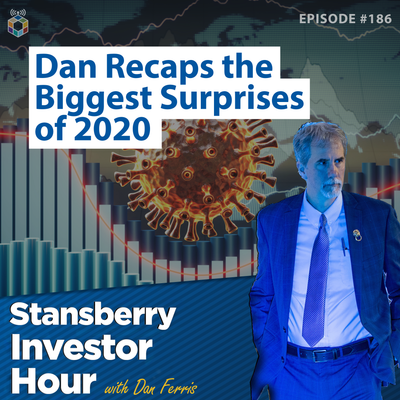
Dan Recaps the Biggest Surprises of 2020
<p>On this week's episode of the <em>Stansberry Investor Hour</em>, we're doing something a little different.</p> <p>Long time listeners may remember that on January 3, 2020 (Episode 135), Dan shared with everyone his <em>Top 10 Big Surprises for 2020</em>...</p> <p>Well today we'll take a look back and see how Dan did.</p> <p>Why do this?</p> <p>Dan wants to hold himself accountable. Too often, financial media will just make claims and predictions all day long and never review them down the road for any sort of accuracy.</p> <p>At the <em>Stansberry Investor Hour</em>, we want to do things differently.</p> <p>So Dan wants to be 100% transparent. He covers exactly what he said at the beginning of the year and how those discussions look with the benefit of hindsight... including the topics he was way off on... and the topics he called with incredible accuracy....</p> <p>It's an episode you won't want to miss.</p>
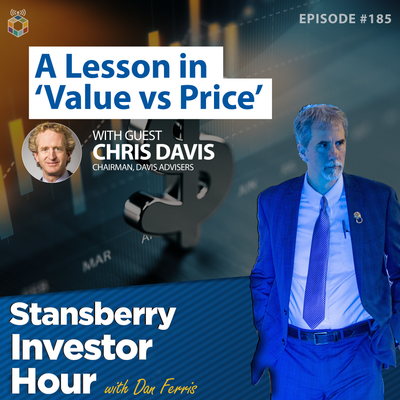
A Lesson in 'Value vs Price'
<p>On today's show, we're bringing in a very special guest...</p> <p>His investing roots run so deep, his family was the subject of the book, <em>The Davis Dynasty: Fifty Years of Successful Investing on Wall Street</em>.</p> <p>This week, Dan invites Chris Davis onto the show.</p> <p>Chris is the chairman of Davis Advisors, an independent investment management firm founded in 1969 with over $23 billion in assets under management. Since its inception in 1969, the Davis New York Venture Fund has outperformed the S&P 500 in 98% of 20-year holding periods. In fact, 4 out of 5 Davis equity funds have been the market since their inception.</p> <p>Chris joined Davis Advisors in 1989 and now has over 3 decades of experience in investment management and securities research. He's even previously been recognized as Morningstar Domestic-Stock Fund Manager of the Year in 2005.</p> <p>During their conversation, Chris shares his philosophy on how discipline in your investments is key to building wealth over time. And why his strategy has produced outstanding results in just about any environment – including periods of inflation, recession, rising and falling energy prices, rising and falling interest rates, and bull and bear markets.</p> <p>Chris gives a ton of incredible insight from his decades of experience managing money using real world examples you likely haven't heard anywhere else.</p> <p>Listen to his discussion with Dan and more on this week's episode.</p> <p>For more from Stansberry Research, check out the American Consequences podcast here: https://americanconsequences.com/podcast/</p>
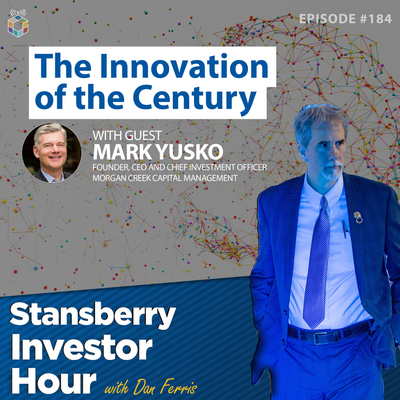
Mark Yusko Reveals the Innovation of the Century
<p>In a very busy year, Bitcoin has flown relatively under the radar... despite reaching all-time-highs at the beginning of December.</p> <p>Bitcoin is up around 152% year to date. We're steadily seeing higher highs and higher lows.</p> <p>So Dan brought Bitcoin Bull and legendary value investor, Mark Yusko, onto the show to discuss the rise.</p> <p>Mark is the founder CEO and Chief Investment Officer of Morgan Creek Capital Management, which currently has around $2 billion in discretionary and non-discretionary assets under management.</p> <p>He is also the Managing Partner at Morgan Creek Digital Assets... and has been very bullish on Bitcoin for years. He calls Bitcoin a "better form of gold, a digital store of value."</p> <p>Dan and Mark have a long in-depth discussion on the world's most popular cryptocurrency. Dan plays devil's advocate and grills Mark on Bitcoin every which way... <em>What happens if the government tries to ban Bitcoin? What if someone wanted to hack the system, couldn't they steal all the Bitcoin? Won't some new innovation come along and eventually replace Bitcoin?</em></p> <p>Mark responds giving a ton of incredible insight and information you likely haven't heard anywhere else.</p> <p>Listen to his discussion with Dan and more on this week's episode.</p> <p>For more from Stansberry Research, check out the American Consequences podcast here: https://americanconsequences.com/podcast/</p>
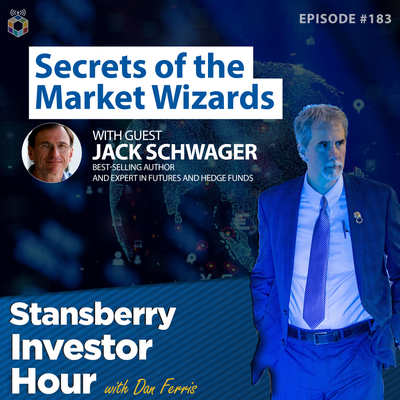
Secrets of the Market Wizards with Jack Schwager
<p>The numbers don't lie.</p> <p>Today the stock market is more expensive than it has been at any point in history...</p> <p>More expensive than the 1929 Crash or the Dot Com bubble...</p> <p>Even worse, rampant speculation is as bad as it's ever been. New investors are entering the market like never before, buying call options like lottery tickets.</p> <p>How do we make sense of this environment? Can you reap the big gains of a market like this while trading safely?</p> <p>Dan brings Jack Schwager onto the show to help tackle some of these questions. Jack is perhaps best known for his best-selling series of interviews with the greatest traders and hedge fund managers of the last three decades: <em>Market Wizards</em> (1989), <em>The New Market Wizards</em> (1992), <em>Stock Market Wizards</em> (2001), <em>Hedge Fund Market Wizards</em> (2012), and <em>The Little Book of Market Wizards</em> (2014).</p> <p>Jack has interviewed all of the greatest investing minds on the planet. During their discussion, Jack shares some of the most vital lessons he's learned from these titans, including what they all preach and where they differ in strategy.</p> <p>Jack gives a ton of timeless advice that you won't want to miss.</p> <p>Listen to his discussion with Dan and more on this week's episode.</p> <p>For more from Stansberry Research, check out the American Consequences podcast here: https://americanconsequences.com/podcast/</p>
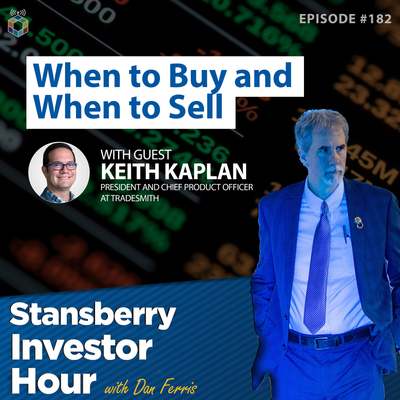
When to Buy and When to Sell
<p>Is the 'Fed Put' a real thing?</p> <p>On today's opening rant, Dan reads some excerpts from a <em>Barron's</em> article titled, <em>"Yes, The 'Fed Put' Really Does Exist. That Could Be Bad News for Bulls."</em></p> <p>Dan examines the facts presented and unpacks what that means for you and your money.</p> <p>Then during this week's interview, Dan sits down for a conversation with Keith Kaplan. Keith is a veteran software architect with over 25 years of experience and is now CEO of <em>Tradesmith</em>. When he's not running his business, Keith speaks frequently for large groups of investors nationwide about the psychology of investing and how our behavior is the #1 factor of investing success.</p> <p>During their conversation, Keith shares a personal story of how developing factor-based investing software for <em>Tradesmith</em> helped turned his personal financial situation around.</p> <p>Before, Keith was deeply in debt despite a good job and growing salary. The situation was so dire, he had to borrowed money from his children to help pay off some of his loans. Today, he's practically debt-free (outside of a mortgage) with a healthy growing nestegg.</p> <p>And finally, on this week's mailbag, Dan answers a flurry of questions about Bitcoin, as the world's most popular cryptocurrency nears all-time-highs... What are your thoughts on companies that pay interest on crypto? And could Bitcoin really withstand pressure from the U.S. government and Central Banks?</p> <p>Listen to Dan's address these concerns and more on this week's episode. </p> <p>For more from Stansberry Research, check out the American Consequences podcast here: https://americanconsequences.com/podcast/</p>
